SOS!
No chopper had ever rescued at such a height. But six men were stranded... p52 Saved!
Meet the fans who stopped their football club from going under

London's wartime spies by Matthew Sweet Holidays in Heck by P J O'Rourke


SOS!
No chopper had ever rescued at such a height. But six men were stranded... p52 Saved!
Meet the fans who stopped their football club from going under

London's wartime spies by Matthew Sweet Holidays in Heck by P J O'Rourke

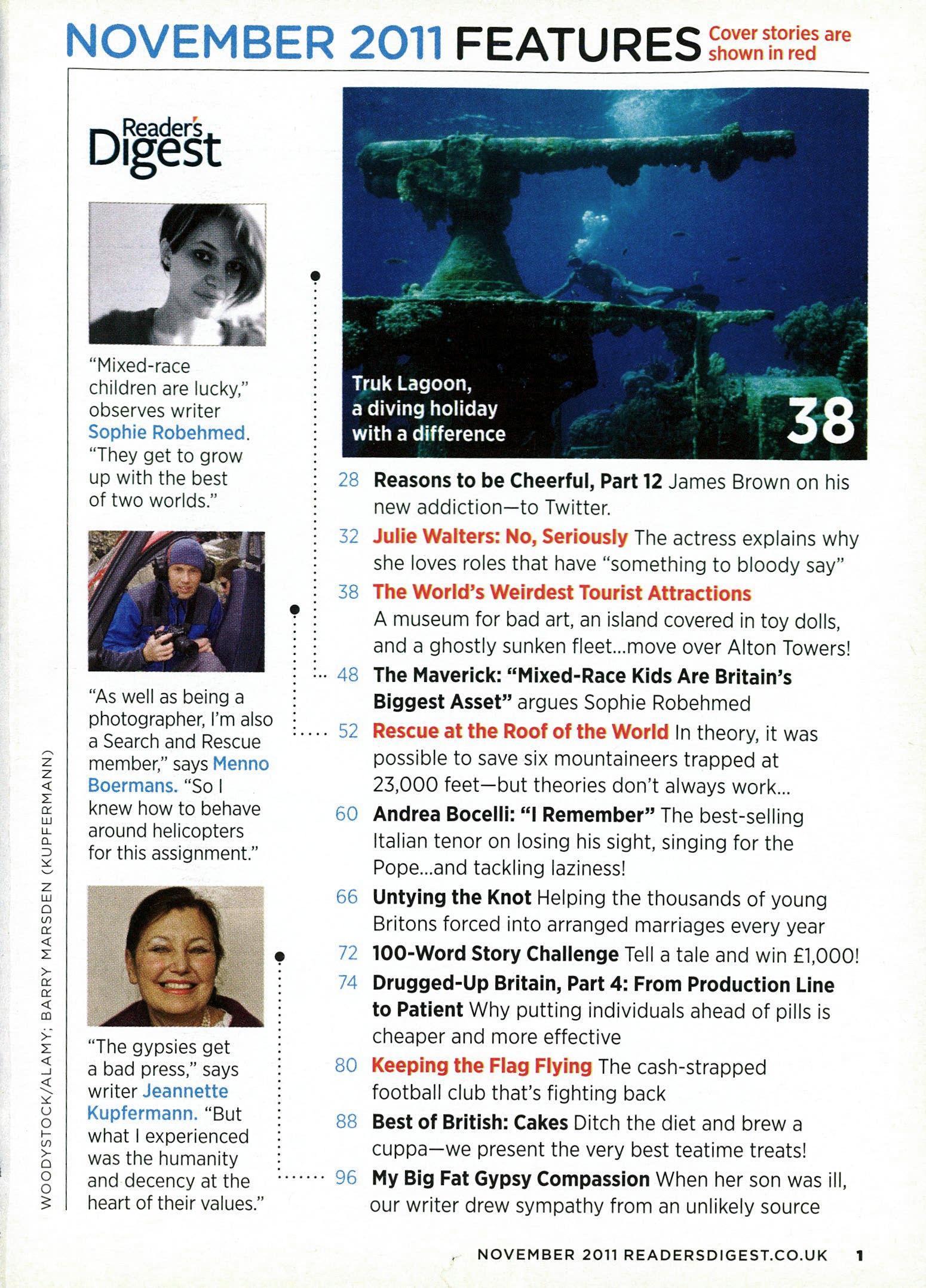
"Mixed-race children are lucky," observes writer Sophie Robehmed. "They get to grow up with the best of two worlds."
"As well as being a photographer, I'm also a Search and Rescue member," says Menno Boermans. "So I knew how to behave around helicopters for this assignment."
Truk Lagoon, a diving holiday with a difference
28 Reasons to be Cheerful, Part 12 James Brown on his new addiction—to Twitter.
32 Julie Walters: No, Seriously The actress explains why she loves roles that have "something to bloody say"
38 The World's Weirdest Tourist Attractions
A museum for bad art, an island covered in toy dolls, and a ghostly sunken fleet...move over Alton Towers!
48 The Maverick: "Mixed-Race Kids Are Britain's Biggest Asset"argues Sophie Robehmed
52 Rescue at the Roof of the World In theory, it was possible to save six mountaineers trapped at 23,000 feet—but theories don't always work...
60 Andrea Bocelli: "I Remember"The best-selling Italian tenor on losing his sight, singing for the Pope...and tackling laziness!
66 Untying the Knot Helping the thousands of young Britons forced into arranged marriages every year
72 100-Word Story Challenge Tell a tale and win £1,000!
"The gypsies get a bad press," says writer Jeannette Kupfermann. "But what I experienced was the humanity and decency at the heart of their values."
74 Drugged-Up Britain, Part 4: From Production Line to Patient Why putting individuals ahead of pills is cheaper and more effective
80 Keeping the Flag Flying The cash-strapped football club that's fighting back
88 Best of British: Cakes Ditch the diet and brew a cuppa—we present the very best teatime treats!
96 My Big Fat Gypsy Compassion When her son was ill, our writer drew sympathy from an unlikely source
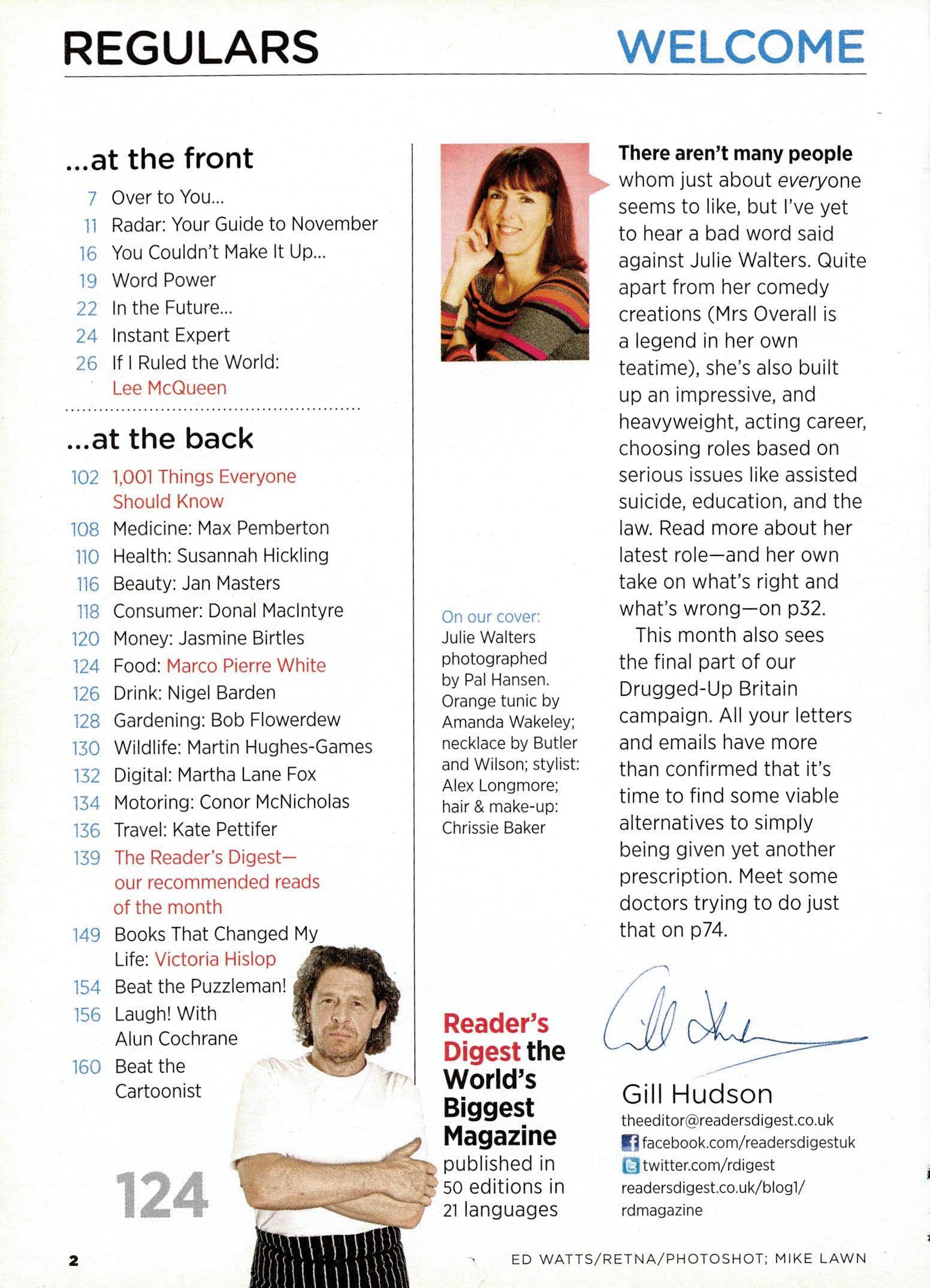
16 You Couldn't Make It Up... 19 Word Power 22 In the Future...
24 Instant Expert
26 If I Ruled the World: Lee McQueen
102 1,001 Things Everyone Should Know
108 Medicine: Max Pemberton
110 Health: Susannah Hickling
116 Beauty: Jan Masters
118 Consumer: Donal Maclntyre
120 Money: Jasmine Birtles
124 Food: Marco Pierre White
126 Drink: Nigel Barden
128 Gardening: Bob Flowerdew
130 Wildlife: Martin Hughes-Games
132 Digital: Martha Lane Fox
134 Motoring: Conor McNicholas
136 Travel: Kate Pettifer
139 The Reader's Digest— our recommended reads of the month
149 Books That Changed My Life: Victoria Hislop
154 Beat the Puzzleman!
156 Laugh! With Alun Cochrane
160 Beat the Cartoonist
On our cover: Julie Walters photographed by Pal Hansen. Orange tunic by Amanda Wakeley; necklace by Butler and Wilson; stylist: Alex Longmore; hair & make-up: Chrissie Baker
There aren't many people whom just about everyone seems to like, but I've yet to hear a bad word said against Julie Walters. Quite apart from her comedy creations (Mrs Overall is a legend in her own teatime), she's also built up an impressive, and heavyweight, acting career, choosing roles based on serious issues like assisted suicide, education, and the law. Read more about her latest role—and her own take on what's right and what's wrong—on p32. This month also sees the final part of our Drugged-Up Britain campaign. All your letters and emails have more than confirmed that it's time to find some viable alternatives to simply being given yet another prescription. Meet some doctors trying to do just that on p74.
Gill Hudson
theeditor@readersdigest.co.uk facebook.com/readersdigestuk twitter.com/rdigest readersdigest.co.uk/blogl/ rdmagazine
TRY
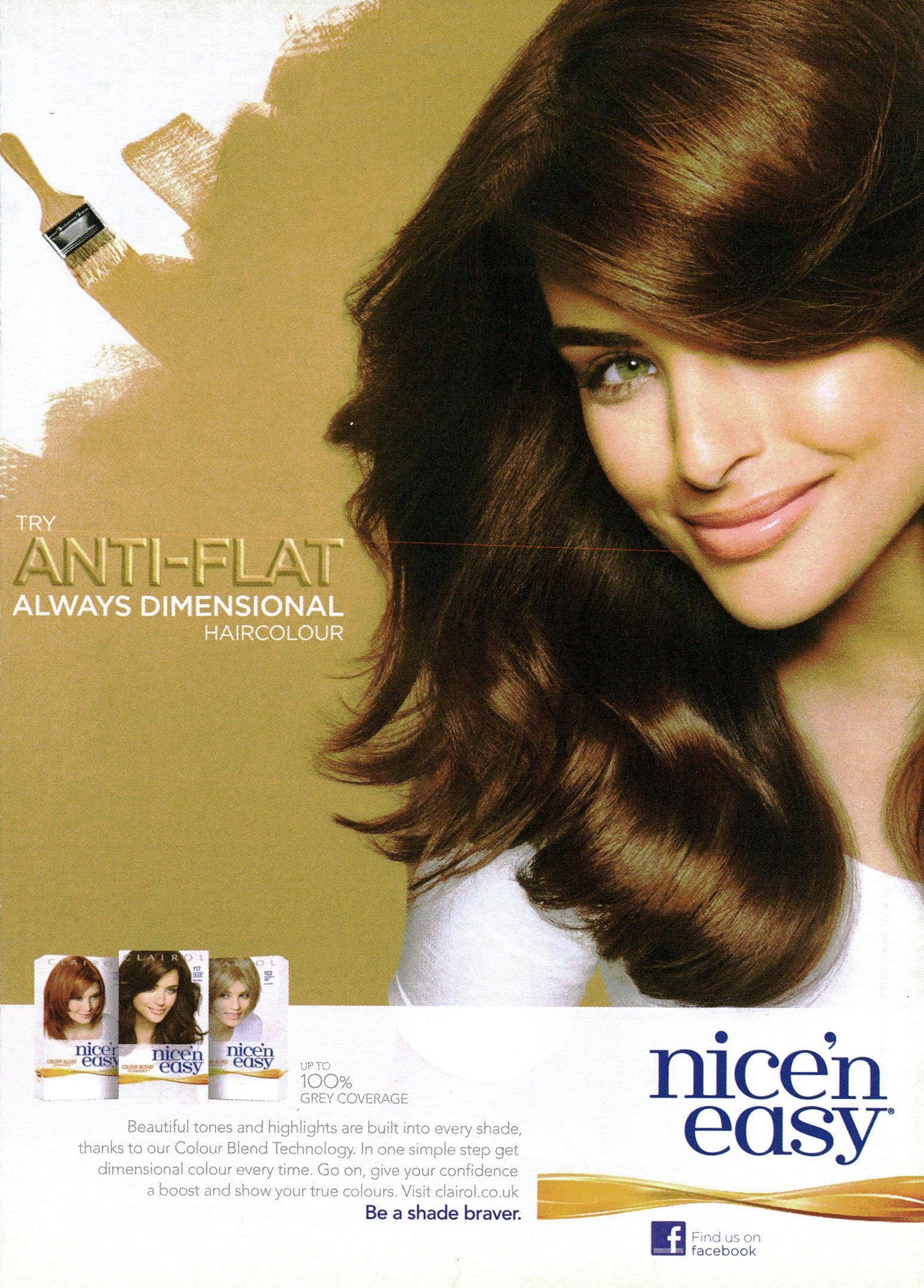
ALWAYS DIMENSIONAL HAIRCOLOUR
100% GREY COVERAGE
Beautiful tones and highlights are built into every shade, thanks to our Colour Blend Technology. In one simple step get dimensional colour every time. Go on give your confidence a boost and show your true colours. Visit clairol.co.uk Be a shade braver.
Send us your stories, jokes and letters— if they're published, we'll pay
WE PAY £50 for the star letter, £30 for normal letters and £15 for short extracts. Email readers letters@readersdigest. co.uk or write to Readers' Letters, Reader's Digest, 157 Edgware Road, London W2 2HR.
WE ALSO PAY £70 for the true stories, anecdotes, jokes in Laugh! and You Couldn't Make It Up..., and contributions to endof-article fillers, Travel and Gardening. Email excerpts@ readersdigest.co.uk or write to Excerpts, Reader's Digest, 157 Edgware Road, London W2 2HR
Ensure submissions are not previously published. Include your name, email, address and daytime phone number with all correspondence. We may edit letters and use them in all print and electronic media. Contributions used become world copyright of Vivat Direct Ltd (t/a Reader's Digest).
SORRY! We cannot acknowledge or return unpublished items or unsolicited articlelength manuscripts. Do not send SAES. Article-length stories, poetry and cartoons are not requested.

SUBSCRIBE!
Visit readersdigest.co.uk or write to Reader's Digest, PO Box 444, Douglas, Isle of Man, IM99 3ZF.
UK: £42 a year. Republic of Ireland: €74.39 a year. Europe: £50 a year. Rest of the world: £60 a year. Prices include delivery.
GIFT SUBSCRIPTION? CHANGE OF ADDRESS?
Contact Customer Services for renewals, gifts, address changes, payments, account information and all other enquiries. Phone: 0871 351 1000* Email: Gust service @readersdigest.co.uk
Minicom: 0870 600 1153
We're delighted that Reader's Digest has been shortlised in four categories for the prestigious BSME Awards—Editor of the Year and 2011 Editors' Editor of the Year (Gill Hudson, left), Art Director of the Year (Martin Colyer, right), and Innovation/Brand-Building Initiative (for our 100-Word Story competition). The Digest team will be attending the ceremony on November 8 with all our fingers and toes crossed—but we wouldn't be there at all without our loyal readers!

Do you have an aunt who's obsessed with Downton Abbey, a mum who's hoping for Jamie Oliver's latest cookbook, or a brother who's been desperately dropping hints about a digital camera?
Stay ahead of the game this Christmas by doing your gift buying at our online shop—you'll get free post and packaging, no matter how much or how little you order. Go to readersdigest.co.uk to get started.
Go onlineto see our wine columnist Nigel Barden's top tips on how to taste wine in restaurants. You'll never feel put down by a snooty sommelier again!
PLUS: Word Power Online—play for fun or for cash.
DON'T FORGET to check out our fabulous apps! Go to the iTunes music store to download our iPad app and our new walking app.

EDITORIAL
Editor-in-Chief
GILL HUDSON
Managing Editor
CATHERINE HAUGHNEY
Design Director
MARTIN COLYER
Features Editor
SIMON HEMELRYK
Deputy Production Editor
TOM BROWNE
Assistant Features Editor
ELLIE ROSE
Editorial Assistant
RACHEL SMITH
Art Editor
HUGH KYLE
Picture Researcher
ROBERTA MITCHELL
Contributing Editors
CAROLINE HUTTON
HARRY MOUNT
JAMES WALTON
Health Editor
SUSANNAH HICKLING
Website Assistant
JASMINE BEGOM
ADVERTISING
Account Directors
DOMINIC EDDON
PAUL EYERS
SIMON FULTON
Magazine Executive
MARINA JOANNOU
Publishing Director
ERIC FULLER
CHIEF EXECUTIVE OFFICER
THIERRY BOUZAC
THE READER'S DIGEST ASSOCIATION INC
President and Chief
Executive Officer
ROBERT E GUTH
President, RD Europe
DAWN ZIER
VP, Global Editor-in-Chief
Reader's Digest
PEGGY NORTHROP
£30 FOR EACH PUBLISHED LETTER,
£15 FOR SHORTER EXTRACTS,
£50 FOR THE LETTER OF THE MONTH! SEE P4 FOR MORE DETAILS
ThEMAVERICK
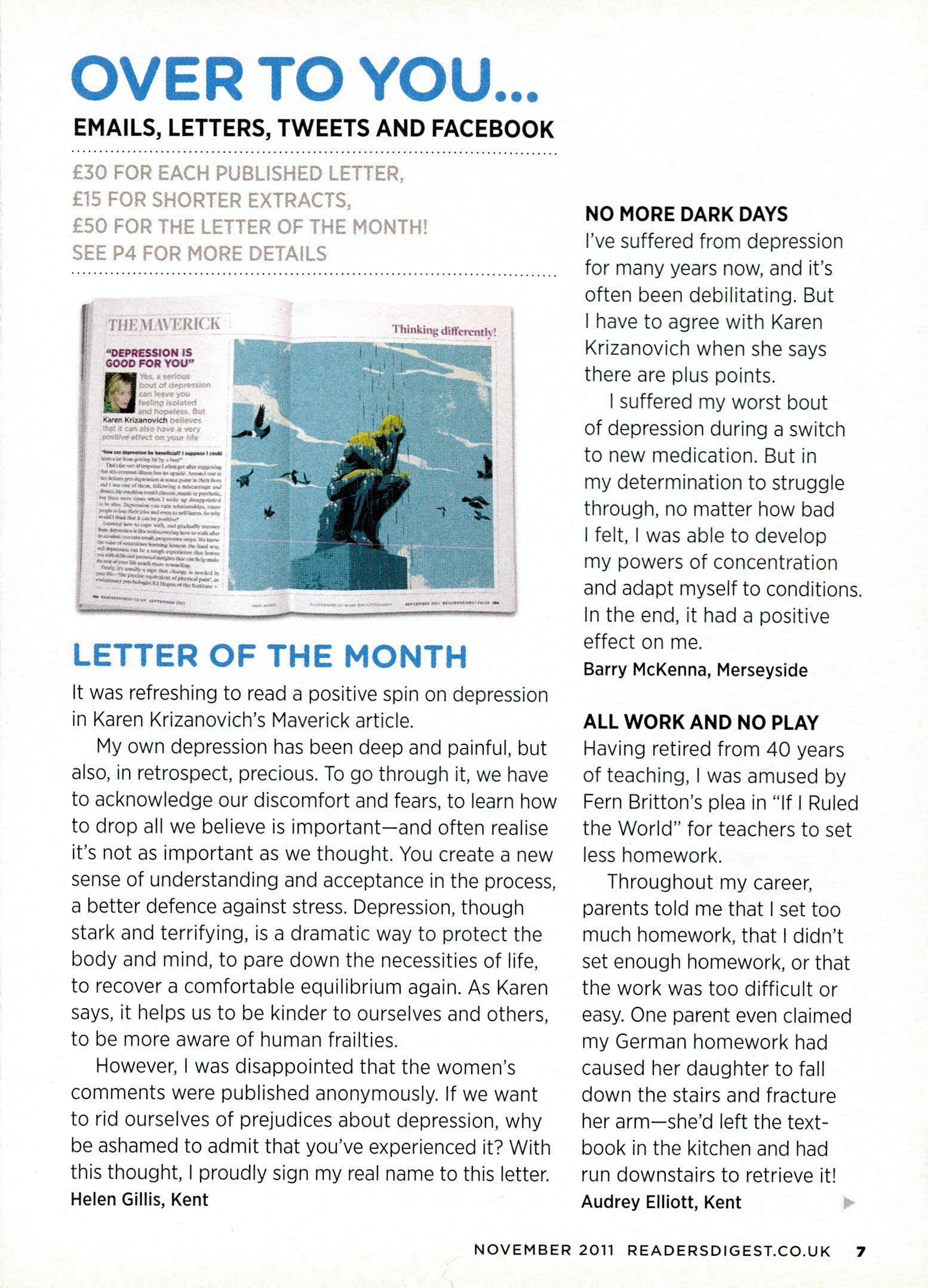
It was refreshing to read a positive spin on depression in Karen Krizanovich's Maverick article.
My own depression has been deep and painful, but also, in retrospect, precious. To go through it, we have to acknowledge our discomfort and fears, to learn how to drop all we believe is important—and often realise it's not as important as we thought. You create a new sense of understanding and acceptance in the process, a better defence against stress. Depression, though stark and terrifying, is a dramatic way to protect the body and mind, to pare down the necessities of life, to recover a comfortable equilibrium again. As Karen says, it helps us to be kinder to ourselves and others, to be more aware of human frailties.
However, I was disappointed that the women's comments were published anonymously. If we want to rid ourselves of prejudices about depression, why be ashamed to admit that you've experienced it? With this thought, I proudly sign my real name to this letter. Helen Gillis, Kent
I've suffered from depression for many years now, and it's often been debilitating. But I have to agree with Karen Krizanovich when she says there are plus points.
I suffered my worst bout of depression during a switch to new medication. But in my determination to struggle through, no matter how bad I felt, I was able to develop my powers of concentration and adapt myself to conditions. In the end, it had a positive effect on me.
Barry McKenna, Merseyside
Having retired from 40 years of teaching, I was amused by Fern Britton's plea in "If I Ruled the World" for teachers to set less homework.
Throughout my career, parents told me that I set too much homework, that I didn't set enough homework, or that the work was too difficult or easy. One parent even claimed my German homework had caused her daughter to fall down the stairs and fracture her arm—she'd left the textbook in the kitchen and had run downstairs to retrieve it!
Audrey Elliott, Kent ►
Dumbo's adolescence
I'm really grateful for your campaign to cut the number of drug prescriptions ("Mum's Big Drug Problem"). You've inspired me to make a list of all the tablets my mother is taking, so I can discuss it with my pharmacist. It's alarming that so many drugs have never been tested on older people.
Rhiannon Jones, Clwyd
My pharmacist asked me if I'd be willing to take part in a new project—screening all the drugs taken by patients. She went through each tablet and asked if I knew what it was for. Then she listed all the symptoms I had and the drugs I took. By doing this, she made sure I wasn't being overprescribed to.
Muriel Dale, Derbyshire
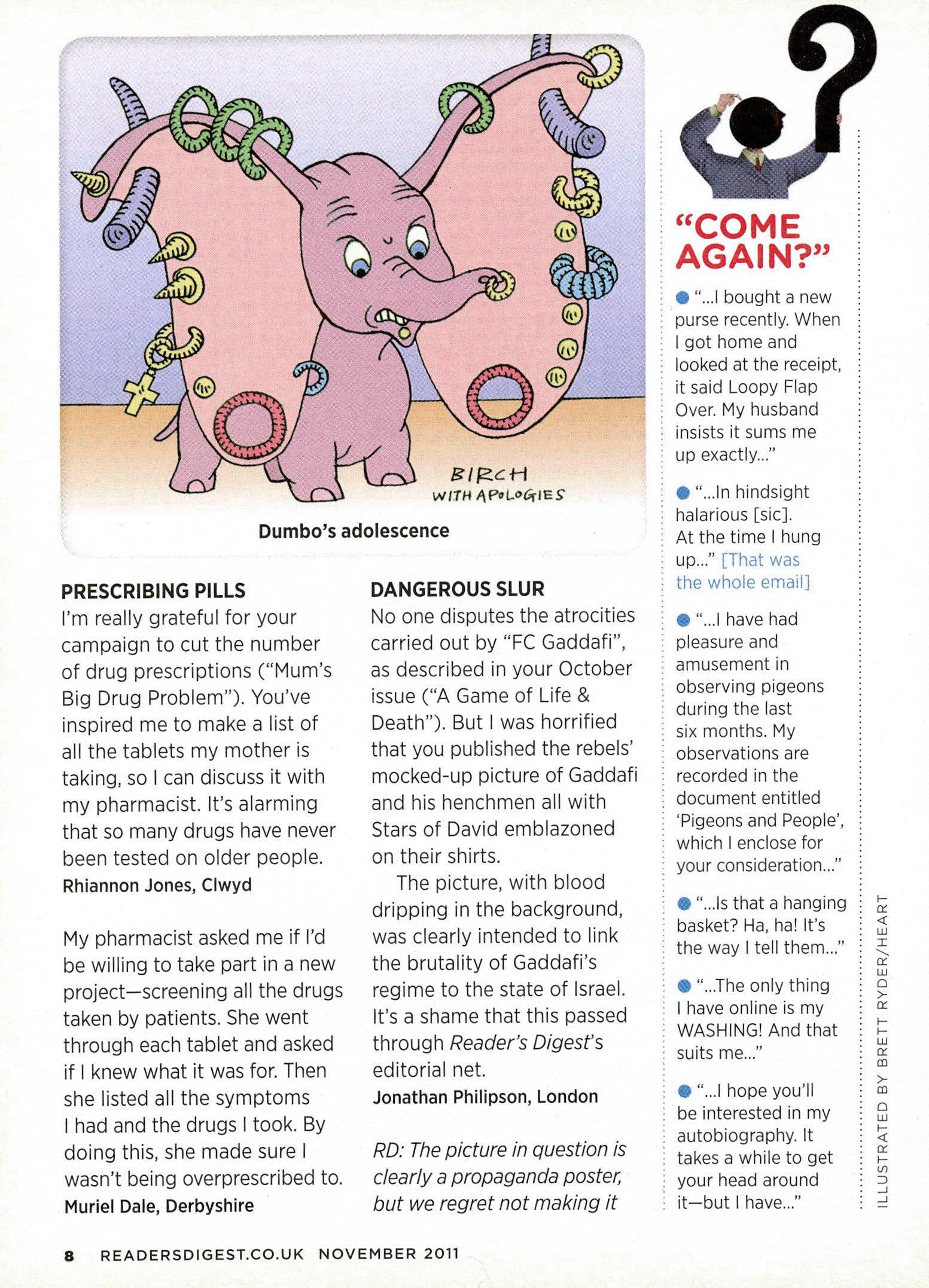
No one disputes the atrocities carried out by "FC Gaddafi", as described in your October issue ("A Game of Life & Death"). But I was horrified that you published the rebels' mocked-up picture of Gaddafi and his henchmen all with Stars of David emblazoned on their shirts.
The picture, with blood dripping in the background, was clearly intended to link the brutality of Gaddafi's regime to the state of Israel. It's a shame that this passed through Reader's Digest's editorial net.
Jonathan Philipson, London
RD: The picture in question is clearly a propaganda poster, but we regret not making it
• "...I bought a new purse recently. When I got home and looked at the receipt, it said Loopy Flap Over. My husband insists it sums me up exactly..."
• "...In hindsight halarious [sic]. At the time I hung up..." [That was the whole email]
• "...I have had pleasure and amusement in observing pigeons during the last six months. My observations are recorded in the document entitled 'Pigeons and People', which I enclose for your consideration..."
• "...Is that a hanging basket? Ha, ha! It's the way I tell them..."
• "...The only thing I have online is my WASHING! And that suits me..."
• "...I hope you'll be interested in my autobiography. It takes a while to get your head around it—but I have..."
clear that we don't condone any of the offensive implications in the image.
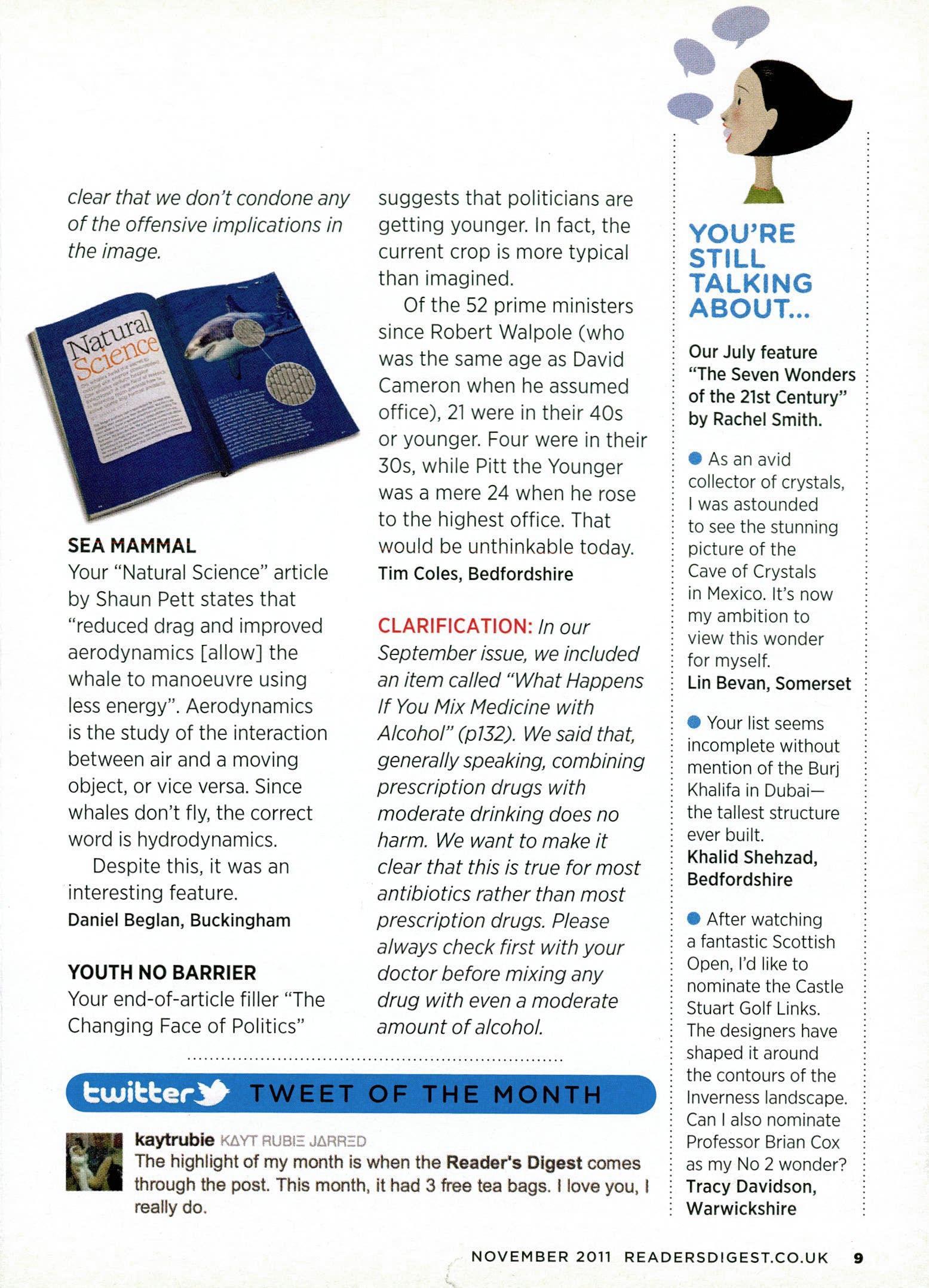
Your "Natural Science" article by Shaun Pett states that "reduced drag and improved aerodynamics [allow] the whale to manoeuvre using less energy". Aerodynamics is the study of the interaction between air and a moving object, or vice versa. Since whales don't fly, the correct word is hydrodynamics.
Despite this, it was an interesting feature.
Daniel Beglan, Buckingham
Your end-of-article filler "The Changing Face of Politics"
suggests that politicians are getting younger. In fact, the current crop is more typical than imagined.
Of the 52 prime ministers since Robert Walpole (who was the same age as David Cameron when he assumed office), 21 were in their 40s or younger. Four were in their 30s, while Pitt the Younger was a mere 24 when he rose to the highest office. That would be unthinkable today.
Tim Coles, Bedfordshire
CLARIFICATION: In our September issue, we included an item called "What Happens If You Mix Medicine with Alcohol" (p132). We said that, generally speaking, combining prescription drugs with moderate drinking does no harm. We want to make it clear that this is true for most antibiotics rather than most prescription drugs. Please always check first with your doctor before mixing any drug with even a moderate amount of alcohol.
YOU'RE STILL TALKING ABOUT...
Our July feature "The Seven Wonders of the 21st Century" by Rachel Smith.
• As an avid collector of crystals, I was astounded to see the stunning picture of the Cave of Crystals in Mexico. It's now my ambition to view this wonder for myself.
Lin Bevan, Somerset
• Your list seems incomplete without mention of the Bun Khalifa in Dubai— the tallest structure ever built.
Khalid Shehzad, Bedfordshire
III kaytruble KAYT RUBE JARRED
The highlight of my month is when the Reader's Digest comes through the post. This month, it had 3 free tea bags. I love you, I really do.
• After watching a fantastic Scottish Open, I'd like to nominate the Castle Stuart Golf Links. The designers have shaped it around the contours of the Inverness landscape. Can I also nominate Professor Brian Cox as my No 2 wonder?
Tracy Davidson, Warwickshire

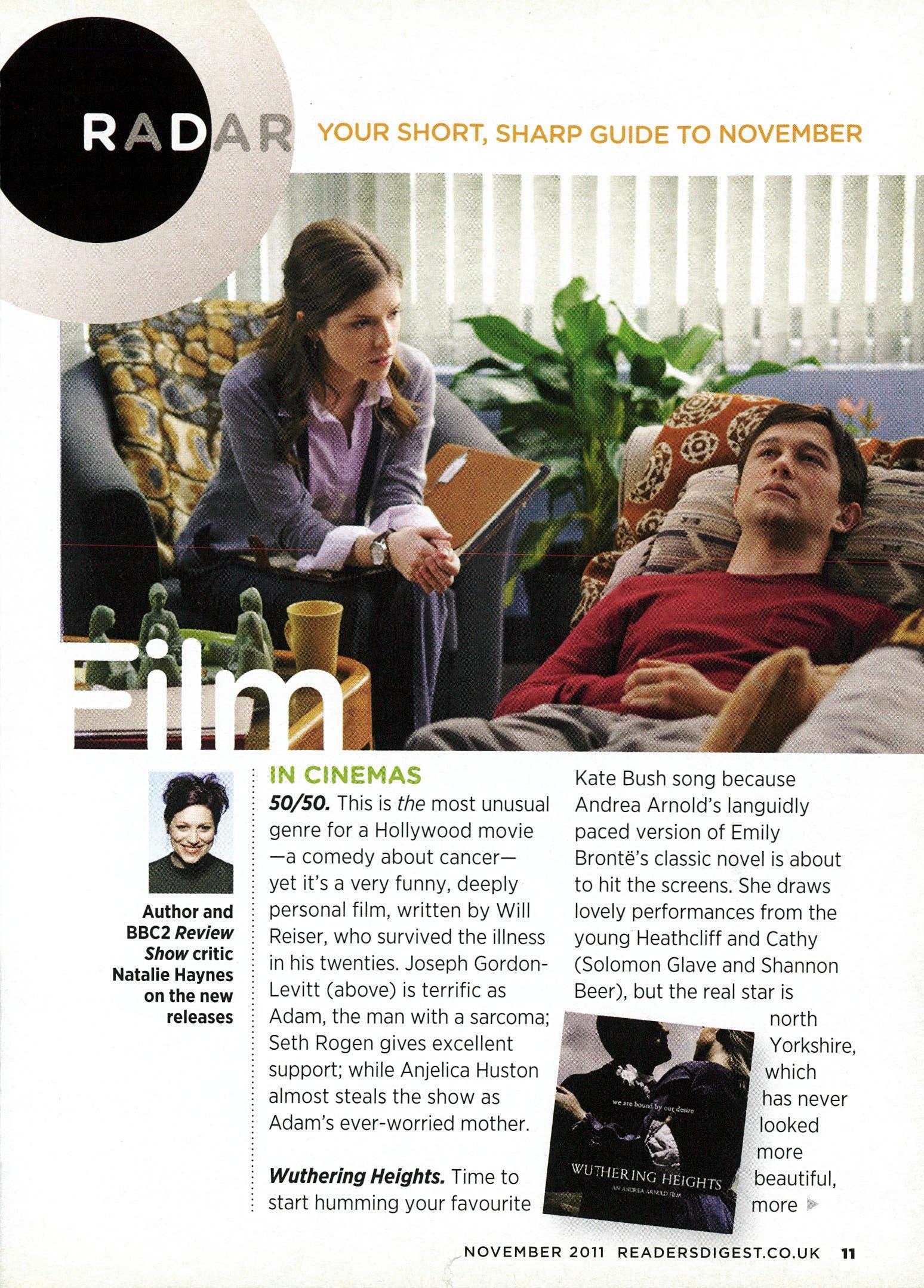
50/50. This is the most unusual genre for a Hollywood movie —a comedy about cancer— yet it's a very funny, deeply personal film, written by Will Reiser, who survived the illness in his twenties. Joseph GordonLevitt (above) is terrific as Adam, the man with a sarcoma; Seth Rogen gives excellent support; while Anjelica Huston almost steals the show as Adam's ever-worried mother.
Wuthering Heights. Time to start humming your favourite
Kate Bush song because Andrea Arnold's languidly paced version of Emily Bronte's classic novel is about to hit the screens. She draws lovely performances from the young Heathcliff and Cathy (Solomon Glave and Shannon Beer), but the real star is north Yorkshire, which has never looked more beautiful, more
Author and BBC2 Reviewbrooding or more brutal. A slow-burning treat.
Bridesmaids.
I don't usually go for films about weddings, shoes and dresses, but this is a cut above the average girlcorm Kristen Wiig stars as maidof-honour Annie, trying to organise a perfect hen night, recover from her failed cupcake business and meet a nice chap. But she keeps ignoring Chris O'Dowd, the sweetest policeman ever seen. Mildred Pierce. It was made for TV, but everything about this highend weepie feels cinematic. Kate Winslet stars as the eponymous single mum trying to have it all, while Todd Haynes' sumptuous direction brings 1930s America right into your living room. Try not to walk in front of a Cadillac while it's there.
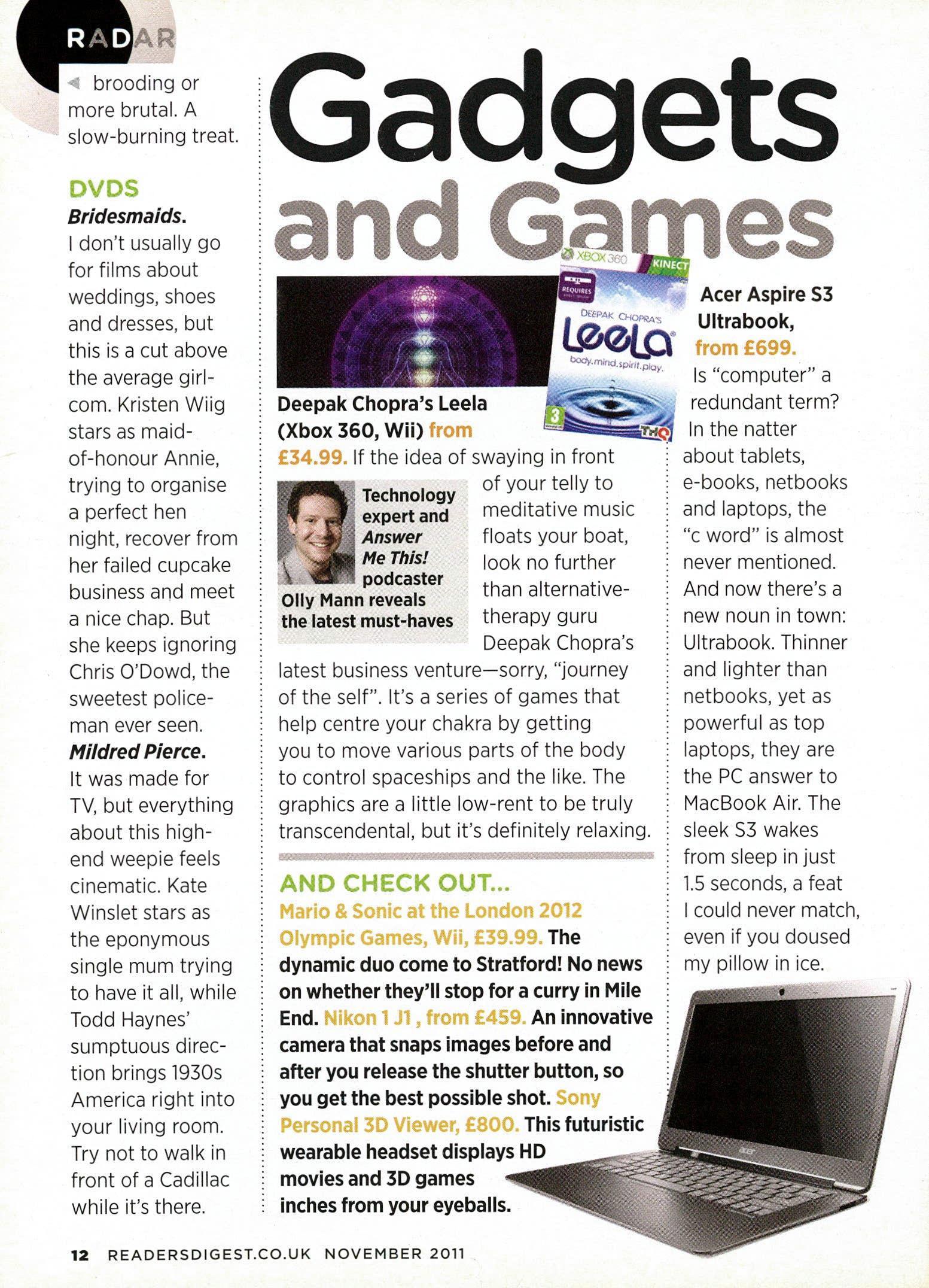
Deepak Chopra's Leela
(Xbox 360, Wii)
Technology expert and Answer Me This! podcaster 011y Mann reveals the latest must-haves
£34.99. If the idea of swaying in front of your telly to meditative music floats your boat, look no further than alternativetherapy guru Deepak Chopra's latest business venture—sorry, "journey of the self". It's a series of games that help centre your chakra by getting you to move various parts of the body to control spaceships and the like. The graphics are a little low-rent to be truly transcendental, but it's definitely relaxing.
Mario & Sonic at the Londe lf)" Olympic Games, Wii, The dynamic duo come to Stratford! No news on whether they'll stop for a curry in Mile End. An innovative camera that snaps images before and after you release the shutter button, so you get the best possible shot. PE Jer, tbou.This futuristic wearable headset displays HD movies and 3D games inches from your eyeballs.
Acer Aspire S3 Ultrabook, from £699. Is "computer" a redundant term?
In the natter about tablets, e-books, netbooks and laptops, the "c word" is almost never mentioned. And now there's a new noun in town: Ultrabook. Thinner and lighter than netbooks, yet as powerful as top laptops, they are the PC answer to MacBook Air. The sleek S3 wakes from sleep in just 1.5 seconds, a feat I could never match, even if you doused my pillow in ice.
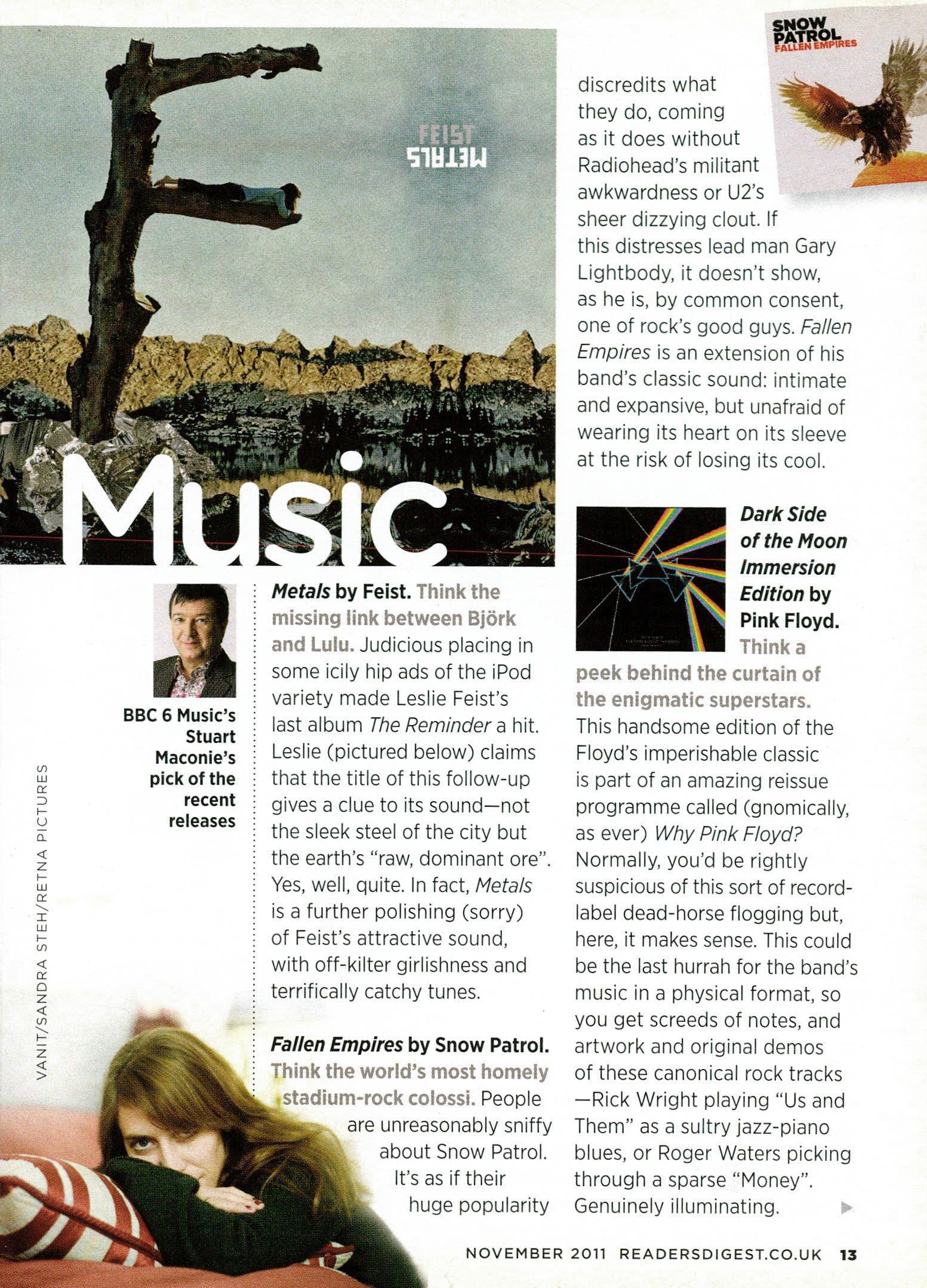
Metals by Feist. !funk th,. missing link between Bjork and Lulu. Judicious placing in some icily hip ads of the iPod variety made Leslie Feist's last album The Reminder a hit.
Leslie (pictured below) claims that the title of this follow-up gives a clue to its sound—not the sleek steel of the city but the earth's "raw, dominant ore".
Yes, well, quite. In fact, Metals is a further polishing (sorry) of Feist's attractive sound, with off-kilter girlishness and terrifically catchy tunes.
Fallen Empires by Snow Patrol. Think the world's most homely stadium-rock colossi. People are unreasonably sniffy about Snow Patrol. It's as if their huge popularity
discredits what they do, coming as it does without Radiohead's militant awkwardness or U2's sheer dizzying clout. If this distresses lead man Gary Lightbody, it doesn't show, as he is, by common consent, one of rock's good guys.Fallen Empires is an extension of his band's classic sound: intimate and expansive, but unafraid of wearing its heart on its sleeve at the risk of losing its cool.
f the eSide Moon o 0 n kaki■le Immersion r Ttilli Edition by Pink Floyd. Think a peek behind the curtain of the enigmatic superstars. This handsome edition of the Floyd's imperishable classic is part of an amazing reissue programme called (gnomically, as ever) Why Pink Floyd? Normally, you'd be rightly suspicious of this sort of recordlabel dead-horse flogging but, here, it makes sense. This could be the last hurrah for the band's music in a physical format, so you get screeds of notes, and artwork and original demos of these canonical rock tracks —Rick Wright playing "Us and Them" as a sultry jazz-piano blues, or Roger Waters picking through a sparse "Money". Genuinely illuminating. o.
Pharaonic Race, Egypt, Running 100km in one day is foolhardy—doing so in a desert is flagrantly idiotic. But some hearty masochists will be doing just that in the11th modern-day running of this 2,600-year-old event.
Race founder King Taharqa will be jogging with excitement in his sarcophagus as entrants plod along, cursing sand, dodging pyramids and wondering what the hell they're doing with their lives.
ATP World Tour tennis finals, London, November 20-27. In a staggering year that's seem him scoop three Grand Slam titles, Novak Djokovic has shattered the FedererNadal hegemony, like an angry child banging his fist
ESPNcricinfo cricket blogger, broadcaster and stand-up Andy Zaltzman previews the best of the month's action
on a poppadom. He's also continued to set standards for unnecessary ball bouncing— regularly topping 20 bounces before finally remembering to lob the projectile into the air and whack it with his racket. He'll no doubt be looking to squeeze this latest piece of silverware onto his bulging list of achievements.
NBA season starts November 1. The FA Cup first round November 12. Brazilian Grand Prix November 27.
November; Guy Fawkes Night. November 11-20 London Jazz Festival. her11-13
Top Gear Live, NEC, Birmingham. A AR November 17 World Philosophy Day. ALSO ON OUR
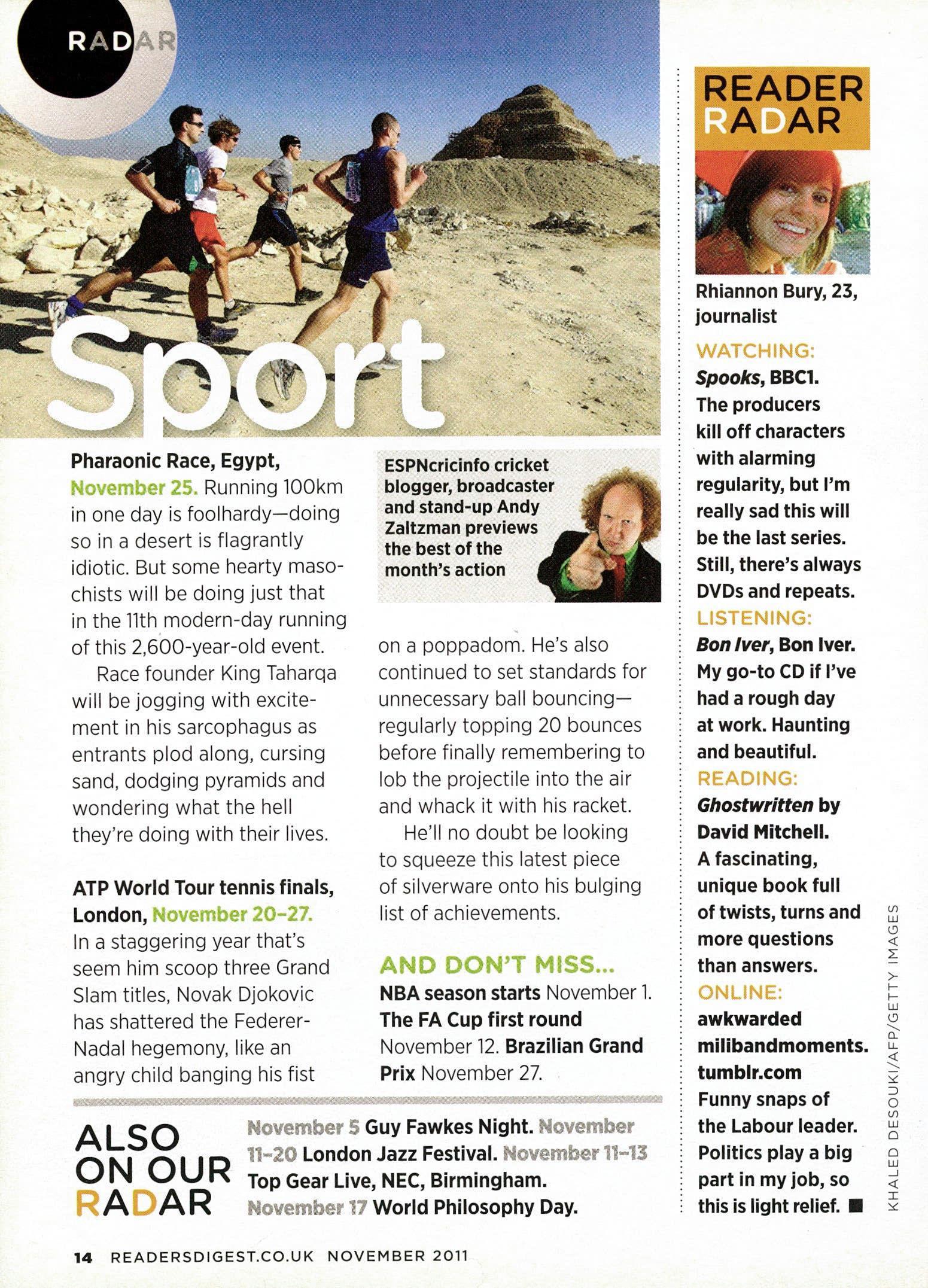 Rhiannon Bury, 23, journalist
Rhiannon Bury, 23, journalist
Spooks, BBC1. The producers kill off characters with alarming regularity, but I'm really sad this will be the last series. Still, there's always DVDs and repeats.
Bon Iver, Bon Iver. My go-to CD if I've had a rough day at work. Haunting and beautiful.
Ghostwritten by David Mitchell.
A fascinating, unique book full of twists, turns and more questions than answers.
awkwarded milibandmoments. tumblr.com
Funny snaps of the Labour leader. Politics play a big part in my job, so this is light relief. •

1 My mother was upset to discover that her car number plates had been stolen. So imagine my surprise and elation when I spotted the plates on a another car later that day.
I turned round and started following, phoning my father on the handsfree to tell him. As I was in pursuit, my father asked me where I was. It slowly dawned on us that I was in the car behind him.
My observational skills had failed to detect that I was following my mum's car, sporting replacement plates from my dad.
Kathleen Sadler, London
1 I was looking at my daughter's English exercise book during a parents' evening. One lesson had involved defining words, and next to "dilate" she had put "to live longer".
Sali Thomas, Denbighshire
1 An elderly friend, a widow living alone, told me she'd been woken late by her phone ringing.
"I thought one of my grandchildren was in
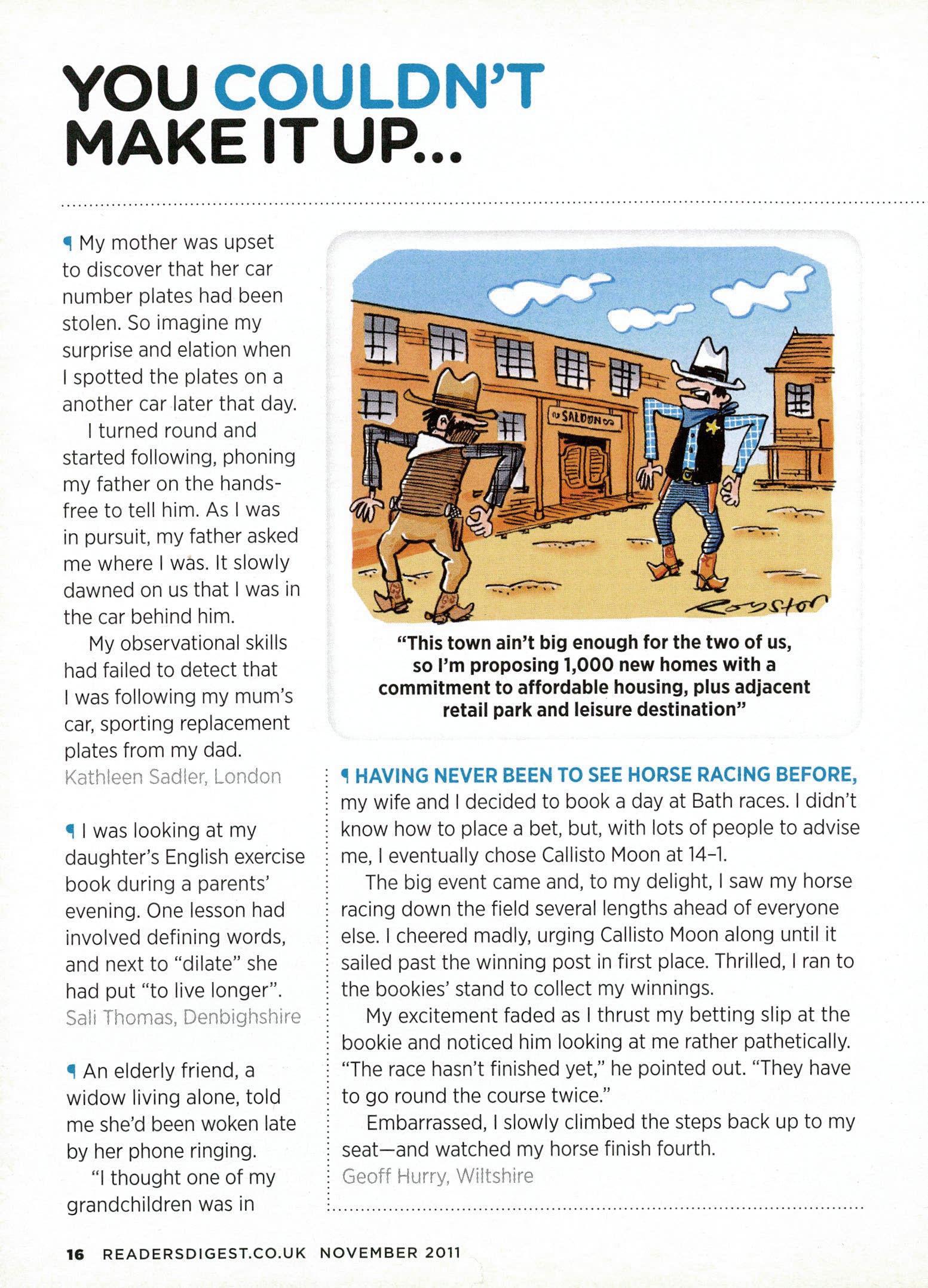
(7-11
"This town ain't big enough for the two of us, so I'm proposing 1,000 new homes with a commitment to affordable housing, plus adjacent retail park and leisure destination"
HAVING NEVER BEEN TO SEE HORSE RACING BEFORE, my wife and I decided to book a day at Bath races. I didn't know how to place a bet, but, with lots of people to advise me, I eventually chose Callisto Moon at 14-1.
The big event came and, to my delight, I saw my horse racing down the field several lengths ahead of everyone else. I cheered madly, urging Callisto Moon along until it sailed past the winning post in first place. Thrilled, I ran to the bookies' stand to collect my winnings.
My excitement faded as I thrust my betting slip at the bookie and noticed him looking at me rather pathetically. "The race hasn't finished yet," he pointed out. "They have to go round the course twice."
Embarrassed, I slowly climbed the steps back up to my seat—and watched my horse finish fourth.
Geoff Hurry, Wiltshire
trouble," she said, "but it was one of those obscene calls."
"Were you scared?" I asked. "I was so relieved it wasn't a family emergency that I laughed my socks off," she replied. "Then he went quiet, so I said, `I'm sorry, dear, you're not very good at this, are you? Is it your first time?' and he rang off."
I doubt he called back either!
Pat Metcalfe, Derbyshire
I My son, who's a teacher, was discussing religion in his class of eight-year-olds. One girl said that her dad was a Roman Catholic.
"Is your mum a Catholic as well?" asked my son.
"Oh, no," she replied. "She's a Prostitute."
Joy Wright, Oxfordshire
The man sitting next to me on a recent flight was terrified of planes. He couldn't stop shaking, so I suggested he get himself a large Scotch from the trolley. This he did, drinking it down
1 ONE MORNING ON THE way to work, I spotted my friend standing at the bus stop in her Marks & Spencer uniform.
Feeling charitable, I pulled over, opened the
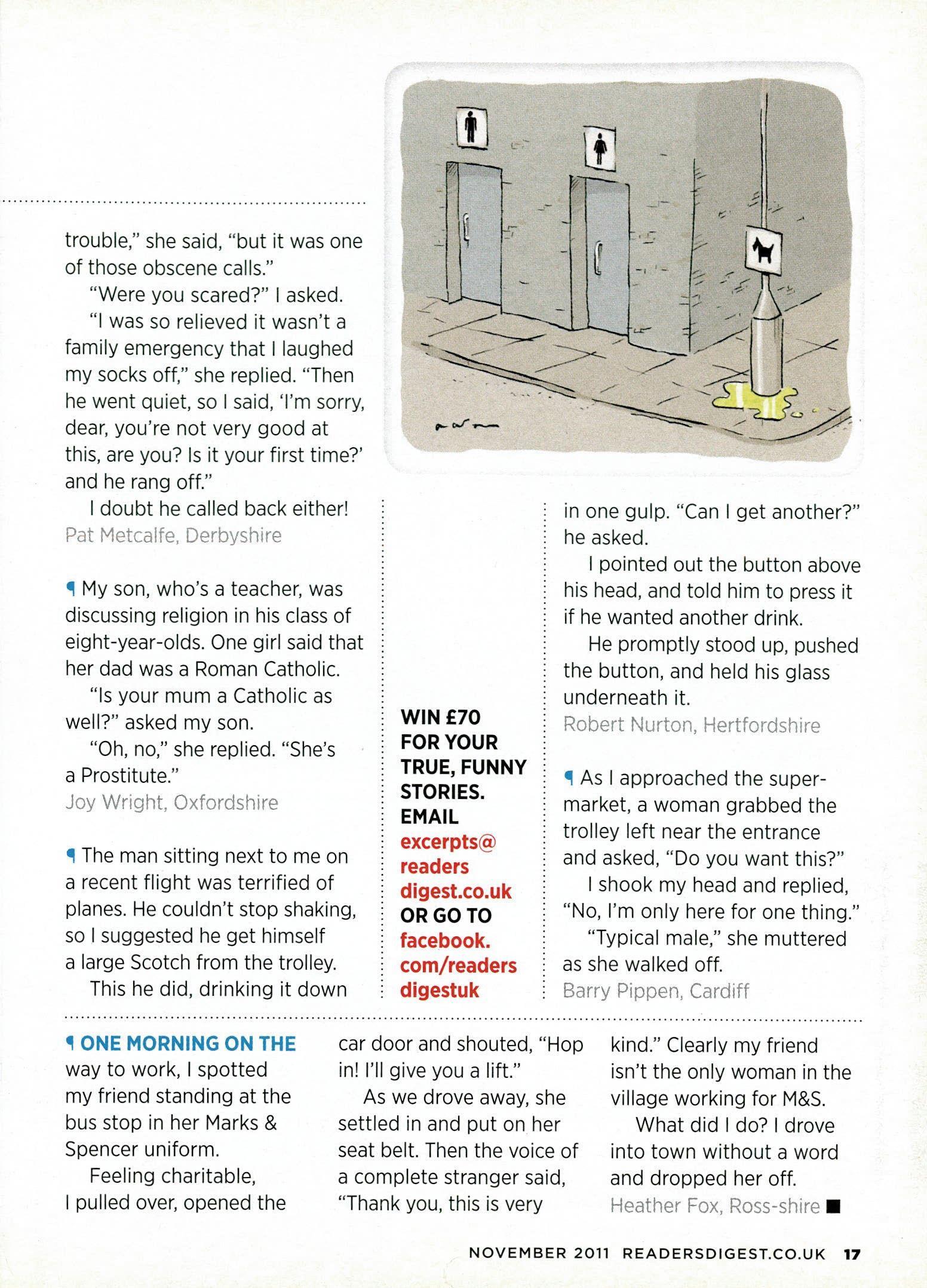
excerpts@ readers digest.co.uk OR GO TO facebook. com/readers digestuk
in one gulp. "Can I get another?" he asked.
I pointed out the button above his head, and told him to press it if he wanted another drink. He promptly stood up, pushed the button, and held his glass underneath it.
Robert Nurton, Hertfordshire
1 As I approached the supermarket, a woman grabbed the trolley left near the entrance and asked, "Do you want this?" I shook my head and replied, "No, I'm only here for one thing." "Typical male," she muttered as she walked off.
Barry Pippen, Cardiff
car door and shouted, "Hop in! I'll give you a lift."
As we drove away, she settled in and put on her seat belt. Then the voice of a complete stranger said, "Thank you, this is very kind." Clearly my friend isn't the only woman in the village working for M&S. What did I do? I drove into town without a word and dropped her off.
Heather Fox, Ross-sh, ■
One hour learning to fly
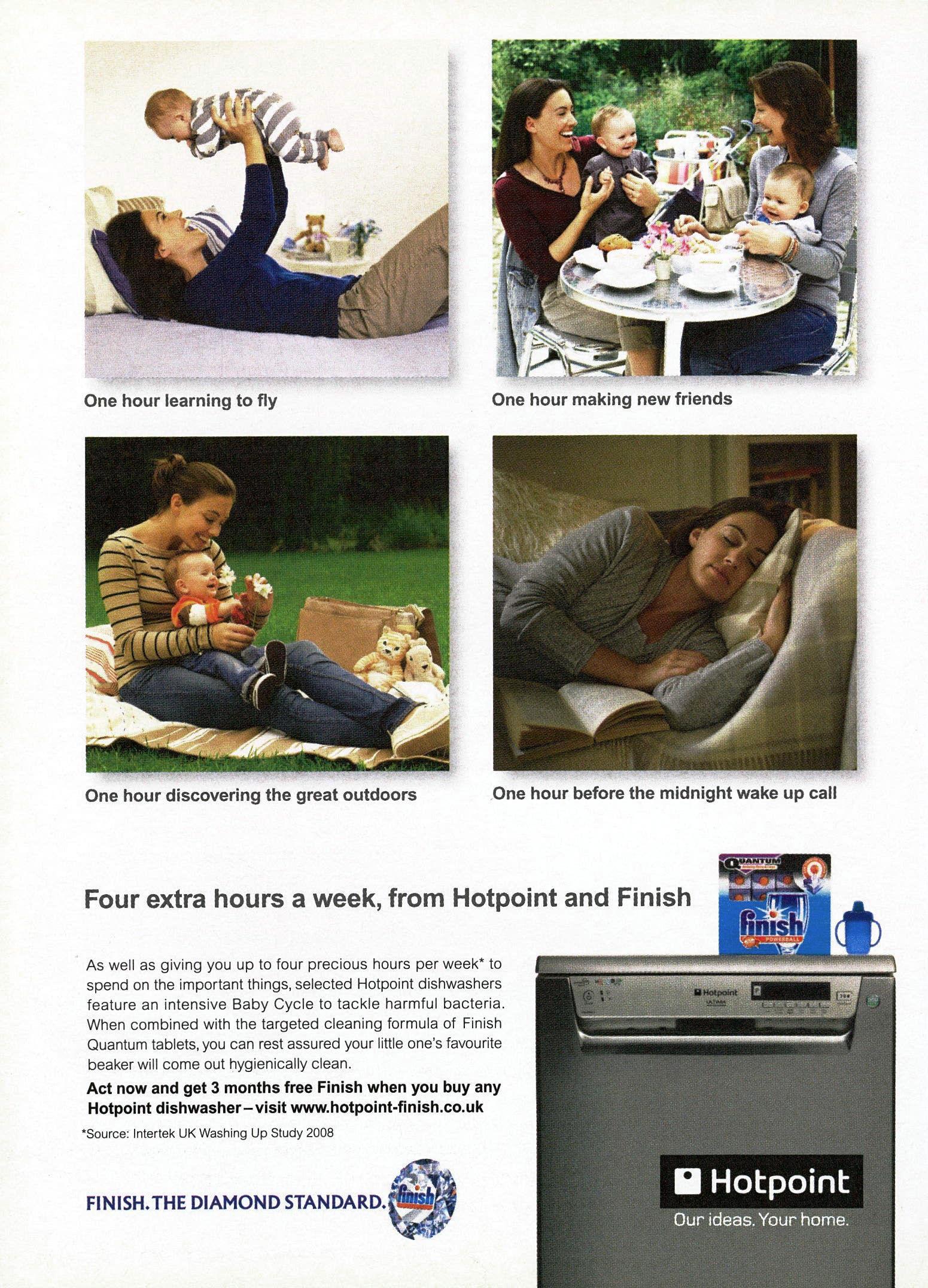
One hour making new friends
As well as giving you up to four precious hours per week* to spend on the important things, selected Hotpoint dishwashers feature an intensive Baby Cycle to tackle harmful bacteria. When combined with the targeted cleaning formula of Finish Quantum tablets, you can rest assured your little one's favourite beaker will come out hygienically clean.
Act now and get 3 months free Finish when you buy any Hotpoint dishwasher—visit www.hotpoint-finish.co.uk
*Source: Intertek UK Washing Up Study 2008
One hour discovering the great outdoors"Movember" is an annual event that encourages men to grow moustaches for cancer awareness (I'm particularly proud of my effort). To mark the occasion, this month's words are all hair-related. Answer A, B or C below.
1 peruke (per-ook) n
A nostril hair B wig
C dog hair
2 follicle n
A spiky hair B split end
C gland or cavity at the root of a hair
3 keratin (ker-uh-tin) n
A curling tong B knotted hair c fibrous protein that makes up hair
4 strop n
A razor sharpener
B plait C scissors
5 sideburn n
A bob hairstyle
B hair on the face
C hairdresser's cupboard
6 pomade (pom-aid) n
A scented hair oil
B apple-shaped head
C hair restorer
7 tonsure (ton-syure) n
A scalp moisturiser
B medieval razor
C shaved crown
antimacassar n
A cover to protect chair from hair oil
B dandruff shampoo
C lank hair

9 perm n
A skinhead B layered hair C tight curls
10 peroxide n
A stubble B hair bleach
C barber's disinfectant
11 cornrow n
A braided hair B ponytail
C dyed lock
COVER STAR JULIE '*k favourite word? "Baba, because it's baby talk and sums up lovely babies."
12 forelock n
A longest tuft of hair
B white streak C hair at top of forehead
13 crew cut n
A large hairdresser's
B short haircut
C fashionable hair colour
14 payot (pay-ott) n
A tweezer B long side-curl worn by observant Jews
C ancient Greek hairstyle
15 mullet n
A fish-shaped haircut
B hair-washing sink
C short hair at the front, long at the back
is taking off as a word to describe doctors who work night shifts. The word was used as early as the 19th century to describe artists who painted nocturnes—night scenes— and musicians who composed themes reminiscent of the night. But the medical version has only caught on in the last year or so, particularly in the US.
RD Rating Useful? 7/10 Likeable? 6/10
9-11 getting there 12-13 impressive 14-15 word-power wizard!
1 peruke—B wig. "Rather than going for a comb over, he should find himself a peruke." French perruque.
2 follicle—C gland or cavity at the root of a hair. "They had to insert the transplanted hairs into new follicles." Latin follis (bellows).
3 keratin—C fibrous protein that makes up hair. "Keratin is also found in animal hooves." Greek keras (horn).
4 strop—A razor sharpener. "The barber used a leather strop." Latin stroppus.
5 sideburn—B hair on the side of the face. "His sideburns practically met at his chin."
6 pomade—A scented hair oil. "His pomade kept the flies off." French pommade.
7 tonsure—C shaved crown. "Monks wore the tonsure style."
Latin tonsura.
8antimacassar—A cover to protect a chair from hair oil. "The antimacassar had a headshaped mark on it." From
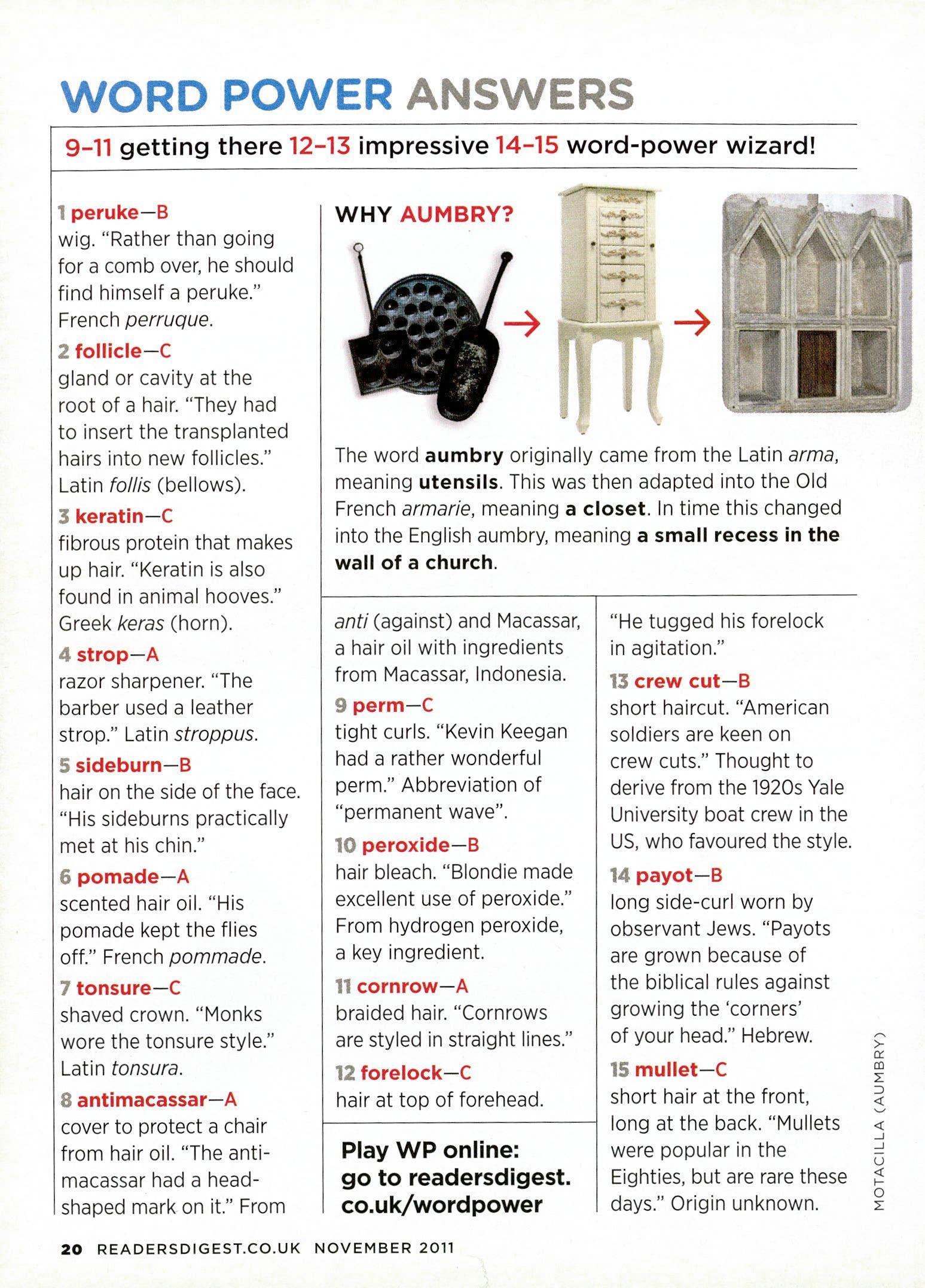
The word aumbry originally came from the Latin arma, meaning utensils. This was then adapted into the Old French armarie, meaning a closet. In time this changed into the English aumbry, meaning a small recess in the wall of a church.
anti (against) and Macassar, a hair oil with ingredients from Macassar, Indonesia.
9 perm—C tight curls. "Kevin Keegan had a rather wonderful perm." Abbreviation of "permanent wave".
10 peroxide—B hair bleach. "Blondie made excellent use of peroxide." From hydrogen peroxide, a key ingredient.
11 cornrow—A braided hair. "Cornrows are styled in straight lines."
12 forelock—C hair at top of forehead. Play WP online: go to readersdigest. co.uk/wordpower
"He tugged his forelock in agitation."
13 crew cut—B short haircut. "American soldiers are keen on crew cuts." Thought to derive from the 1920s Yale University boat crew in the US, who favoured the style.
14 payot—B long side-curl worn by observant Jews. "Payots are grown because of the biblical rules against growing the 'corners' of your head." Hebrew.
15 mullet—C short hair at the front, long at the back. "Mullets were popular in the Eighties, but are rare these days." Origin unknown.
Advanced Technology. Ford DAB Audio System with Bluetooth® and USB connectivity

Advanced Aerodynamics.
Active Grille Shutter gives better economy.
Advanced Refuelling. Easy Fuel capless system for quick, clean fill ups.
From ENit Advance Payment. On selected models. With free rear parking distance sensors.
FORD FOCUS. Start more than a car. ford co uk/motability
Official fuel consumption figures in mpg (V100 km) for the Ford Focus Titanium X range: urban 34.9-55.4 (8.1-5.1), extra urban 56.5-76.4 (5.0-3.7), combined 47.1-67.3 (6.0-4.2). Of f icial CO2 emission 139-109g/km.Vehicle shown is All-New Ford Focus Titanium X, with optional 18" 5-spoke alloy wheels. Nil Advance Payment only applies to All-New Ford Focus Zetec 1.6105PS Manual and All-New Ford Focus Zetec 1.6125P5 Manual. Metallic Paint is available at no
...astronauts will be really tiny,
On its final mission to the International Space Station in July, space shuttle Atlantis took along experimental prototypes of the next generation of space explorer—little more than a solar cell, a sensor and a transmitter about the size of a fingernail.
If these devices work, space exploration will no longer be the domain of single probes costing millions, but 10,000-strong swarms of miniature probes costing tens of dollars each. Expect the first rockets carrying them to launch by 2025. Propelled in every direction by the solar wind, these pioneers will send back more detailed data than anything seen before.
Tracking animals by GPS has always been limited by the size of the equipment. But now, with the smallest GPS systems as light as a butterfly and no bigger than a beetle, zoologists can track animals as tiny as starlings and bats. So what's next? Well,
The cup that really does cheer?
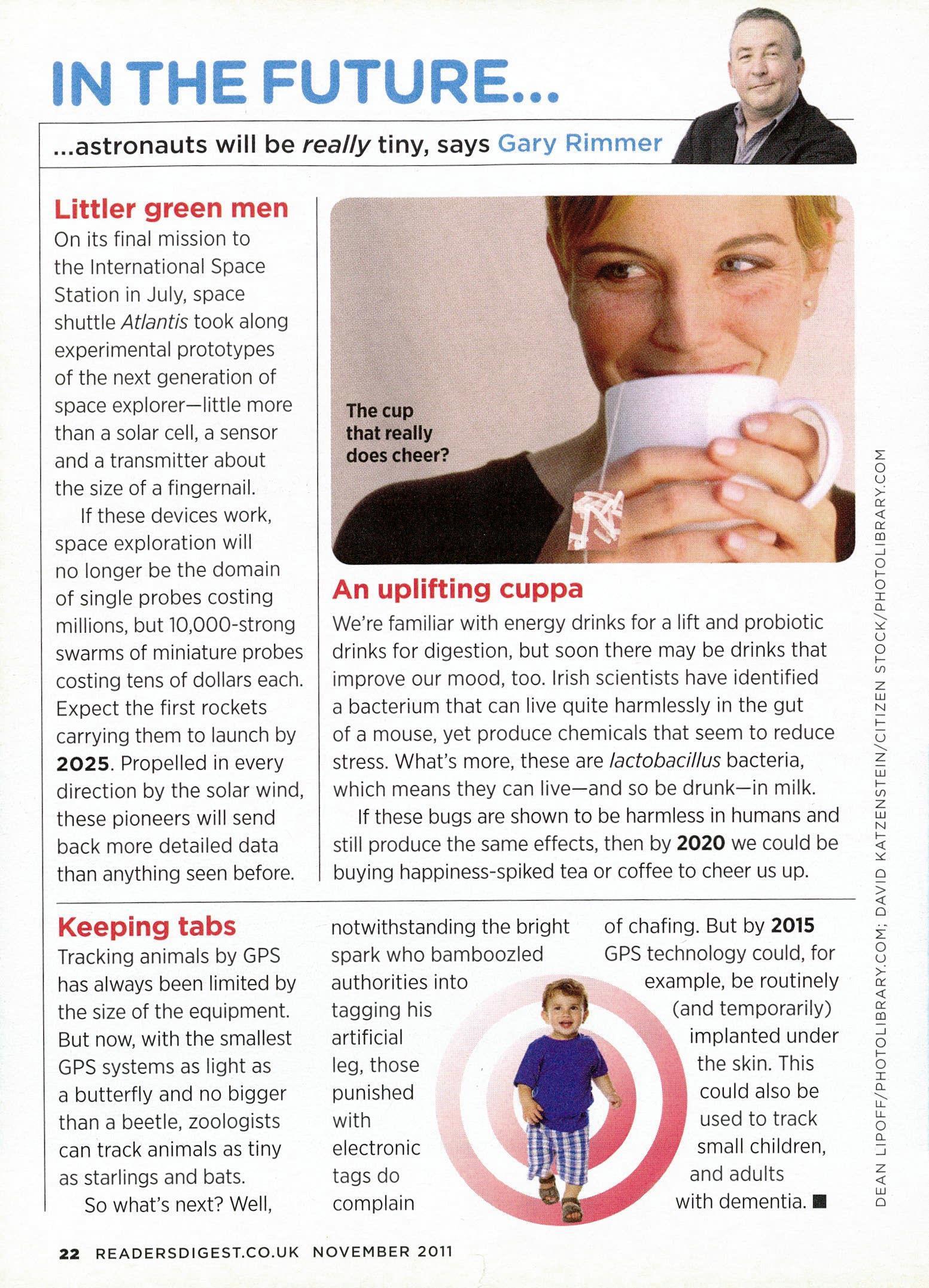
We're familiar with energy drinks for a lift and probiotic drinks for digestion, but soon there may be drinks that improve our mood, too. Irish scientists have identified a bacterium that can live quite harmlessly in the gut of a mouse, yet produce chemicals that seem to reduce stress. What's more, these are lactobacillus bacteria, which means they can live—and so be drunk—in milk.
If these bugs are shown to be harmless in humans and still produce the same effects, then by 2020 we could be buying happiness-spiked tea or coffee to cheer us up.
notwithstanding the bright spark who bamboozled authorities into tagging his artificial leg, those punished with electronic tags do complain
of chafing. But by 2015 GPS technology could, for example, be routinely (and temporarily) implanted under the skin. This could also be used to track small children, and adults with dementia. ■

Incredibly, more than half of all over•60s experience some sort of hearing loss. But many people find it difficult to know what to do about it. That's why, as the UK's largest charity taking action on hearing loss, we're working with Specsavers Hearing Centres to carry out a million free hearing checks over the next 12 months. That's a million people who will have peace of mind or won't have to worry about awkward social situations and embarrassing conversations anymore. So if your hearing isn't what it used to be, why not do something about it today?
Take a free hearing check at checkyourhearing.co.uk or call 0800 030 4985 to find your nearest Specsavers Hearing Centre
As the world faces a severe economic crisis, we've been hearing a lot from Standard & Poor's. But who's behind this financial company, and do we really need to care about what it says?
It's a US credit-ratings company—as well as evaluating the creditworthiness of different nations, it also produces stockmarket indices for America, Italy, Canada, Australia and India. It was founded in 1860 by Henry Varnum Poor (pictured), who compiled a History of the Railroads and Canals in the United States, the first publication that detailed the finances of the powerful US railroad companies. In 1941, Poor's company merged with the Standard Statistics Bureau, which covered the financial performance of non-railway companies.
As a result of the financial turmoil, S&P's decisions have become extraordinarily influential on national economies.
On August 5 this year, S&P cut America's sovereign long-term credit rating from AAA (the highest possible rating) to AA+ (the secondhighest). The decision was made in the light of the Budget Control Act, which, S&P said, didn't go far enough in stabilising the country's debt problem.
The world's biggest economy has long grown used to an AAA rating—which officially meant that America had extremely strong capacity to meet its financial commitments. The new rating means that it still has a very low credit risk, but that it's possibly susceptible to long-term risks.
The downgrade was a tremendous blow, more to America's pride than its creditworthiness; it hasn't defaulted on any debts since, and is unlikely to. But in a financial world where trust and confidence are all, any downgrade is bad for a government's reputation.
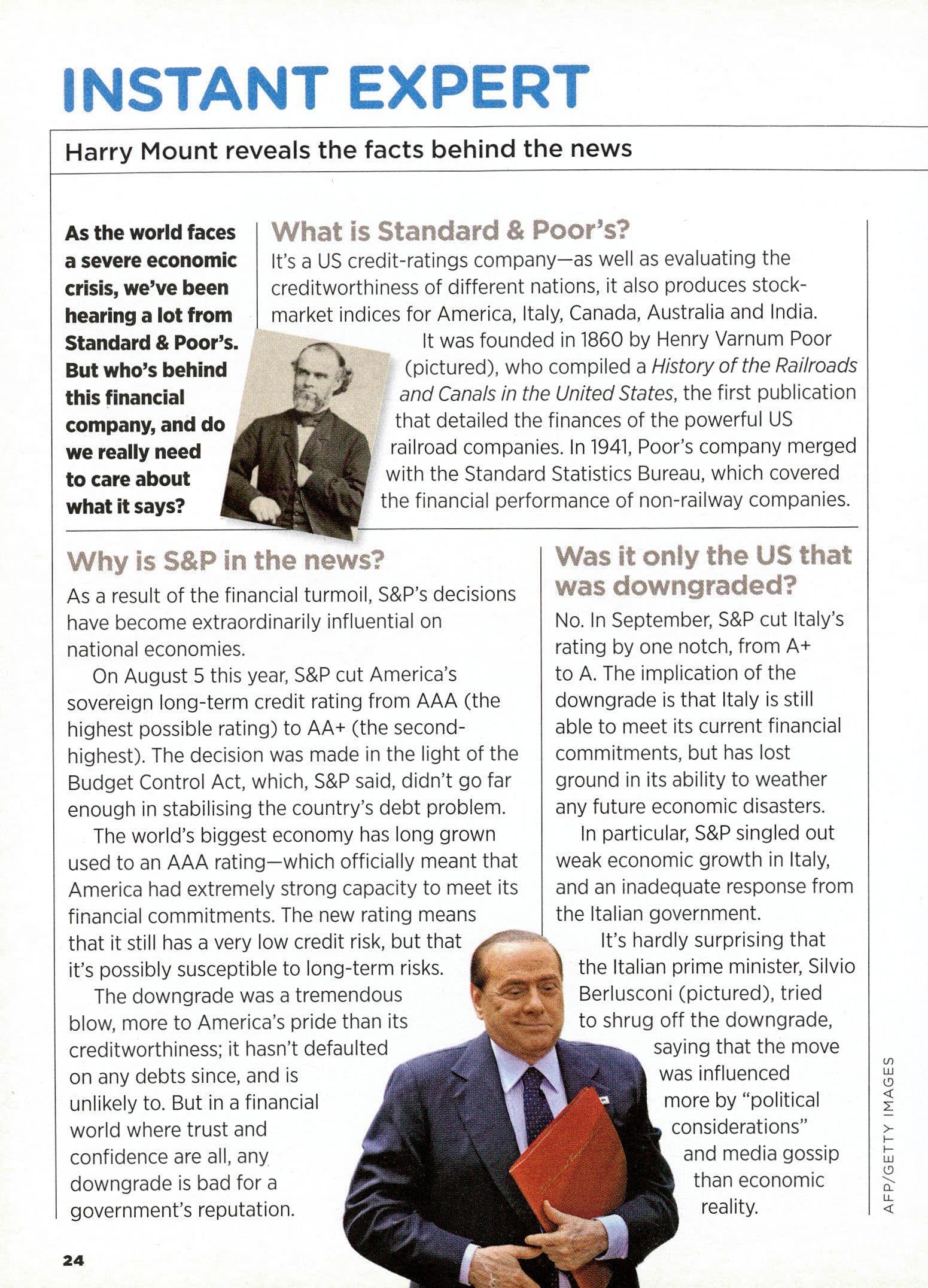
No. In September, S&P cut Italy's rating by one notch, from A+ to A. The implication of the downgrade is that Italy is still able to meet its current financial commitments, but has lost ground in its ability to weather any future economic disasters. In particular, S&P singled out weak economic growth in Italy, and an inadequate response from the Italian government.
It's hardly surprising that the Italian prime minister, Silvio Berlusconi (pictured), tried to shrug off the downgrade, saying that the move was influenced more by "political considerations" and media gossip than economic reality.
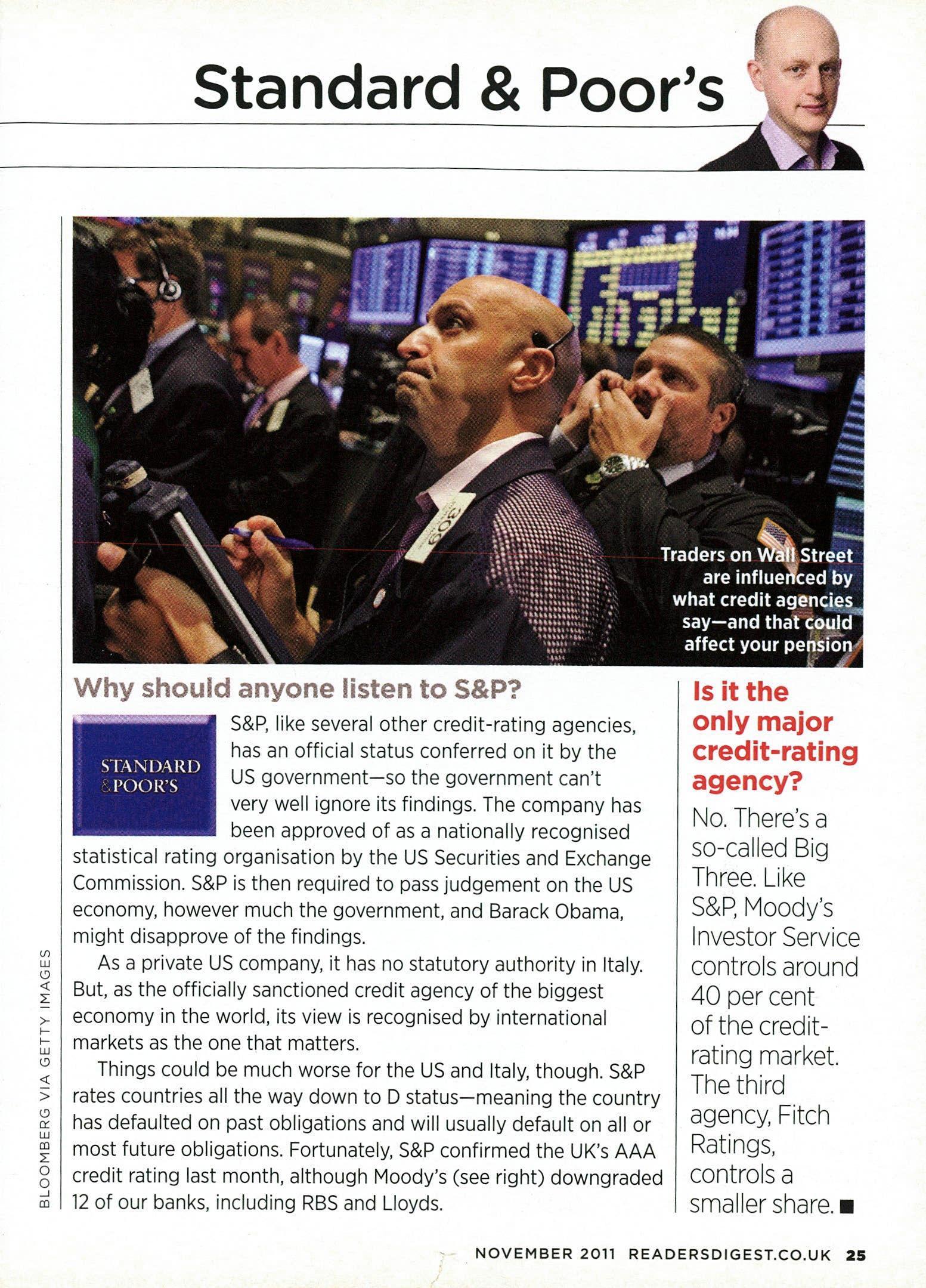
r anyone listen to S&P?
S&P, like several other credit-rating agencies, has an official status conferred on it by the US government—so the government can't very well ignore its findings. The company has been approved of as a nationally recognised statistical rating organisation by the US Securities and Exchange Commission. S&P is then required to pass judgement on the US economy, however much the government, and Barack Obama, might disapprove of the findings.
STANDARD I'OOR'S
As a private US company, it has no statutory authority in Italy. But, as the officially sanctioned credit agency of the biggest economy in the world, its view is recognised by international markets as the one that matters.
Things could be much worse for the US and Italy, though. S&P rates countries all the way down to D status—meaning the country has defaulted on past obligations and will usually default on all or most future obligations. Fortunately, S&P confirmed the UK's AAA credit rating last month, although Moody's (see right) downgraded 12 of our banks, including RBS and Lloyds.
Traders onStreet are influenced by what credit agencies say—and that could affect your pension
Is it the only major credit-rating agency?
No. There's a so-called Big Three. Like S&P, Moody's Investor Service controls around 40 per cent of the creditrating market. The third agency, Fitch Ratings, controls a smaller share. •
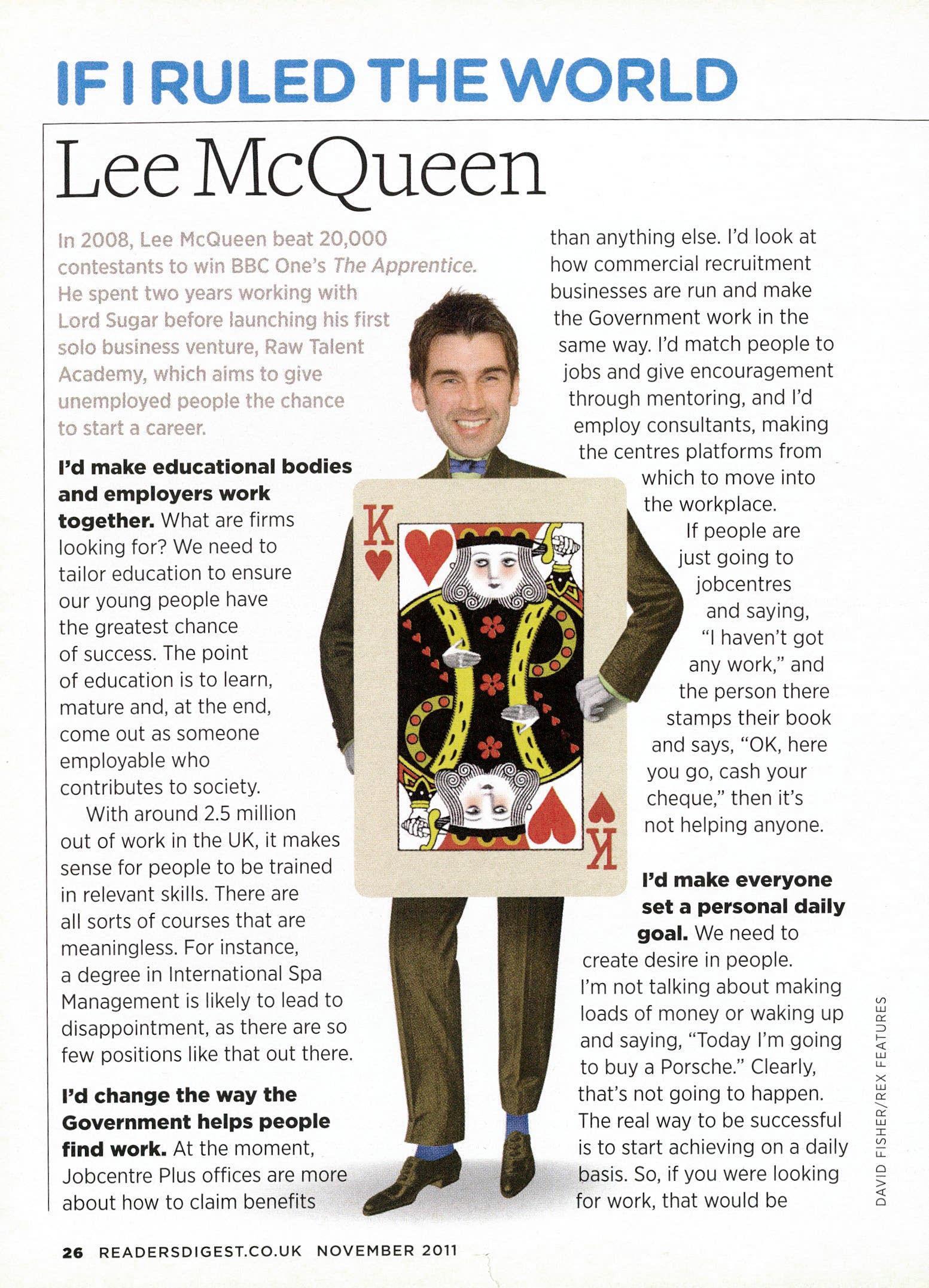
In 2008, Lee McQueen beat 20,000 contestants to win BBC One's The Apprentice. He spent two years working with Lord Sugar before launching his first solo business venture, Raw Talent Academy, which aims to give unemployed people the chance to start a career.
I'd make educational bodies and employers work together. What are firms looking for? We need to tailor education to ensure our young people have the greatest chance of success. The point of education is to learn, mature and, at the end, come out as someone employable who contributes to society.
With around 2.5 million out of work in the UK, it makes sense for people to be trained in relevant skills. There are all sorts of courses that are meaningless. For instance, a degree in International Spa Management is likely to lead to disappointment, as there are so few positions like that out there.
I'd change the way the Government helps people find work. At the moment, Jobcentre Plus offices are more about how to claim benefits
than anything else. I'd look at how commercial recruitment businesses are run and make the Government work in the same way. I'd match people to jobs and give encouragement through mentoring, and I'd employ consultants, making the centres platforms from which to move into the workplace. If people are just going to jobcentres and saying, "I haven't got any work," and the person there stamps their book and says, "OK, here you go, cash your
Acheque," then it's not helping anyone.
I'd make everyone set a personal daily goal. We need to create desire in people. I'm not talking about making loads of money or waking up and saying, "Today I'm going to buy a Porsche." Clearly, that's not going to happen. The real way to be successful is to start achieving on a daily basis. So, if you were looking for work, that would be
sending your details to five potential employers—by the end of a week, that'd be 25 possible job opportunities. Confidence breeds confidence. If I can go home at the end of the day knowing I achieved what I set out to do, I feel good.
I'd acknowledge the good things that previous governments have done. What bugs me hugely is the seemingly pointless need that new governments have to rebrand or change perfectly good schemes or policies. If something was working, I'd leave it running! This would make for much less confusion and a more joined-up and respectful approach.
However you vote, you can't deny that, although the Labour government did some bad stuff, there were also a lot of good things that the Conservatives inherited that don't need time or money wasted on a makeover.
I'd vet potential parents.
My first child was born in August and I feel so protective of her. Anybody can have a baby, but it shouldn't be that easy. If you want to adopt a child, you have to jump through so many hoops
tt
Anyone can have a baby, but it shouldn't be the easy... There are just too many children not being cared for properly
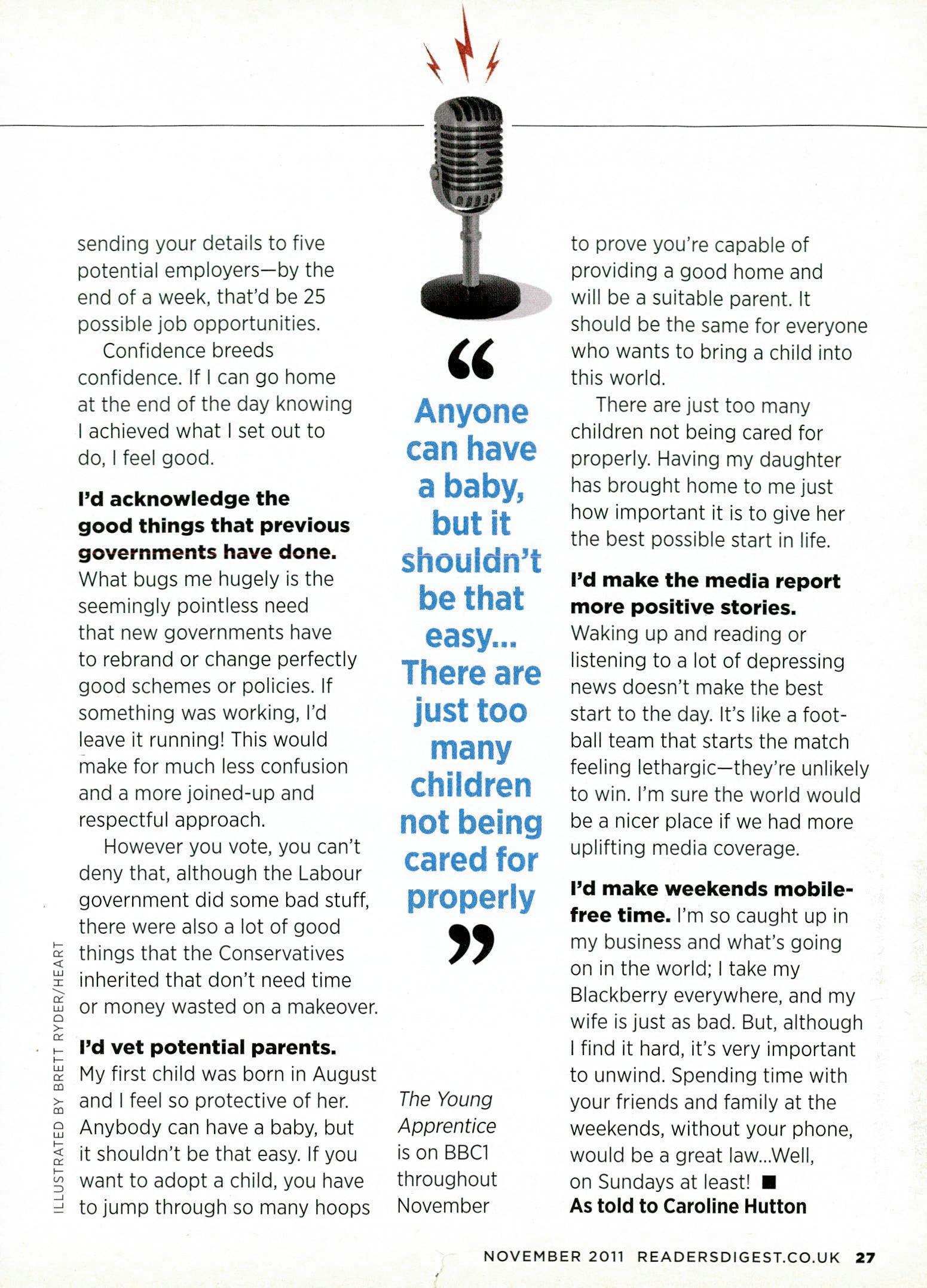
The Young Apprentice is on BBC1 throughout November
to prove you're capable of providing a good home and will be a suitable parent. It should be the same for everyone who wants to bring a child into this world.
There are just too many children not being cared for properly. Having my daughter has brought home to me just how important it is to give her the best possible start in life.
I'd make the media report more positive stories. Waking up and reading or listening to a lot of depressing news doesn't make the best start to the day. It's like a football team that starts the match feeling lethargic—they're unlikely to win. I'm sure the world would be a nicer place if we had more uplifting media coverage.
I'd make weekends mobilefree time. I'm so caught up in my business and what's going on in the world; I take my Blackberry everywhere, and my wife is just as bad. But, although I find it hard, it's very important to unwind. Spending time with your friends and family at the weekends, without your phone, would be a great law...Well, on Sundays at least! •
As told to Caroline Hutton
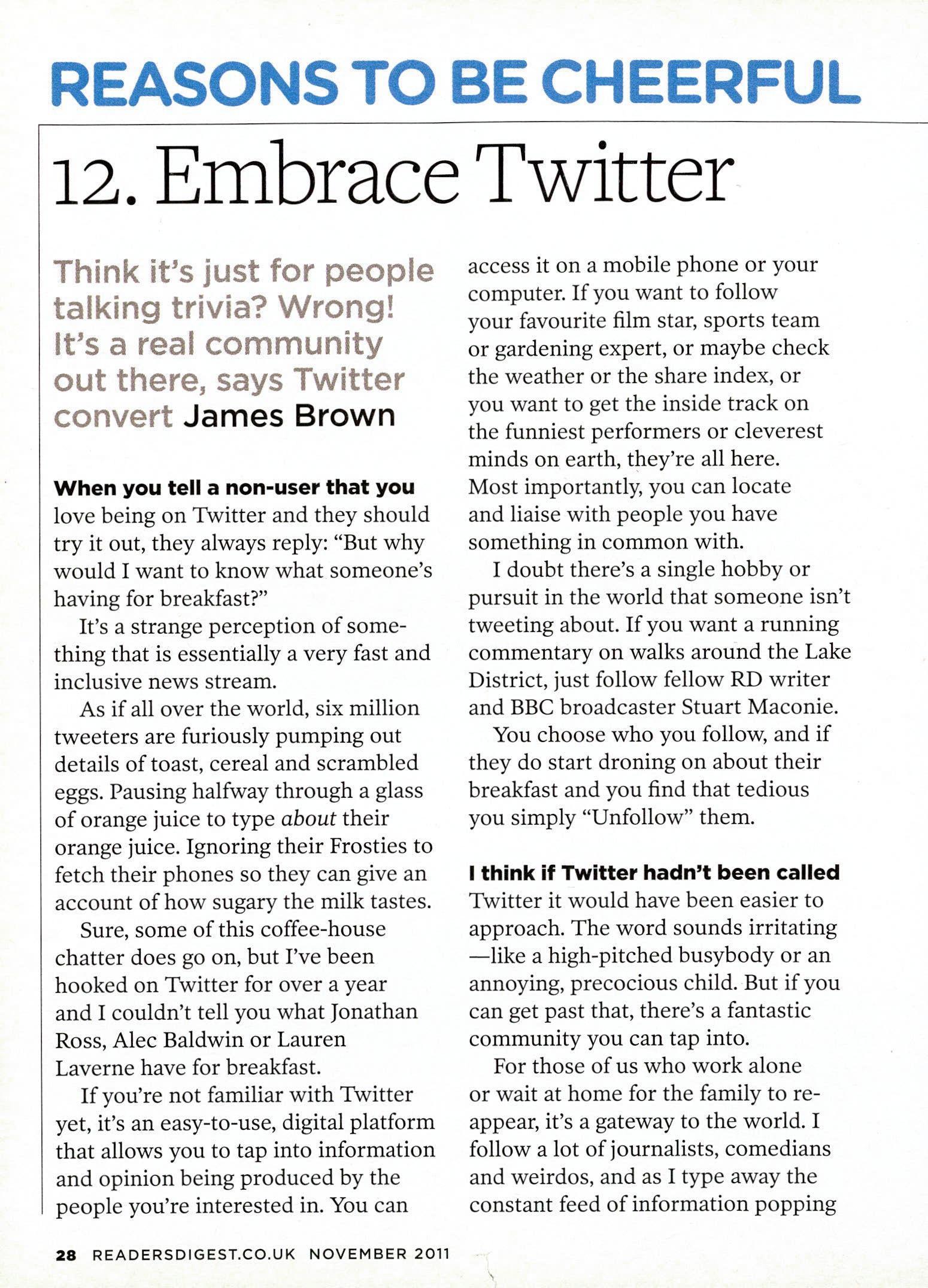
Think it's just for people talking trivia? Wrong! It's a real community out there, says Twitter convert James Brown
When you tell a non-user that you love being on Twitter and they should try it out, they always reply: "But why would I want to know what someone's having for breakfast?"
It's a strange perception of something that is essentially a very fast and inclusive news stream.
As if all over the world, six million tweeters are furiously pumping out details of toast, cereal and scrambled eggs. Pausing halfway through a glass of orange juice to type about their orange juice. Ignoring their Frosties to fetch their phones so they can give an account of how sugary the milk tastes.
Sure, some of this coffee-house chatter does go on, but I've been hooked on Twitter for over a year and I couldn't tell you what Jonathan Ross, Alec Baldwin or Lauren Laverne have for breakfast.
If you're not familiar with Twitter yet, it's an easy-to-use, digital platform that allows you to tap into information and opinion being produced by the people you're interested in. You can
access it on a mobile phone or your computer. If you want to follow your favourite film star, sports team or gardening expert, or maybe check the weather or the share index, or you want to get the inside track on the funniest performers or cleverest minds on earth, they're all here. Most importantly, you can locate and liaise with people you have something in common with.
I doubt there's a single hobby or pursuit in the world that someone isn't tweeting about. If you want a running commentary on walks around the Lake District, just follow fellow RD writer and BBC broadcaster Stuart Maconie. You choose who you follow, and if they do start droning on about their breakfast and you find that tedious you simply "Unfollow" them.
I think if Twitter hadn't been called Twitter it would have been easier to approach. The word sounds irritating —like a high-pitched busybody or an annoying, precocious child. But if you can get past that, there's a fantastic community you can tap into.
For those of us who work alone or wait at home for the family to reappear, it's a gateway to the world. I follow a lot of journalists, comedians and weirdos, and as I type away the constant feed of information popping
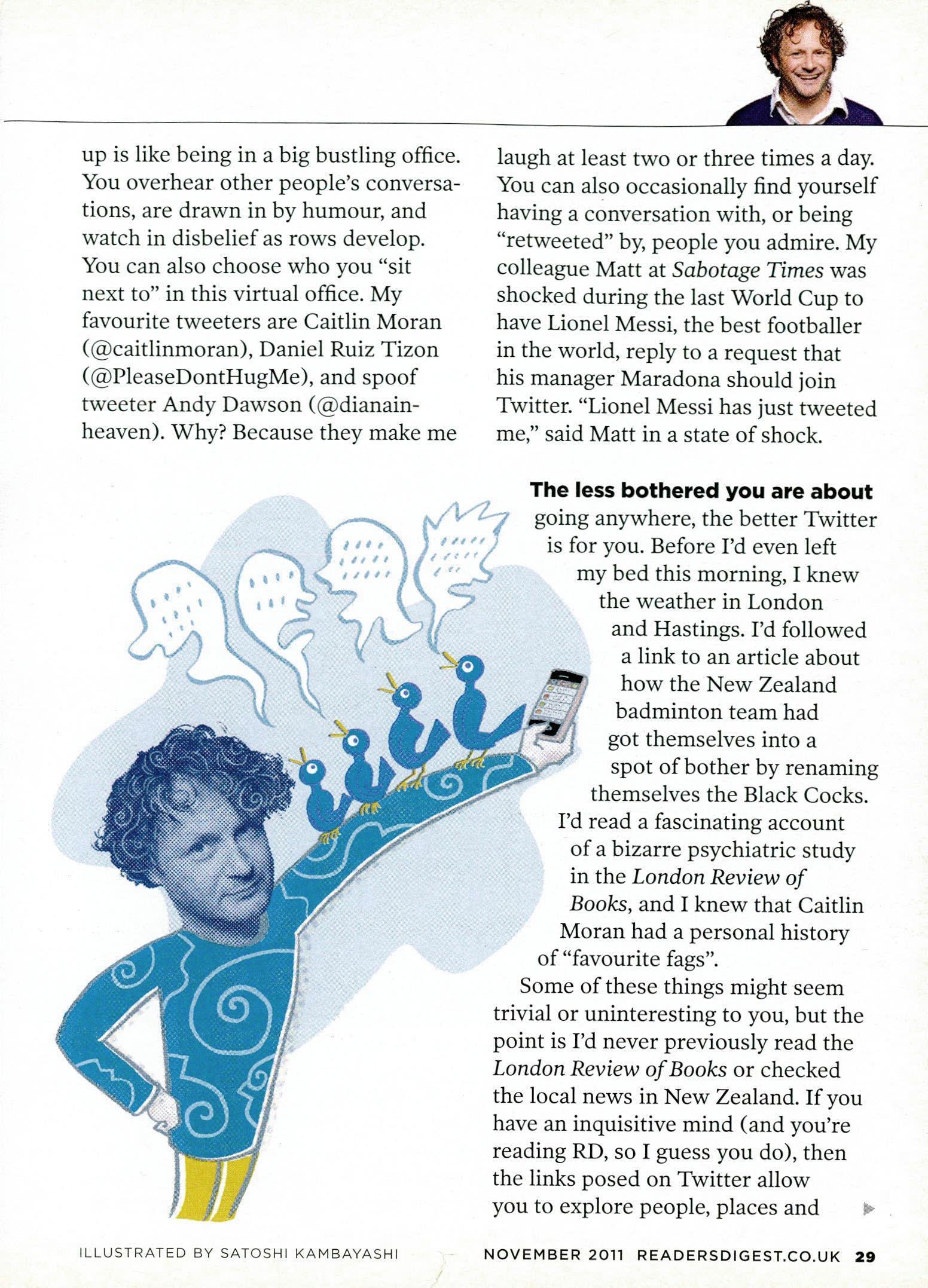
up is like being in a big bustling office. You overhear other people's conversations, are drawn in by humour, and watch in disbelief as rows develop. You can also choose who you "sit next to" in this virtual office. My favourite tweeters are Caitlin Moran (@caitlinmoran), Daniel Ruiz Tizon (@PleaseDontHugMe), and spoof tweeter Andy Dawson (@dianainheaven). Why? Because they make me
laugh at least two or three times a day. You can also occasionally find yourself having a conversation with, or being "retweeted" by, people you admire. My colleague Matt at Sabotage Times was shocked during the last World Cup to have Lionel Messi, the best footballer in the world, reply to a request that his manager Maradona should join Twitter. "Lionel Messi has just tweeted me," said Matt in a state of shock.
less bothered you are about going anywhere, the better Twitter is for you. Before I'd even left my bed this morning, I knew the weather in London and Hastings. I'd followed a link to an article about 19 how the New Zealand badminton team had got themselves into a spot of bother by renaming themselves the Black Cocks. I'd read a fascinating account of a bizarre psychiatric study in the London Review of Books, and I knew that Caitlin Moran had a personal history of "favourite fags".
Some of these things might seem trivial or uninteresting to you, but the point is I'd never previously read the London Review of Books or checked the local news in New Zealand. If you have an inquisitive mind (and you're reading RD, so I guess you do), then the links posed on Twitter allow you to explore people, places and ►
tt I can see my old Italian neighbour moving slowly round his garden cutting long-stemmed roses for his vase. I'm going off to tweet that now
publications you might not usually come across.
As I write, the American comic actor Garry Shandling is commenting on the ball game he's watching, radio DJ Robert Elms is recommending the hot new crime novel Viva La Madness, and the night editor of The Guardian is describing misty London at dawn as "having an air of the 19th century".
All of this can be a little like a good radio conversation without the music. It's truly addictive. (I occasionally find I'm excusing myself from meetings to visit the bathroom to find out what's happening on Twitter.) But so long as you can find time for doing things in the real world you'll be fine. Writing this, I can see my old
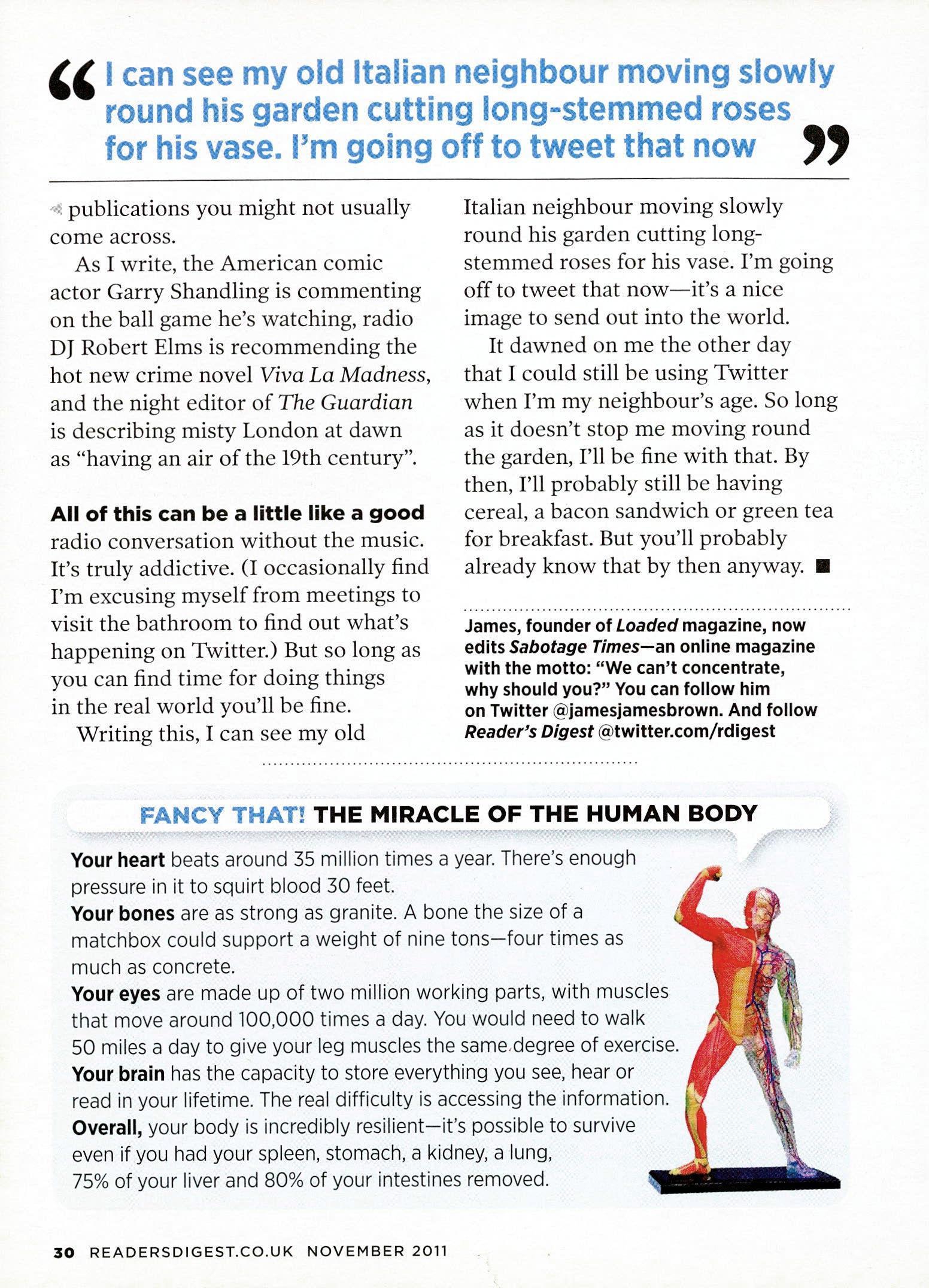
Italian neighbour moving slowly round his garden cutting longstemmed roses for his vase. I'm going off to tweet that now—it's a nice image to send out into the world.
It dawned on me the other day that I could still be using Twitter when I'm my neighbour's age. So long as it doesn't stop me moving round the garden, I'll be fine with that. By then, I'll probably still be having cereal, a bacon sandwich or green tea for breakfast. But you'll probably already know that by then anyway. ■
James, founder of Loaded magazine, now edits Sabotage Times—an online magazine with the motto: "We can't concentrate, why should you?" You can follow him on Twitter @jamesjamesbrown. And follow Reader's Digest @twitter.com/rdigest
Your heart beats around 35 million times a year. There's enough pressure in it to squirt blood 30 feet. Your bones are as strong as granite. A bone the size of a matchbox could support a weight of nine tons—four times as much as concrete.
Your eyes are made up of two million working parts, with muscles that move around 100,000 times a day. You would need to walk 50 miles a day to give your leg muscles the same.degree of exercise. Your brain has the capacity to store everything you see, hear or read in your lifetime. The real difficulty is accessing the information. Overall, your body is incredibly resilient—it's possible to survive even if you had your spleen, stomach, a kidney, a lung, 75% of your liver and 80% of your intestines removed.

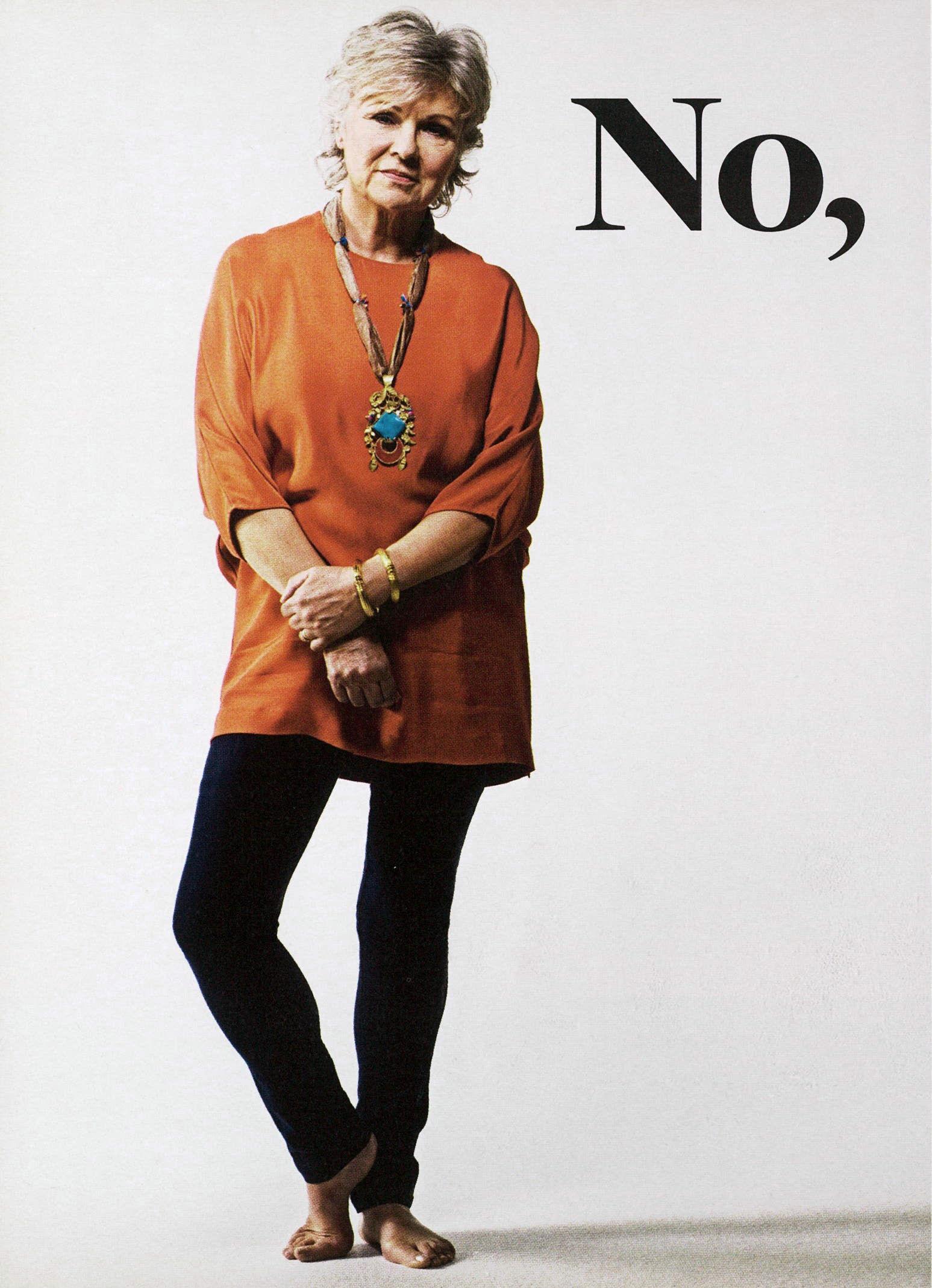
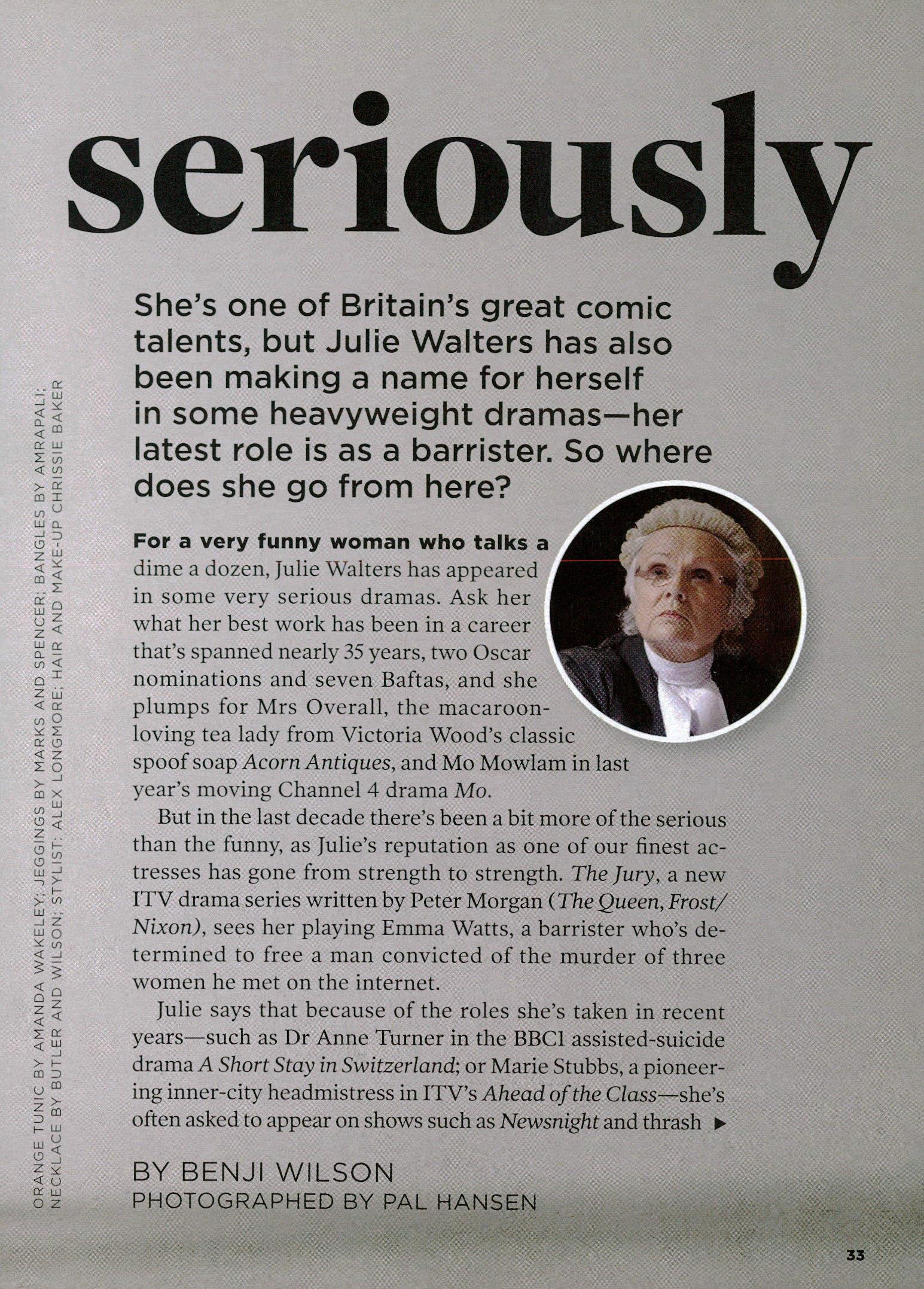
She's one of Britain's great comic talents, but Julie Walters has also been making a name for herself in some heavyweight dramas—her latest role is as a barrister. So where < (I) co does she go from here?
W a.
For a very funny woman who talks a z w dime a dozen, Julie Walters has appeared W0 in some very serious dramas. Ask her
z < • z what her best work has been in a career a - that's spanned nearly 35 years, two Oscar 0 = nominations and seven Baftas, and she
z a cc plumps for Mrs Overall, the macaroon- 0 loving tea lady from Victoria Wood's classic cc0 z z o spoof soap Acorn Antiques, and Mo Mowlam in last >x year's moving Channel 4 drama Mo.
< But in the last decade there's been a bit more of the serious than the funny, as Julie's reputation as one of our finest ac-w >- tresses has gone from strength to strength. The Jury, a new
>20
ITV drama series written by Peter Morgan (The Queen, Frost/ W o Nixon), sees her playing Emma Watts, a barrister who's de-
< -LL termined to free a man convicted of the murder of three 33 a a women he met on the internet.
0 < z Julie says that because of the roles she's taken in recent
• u years—such as Dr Anne Turner in the BBC1 assisted-suicide aLa, co >- drama A Short Stay in Switzerland; or Marie Stubbs, a pioneer°03 ing inner-city headmistress in ITV's Ahead of the Class she's Ln often asked to appear on shows such as Newsnight and thrash ■
<0 Z y BY
BENJI WILSONBY PAL HANSEN
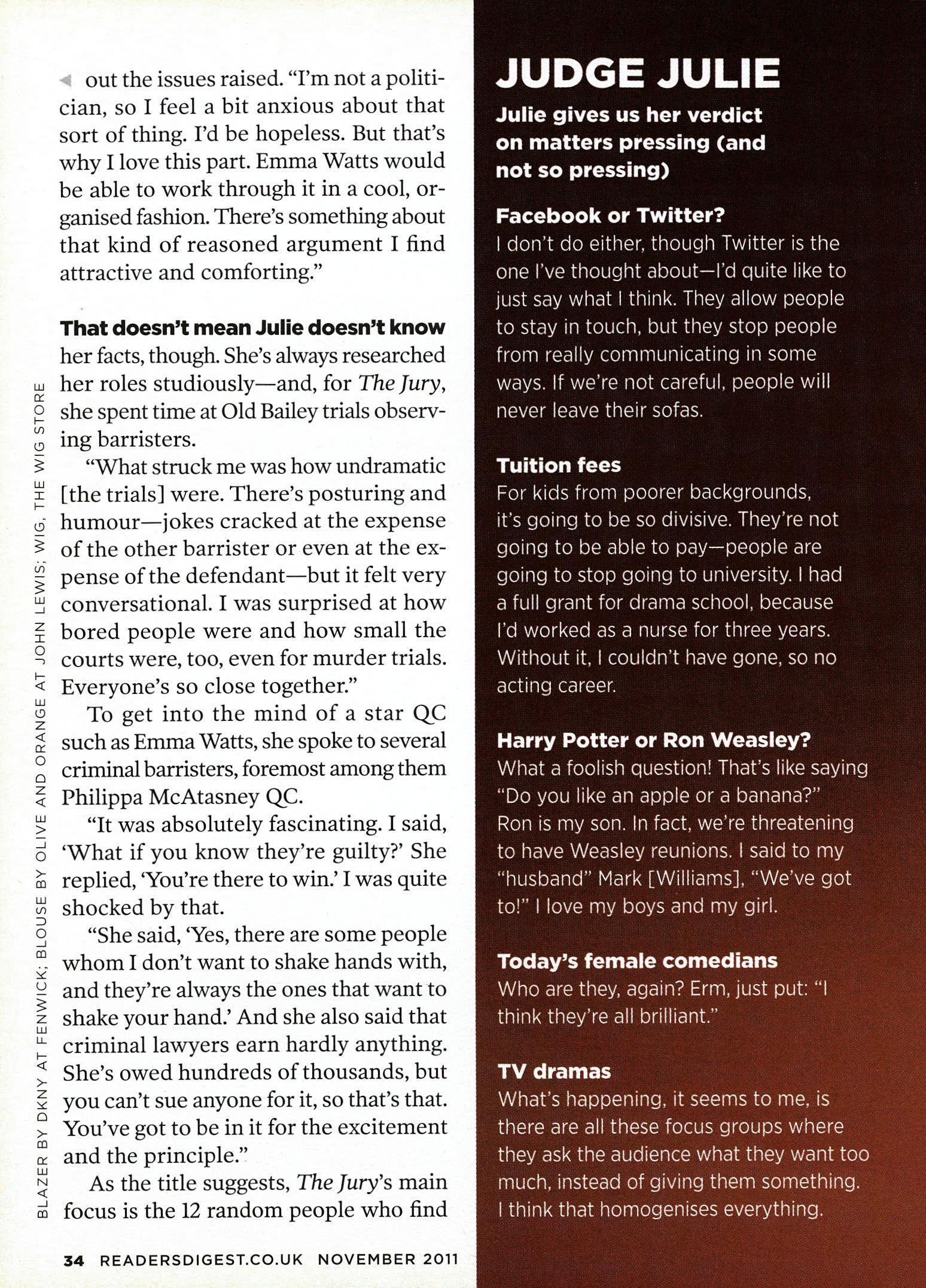
' out the issues raised. "I'm not a politician, so I feel a bit anxious about that sort of thing. I'd be hopeless. But that's why I love this part. Emma Watts would be able to work through it in a cool, organised fashion. There's something about that kind of reasoned argument I find attractive and comforting."
That doesn't mean Julie doesn't know her facts, though. She's always researched her roles studiously—and, for The Jury, she spent time at Old Bailey trials observing barristers.
"What struck me was how undramatic [the trials] were. There's posturing and humour—jokes cracked at the expense of the other barrister or even at the expense of the defendant—but it felt very conversational. I was surprised at how bored people were and how small the courts were, too, even for murder trials. Everyone's so close together."
To get into the mind of a star QC such as Emma Watts, she spoke to several criminal barristers, foremost among them Philippa McAtasney QC.
"It was absolutely fascinating. I said, `What if you know they're guilty?' She replied, 'You're there to win.' I was quite shocked by that.
"She said, 'Yes, there are some people whom I don't want to shake hands with, and they're always the ones that want to shake your hand.' And she also said that criminal lawyers earn hardly anything. She's owed hundreds of thousands, but you can't sue anyone for it, so that's that. You've got to be in it for the excitement and the principle."
As the title suggests, TheJury's main focus is the 12 random people who find
Julie gives us her verdict on matters pressing (and not so pressing)
Facebook or Twitter?
I don't do either, though Twitter is the one I've thought about—I'd quite like to just say what I think. They allow people to stay in touch, but they stop people from really communicating in some ways. If we're not careful, people will never leave their sofas.
Tuition fees
For kids from poorer backgrounds, it's going to be so divisive. They're not going to be able to pay—people are going to stop going to university. I had a full grant for drama school, because I'd worked as a nurse for three years. Without it, I couldn't have gone, so no acting career.
Harry Potter or Ron Weasley?
What a foolish question! That's like saying "Do you like an apple or a banana?" Ron is my son. In fact, we're threatening to have Weasley reunions. I said to my "husband" Mark [Williams], "We've got to!" I love my boys and my girl.
Today's female comedians
Who are they, again? Erm, just put: "I think they're all brilliant."
TV dramas
What's happening, it seems to me, is there are all these focus groups where they ask the audience what they want too much, instead of giving them something. I think that, homogenises everything.
The state of British theatre
We need more money and...we need more money.
Most attractive actor
Jason Isaacs is very attractive—he did that series Case Histories [BBC1], which I loved. I can't remember anybody else. It's my age. I think Sean Connery's probably still got it. In fact, Sean Connery once slapped my bum. Or maybe it was a pinch. But that was 30 years ago.
The riots
They upset me. It was frightening. But I think there's been a knee-jerk reaction to them that's ridiculous. Flooding the courts with people who did very little, and putting
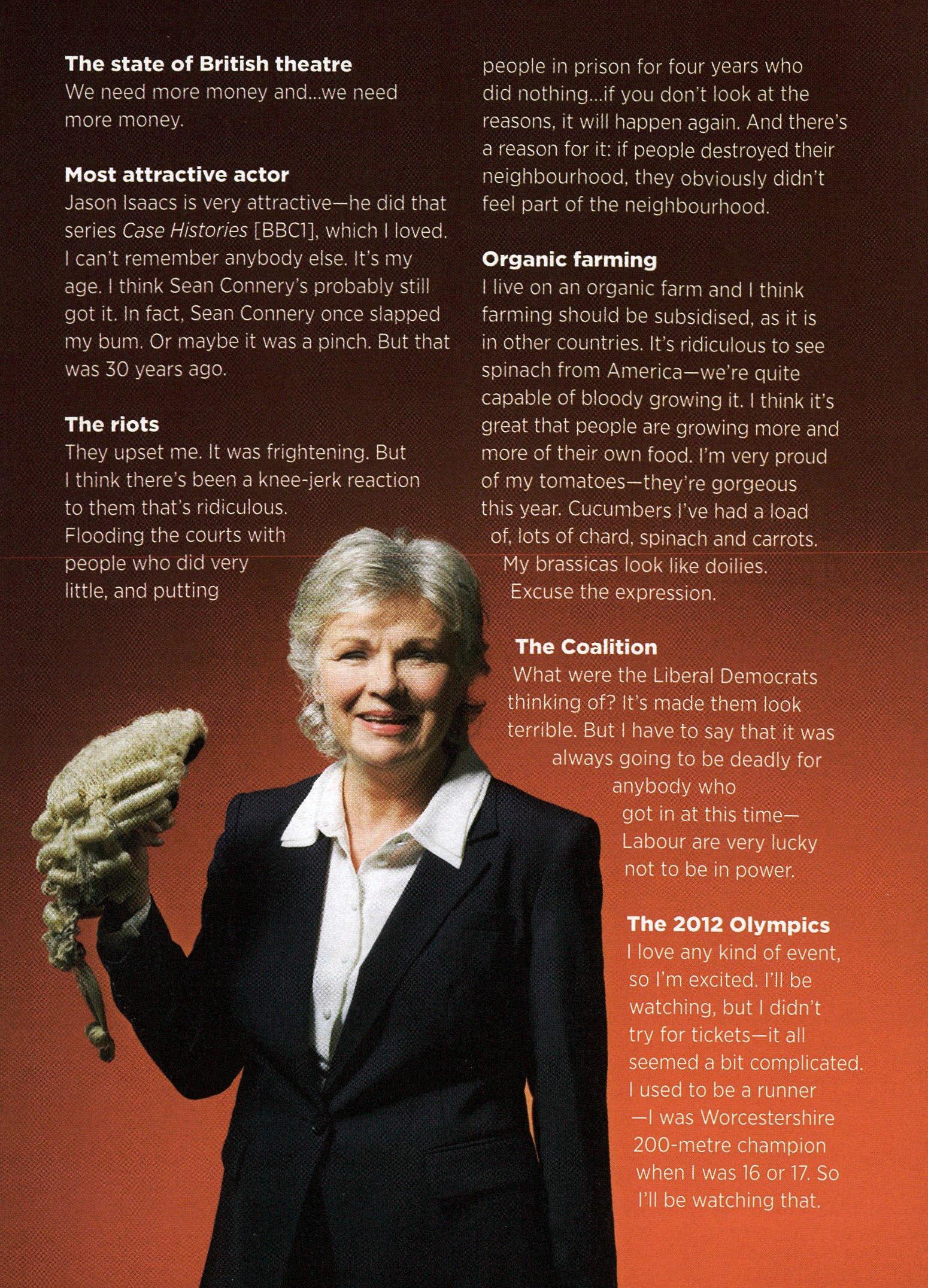
people in prison for four years who did nothing...if you don't look at the reasons, it will happen again. And there's a reason for it: if people destroyed their neighbourhood, they obviously didn't feel part of the neighbourhood.
I live on an organic farm and I think farming should be subsidised, as it is in other countries. It's ridiculous to see spinach from America—we're quite capable of bloody growing it. I think it's great that people are growing more and more of their own food. I'm very proud of my tomatoes—they're gorgeous this year. Cucumbers I've had a load of, lots of chard, spinach and carrots. My brassicas look like doilies. Excuse the expression.
The Coalition
What were the Liberal Democrats thinking of? Its made them look terrible. But I have to say that it was always going to be deadly for anybody who got in at this time— Labour are very lucky not to be in power.
The 2012 Olympics
I love any kind of event, so I'm excited. I'll be watching, but I didn't try for tickets—it all seemed a bit complicated. I used to be a runner —I was Worcestershire 200-metre champion when I was 16 or 17. So I'll be watching that.
Roles that have "something to bloody say": (from left) Mo
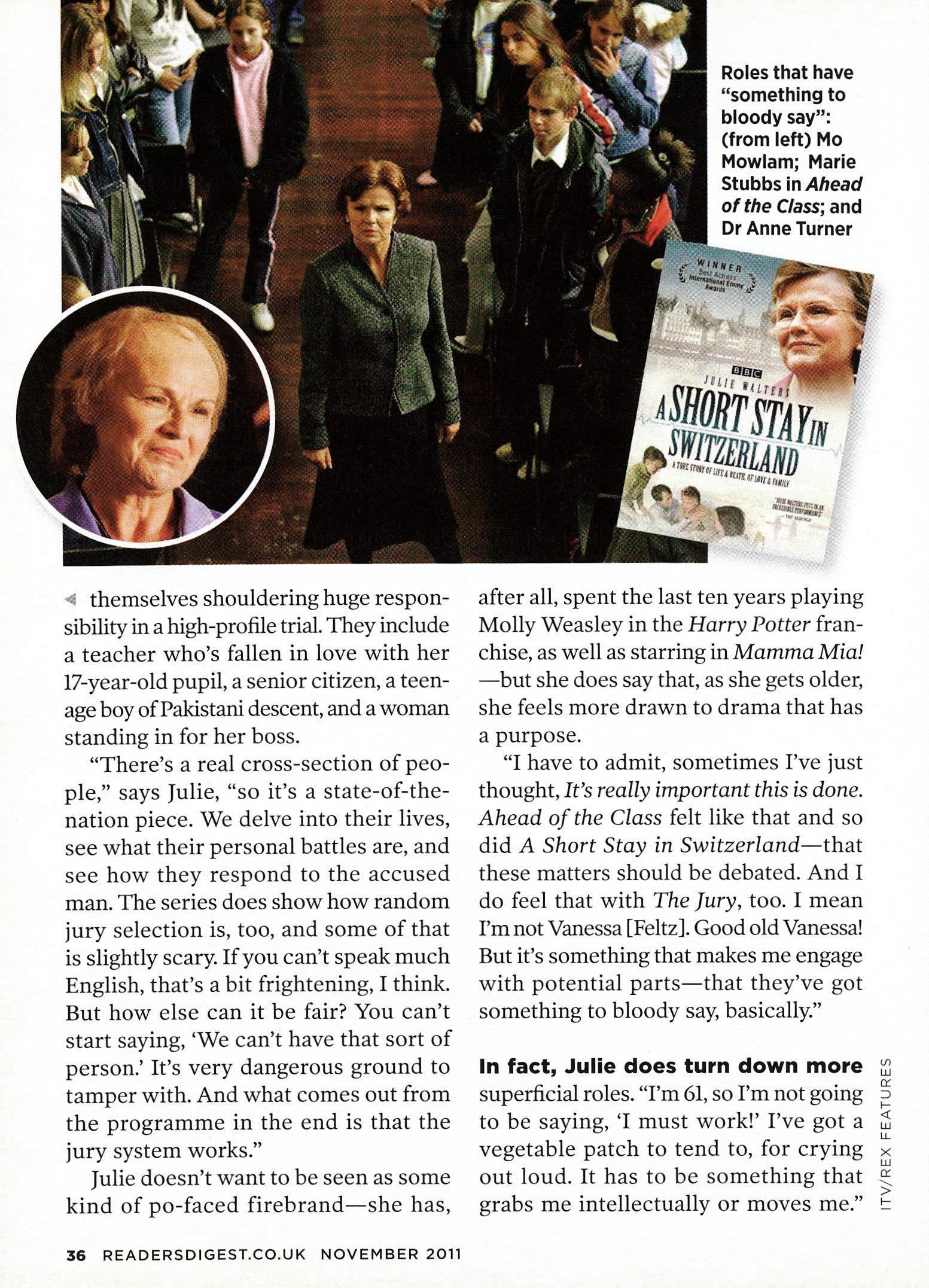
Ithemselves shouldering huge responsibility in a high-profile trial. They include a teacher who's fallen in love with her 17-year-old pupil, a senior citizen, a teenage boy of Pakistani descent, and a woman standing in for her boss.
"There's a real cross-section of people," says Julie, "so it's a state-of-thenation piece. We delve into their lives, see what their personal battles are, and see how they respond to the accused man. The series does show how random jury selection is, too, and some of that is slightly scary If you can't speak much English, that's a bit frightening, I think. But how else can it be fair? You can't start saying, 'We can't have that sort of person.' It's very dangerous ground to tamper with. And what comes out from the programme in the end is that the jury system works."
Julie doesn't want to be seen as some kind of po-faced firebrand—she has,
after all, spent the last ten years playing Molly Weasley in the Harry Potter franchise, as well as starring in Mamma Mia! —but she does say that, as she gets older, she feels more drawn to drama that has a purpose.
"I have to admit, sometimes I've just thought, It's really important this is done. Ahead of the Class felt like that and so did A Short Stay in Switzerland—that these matters should be debated. And I do feel that with The Jury, too. I mean I'm not Vanessa [Feltz]. Good old Vanessa! But it's something that makes me engage with potential parts—that they've got something to bloody say, basically."
In fact, Julie does turn down more superficial roles. "I'm 61, so I'm not going to be saying, 'I must work!' I've got a vegetable patch to tend to, for crying out loud. It has to be something that grabs me intellectually or moves me."
In the light of controversy about recent dramas about Fred West or the Moors Murders, are any parts beyond the pale? "It's about how subjects are treated. I've had roles come in where I've thought, I don't really want to play somebody who behaves like this. I'd get so depressed. There was something that came in years ago [a drama about an abusive mother] and I thought,I've got a little girl [Maisie, now 23], I can't play a woman who acts like that. I'm not saying it wasn't a good piece—it was. It just so upset me."
When people meet her in the street, many want her to say, for the 10,000th time, "What was it, muesli?" as Mrs Overall did 25 years ago (and, trust us, it's still funny). But many want to tell her that
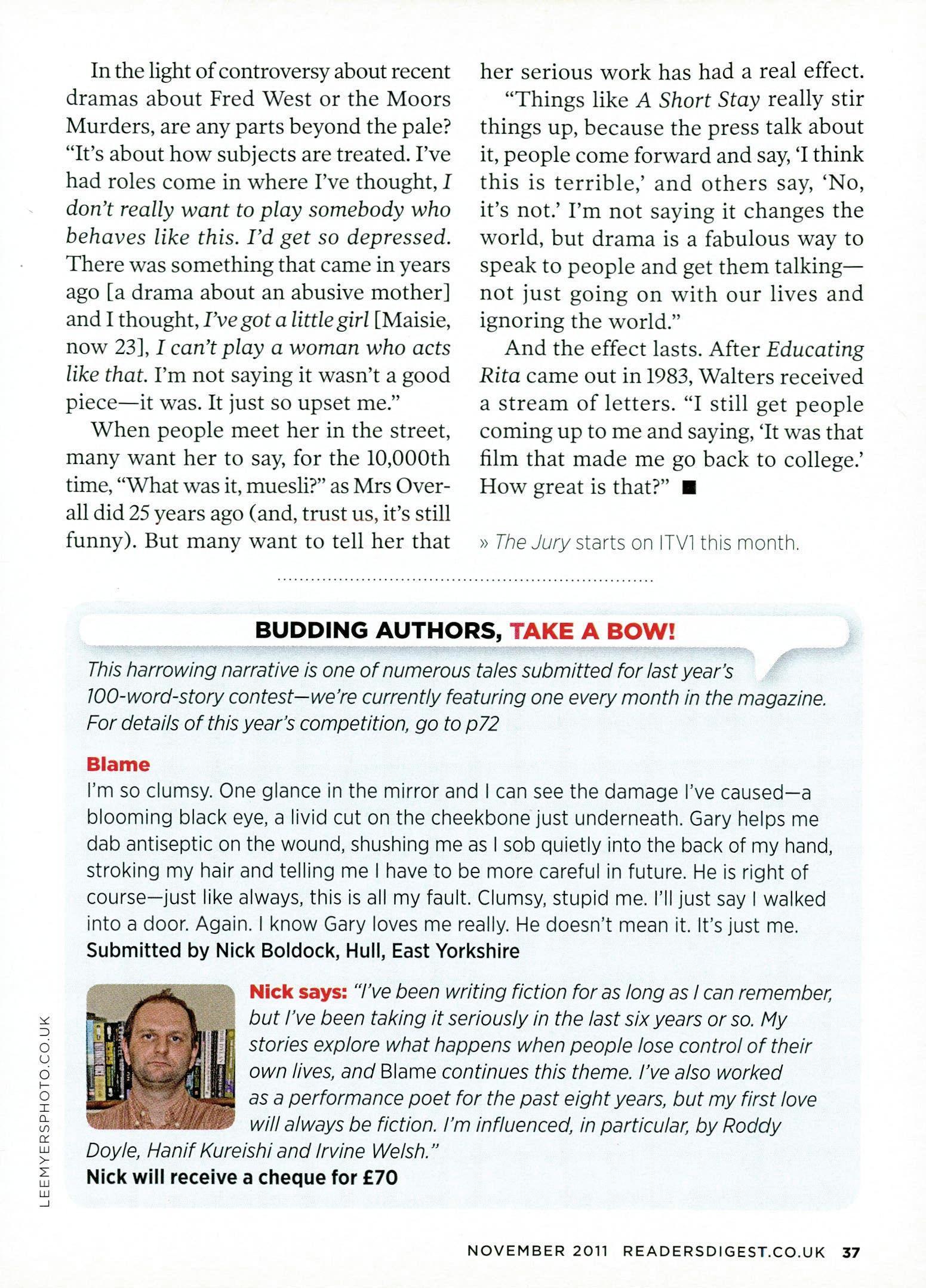
her serious work has had a real effect.
"Things like A Short Stay really stir things up, because the press talk about it, people come forward and say, 'I think this is terrible,' and others say, 'No, it's not.' I'm not saying it changes the world, but drama is a fabulous way to speak to people and get them talking— not just going on with our lives and ignoring the world."
And the effect lasts. After Educating Rita came out in 1983, Walters received a stream of letters. "I still get people coming up to me and saying, 'It was that film that made me go back to college.' How great is that?" ■
» The Jury starts on ITV1 this month.
This harrowing narrative is one of numerous tales submitted for last year's 100-word-story contest—we're currently featuring one every month in the magazine. For details of this year's competition, go to p72
Blame
I'm so clumsy. One glance in the mirror and I can see the damage I've caused—a blooming black eye, a livid cut on the cheekbone just underneath. Gary helps me dab antiseptic on the wound, shushing me as I sob quietly into the back of my hand, stroking my hair and telling me I have to be more careful in future. He is right of course—just like always, this is all my fault. Clumsy, stupid me. I'll just say I walked into a door. Again. I know Gary loves me really. He doesn't mean it. It's just me.
Submitted by Nick Boldock, Hull, East Yorkshire
Nick says: "I've been writing fiction for as long as I can remember, but I've been taking it seriously in the last six years or so. My stories explore what happens when people lose control of their own lives, and Blame continues this theme. I've also worked as a performance poet for the past eight years, but my first love will always be fiction. I'm influenced, in particular, by Roddy Doyle, Hanif Kureishi and Irvine Welsh." Nick will receive a cheque for £70
•
If stately homes, miniature villages or even Disneyland leave you cold, maybe it's time to try something a little less familiar?
BY RACHEL SMITH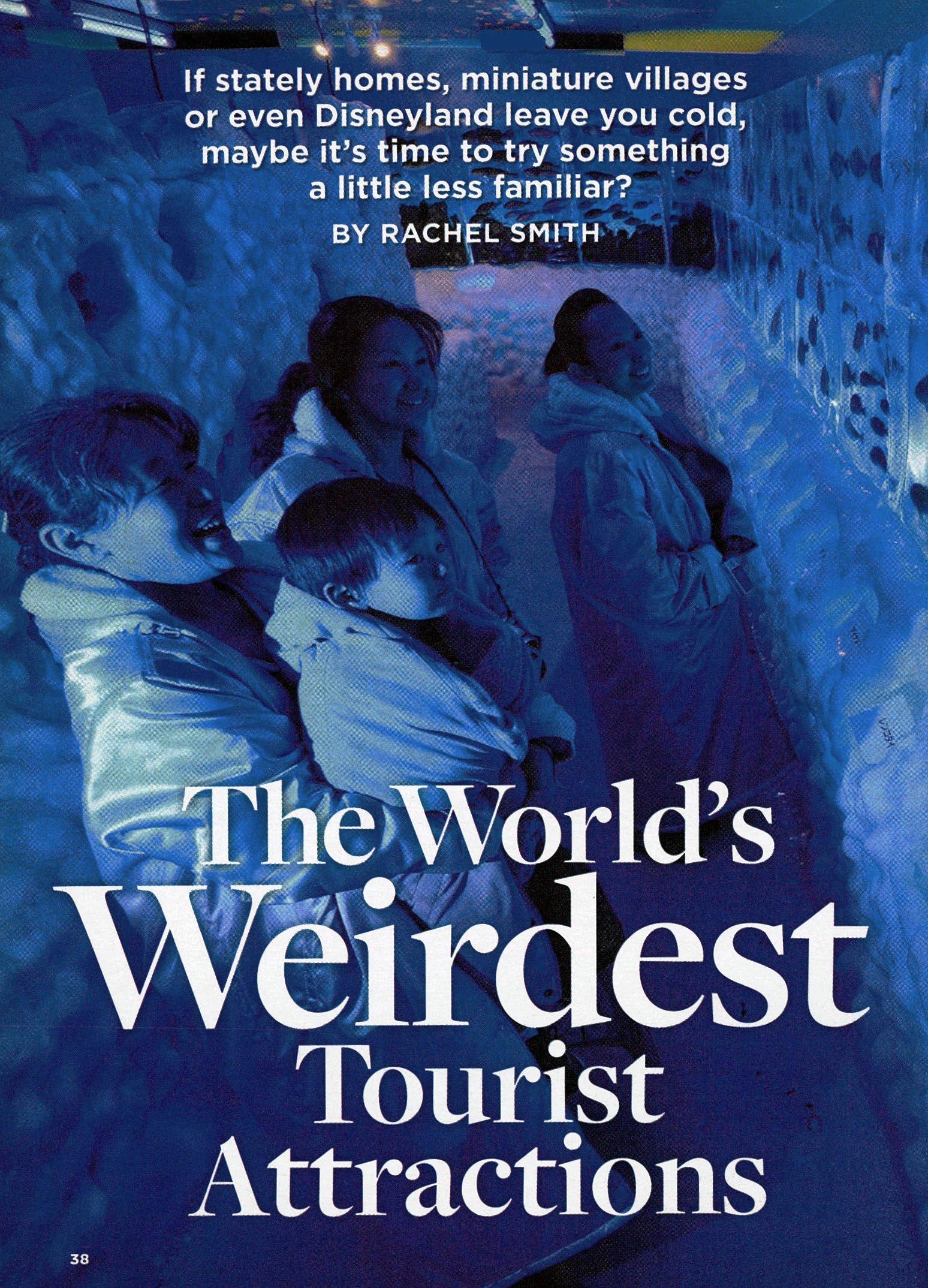
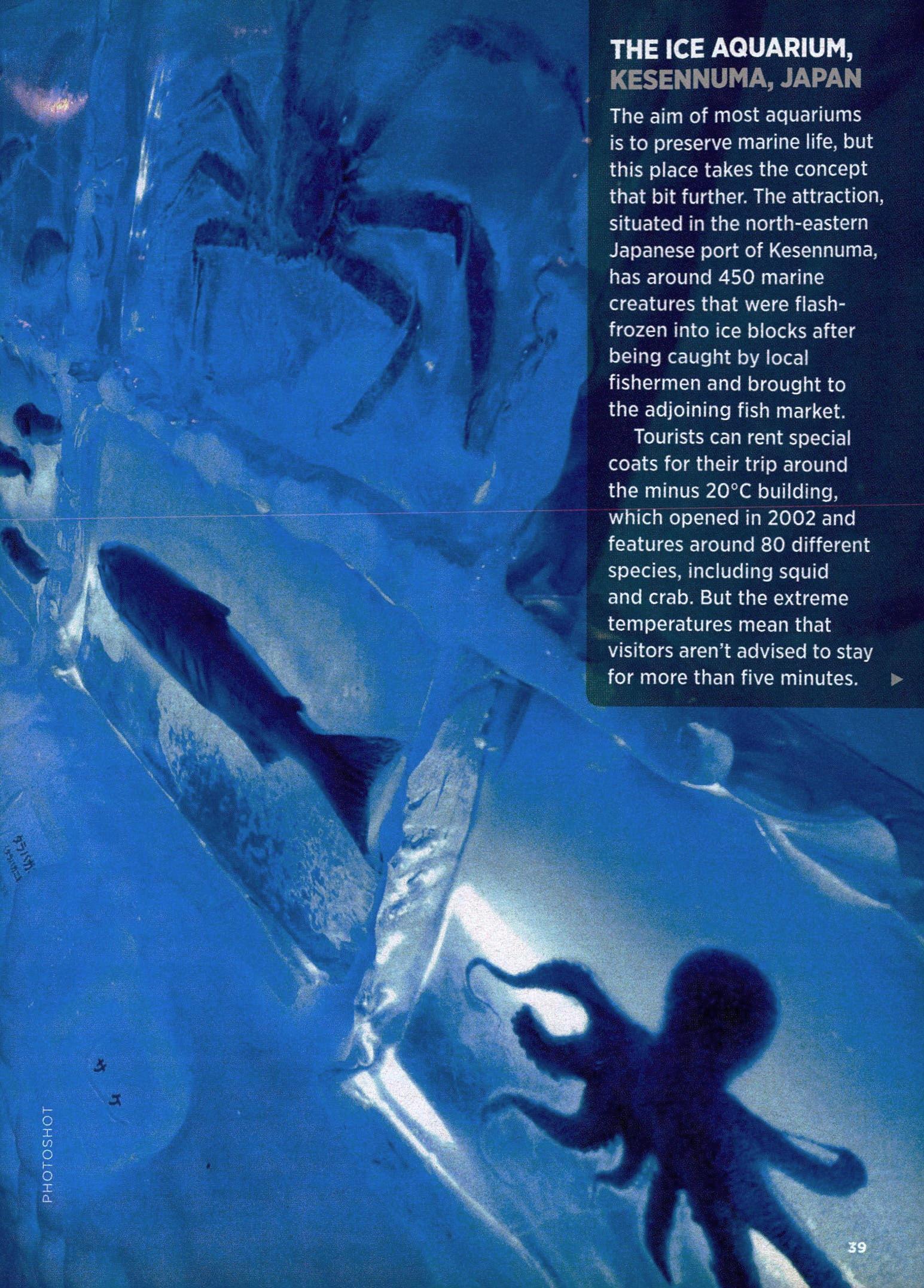
The aim of most aquariums is to preserve marine life, but this place takes the concept that bit further. The attraction, situated in the north-eastern Japanese port of Kesennuma, has around 450 marine creatures that were flashfrozen into ice blocks after being caught by local fishermen and brought to the adjoining fish market.
Tourists can rent special coats for their trip around the minus 20°C building, which opened in 2002 and features around 80 different species, including squid and crab. But the extreme temperatures mean that visitors aren't advised to stay for more than five minutes.
This collection of "art too bad to be ignored" was founded in 1993 by antiques dealer Scott Wilson. It started life in his home, but with people soon sending dozens of entertainingly dreadful
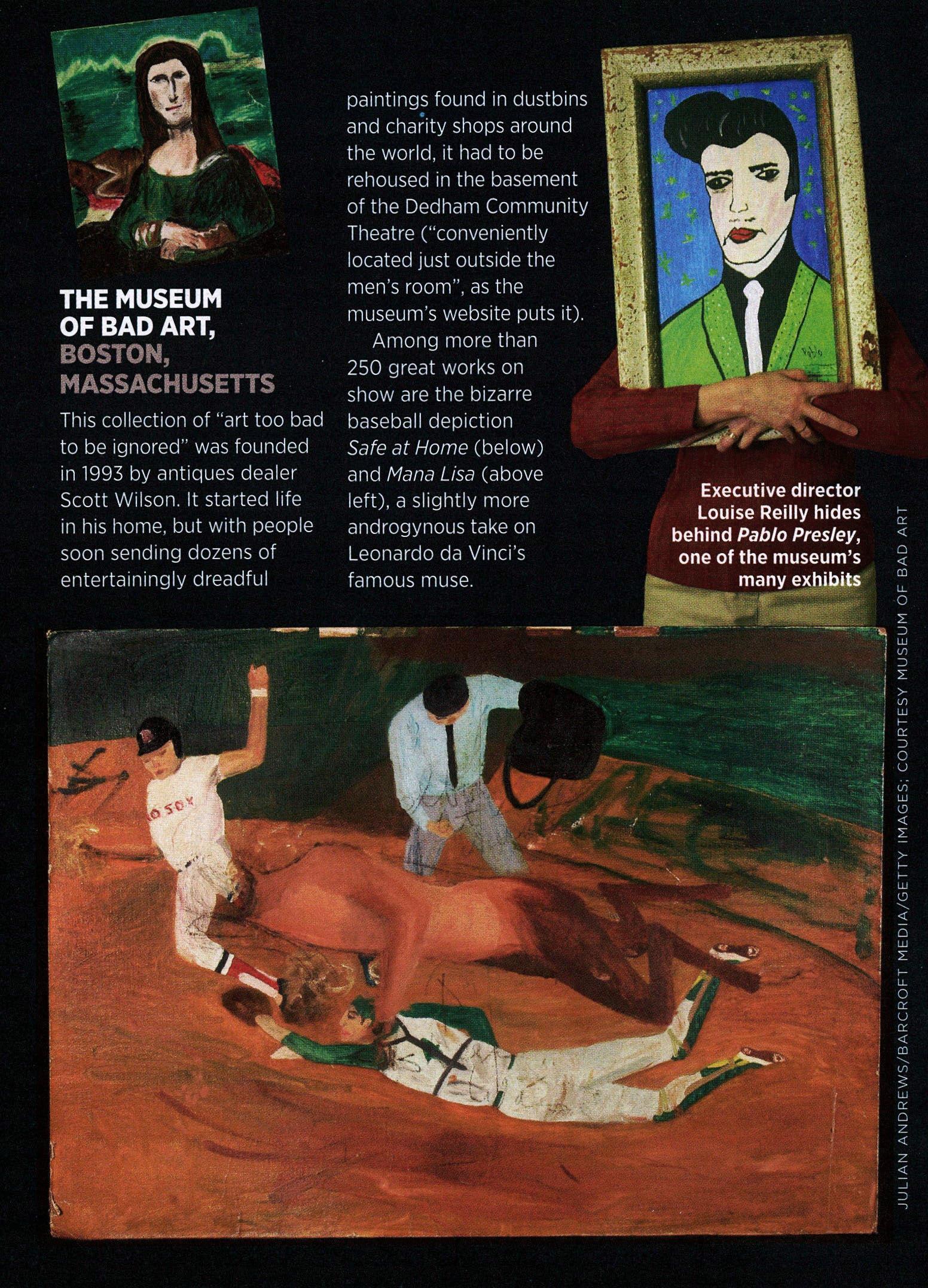
paintings found in dustbins and chdity shops around the world, it had to be rehoused in the basement of the Dedham Community Theatre ("conveniently located just outside the men's room", as the museum's website puts it).
Among more than 250 great works on show are the bizarre baseball depiction Safe at Home (below) and Maria Lisa (above left), a slightly more androgynous take on Leonardo da Vinci's famous muse.
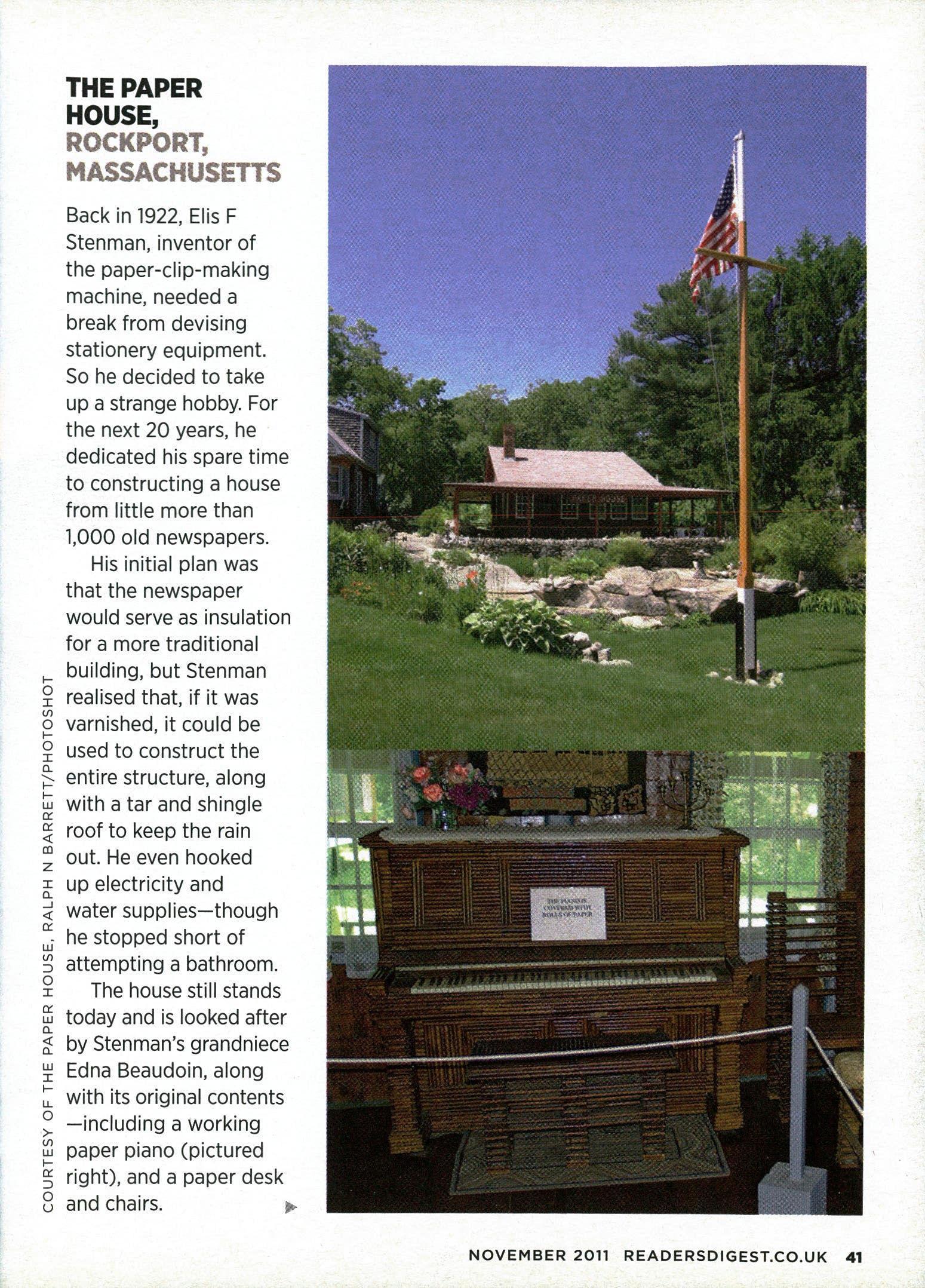
Back in 1922, Elis F Stenman, inventor of the paper-clip-making machine, needed a break from devising stationery equipment. So he decided to take up a strange hobby. For the next 20 years, he dedicated his spare time to constructing a house from little more than 1,000 old newspapers. His initial plan was that the newspaper would serve as insulation for a more traditional • building, but Stenman 2 realised that, if it was io varnished, it could be 2 used to construct the • entire structure, along Ii7 with a tar and shingle cc roof to keep the rain ffl z out. He even hooked E up electricity and water supplies—though ui
he stopped short of S' attempting a bathroom.
The house still stands today and is looked after by Stenman's grandniece Edna Beaudoin, along LL with its original contents o —including a working paper piano (pictured S right), and a paper desk 8 and chairs.

When the US air force dropped 400 tons of bombs on Japanese ships at Truk Atoll, near New Guinea, in February 1944, it accidentally created a diver's paradise.
The Second World War attack destroyed more than 40 ships and almost 300 planes that were stationed at the remote Pacific base, and the sunken wreckages now form an underwater war museum for anyone with scuba gear. Gas masks, depth charges, human skeletons, live shells and torpedoes add an element of danger to a swim in 890 square miles of clear blue water. to.

Deep within the canal networks of the ancient Xochimilco district
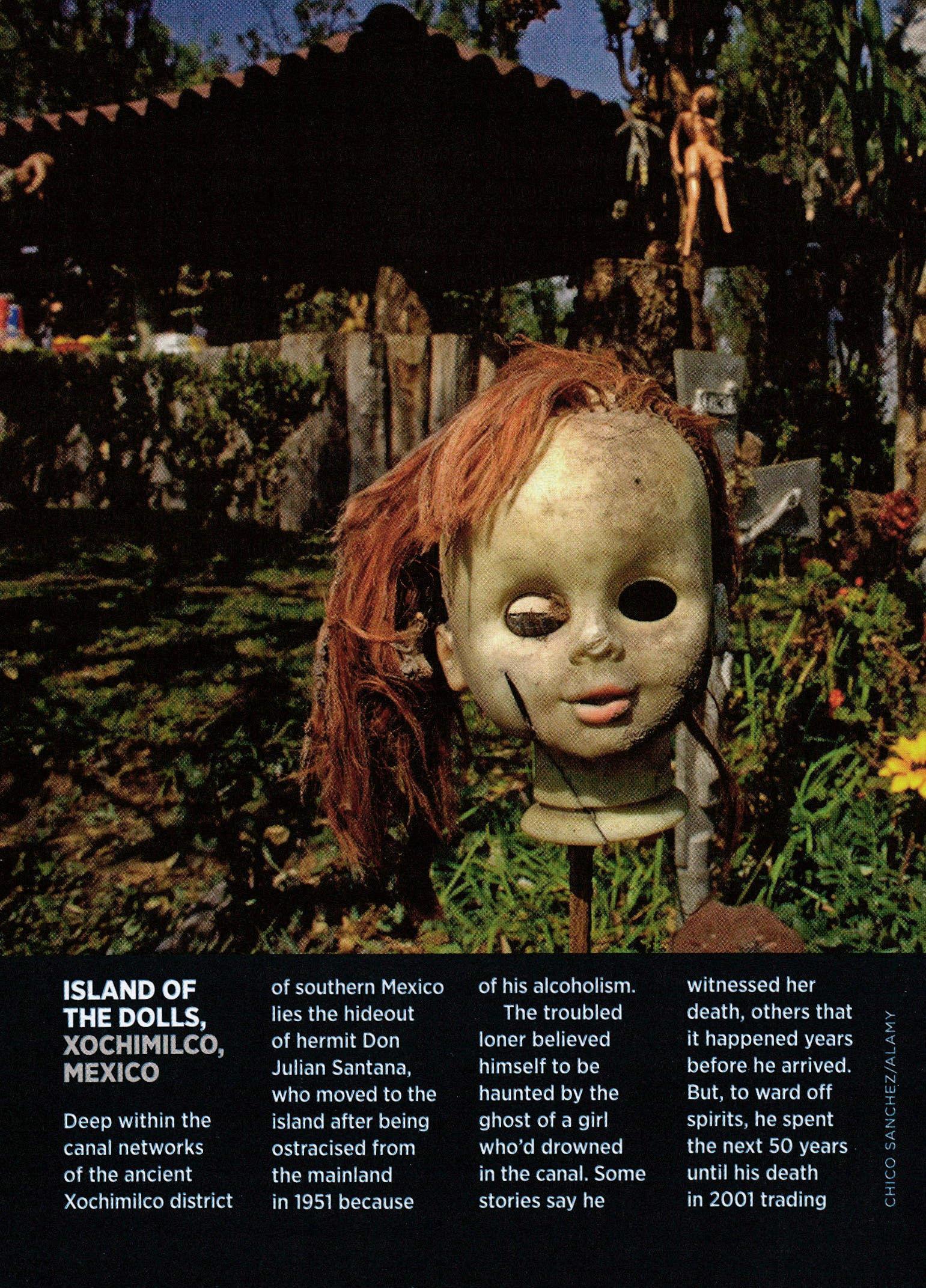
of southern Mexico lies the hideout of hermit Don Julian Santana, who moved to the island after being ostracised from the mainland in 1951 because
of his alcoholism. The troubled loner believed himself to be haunted by the ghost of a girl who'd drowned in the canal. Some stories say he
witnessed her death, others that it happened years before he arrived. But, to ward off spirits, he spent the next 50 years until his death in 2001 trading
his homegrown vegetables for old dolls, or fishing them out of the water and hanging them in the trees around his home.
To make the whole experience

of visiting the Island of the Dolls (aka Isla De Las Munecas) and its mottle-faced, often limbless, inhabitants even more eerie, you can only get there by canoe.
What do you get an elusive dictator who has everything? How about a stuffed alligator gripping a cocktail tray? This gift, from Nicaraguan rebels, is one of many presented to former North Korean leader Kim II-sung on display at the International Friendship Exhibition Hall in the North Pyongan province. Even comedian Dom Joly's paid a visit (see July's "I Remember).
Highlights at the museum, which houses up to 220,000 gifts given to Kim—who ruled from 1948 to 1994— and his successor Kim Jong-il, include a metal horseman from Colonel Gaddafi, a gem-encrusted sword from Yasser Arafat, and a luxury railway carriage from Stalin. Other presents range from the perverse—a bear's head presented by former Romanian leader Nicolae
ilCeausescu—to the more mundane, such as a football signed by Fele and a tiny rubber ashtray from a Chinese tyre factory.
More than 40,000 people rest in peace beneath the Cemetery Church of All Saints, in the small town of Sedlec. Or at least they would do if a woodcarver called Giovanni Santini hadn't sorted their bones in 1870 and began turning them into an art installation, which now attracts more than 200,000 visitors every year.
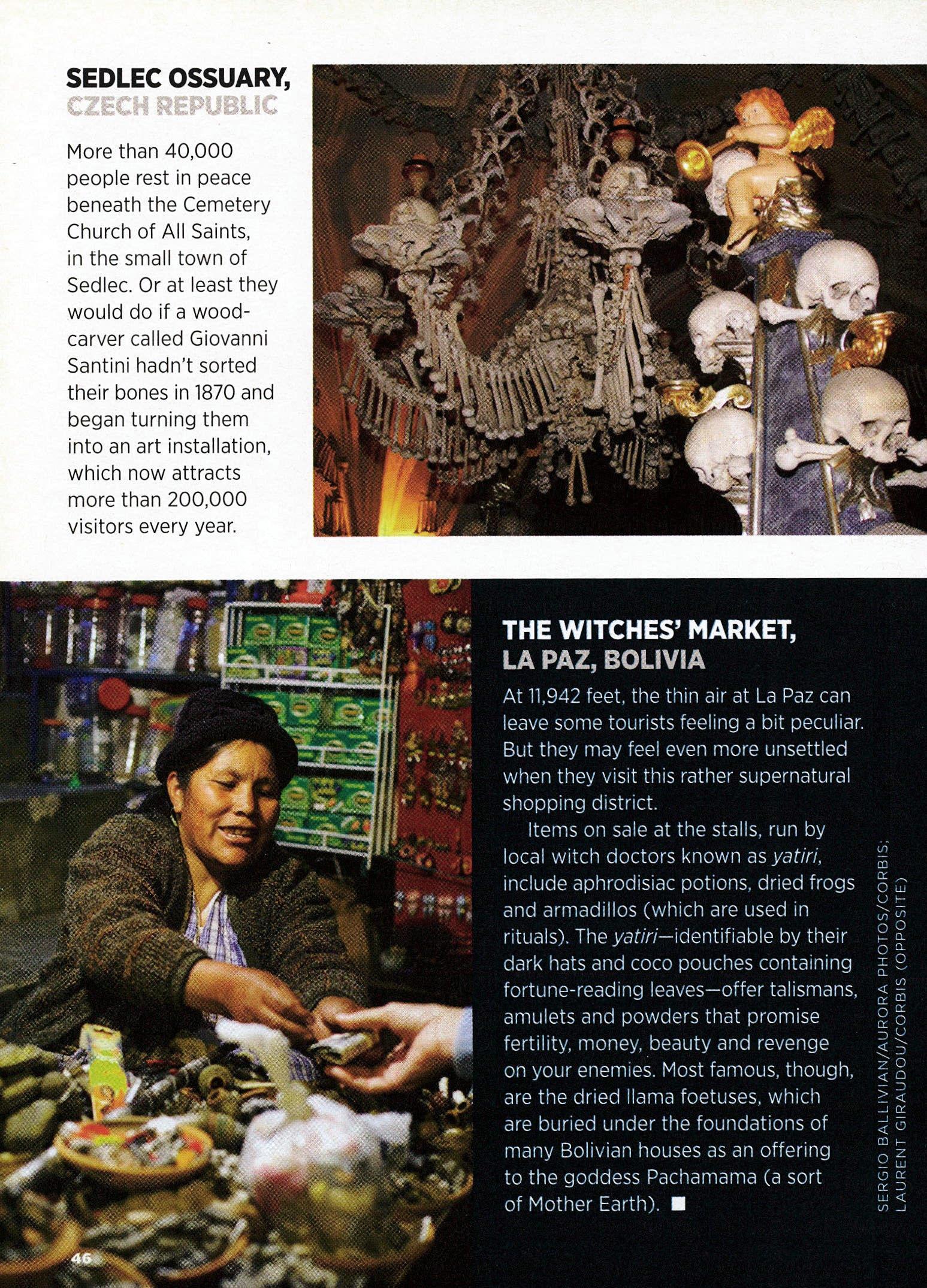
At 11,942 feet, the thin air at La Paz can leave some tourists feeling a bit peculiar. But they may feel even more unsettled when they visit this rather supernatural shopping district.
Items on sale at the stalls, run by local witch doctors known as yatiri, include aphrodisiac potions, dried frogs and armadillos (which are used in rituals). The yatiri—identifiable by their dark hats and coco pouches containing fortune-reading leaves—offer talismans, amulets and powders that promise fertility, money, beauty and revenge on your enemies. Most famous, though, are the dried llama foetuses, which are buried under the foundations of many Bolivian houses as an offering to the goddess Pachamama (a sort of Mother Earth). ■
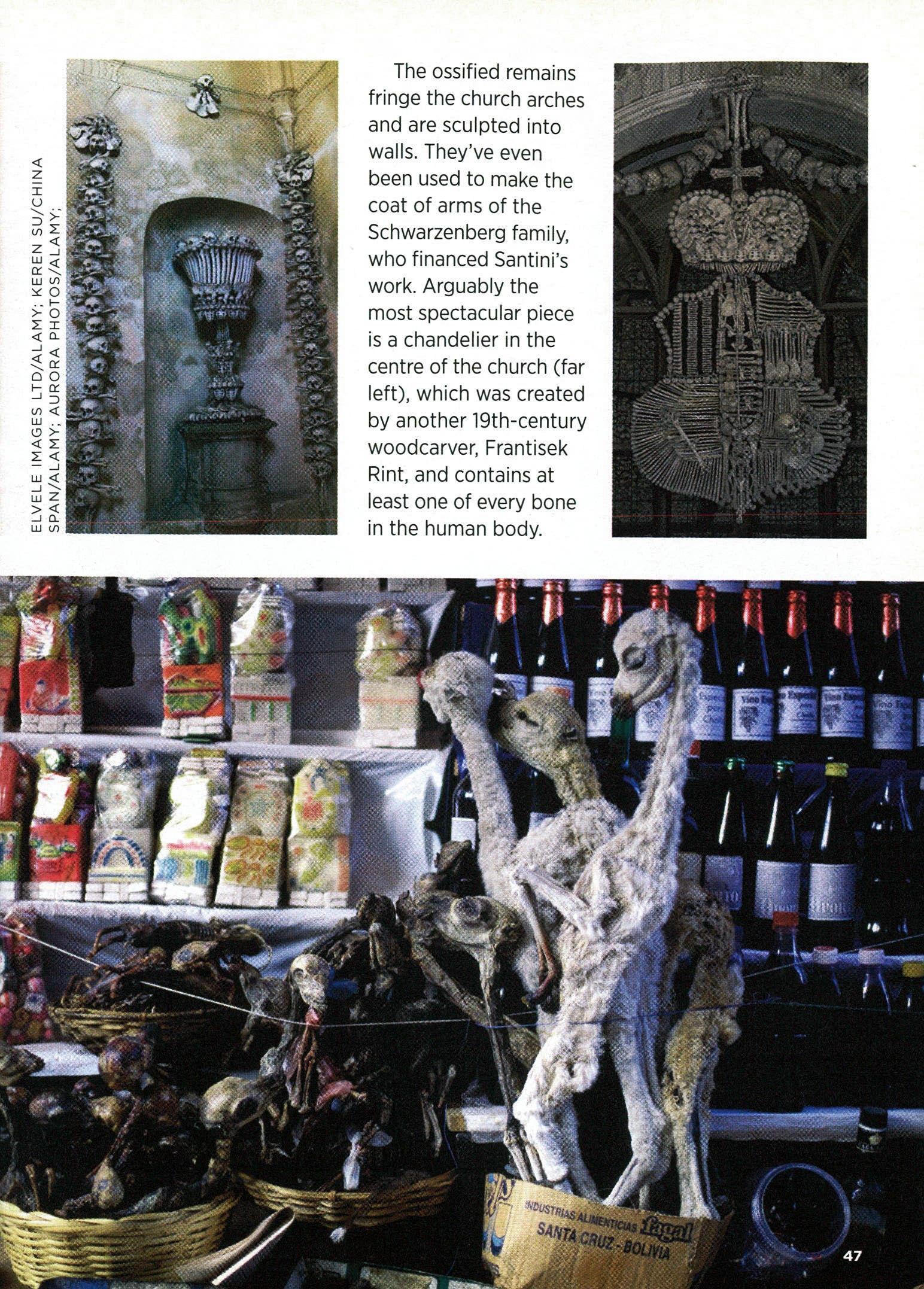
The ossified remains fringe the church arches and are sculpted into walls. They've even been used to make the coat of arms of the Schwarzenberg family, who financed Santini's work. Arguably the most spectacular piece is a chandelier in the centre of the church (far left), which was created by another 19th-century woodcarver, Frantisek Rint, and contains at least one of every bone in the human body.
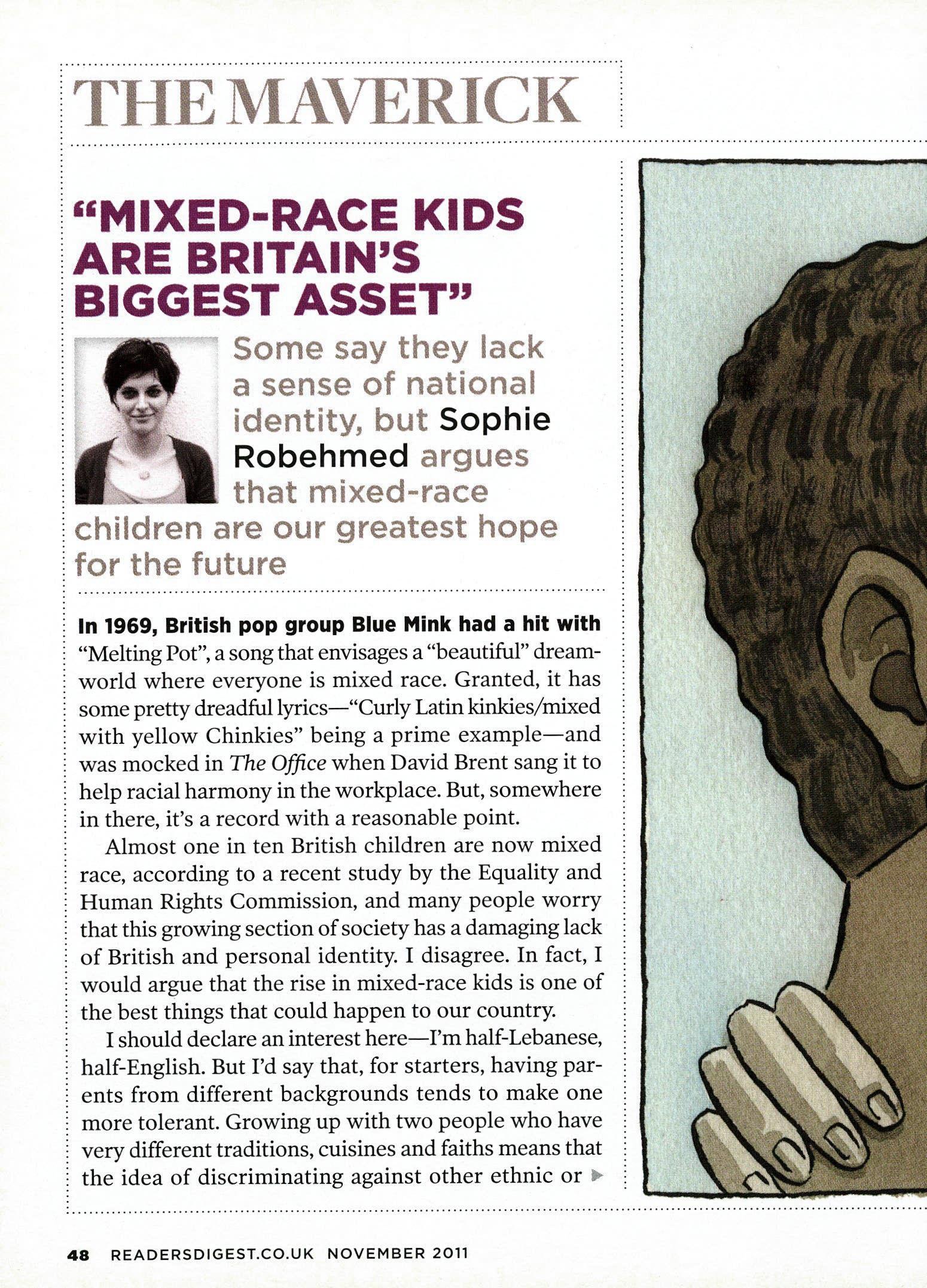
Some say they lack a sense of national identity, but Sophie Robehmed argues that mixed-race children are our greatest hope for the future
In 1969, British pop group Blue Mink had a hit with "Melting Pot", a song that envisages a "beautiful" dreamworld where everyone is mixed race. Granted, it has some pretty dreadful lyrics—"Curly Latin kinkies/mixed with yellow Chinkies" being a prime example—and was mocked in The Office when David Brent sang it to help racial harmony in the workplace. But, somewhere in there, it's a record with a reasonable point.
Almost one in ten British children are now mixed race, according to a recent study by the Equality and Human Rights Commission, and many people worry that this growing section of society has a damaging lack of British and personal identity. I disagree. In fact, I would argue that the rise in mixed-race kids is one of the best things that could happen to our country.
I should declare an interest here—I'm half-Lebanese, half-English. But I'd say that, for starters, having parents from different backgrounds tends to make one more tolerant. Growing up with two people who have very different traditions, cuisines and faiths means that the idea of discriminating against other ethnic or

minority groups seems daft to me.
(Marie*, my 23-year-old cousin, who's also half-Lebanese and grew up in Dubai, agrees. She was intrigued by a guy in her class who was half-Malaysian and half-Sri Lankan. "His mum was Muslim and his dad was Buddhist. I found his background fascinating," she says.)
An increase in the number of British people who learn two or more languages at home enhances our relations and ability to trade with other countries, including emergent economic superpowers such as India. Indeed, more than two million Britons can already speak subcontinental languages like Punjabi. More mixed-race people may also make for a more mobile workforce.
My ethnic makeup doesn't stop me feeling proud to be British, either. I like a Sunday roast as much as the next person
or celebrating national traditions, either—I like a Sunday roast as much as the next person. Look at the number of mixed-race sportsmen who feel honoured to represent Britain and boost its fortunes, including Rio Ferdinand, Lord Coe (half-Indian mother), Nasser Hussain, Lewis Hamilton and Theo Walcott. Then there are the likes of novelists Zadie Smith (White Teeth) and Monica Ali (Brick Lane), who blend their British and foreign heritage to bring something new and fresh to the nation's culture.
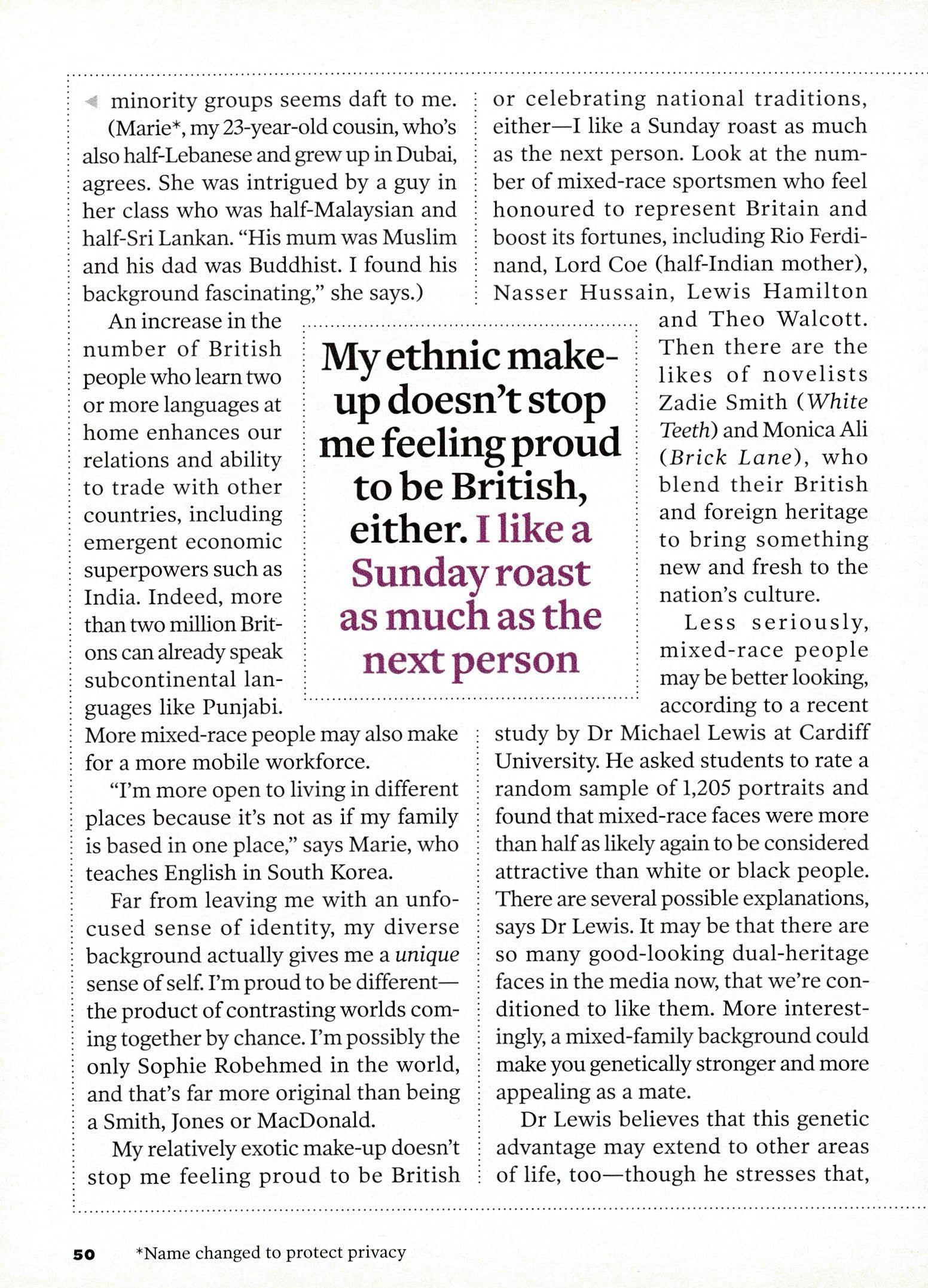
"I'm more open to living in different places because it's not as if my family is based in one place," says Marie, who teaches English in South Korea.
Far from leaving me with an unfocused sense of identity, my diverse background actually gives me a unique sense of self. I'm proud to be different— the product of contrasting worlds coming together by chance. I'm possibly the only Sophie Robehmed in the world, and that's far more original than being a Smith, Jones or MacDonald.
My relatively exotic make-up doesn't stop me feeling proud to be British
Less seriously, mixed-race people may be better looking, according to a recent study by Dr Michael Lewis at Cardiff University. He asked students to rate a random sample of 1,205 portraits and found that mixed-race faces were more than half as likely again to be considered attractive than white or black people. There are several possible explanations, says Dr Lewis. It may be that there are so many good-looking dual-heritage faces in the media now, that we're conditioned to like them. More interestingly, a mixed-family background could make you genetically stronger and more appealing as a mate.
Dr Lewis believes that this genetic advantage may extend to other areas of life, too—though he stresses that,
as yet, there's no firm evidence to back this up. But it's certainly true that many dual-heritage people seem to achieve more than their parents, Barack Obama being the most obvious example.
"My identity might begin with the fact of my race, but it didn't, couldn't, end there," Obama has said. "At least, that's what I'd choose to believe."
Join the de facebook.com digestuk or readersiet readersdi co.uk bate at /readers email ters a gest.
Perhaps because we don't identify ourselves with one particular ethnic group, many mixed-race people seem especially keen to transcend any negative connotations or disadvantages attached to their racial backgrounds.
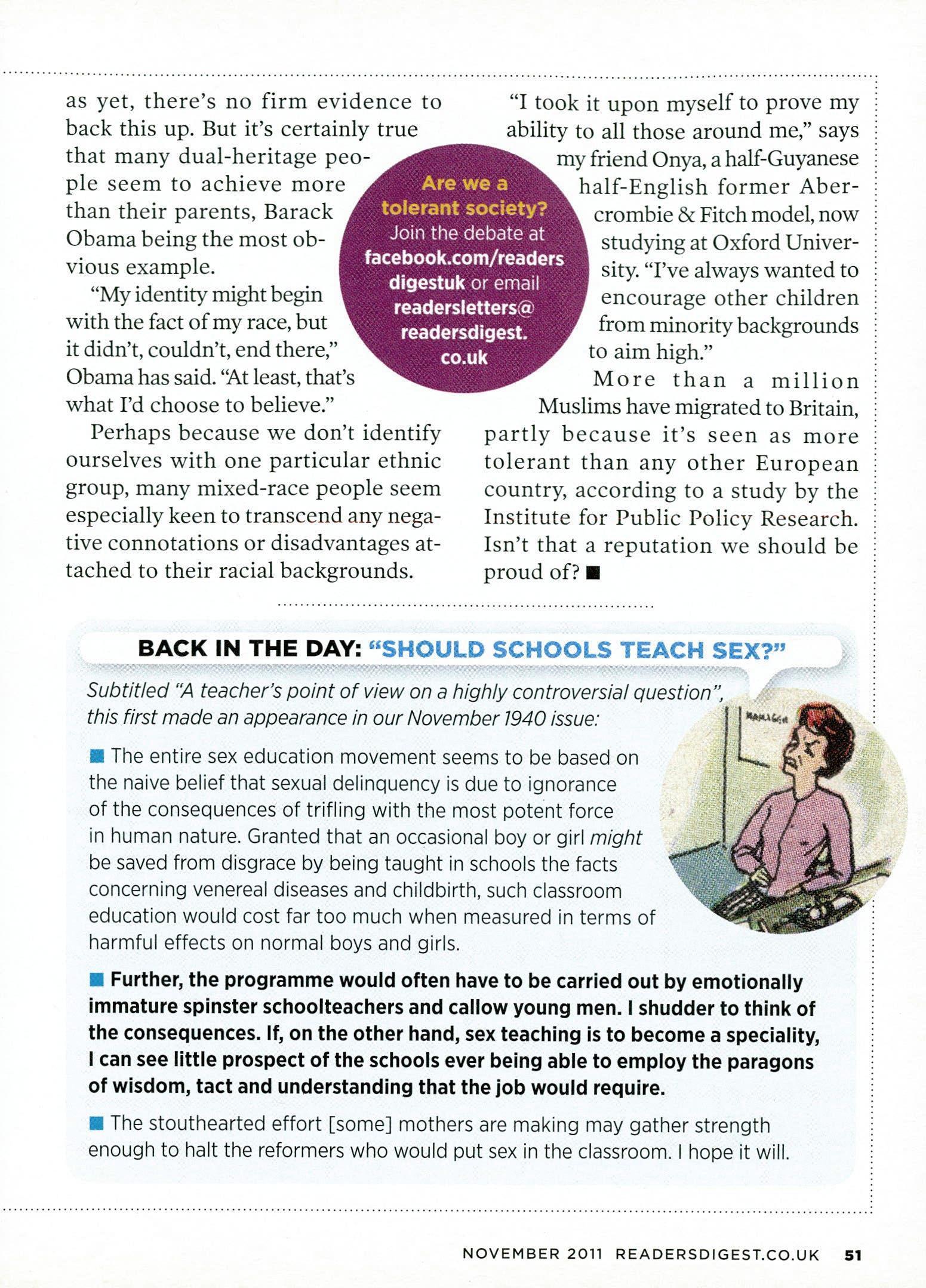
"I took it upon myself to prove my ability to all those around me," says my friend Onya, a half-Guyanese half-English former Abercrombie & Fitch model, now studying at Oxford University. "I've always wanted to encourage other children from minority backgrounds to aim high."
More than a million Muslims have migrated toBritain, partly because it's seen as more tolerant than any other European country, according to a study by the Institute for Public Policy Research. Isn't that a reputation we should be proud of? ■
Subtitled 'A teacher's point of view on a highly controversial question", this first made an appearance in our November1940 issue:
■ The entire sex education movement seems to be based on the naive belief that sexual delinquency is due to ignorance of the consequences of trifling with the most potrit force in human nature. Granted that an occasional boy or girl might be saved from disgrace by being taught in schools the facts concerning venereal diseases and childbirth, such classroom education would cost far too much when measured in terms of harmful effects on normal boys and girls.
■ Further, the programme would often have to be carried out by emotionally immature spinster schoolteachers and callow young men. I shudder to think of the consequences. If, on the other hand, sex teaching is to become a speciality, I can see little prospect of the schools ever being able to employ the paragons of wisdom, tact and understanding that the job would require.
■The stouthearted effort [some] mothers are making may gather strength enough to halt the reformers who would put sex in the classroom. I hope it will.
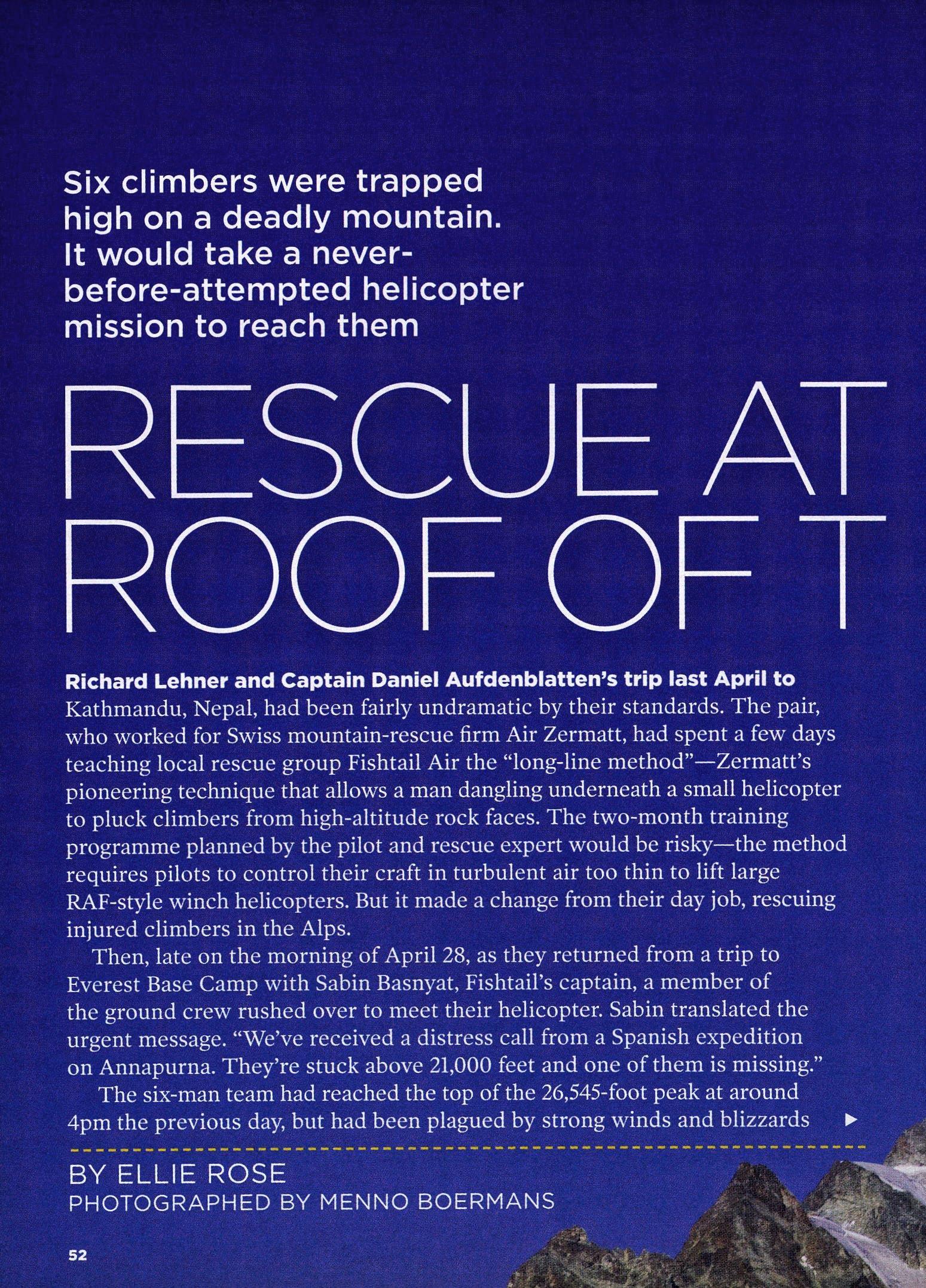
Six climbers were trapped high on a deadly mountain. It would take a neverbefore-attempted helicopter mission to reach them
Richard Lehner and Captain Daniel Aufdenblatten's trip last April to Kathmandu, Nepal, had been fairly undramatic by their standards. The pair, who worked for Swiss mountain-rescue firm Air Zermatt, had spent a few days teaching local rescue group Fishtail Air the "long-line method"—Zermatt's pioneering technique that allows a man dangling underneath a small helicopter to pluck climbers from high-altitude rock faces. The two-month training programme planned by the pilot and rescue expert would be risky—the method requires pilots to control their craft in turbulent air too thin to lift large RAF-style winch helicopters. But it made a change from their day job, rescuing injured climbers in the Alps.
Then, late on the morning of April 28, as they returned from a trip to Everest Base Camp with Sabin Basnyat, Fishtail's captain, a member of the ground crew rushed over to meet their helicopter. Sabin translated the urgent message. "We've received a distress call from a Spanish expedition on Annapurna. They're stuck above 21,000 feet and one of them is missing."
The six-man team had reached the top of the 26,545-foot peak at around 4pm the previous day, but had been plagued by strong winds and blizzards
BY ELLIE ROSE PHOTOGRAPHED BY MENNO BOERMANS
on their way down. The only amateur climber in the group, 39-year-old father-of-two Tolo Calafat, had fallen behind, and Sonam, the Sherpa who'd initially stayed with him, had had to abandon him at 24,500 feet, when he was too exhausted to go any further.
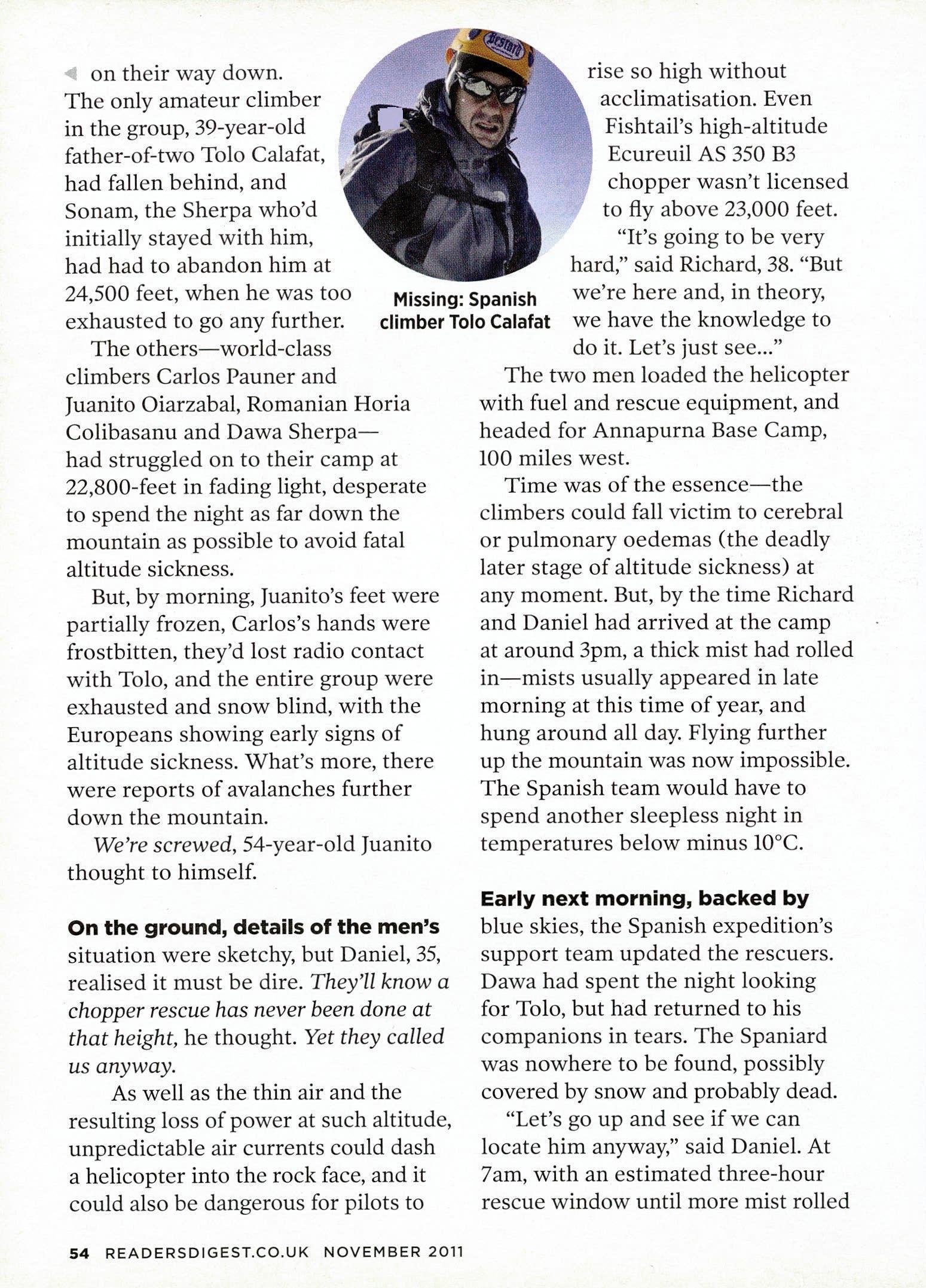
The others—world-class climbers Carlos Pauner and Juanito Oiarzabal, Romanian Horia Colibasanu and Dawa Sherpa— had struggled on to their camp at 22,800-feet in fading light, desperate to spend the night as far down the mountain as possible to avoid fatal altitude sickness.
But, by morning, Juanito's feet were partially frozen, Carlos's hands were frostbitten, they'd lost radio contact with Tolo, and the entire group were exhausted and snow blind, with the Europeans showing early signs of altitude sickness. What's more, there were reports of avalanches further down the mountain.
We're screwed, 54-year-old Juanito thought to himself.
On the ground, details of the men's situation were sketchy, but Daniel, 35, realised it must be dire. They'll know a chopper rescue has never been done at that height, he thought. Yet they called us anyway.
As well as the thin air and the resulting loss of power at such altitude, unpredictable air currents could dash a helicopter into the rock face, and it could also be dangerous for pilots to
rise so high without acclimatisation. Even Fishtail's high-altitude Ecureuil AS 350 B3 chopper wasn't licensed to fly above 23,000 feet.
"It's going to be very hard," said Richard, 38. "But we're here and, in theory, we have the knowledge to do it. Let's just see..."
The two men loaded the helicopter with fuel and rescue equipment, and headed for Annapurna Base Camp, 100 miles west.
Time was of the essence—the climbers could fall victim to cerebral or pulmonary oedemas (the deadly later stage of altitude sickness) at any moment. But, by the time Richard and Daniel had arrived at the camp at around 3pm, a thick mist had rolled in—mists usually appeared in late morning at this time of year, and hung around all day. Flying further up the mountain was now impossible. The Spanish team would have to spend another sleepless night in temperatures below minus 10°C.
Early next morning, backed by blue skies, the Spanish expedition's support team updated the rescuers. Dawa had spent the night looking for Tolo, but had returned to his companions in tears. The Spaniard was nowhere to be found, possibly covered by snow and probably dead.
"Let's go up and see if we can locate him anyway," said Daniel. At 7am, with an estimated three-hour rescue window until more mist rolled
Annapurna is actually the name given to a series of peaks in the Himalayas, a massif, the highest point of which is Annapurna I (which the Spanish team climbed), standing at 26,545 feet—the tenth tallest mountain on earth. It was first conquered by Louis Lachenal and Maurice Herzog in June 1950. But, though it was the first of the world's 14 mountains over 26,000 feet to be summited, it's still the least climbed. Frequent avalanches and ice falls make it incredibly dangerous, and around four in ten climbers who try for the summit lose their lives.

in, Richard and Daniel hopped into the Ecureuil.
As Daniel took the craft higher, he began to appreciate Annapurna's terrifying beauty. It's amazing, he thought. So steep. If I fly out only 150 feet from the rock face, there's 10,000 feet of nothing to the ground!
After 20 minutes in the air, there was no sign of Tolo. But they spotted the climbers' camp in the distance.
"It's on a steep slope," said Richard. "There's no chance we can land."
Strong winds had started buffeting the helicopter violently. "We're like a punchbag up here," said Daniel. They'd have to turn back.
At Base Camp, Sherpas brought tea for the two men as they discussed their options. Perhaps they could drop oxygen and medicine to help the climbers overcome their altitude sickness. Maybe some Sherpas could go up and help them down. But both 0
Richard (left) and Daniel knew that no rescue chopper had ever flown this high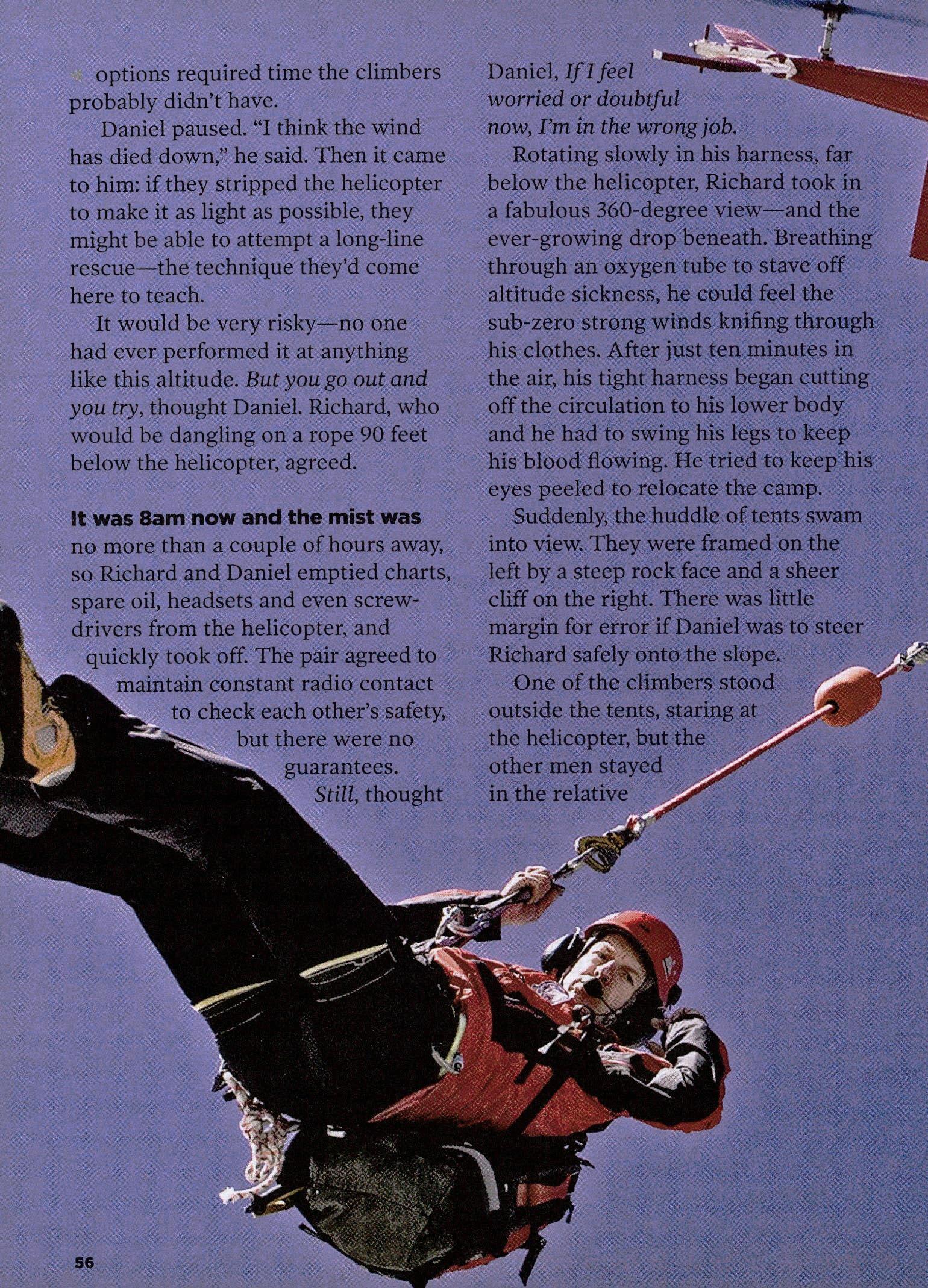
options required time the climbers probably didn't have.
Daniel paused. "I think the wind has died down," he said. Then it came to him: if they stripped the helicopter to make it as light as possible, they might be able to attempt a long-line rescue—the technique they'd come here to teach.
It would be very risky—no one had ever performed it at anything like this altitude. But you go out and you try, thought Daniel. Richard, who would be dangling on a rope 90 feet below the helicopter, agreed.
It was 8am now and the mist was no more than a couple of hours away, so Richard and Daniel emptied charts, spare oil, headsets and even screwdrivers from the helicopter, and quickly took off. The pair agreed to maintain constant radio contact to check each other's safety, but there were no guarantees.
Still, thought
Daniel, If I feel worried or doubtful now, I'm in the wrong job.
Rotating slowly in his harness, far below the helicopter, Richard took in a fabulous 360-degree view—and the ever-growing drop beneath. Breathing through an oxygen tube to stave off altitude sickness, he could feel the sub-zero strong winds knifing through his clothes. After just ten minutes in the air, his tight harness began cutting off the circulation to his lower body and he had to swing his legs to keep his blood flowing. He tried to keep his eyes peeled to relocate the camp.
Suddenly, the huddle of tents swam into view. They were framed on the left by a steep rock face and a sheer cliff on the right. There was little margin for error if Daniel was to steer Richard safely onto the slope.
One of the climbers stood outside the tents, staring at the helicopter, but the other men stayed in the relative
warm eir ac up team had told them the Swiss were in the area, but the climbers weren't sure they could reach them. Anyway probable loss of their friend To curtailed any possible euphoria.
Richard began directing Dani towards the slope. Swinging 100 fe from the mountainside, he could on trust that his pilot was skilled enoug in the gales to keep him from smashing into the rock. Any miscalculation would be hard to correct.
"What's the height?" asked Daniel. "150 feet," replied Richard.
"How about now, Richi?"
Suddenly, the helicopter bounced on the wind and Richard found himself tossed around, swinging towards the wall of rock and back out again. Concentrate! Daniel urged himself, and pulled away from the mountain. He moved in again. The wind held off and Richard counted down: "Five feet, four, three, two...touching!"

ar e osure his surroundings, Daniel suddenly felt uneasy.
"I don't like it," he said. "I'm going to lift you up again." Daniel always felt you had to rely on yOur instincts when flying—and, within seconds, he was proved right.
"I have only ten minutes of oxygen left," said Richard. There was no way he could stay on the mountain—he'd soon be totally disorientated.
They returned to Base Camp and replaced the oxygen bottle. There was now less than an hour and a half
Air Zermatt do 1,500 rescues a year, of which 1,400 are successful
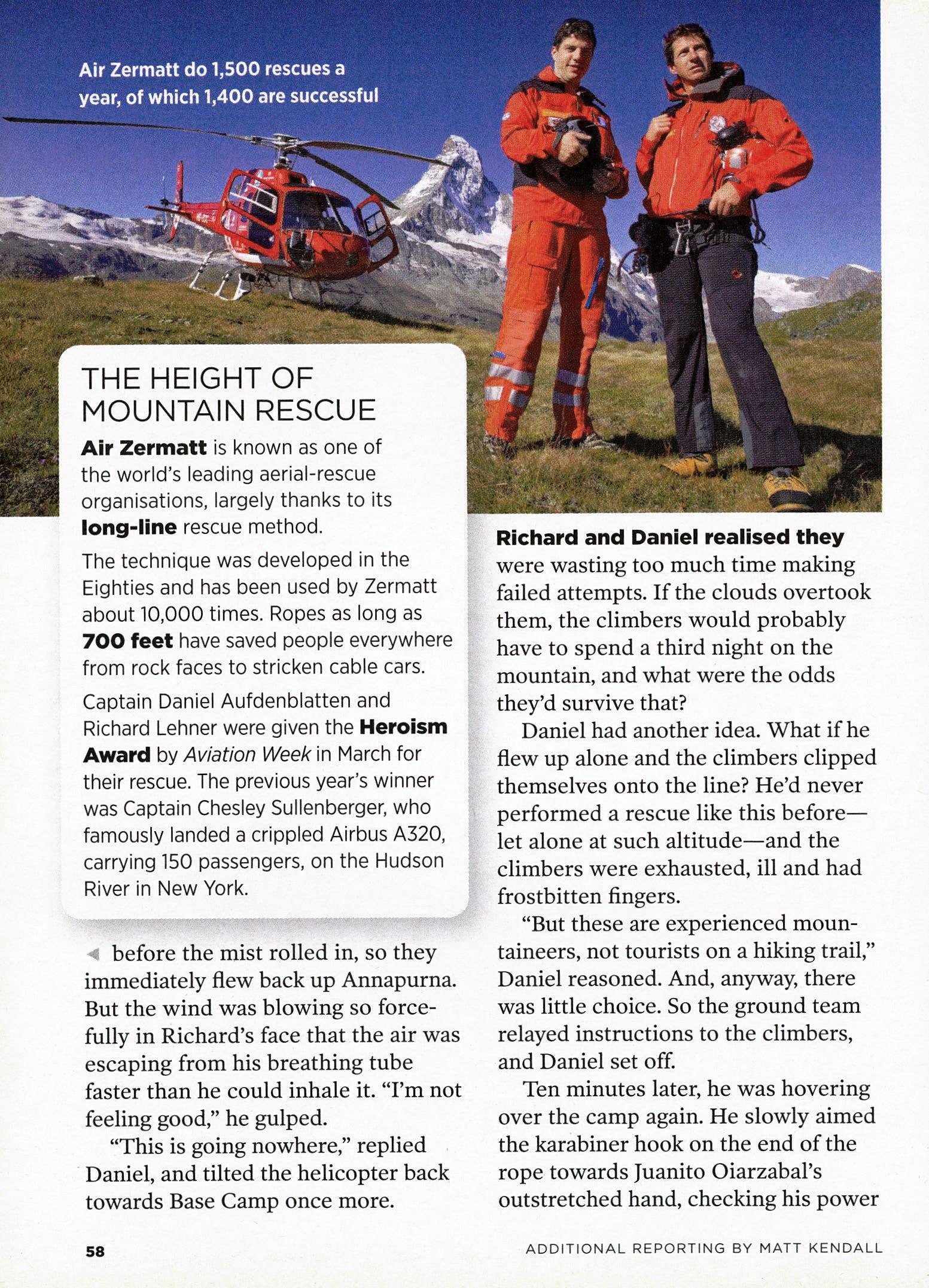
Air Zermatt is known as one of the world's leading aerial-rescue organisations, largely thanks to its long-line rescue method.
The technique was developed in the Eighties and has been used by Zermatt about 10,000 times. Ropes as long as 700 feet have saved people everywhere from rock faces to stricken cable cars.
Captain Daniel Aufdenblatten and Richard Lehner were given the Heroism Award by Aviation Week in March for their rescue. The previous year's winner was Captain Chesley Sullenberger, who famously landed a crippled Airbus A320, carrying 150 passengers, on the Hudson River in New York.
before the mist rolled in, so they immediately flewback up Annapurna. But the wind was blowing so forcefully in Richard's face that the air was escaping from his breathing tube faster than he could inhale it. "I'm not feeling good," he gulped.
"This is going nowhere," replied Daniel, and tilted the helicopter back towards Base Camp once more.
Richard and Daniel realised they were wasting too much time making failed attempts. If the clouds overtook them, the climbers would probably have to spend a third night on the mountain, and what were the odds they'd survive that?
Daniel had another idea. What if he flew up alone and the climbers clipped themselves onto the line? He'd never performed a rescue like this before— let alone at such altitude—and the climbers were exhausted, ill and had frostbitten fingers.
"But these are experienced mountaineers, not tourists on a hiking trail," Daniel reasoned. And, anyway, there was little choice. So the ground team relayed instructions to the climbers, and Daniel set off.
Ten minutes later, he was hovering over the camp again. He slowly aimed the karabiner hook on the end of the rope towards Juanito Oiarzabal's outstretched hand, checking his power
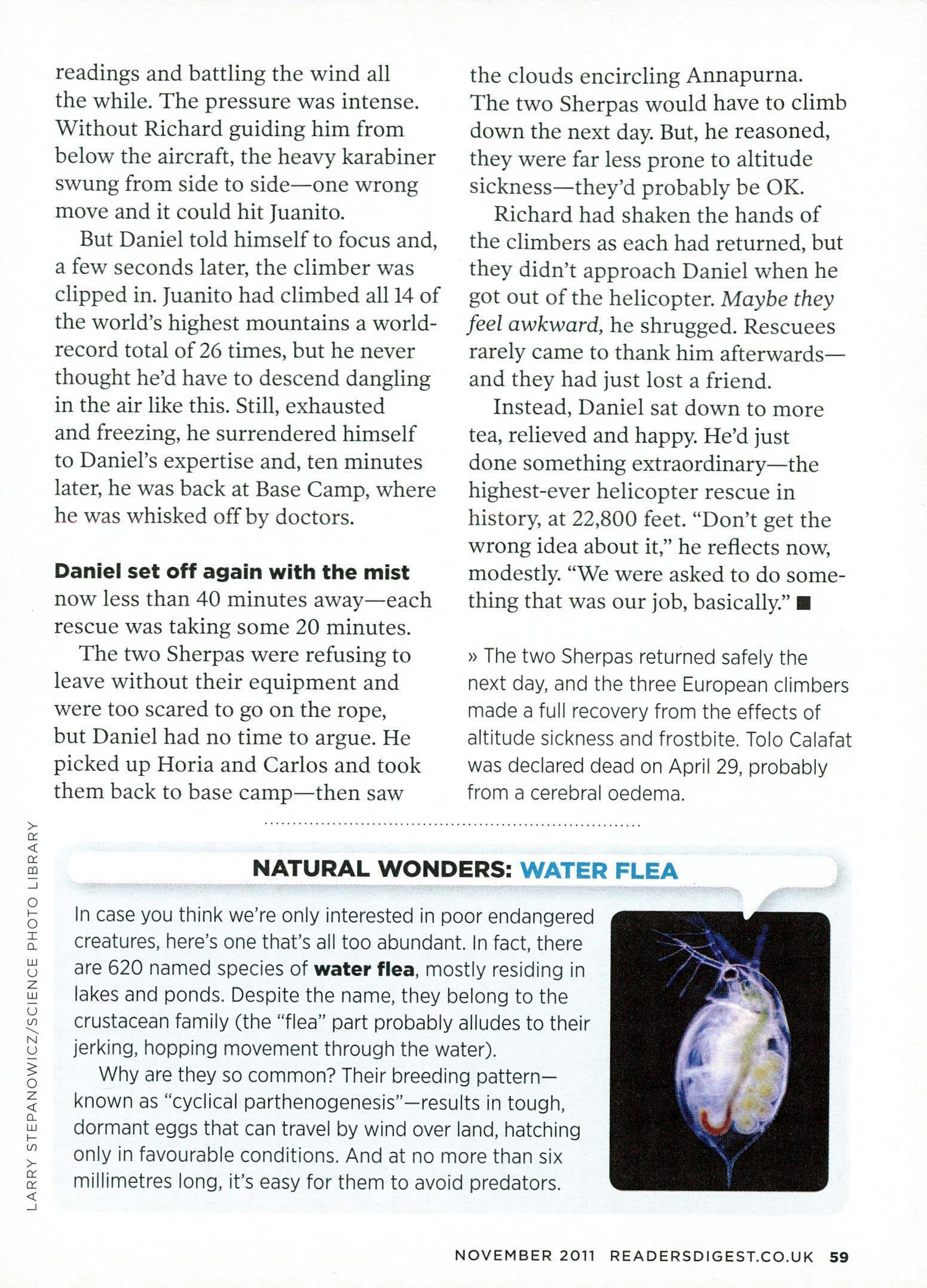
readings and battling the wind all the while. The pressure was intense. Without Richard guiding him from below the aircraft, the heavy karabiner swung from side to side—one wrong move and it could hit Juanito.
But Daniel told himself to focus and, a few seconds later, the climber was clipped in. Juanito had climbed all 14 of the world's highest mountains a worldrecord total of 26 times, but he never thought he'd have to descend dangling in the air like this. Still, exhausted and freezing, he surrendered himself to Daniel's expertise and, ten minutes later, he was back at Base Camp, where he was whisked off by doctors.
Daniel set off again with the mist now less than 40 minutes away—each rescue was taking some 20 minutes.
The two Sherpas were refusing to leave without their equipment and were too scared to go on the rope, but Daniel had no time to argue. He picked up Horia and Carlos and took them back to base camp—then saw
the clouds encircling Annapurna. The two Sherpas would have to climb down the next day. But, he reasoned, they were far less prone to altitude sickness—they'd probably be OK.
Richard had shaken the hands of the climbers as each had returned, but they didn't approach Daniel when he got out of the helicopter. Maybe they feel awkward, he shrugged. Rescuees rarely came to thank him afterwards— and they had just lost a friend.
Instead, Daniel sat down to more tea, relieved and happy. He'd just done something extraordinary—the highest-ever helicopter rescue in history, at 22,800 feet. "Don't get the wrong idea about it," he reflects now, modestly. "We were asked to do something that was our job, basically" ■
» The two Sherpas returned safely the next day, and the three European climbers made a full recovery from the effects of altitude sickness and frostbite. Tolo Calafat was declared dead on April 29, probably from a cerebral oedema.
In case you think we're only interested in poor endangered creatures, here's one that's all too abundant. In fact, there are 620 named species of water flea, mostly residing in lakes and ponds. Despite the name, they belong to the crustacean family (the "flea" part probably alludes to their jerking, hopping movement through the water).
Why are they so common? Their breeding pattern— known as "cyclical parthenogenesis"—results in tough, dormant eggs that can travel by wind over land, hatching only in favourable conditions. And at no more than six millimetres long, it's easy for them to avoid predators.
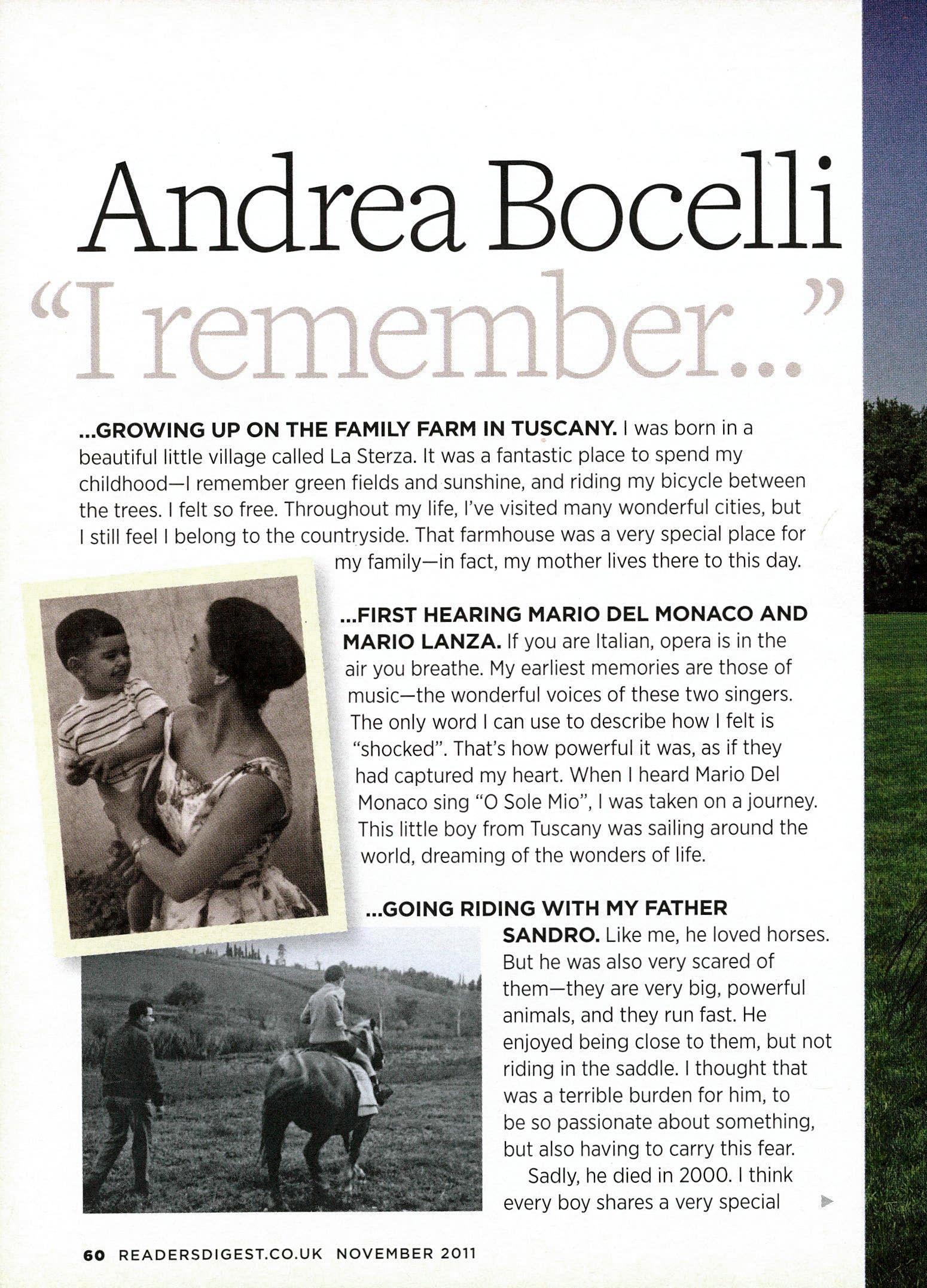
...GROWING UP ON
I was born in a beautiful little village called La Sterza. It was a fantastic place to spend my childhood-1 remember green fields and sunshine, and riding my bicycle between the trees. I felt so free. Throughout my life, I've visited many wonderful cities, but I still feel I belong to the countryside. That farmhouse was a very special place for my family—in fact, my mother lives there to this day.
If you are Italian, opera is in the air you breathe. My earliest memories are those of music—the wonderful voices of these two singers. The only word I can use to describe how I felt is "shocked". That's how powerful it was, as if they had captured my heart. When I heard Mario Del Monaco sing "0 Sole Mio", I was taken on a journey. This little boy from Tuscany was sailing around the world, dreaming of the wonders of life.
...GOING
SANDRO. Like me, he loved horses. But he was also very scared of them—they are very big, powerful animals, and they run fast. He enjoyed being close to them, but not riding in the saddle. I thought that was a terrible burden for him, to be so passionate about something, but also having to carry this fear. Sadly, he died in 2000. I think every boy shares a very special ►
 Italian tenor Andrea riding in Central Park this September and, (left) with his mother Edi and father Sandro
Italian tenor Andrea riding in Central Park this September and, (left) with his mother Edi and father Sandro
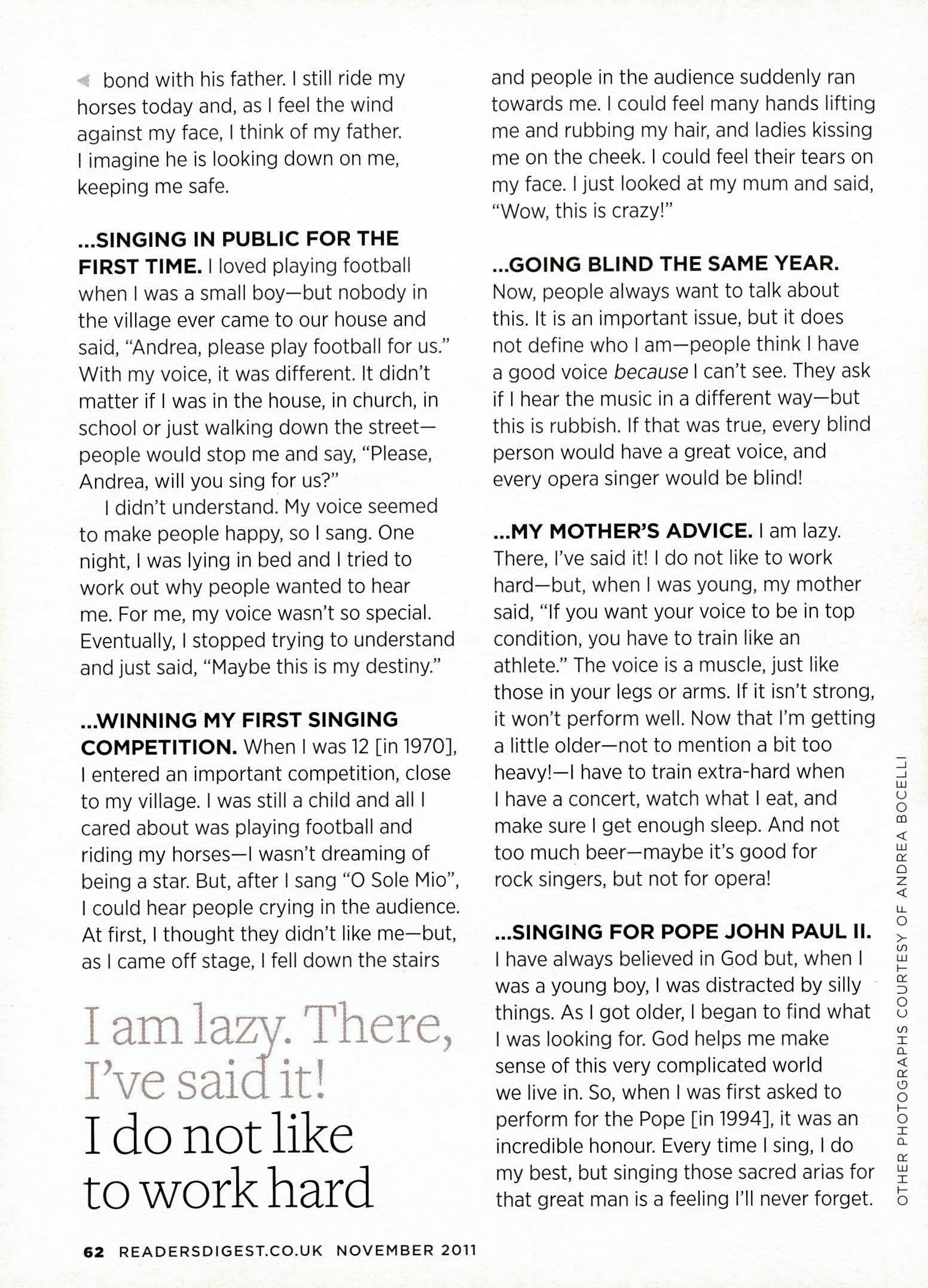
bond with his father. I still ride my horses today and, as I feel the wind against my face, I think of my father. I imagine he is looking down on me, keeping me safe.
...SINGING IN PUBLIC FOR THE FIRST TIME. I loved playing football when I was a small boy—but nobody in the village ever came to our house and said, "Andrea, please play football for us." With my voice, it was different. It didn't matter if I was in the house, in church, in school or just walking down the street— people would stop me and say, "Please, Andrea, will you sing for us?"
I didn't understand. My voice seemed to make people happy, so I sang. One night, I was lying in bed and I tried to work out why people wanted to hear me. For me, my voice wasn't so special. Eventually, I stopped trying to understand and just said, "Maybe this is my destiny."
...WINNING MY FIRST SINGING COMPETITION. When I was 12 [in 1970], I entered an important competition, close to my village. I was still a child and all I cared about was playing football and riding my horses—I wasn't dreaming of being a star. But, after I sang "0 Sole Mio", I could hear people crying in the audience. At first, I thought they didn't like me—but, as I came off stage, I fell down the stairs
I am la There, I've sal it! I do not like to work hard
and people in the audience suddenly ran towards me. I could feel many hands lifting me and rubbing my hair, and ladies kissing me on the cheek. I could feel their tears on my face. I just looked at my mum and said, "Wow, this is crazy!"
Now, people always want to talk about this. It is an important issue, but it does not define who I am—people think I have a good voice because I can't see. They ask if I hear the music in a different way—but this is rubbish. If that was true, every blind person would have a great voice, and every opera singer would be blind!
...MY MOTHER'S
I am
There, I've said it! I do not like to work hard—but, when I was young, my mother said, "If you want your voice to be in top condition, you have to train like an athlete." The voice is a muscle, just like those in your legs or arms. If it isn't strong, it won't perform well. Now that I'm getting a little older—not to mention a bit too heavy!—I have to train extra-hard when I have a concert, watch what I eat, and make sure I get enough sleep. And not too much beer—maybe it's good for rock singers, but not for opera!
I have always believed in God but, when I was a young boy, I was distracted by silly things. As I got older, I began to find what I was looking for. God helps me make sense of this very complicated world we live in. So, when I was first asked to perform for the Pope [in 1994], it was an incredible honour. Every time I sing, I do my best, but singing those sacred arias for that great man is a feeling I'll never forget.
...RECORDING "TIME TO SAY GOODBYE". Sarah Brightman [pictured below on stage with Andrea] has been so important for my career because of one song: "Time to Say Goodbye". When we first recorded it, we knew it was beautiful, but we had no idea how much it would mean to people.
Music is a mystery. I can listen to a certain song and it makes me cry—but
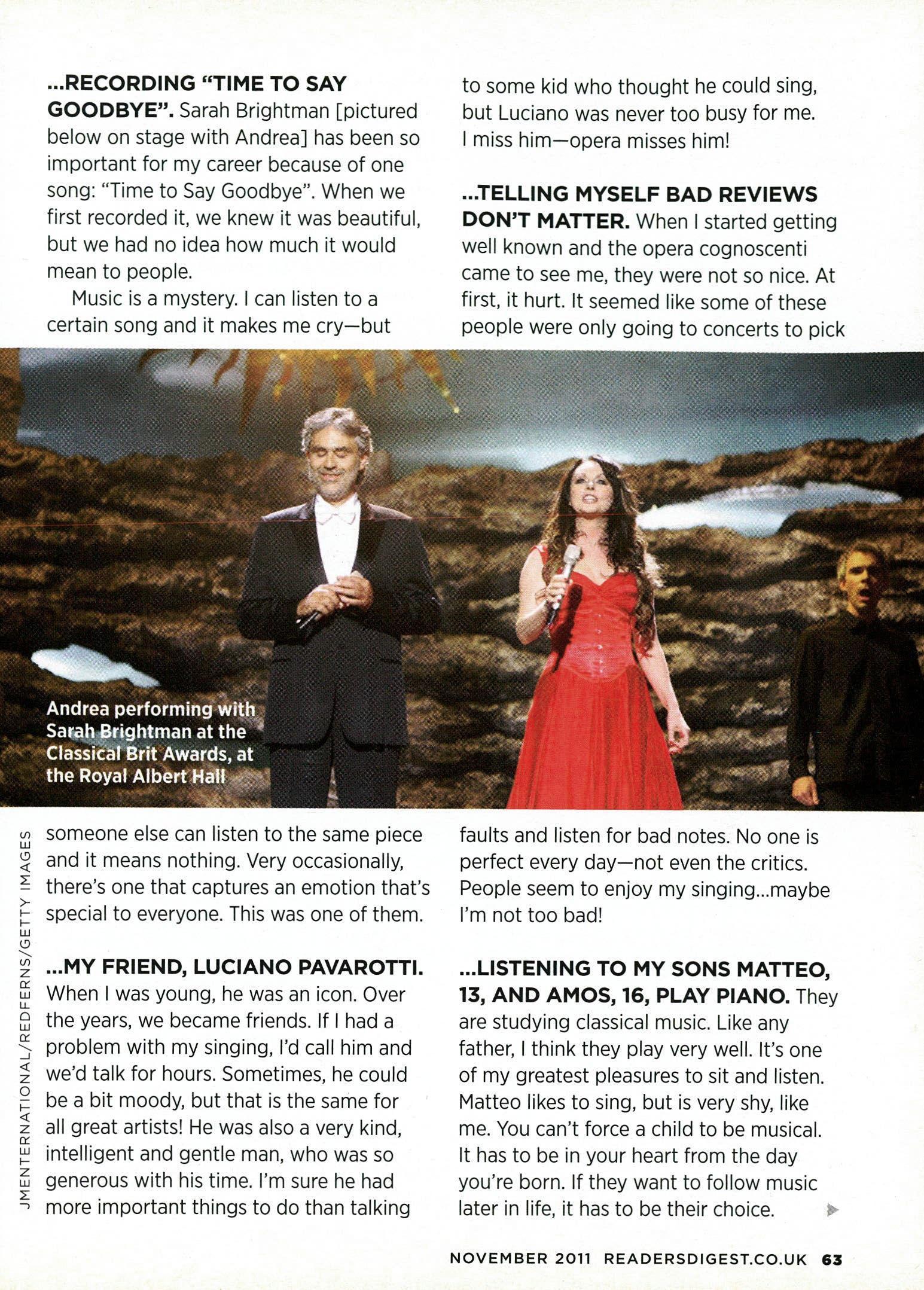
Andrea performing with Sarah Brightman at the Classical Brit Awards, at the Royal Albert Hall
someone else can listen to the same piece and it means nothing. Very occasionally, there's one that captures an emotion that's special to everyone. This was one of them.
...MY FRIEND, LUCIANO PAVAROTTI.
When I was young, he was an icon. Over the years, we became friends. If I had a problem with my singing, I'd call him and we'd talk for hours. Sometimes, he could be a bit moody, but that is the same for all great artists! He was also a very kind, intelligent and gentle man, who was so generous with his time. I'm sure he had more important things to do than talking
to some kid who thought he could sing, but Luciano was never too busy for me. I miss him—opera misses him!
DON'T MATTER. When I started getting well known and the opera cognoscenti came to see me, they were not so nice. At first, it hurt. It seemed like some of these people were only going to concerts to pick
faults and listen for bad notes. No one is perfect every day—not even the critics. People seem to enjoy my singing...maybe I'm not too bad!
...LISTENING TO MY SONS MATTEO, 13, AND AMOS, 16, PLAY PIANO. They are studying classical music. Like any father, I think they play very well. It's one of my greatest pleasures to sit and listen. Matteo likes to sing, but is very shy, like me. You can't force a child to be musical. It has to be in your heart from the day you're born. If they want to follow music later in life, it has to be their choice.
Andrea with his pal Pavarotti and (inset) singing a lullaby to Elmo
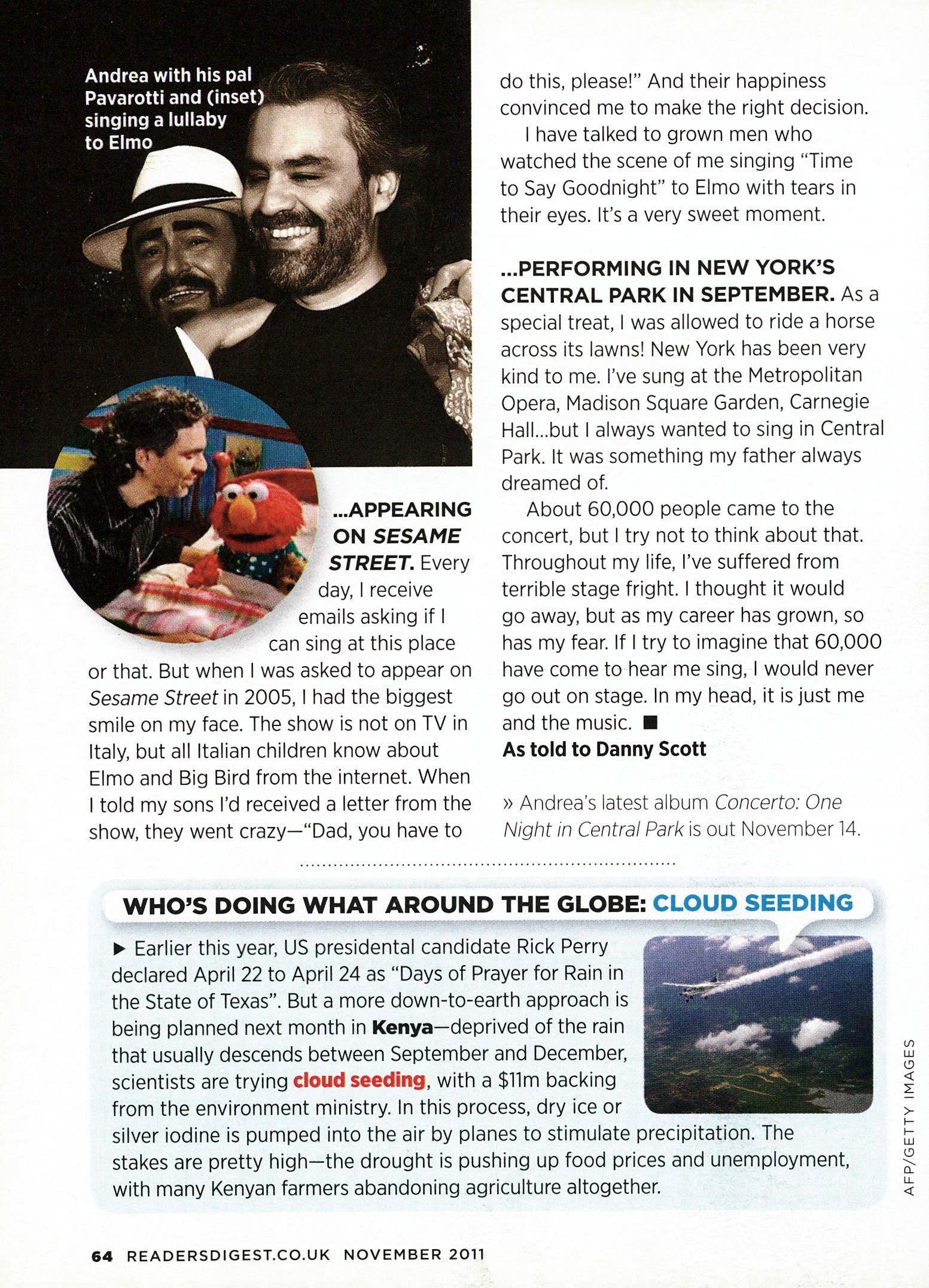
Every day, I receive emails asking if I can sing at this place or that. But when I was asked to appear on Sesame Street in 2005, I had the biggest smile on my face. The show is not on TV in Italy, but all Italian children know about Elmo and Big Bird from the internet. When I told my sons I'd received a letter from the show, they went crazy—"Dad, you have to
do this, please!" And their happiness convinced me to make the right decision. I have talked to grown men who watched the scene of me singing "Time to Say Goodnight" to Elmo with tears in their eyes. It's a very sweet moment.
...PERFORMING IN NEW YORK'S CENTRAL PARK IN SEPTEMBER. As a special treat, I was allowed to ride a horse across its lawns! New York has been very kind to me. I've sung at the Metropolitan Opera, Madison Square Garden, Carnegie Hall...but I always wanted to sing in Central Park. It was something my father always dreamed of.
About 60,000 people came to the concert, but I try not to think about that. Throughout my life, I've suffered from terrible stage fright. I thought it would go away, but as my career has grown, so has my fear. If I try to imagine that 60,000 have come to hear me sing, I would never go out on stage. In my head, it is just me and the music. ■
As told to Danny Scott
» Andrea's latest album Concerto: One Night in Central Park is out November 14.
► Earlier this year, US presidental candidate Rick Perry declared April 22 to April 24 as "Days of Prayer for Rain in the State of Texas". But a more down-to-earth approach is being planned next month in Kenya—deprived of the rain that usually descends between September and December, scientists are trying cloud seeding, with a Slim backing from the environment ministry. In this process, dry ice or silver iodine is pumped into the air by planes to stimulate precipitation. The stakes are pretty high—the drought is pushing up food prices and unemployment, with many Kenyan farmers abandoning agriculture altogether.
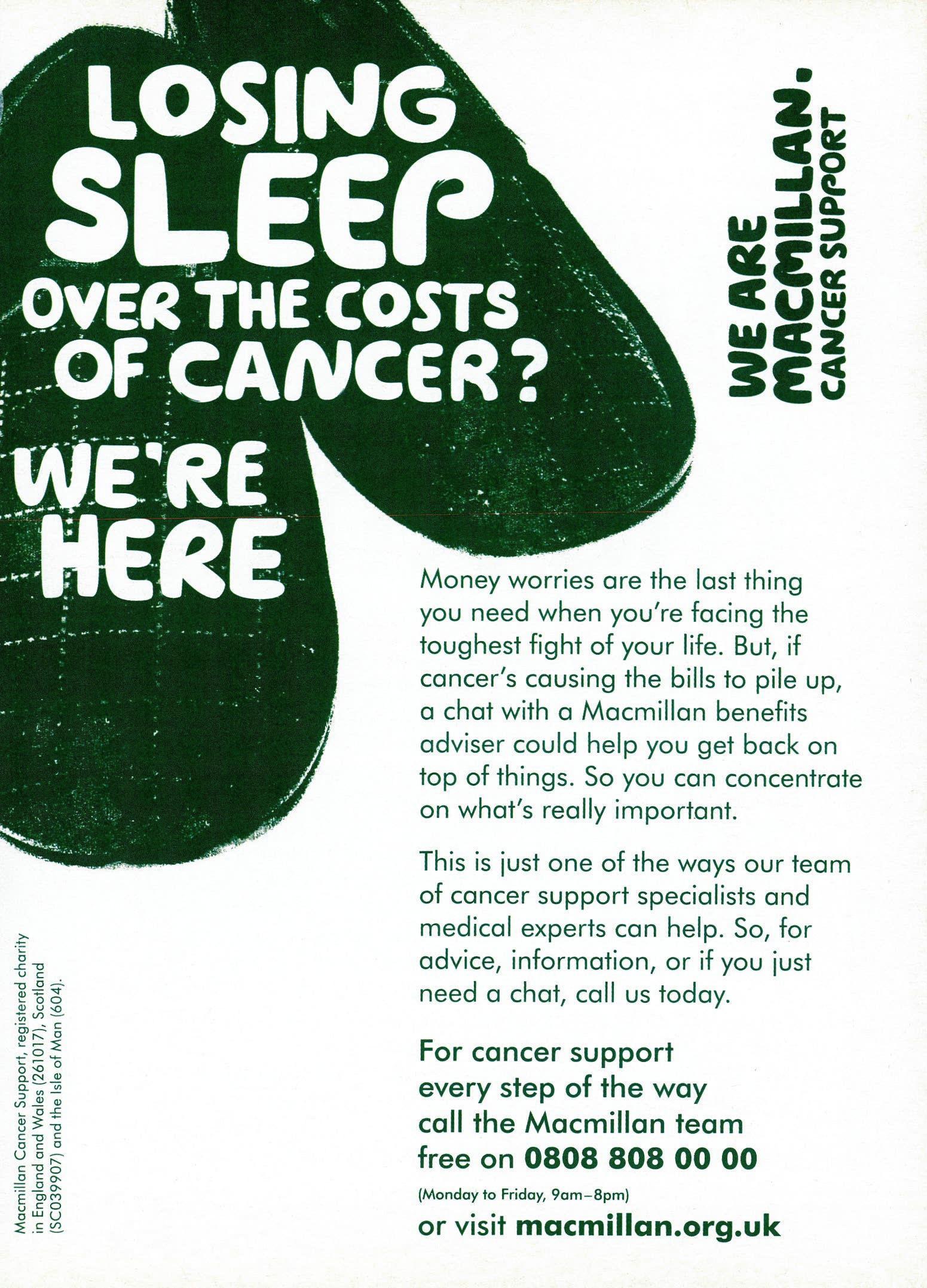
Money worries are the last thing you need when you're facing the toughest fight of your life. But, if cancer's causing the bills to pile up, a chat with a Macmillan benefits adviser could help you get back on top of things. So you can concentrate on what's really important.
This is just one of the ways our team of cancer support specialists and medical experts can help. So, for advice, information, or if you just need a chat, call us today.
For cancer support every step of the way call the Macmillan team free on 0808 808 00 00 (Monday to Friday, 9am-8pm) or visit macmillan.org.uk
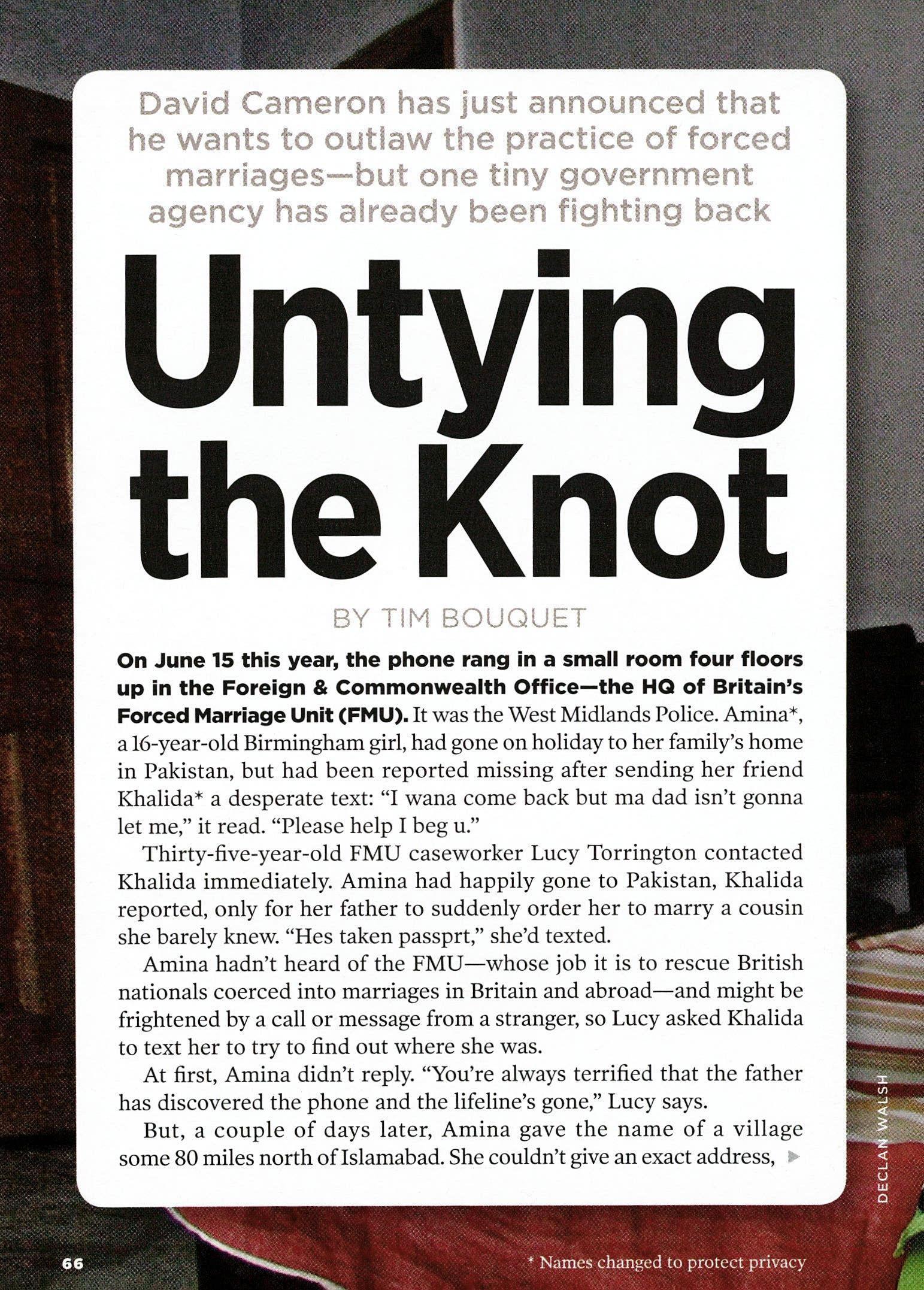
David Cameron has just announced that he wants to outlaw the practice of forced marriages—but one tiny government agency has already been fighting back
On June 15 this year, the phone rang in a small room four floors up in the Foreign & Commonwealth Office—the HO of Britain's Forced Marriage Unit (FMU).It was the West Midlands Police. Amina*, a 16-year-old Birmingham girl, had gone on holiday to her family's home in Pakistan, but had been reported missing after sending her friend Khalida* a desperate text: "I wana come back but ma dad isn't gonna let me," it read. "Please help I beg u."
Thirty-five-year-old FMU caseworker Lucy Torrington contacted Khalida immediately. Amina had happily gone to Pakistan, Khalida reported, only for her father to suddenly order her to marry a cousin she barely knew. "Hes taken passprt," she'd texted.
Amina hadn't heard of the FMU—whose job it is to rescue British nationals coerced into marriages in Britain and abroad—and might be frightened by a call or message from a stranger, so Lucy asked Khalida to text her to try to find out where she was.
At first, Amina didn't reply. "You're always terrified that the father has discovered the phone and the lifeline's gone," Lucy says.
But, a couple of days later, Amina gave the name of a village some 80 miles north of Islamabad. She couldn't give an exact address, ►

but she could describe the house.
The FMU contacted Albert David, head of the Assistance Unit in Britain's Pakistani High Commission, whose team works with the FMU on around 150 cases every year. He knew he didn't have much time to find Amina.
"When a victim arrives in Pakistan, everything's usually already arranged between the families and the marriage happens very quickly," he says.
David sent a Pakistani colleague to
make undercover enquiries in the village as to exactly where the family were living. Once he had a firm address, David sent two assistance-unit caseworkers to the house, with a local police car at a discreet, but clearly visible, distance.
The police presence was enough. Amina's father Rashid* might have been able to push his daughter into an unwanted relationship, but he had no desire to take on the legal authorities—and the 16-year-old was handed over to the caseworkers. She was too tired and terrified for tears.
A survivor—and Karma Nirvana volunteer—tells u
At 21, I married a Christian man without my Sikh parents' consent. When they found out, they "arrested" us—locked my husband up overnight and kidnapped me under sedation, with help from the family doctor.
They took me from my home in south-west England to India and kept me there for two years. I wasn't allowed to go out or make friends.
Eventually, I was forced to marry a stranger and sponsor him to come to Britain. I felt like his meal ticket. He was an alcoholic and very abusive—he beat me up, and would strangle and suffocate me.
I realised I was pregnant, but ended up in hospital and lost the child. Then, when I told my husband I wanted out of the marriage, threatened to kill me because he said I'd dishonoured him. I managed to escape b my doctor who gave me the numbers for domesticviolence services, and they helped me into a refuge.
This whole experience has traumatised me and I've spent time in a mental-health unit.
I'm 33 now and, by sharing my experiences with victims of forced marriage, I can tell them that they're not alone and that help is out here.
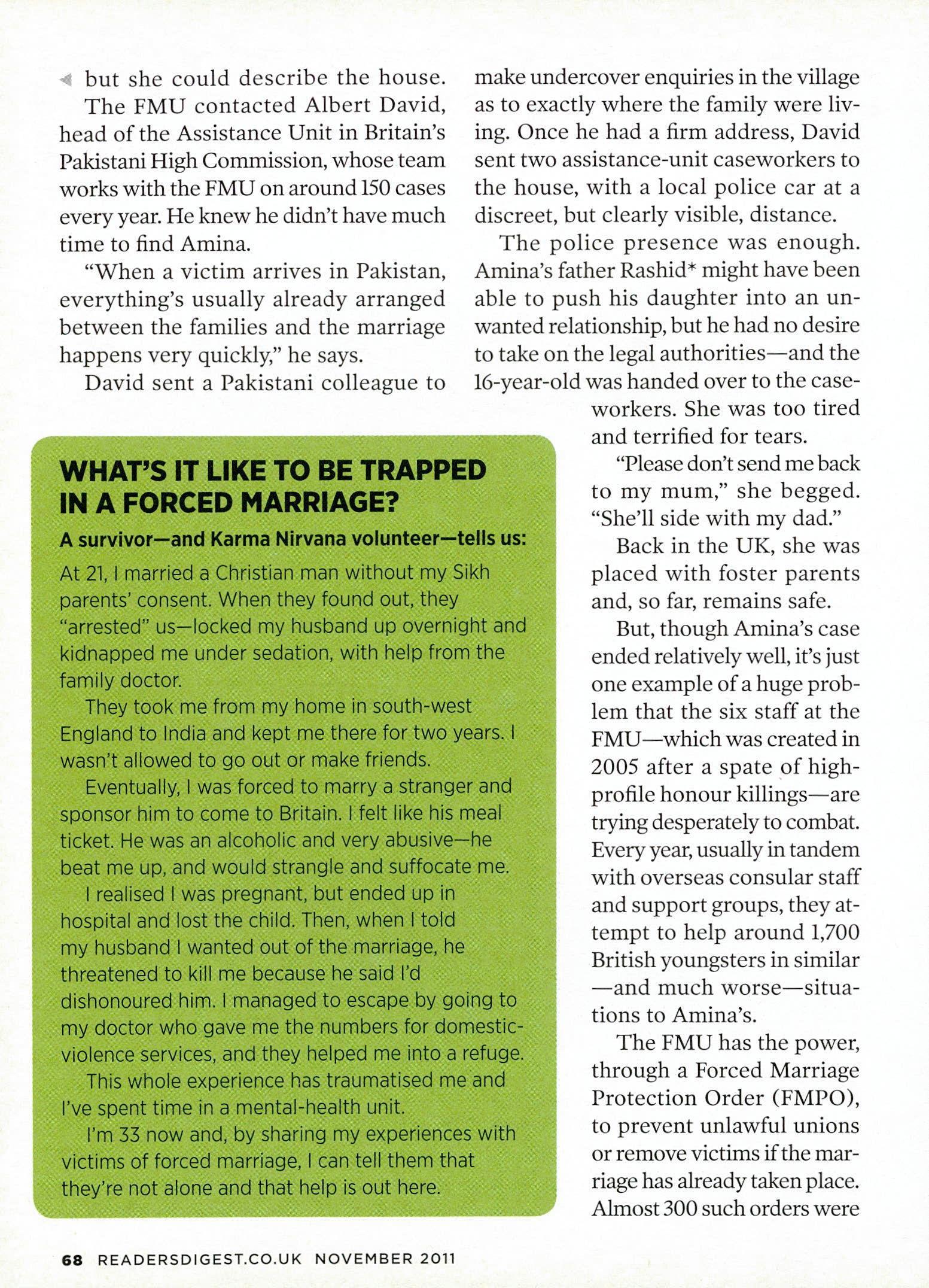
"Please don't send me back to my mum," she begged. "She'll side with my dad."
Back in the UK, she was placed with foster parents and, so far, remains safe.
But, though Amina's case ended relatively well, it's just one example of a huge problem that the six staff at the FMU—which was created in 2005 after a spate of highprofile honour killings—are trying desperately to combat. Every year, usually in tandem with overseas consular staff and support groups, they attempt to help around 1,700 British youngsters in similar —and much worse—situations to Amina's.
The FMU has the power, through a Forced Marriage Protection Order (FMPO), to prevent unlawful unions or remove victims if the marriage has already taken place. Almost 300 such orders were
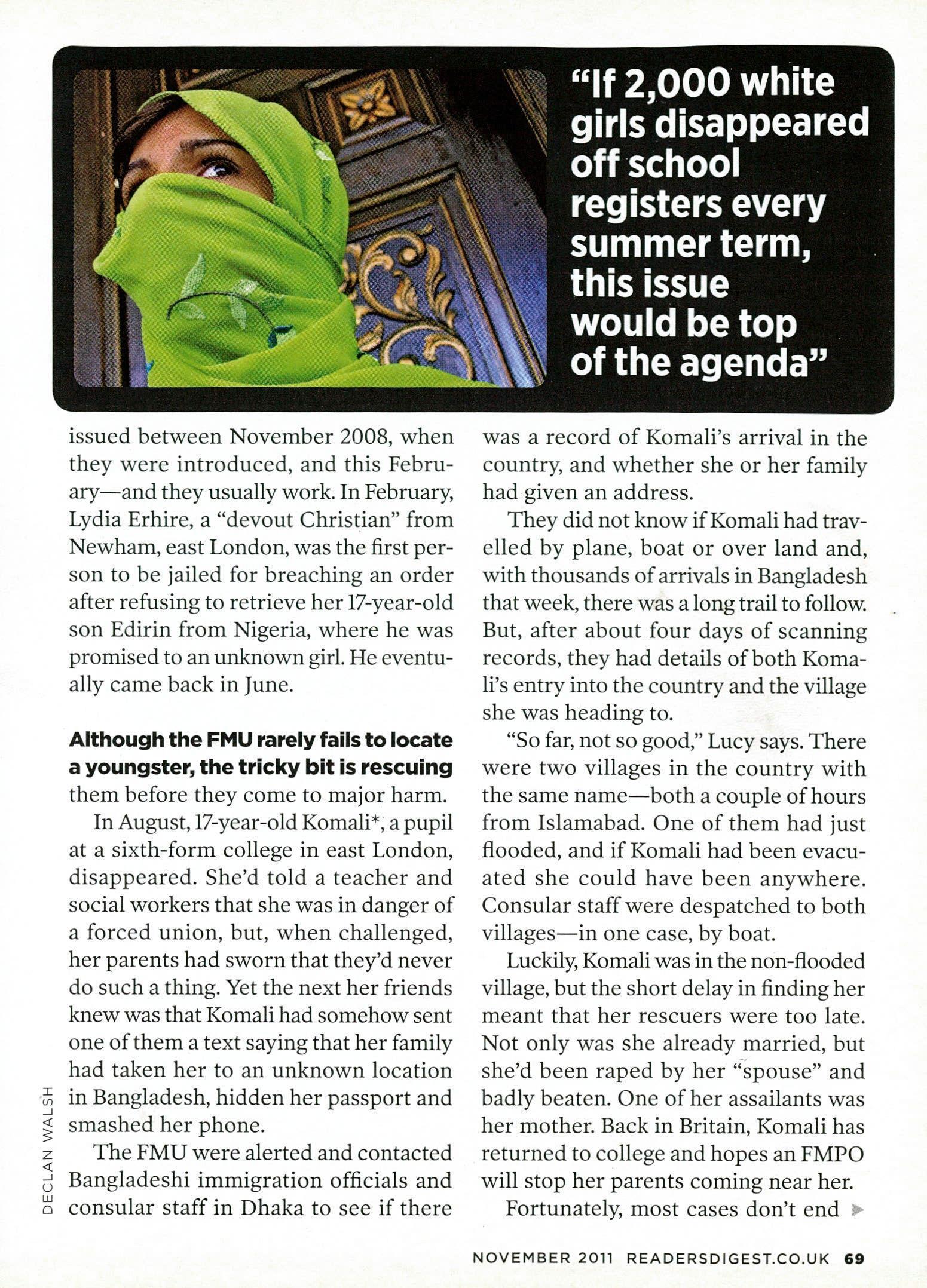
issued between November 2008, when they were introduced, and this February—and they usually work. In February Lydia Erhire, a "devout Christian" from Newham, east London, was the first person to be jailed for breaching an order after refusing to retrieve her 17-year-old son Edirin from Nigeria, where he was promised to an unknown girl. He eventually came back in June.
Although the FMU rarely fails to locate a youngster, the tricky bit is rescuing them before they come to major harm.
In August,17-year-old Komali*, a pupil at a sixth-form college in east London, disappeared. She'd told a teacher and social workers that she was in danger of a forced union, but, when challenged, her parents had sworn that they'd never do such a thing. Yet the next her friends knew was that Komali had somehow sent one of them a text saying that her family had taken her to an unknown location in Bangladesh, hidden her passport and smashed her phone.
The FMU were alerted and contacted Bangladeshi immigration officials and consular staff in Dhaka to see if there
"If 2,000 white girls disappeared off school registers every summer term, this issue would be top of the agenda"
was a record of Komali's arrival in the country, and whether she or her family had given an address.
They did not know if Komali had travelled by plane, boat or over land and, with thousands of arrivals in Bangladesh that week, there was a long trail to follow. But, after about four days of scanning records, they had details of both Komali's entry into the country and the village she was heading to.
"So far, not so good," Lucy says. There were two villages in the country with the same name—both a couple of hours from Islamabad. One of them had just flooded, and if Komali had been evacuated she could have been anywhere. Consular staff were despatched to both villages—in one case, by boat.
Luckily, Komali was in the non-flooded village, but the short delay in finding her meant that her rescuers were too late. Not only was she already married, but she'd been raped by her "spouse" and badly beaten. One of her assailants was her mother. Back in Britain, Komali has returned to college and hopes an FMPO will stop her parents coming near her.
Fortunately, most cases don't end ►
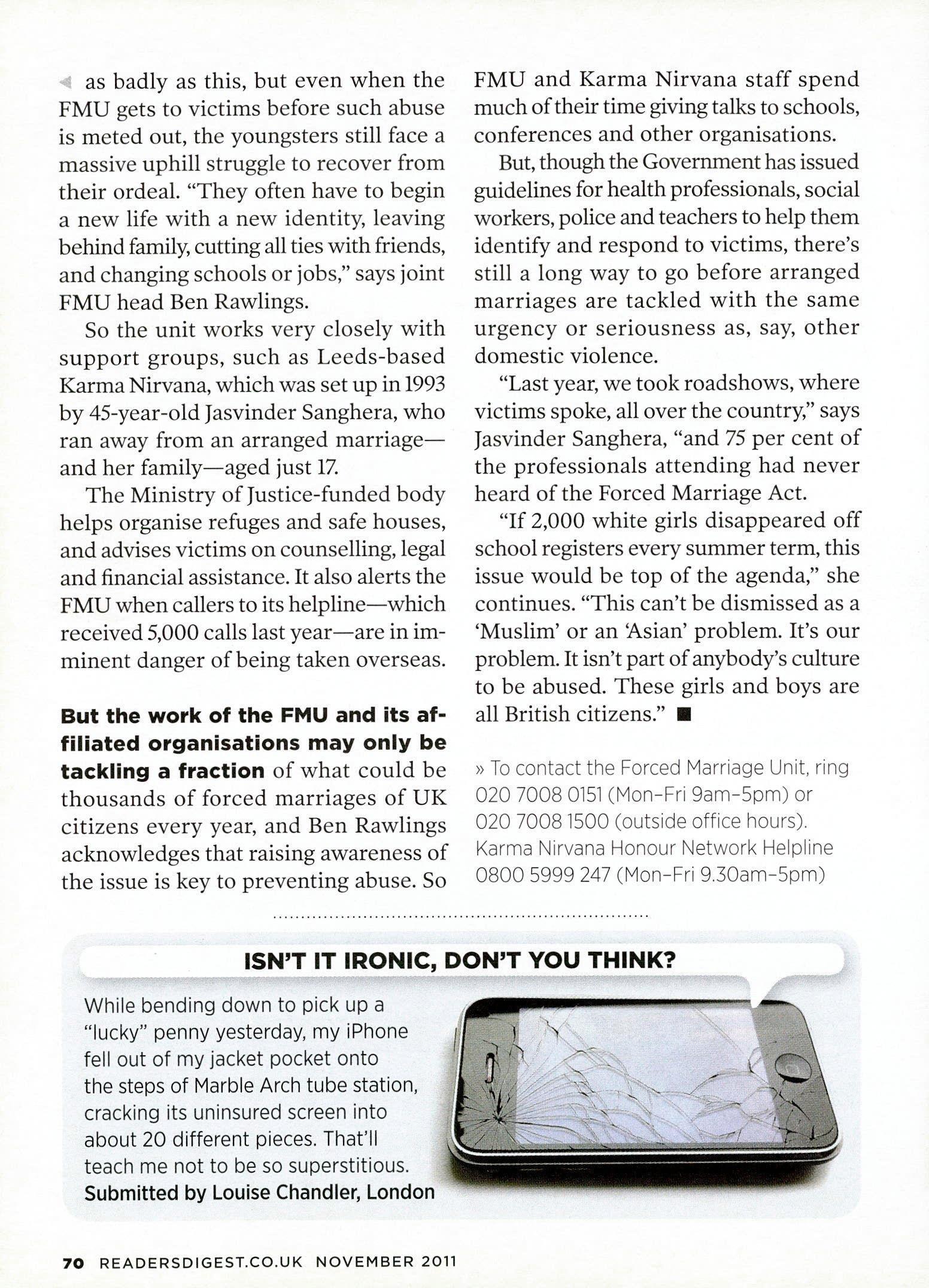
as badly as this, but even when the FMU gets to victims before such abuse is meted out, the youngsters still face a massive uphill struggle to recover from their ordeal. "They often have to begin a new life with a new identity, leaving behind family, cutting all ties with friends, and changing schools or jobs," says joint FMU head Ben Rawlings.
So the unit works very closely with support groups, such as Leeds-based Karma Nirvana, which was set up in 1993 by 45-year-old Jasvinder Sanghera, who ran away from an arranged marriage— and her family—aged just 17.
The Ministry of Justice-funded body helps organise refuges and safe houses, and advises victims on counselling, legal and financial assistance. It also alerts the FMU when callers to its helpline—which received 5,000 calls last year—are in imminent danger of being taken overseas.
But the work of the FMU and its affiliated organisations may only be tackling a fraction of what could be thousands of forced marriages of UK citizens every year, and Ben Rawlings acknowledges that raising awareness of the issue is key to preventing abuse. So
FMU and Karma Nirvana staff spend much of their time giving talks to schools, conferences and other organisations.
But, though the Government has issued guidelines for health professionals, social workers, police and teachers to help them identify and respond to victims, there's still a long way to go before arranged marriages are tackled with the same urgency or seriousness as, say, other domestic violence.
"Last year, we took roadshows, where victims spoke, all over the country," says Jasvinder Sanghera, "and 75 per cent of the professionals attending had never heard of the Forced Marriage Act.
"If 2,000 white girls disappeared off school registers every summer term, this issue would be top of the agenda," she continues. "This can't be dismissed as a `Muslim' or an 'Asian' problem. It's our problem. It isn't part of anybody's culture to be abused. These girls and boys are all British citizens." ■
» To contact the Forced Marriage Unit, ring 020 7008 0151 (Mon-Fri 9am-5pm) or 020 7008 1500 (outside office hours).
Karma Nirvana Honour Network Helpline 0800 5999 247 (Mon-Fri 9.30am-5pm)
While bending down to pick up a "lucky" penny yesterday, my iPhone fell out of my jacket pocket onto the steps of Marble Arch tube station, cracking its uninsured screen into about 20 different pieces. That'll teach me not to be so superstitious. Submitted by Louise Chandler, London
Recent research revealed three quarters of people believe their partner has selective hearing! While that may well be true, 1 in 7 actually has a genuine hearing problem. Not necessarily all the time but enough for it to be irritating; if not for them personally then certainly for their partner or loved ones.
At Boots we have a solution. Our comprehensive hearing service starts with a free hearing check and if you (or your loved ones) do have a real problem hearing, we have a raft of tiny, discreet hearing solutions that will help.
Our exclusive digital Hearplus system, for example, provides an ideal boost for those who struggle occasionally. You simply pop it in your ear when you need it and take it out when you don't. It's small, neat, effective and costs just £149. For a limited period you can even save £5 by using the voucher below.
And, if your free hearing check does show you have a more serious problem, our professional Hearing Aid Audiologists can help with that too. So if you're concerned about how well you, or someone you love, can hear call us now to arrange an initial discussion and a free hearing check.
Call 0862for more details or to make an appointment.
Free hearing check & £5.00 off Hearplus
Bring this voucher to your appointment
Valid 27/10/2011 - 15/11/2011

This coupon will only be valid when presented. £5 offer available on Hearplus only. No cash alternative. Only one coupon per customer and per transaction. The coupon cannot be used retrospectively nor in conjunction with any other offer. Subject to availability. Free hearing check for over 18's only. One free hearing check per person per year. We reserve the right to cancel these offers at any time and without notice. This coupon cannot be used as part payment with Advantage Card points. Advantage Card points not available on hearingcare purchases.
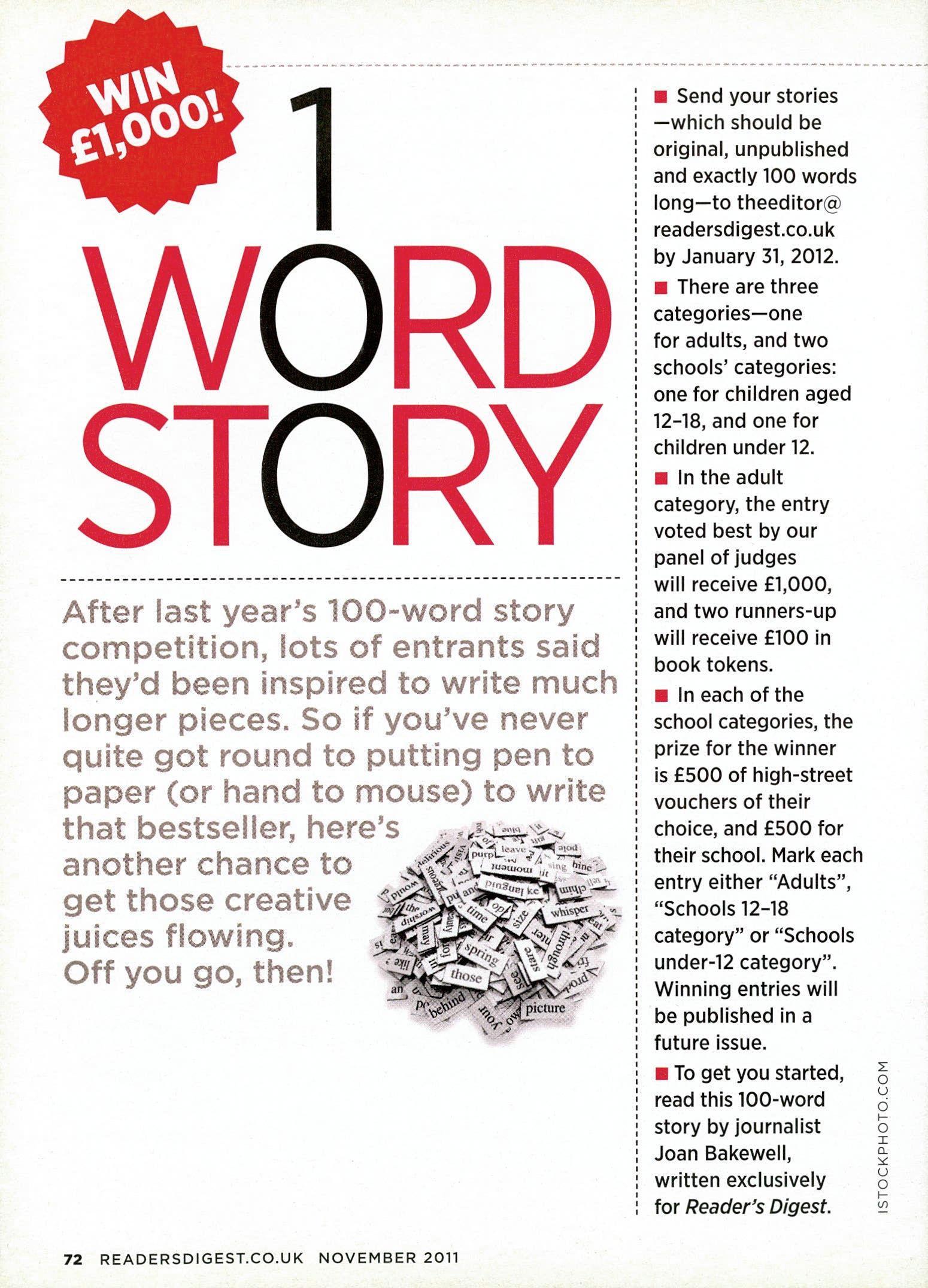
After last year's 100-word story competition, lots of entrants said they'd been inspired to write much longer pieces. So if you've never quite got round to putting pen to paper (or hand to mouse) to write that bestseller, here's another chance to get those creative juices flowing. Off you go, then!
■ Send your stories —which should be original, unpublished and exactly 100 words long—to theeditor@ readersdigest.co.uk by January 31,2012.
■ There are three categories—one for adults, and two schools' categories: one for children aged 12-18, and one for children under 12.
■ In the adult category, the entry voted best by our panel of judges will receive £1,000, and two runners-up will receive £100 in book tokens.
■ In each of the school categories, the prize for the winner is £500 of high-street vouchers of their choice, and £500 for their school. Mark each entry either "Adults", "Schools 12-18 category" or "Schools under-12 category". Winning entries will be published in a future issue.
■ To get you started, read this 100-word story by journalist Joan Bakewell, written exclusively for Reader's Digest.
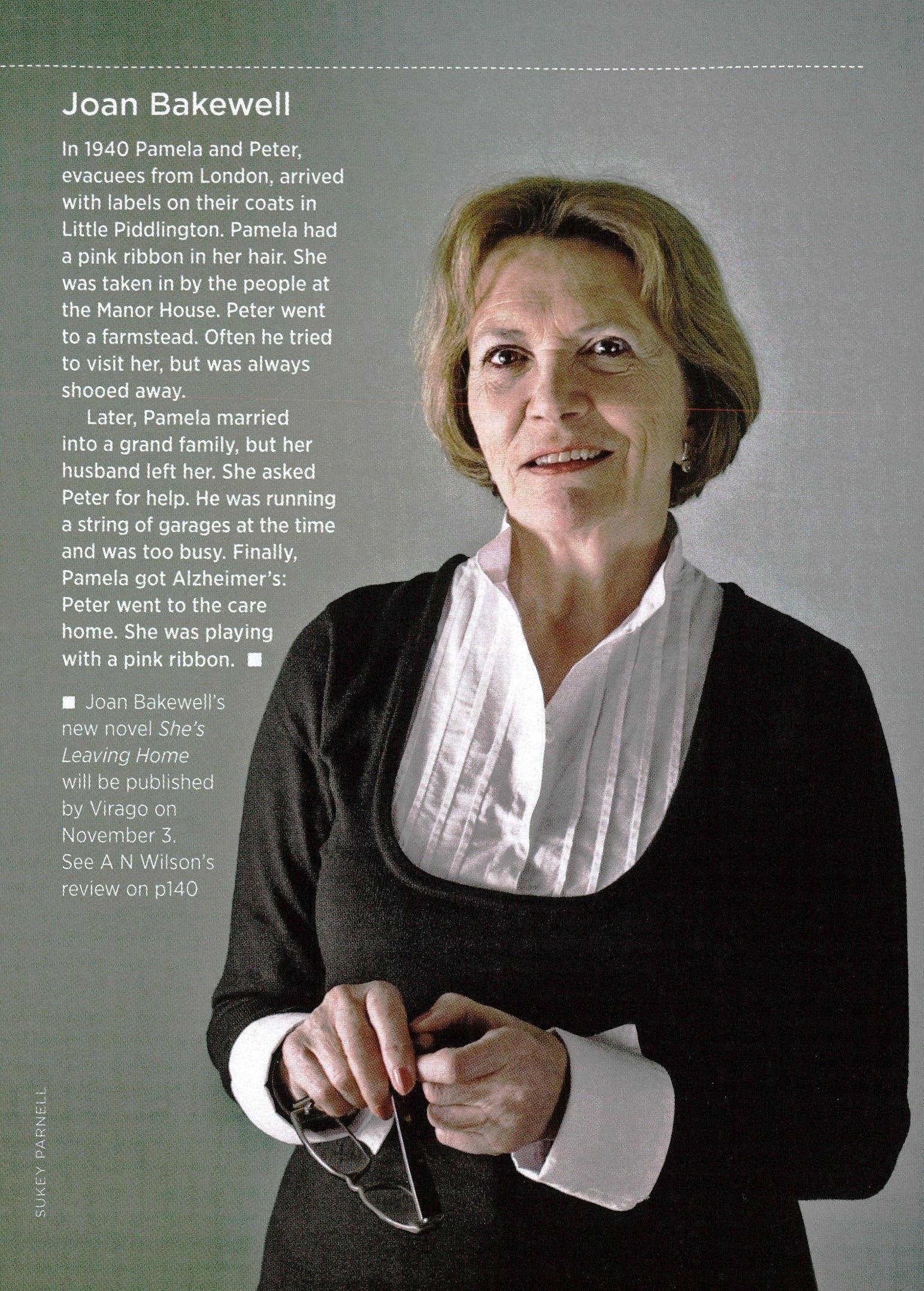
In 1940 Pamela and Peter, evacuees from London, arrived with labels on their coats in Little Piddlington. Pamela had a pink ribbon in her hair. She was taken in by the people at the Manor House. Peter went to a farmstead. Often he tried to visit her, but was always shooed away.
Later, Pamela married into a grand family, but he' husband left her. She asked Peter for help. He was running a string of garages at the time and was too busy. Finally, Pamela got Alzheimer's: Peter went to the care home. She was playing with a pink ribbon. ■
■ Joan Bakewell's new novel She's Leaving Home will be published by Virago on November 3, See A N Wilson's review on p140

In the fourth and final part of DruggedUp Britain— highlighting the runaway growth of prescription medicine— Jerome Burne visits a surgery that puts the personal touch ahead of pills
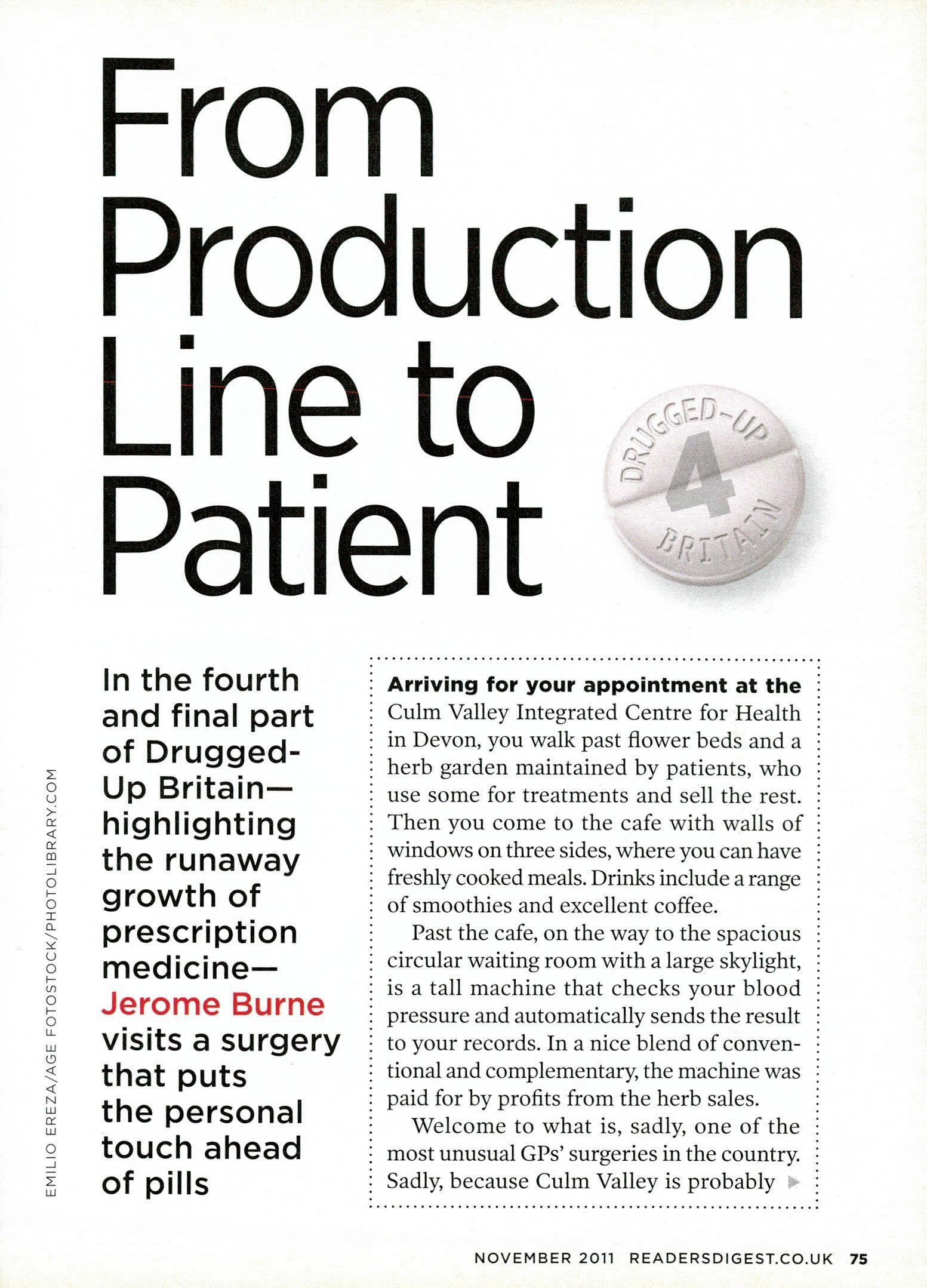
Arriving for your appointment at the Culm Valley Integrated Centre for Health in Devon, you walk past flower beds and a herb garden maintained by patients, who use some for treatments and sell the rest. Then you come to the cafe with walls of windows on three sides, where you can have freshly cooked meals. Drinks include a range of smoothies and excellent coffee.
Past the cafe, on the way to the spacious circular waiting room with a large skylight, is a tall machine that checks your blood pressure and automatically sends the result to your records. In a nice blend of conventional and complementary, the machine was paid for by profits from the herb sales.
Welcome to what is, sadly, one of the most unusual GPs' surgeries in the country. Sadly, because Culm Valley is probably
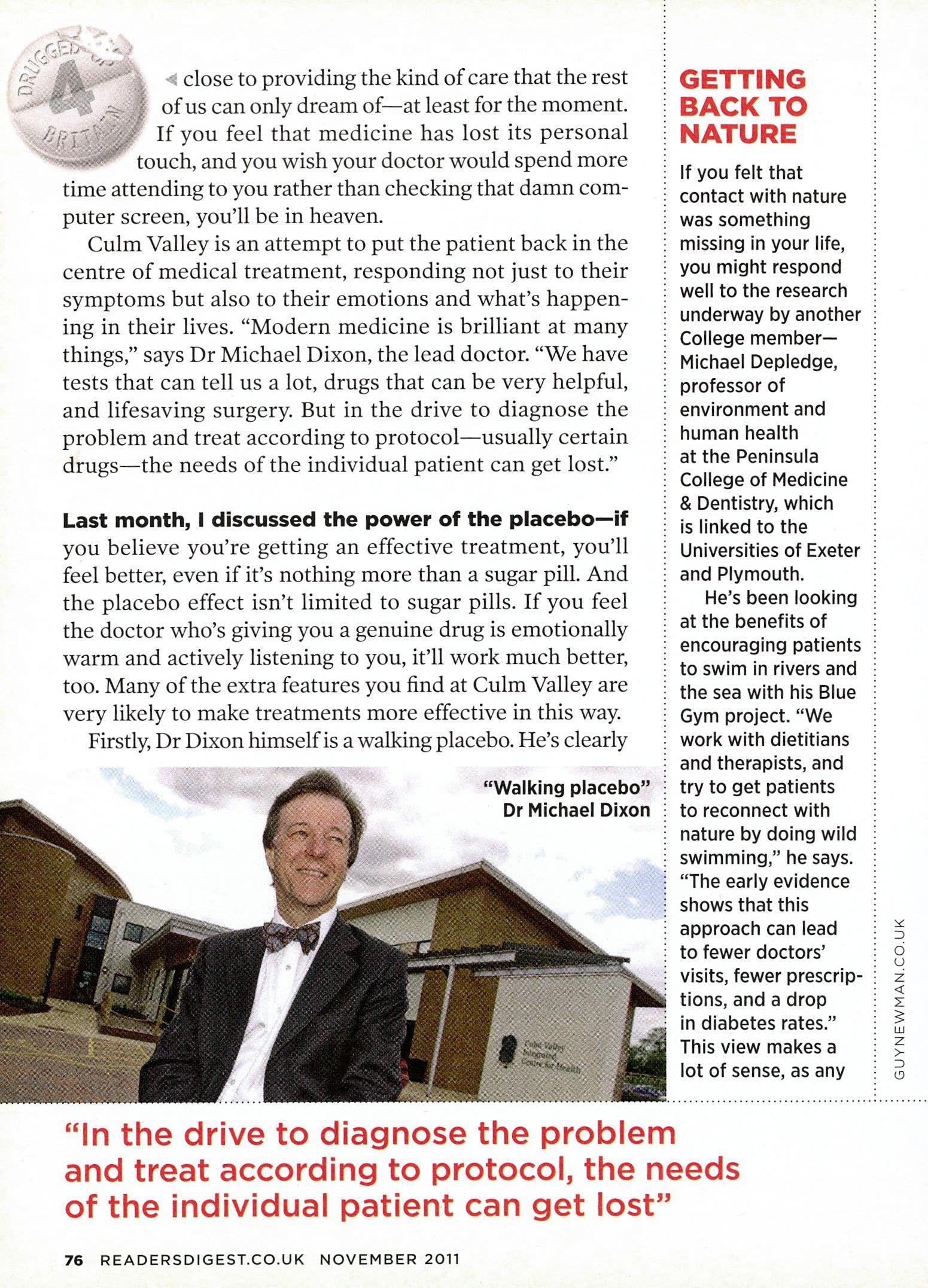
close to providing the kind of care that the rest of us can only dream of—at least for the moment. If you feel that medicine has lost its personal touch, and you wish your doctor would spend more time attending to you rather than checking that damn computer screen, you'll be in heaven.
Culm Valley is an attempt to put the patient back in the centre of medical treatment, responding not just to their symptoms but also to their emotions and what's happening in their lives. "Modern medicine is brilliant at many things," says Dr Michael Dixon, the lead doctor. "We have tests that can tell us a lot, drugs that can be very helpful, and lifesaving surgery. But in the drive to diagnose the problem and treat according to protocol—usually certain drugs—the needs of the individual patient can get lost."
Last month, I discussed the power of the placebo—if you believe you're getting an effective treatment, you'll feel better, even if it's nothing more than a sugar pill. And the placebo effect isn't limited to sugar pills. If you feel the doctor who's giving you a genuine drug is emotionally warm and actively listening to you, it'll work much better, too. Many of the extra features you find at Culm Valley are very likely to make treatments more effective in this way. Firstly, Dr Dixon himself is a walking placebo. He's clearly
"Walking placebo" Dr Michael Dixon
If you felt that contact with nature was something missing in your life, you might respond well to the research underway by another College member— Michael Depledge, professor of environment and human health at the Peninsula College of Medicine & Dentistry, which is linked to the Universities of Exeter and Plymouth. He's been looking at the benefits of encouraging patients to swim in rivers and the sea with his Blue Gym project. "We work with dietitians and therapists, and try to get patients to reconnect with nature by doing wild swimming," he says. "The early evidence shows that this approach can lead to fewer doctors' visits, fewer prescriptions, and a drop in diabetes rates." This view makes a lot of sense, as any
"In the drive to diagnose the problem and treat according to protocol, the needs of the individual patient can get lost"
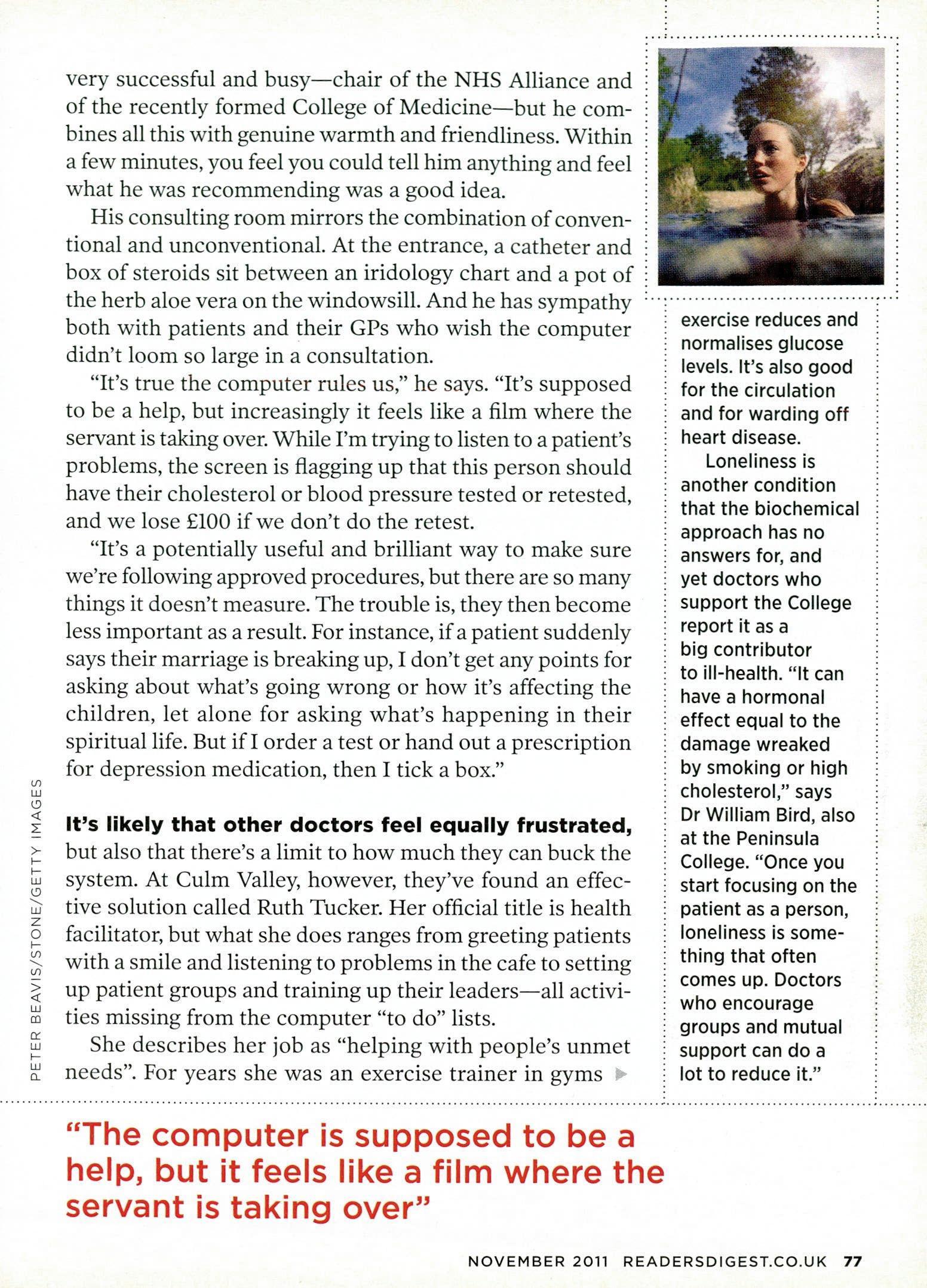
very successful and busy—chair of the NHS Alliance and of the recently formed College of Medicine—but he combines all this with genuine warmth and friendliness. Within a few minutes, you feel you could tell him anything and feel what he was recommending was a good idea.
His consulting room mirrors the combination of conventional and unconventional. At the entrance, a catheter and box of steroids sit between an iridology chart and a pot of the herb aloe vera on the windowsill. And he has sympathy both with patients and their GPs who wish the computer didn't loom so large in a consultation.
"It's true the computer rules us," he says. "It's supposed to be a help, but increasingly it feels like a film where the servant is taking over. While I'm trying to listen to a patient's problems, the screen is flagging up that this person should have their cholesterol or blood pressure tested or retested, and we lose £100 if we don't do the retest.
"It's a potentially useful and brilliant way to make sure we're following approved procedures, but there are so many things it doesn't measure. The trouble is, they then become less important as a result. For instance, if a patient suddenly says their marriage is breaking up, I don't get any points for asking about what's going wrong or how it's affecting the children, let alone for asking what's happening in their spiritual life. But if I order a test or hand out a prescription for depression medication, then I tick a box."
It's likely that other doctors feel equally frustrated, but also that there's a limit to how much they can buck the system. At Culm Valley, however, they've found an effective solution called Ruth Tucker. Her official title is health facilitator, but what she does ranges from greeting patients with a smile and listening to problems in the cafe to setting up patient groups and training up their leaders—all activities missing from the computer "to do" lists.
She describes her job as "helping with people's unmet needs". For years she was an exercise trainer in gyms 11.
"The computer is supposed to be a help, but it feels like a film where the servant is taking over"
exercise reduces and normalises glucose levels. It's also good for the circulation and for warding off heart disease.
Loneliness is another condition that the biochemical approach has no answers for, and yet doctors who support the College report it as a big contributor to ill-health. "It can have a hormonal effect equal to the damage wreaked by smoking or high cholesterol," says Dr William Bird, also at the Peninsula College. "Once you start focusing on the patient as a person, loneliness is something that often comes up. Doctors who encourage groups and mutual support can do a lot to reduce it."
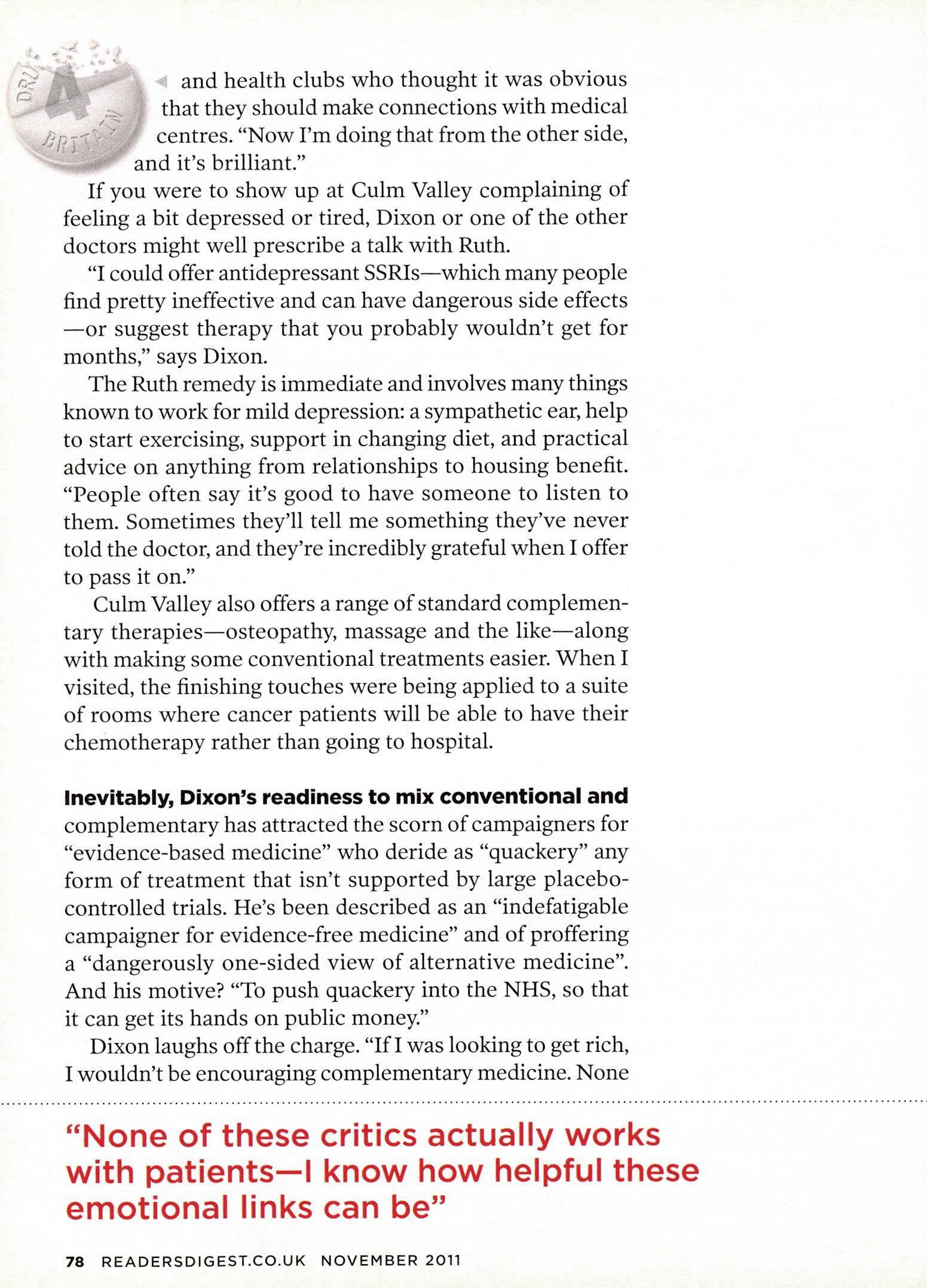
and health clubs who thought it was obvious that they should make connections with medical centres. "Now I'm doing that from the other side, and it's brilliant."
If you were to show up at Culm Valley complaining of feeling a bit depressed or tired, Dixon or one of the other doctors might well prescribe a talk with Ruth.
"I could offer antidepressant SSRIs—which many people find pretty ineffective and can have dangerous side effects —or suggest therapy that you probably wouldn't get for months," says Dixon.
The Ruth remedy is immediate and involves many things known to work for mild depression: a sympathetic ear, help to start exercising, support in changing diet, and practical advice on anything from relationships to housing benefit. "People often say it's good to have someone to listen to them. Sometimes they'll tell me something they've never told the doctor, and they're incredibly grateful when I offer to pass it on."
Culm Valley also offers a range of standard complementary therapies—osteopathy, massage and the like—along with making some conventional treatments easier. When I visited, the finishing touches were being applied to a suite of rooms where cancer patients will be able to have their chemotherapy rather than going to hospital.
Inevitably, Dixon's readiness to mix conventional and complementary has attracted the scorn of campaigners for "evidence-based medicine" who deride as "quackery" any form of treatment that isn't supported by large placebocontrolled trials. He's been described as an "indefatigable campaigner for evidence-free medicine" and of proffering a "dangerously one-sided view of alternative medicine". And his motive? "To push quackery into the NHS, so that it can get its hands on public money."
Dixon laughs off the charge. "If I was looking to get rich, I wouldn't be encouraging complementary medicine. None
"None of these critics actually works with patients—I know how helpful these emotional links can be"
of these critics actually works with patients—I know how helpful these emotional links can be. It's true many could do with more evidence, but then the evidence for lots of the conventional things isn't that good either."
And Dixon isn't alone in wanting to widen out what GPs can offer. As chair of the College of Medicine, he's part of a movement to put patients at the centre of medical practice. A patient representative sits on the board, and the College's training schemes emphasise that the first step in working out a treatment plan is to find out what's really important to the patient. "We're trying to move away from an industrial-style production line designed to treat biochemical machines," says Dixon.
It's an approach that can be dismissed as being far too touchy feely, not properly tested and, while a nice idea, probably not cost-effective. But there's nothing woollyminded about other key members of the college, who include Sir Graeme Cato, emeritus professor of medicine at the University of Aberdeen, and Professor Sir Ian Kennedy, emeritus professor of health law, ethics and policy at University College London.
But are these ideas ever going to be rolled out across the country? "I think they have a much better chance of being put into practice as a result of the Government's health reforms," says Dixon. "At the moment, GPs can order all sorts of tests and treatments for patients without having to worry about the costs.
"One big idea of the new system is that we'll become responsible for everything that's spent on all of our patients, so we'll have a vested interest in doing things that are cost-effective. I'm prepared to bet GP practices that put patients at the heart of what they do will not only have healthier patients but will spend less on them, too." •
We found this handy sign in our hired car while on holiday in Ireland. For some reason, we didn't think the final sentence was necessary. Submitted by Amy Gabriel, London
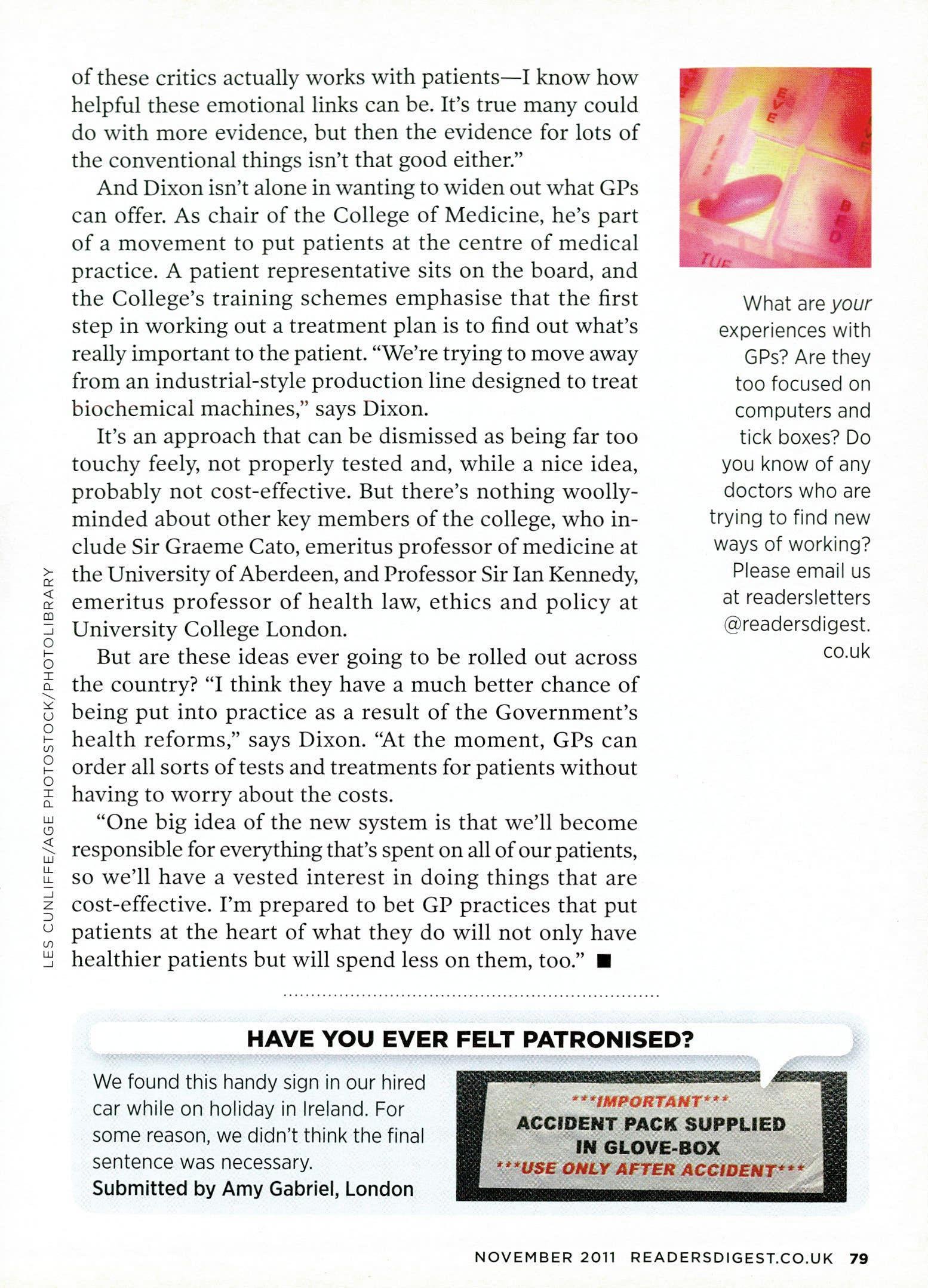
What are your experiences with GPs? Are they too focused on computers and tick boxes? Do you know of any doctors who are trying to find new ways of working? Please email us at readersletters @readersdigest. co.uk
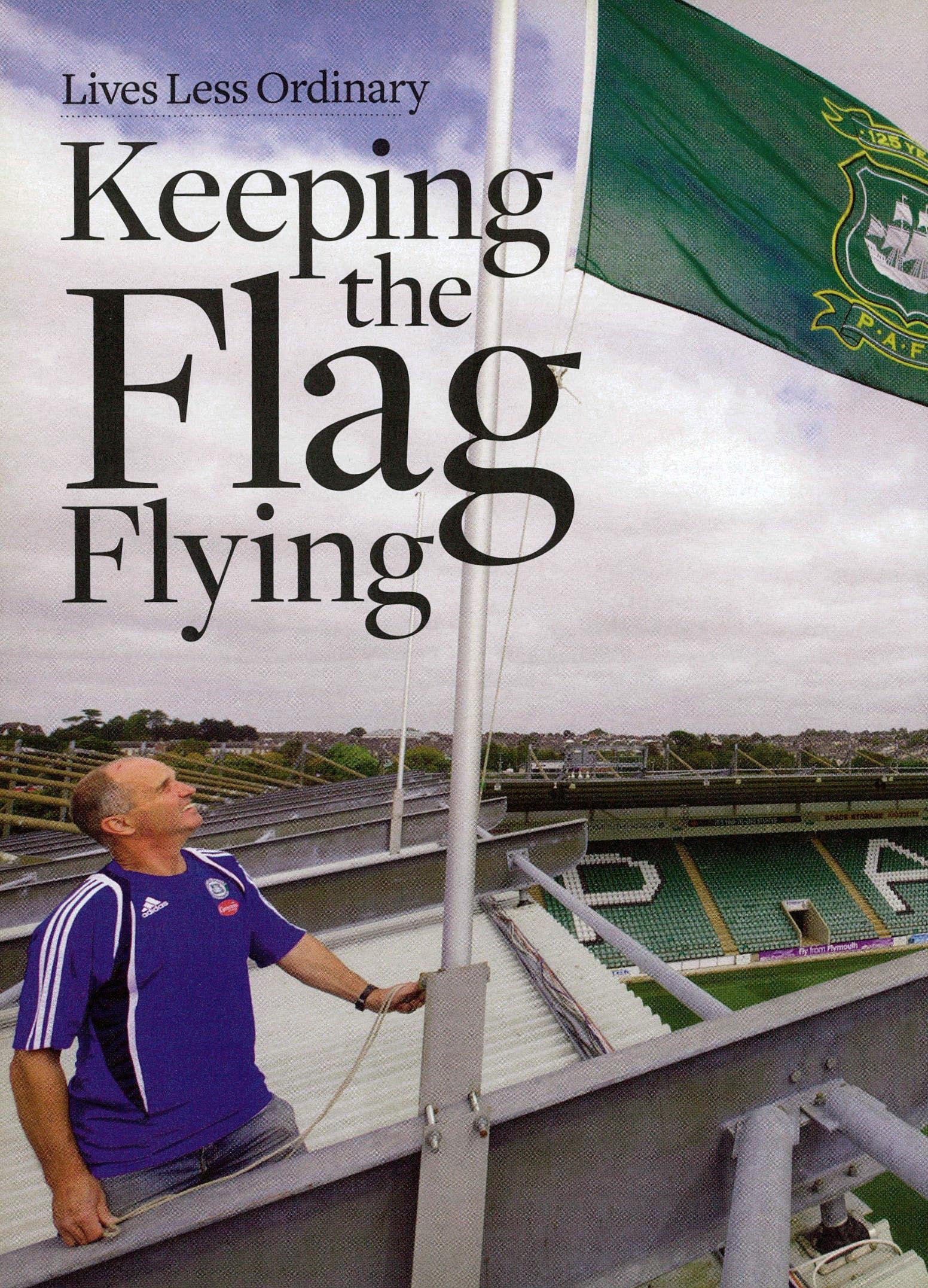

Sky-high salaries and badly behaved players have given football plenty of negative press. Sometimes, it takes one of the more cash-strapped clubs to put
the real meaning back into the gameBy Danny Scott P, ,PHED BY SAM FROST
CLUBS, Rick Cowdery's job involves long hours, bags of stress and usually being on call seven days a week.
But what makes Plymouth Argyle's head of communications very different from most people in this money-hungry business is that, for most of this year, his take-home pay has been...zero. Zilch. Nada. A great big nothing.
Unfortunately for Rick—and the rest of the staff and players at the club, who are in exactly the same position—Plymouth went into administration on March 4 this year, with debts of £20m.
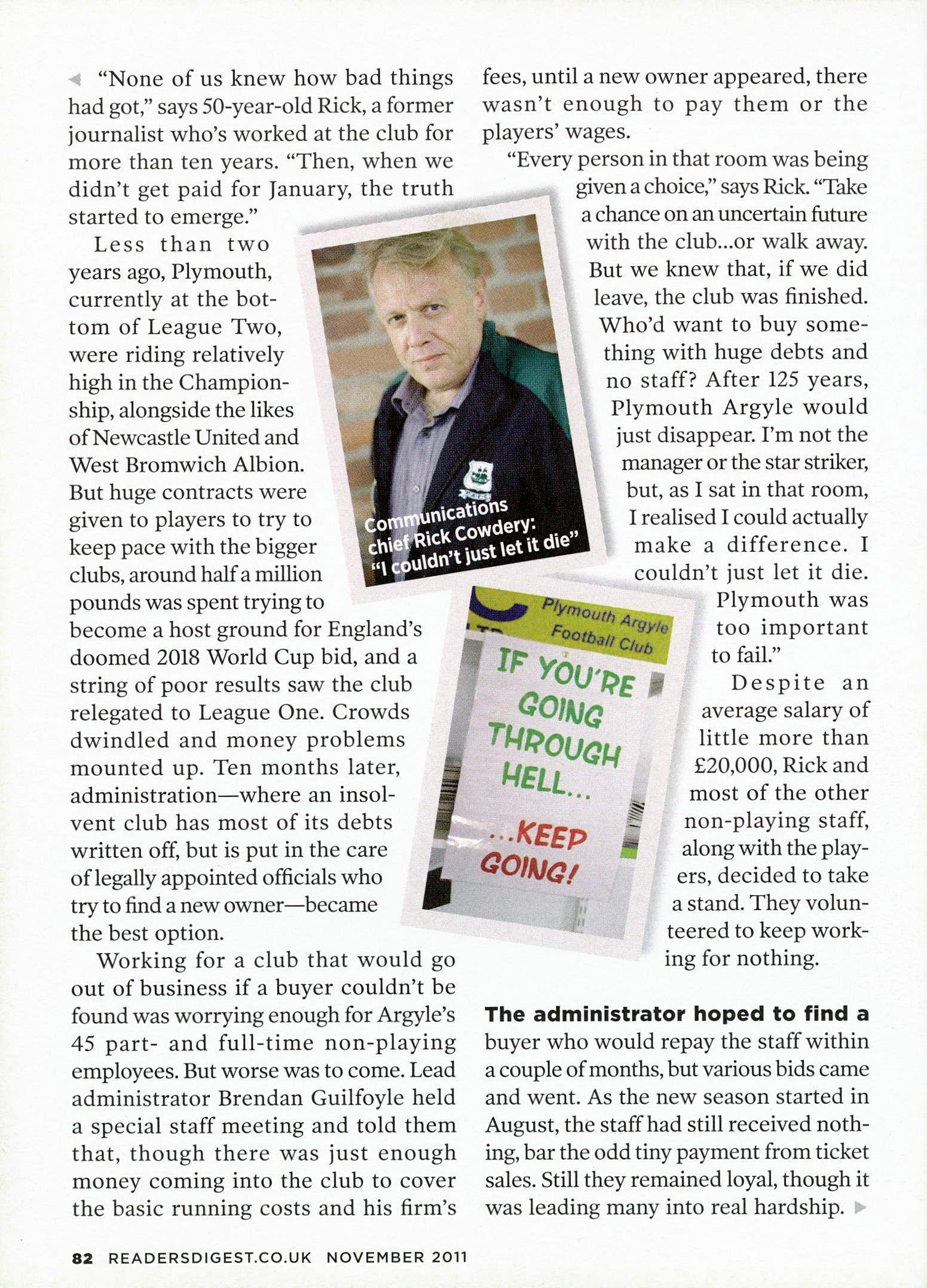
.4 "None of us knew how bad things had got," says 50-year-old Rick, a former journalist who's worked at the club for more than ten years. "Then, when we didn't get paid for January, the truth started to emerge."
Less than two years ago, Plymouth, currently at the bottom of League Two, were riding relatively high in the Championship, alongside the likes of Newcastle United and West Bromwich Albion. But huge contracts were given to players to try to keep pace with the bigger clubs, around half a million pounds was spent trying to become a host ground for England's doomed 2018 World Cup bid, and a string of poor results saw the club relegated to League One. Crowds dwindled and money problems mounted up. Ten months later, administration—where an insolvent club has most of its debts written off, but is put in the care of legally appointed officials who try to find a new owner—became the best option.
Working for a club that would go out of business if a buyer couldn't be found was worrying enough for Argyle's 45 part- and full-time non-playing employees. But worse was to come. Lead administrator Brendan Guilfoyle held a special staff meeting and told them that, though there was just enough money coming into the club to cover the basic running costs and his firm's
fees, until a new owner appeared, there wasn't enough to pay them or the players' wages.
"Every person in that room was being given a choice," says Rick "Take a chance on an uncertain future with the club...or walk away. But we knew that, if we did leave, the club was finished. Who'd want to buy something with huge debts and no staff? After 125 years, Plymouth Argyle would just disappear. I'm not the manager or the star striker, but, as I sat in that room, I realised I could actually make a difference. I couldn't just let it die. Plymouth was too important to fail."
Despite an average salary of little more than £20,000, Rick and most of the other non-playing staff, along with the players, decided to take a stand. They volunteered to keep working for nothing.
The administrator hoped to find a buyer who would repay the staff within a couple of months, but various bids came and went. As the new season started in August, the staff had still received nothing, bar the odd tiny payment from ticket sales. Still they remained loyal, though it was leading many into real hardship. ti•

The players and most of the non-playing staff decided to take a stand
Club shop assistant Sharon Hammacott: "I can't stand football, but I love my job and I care about this city"
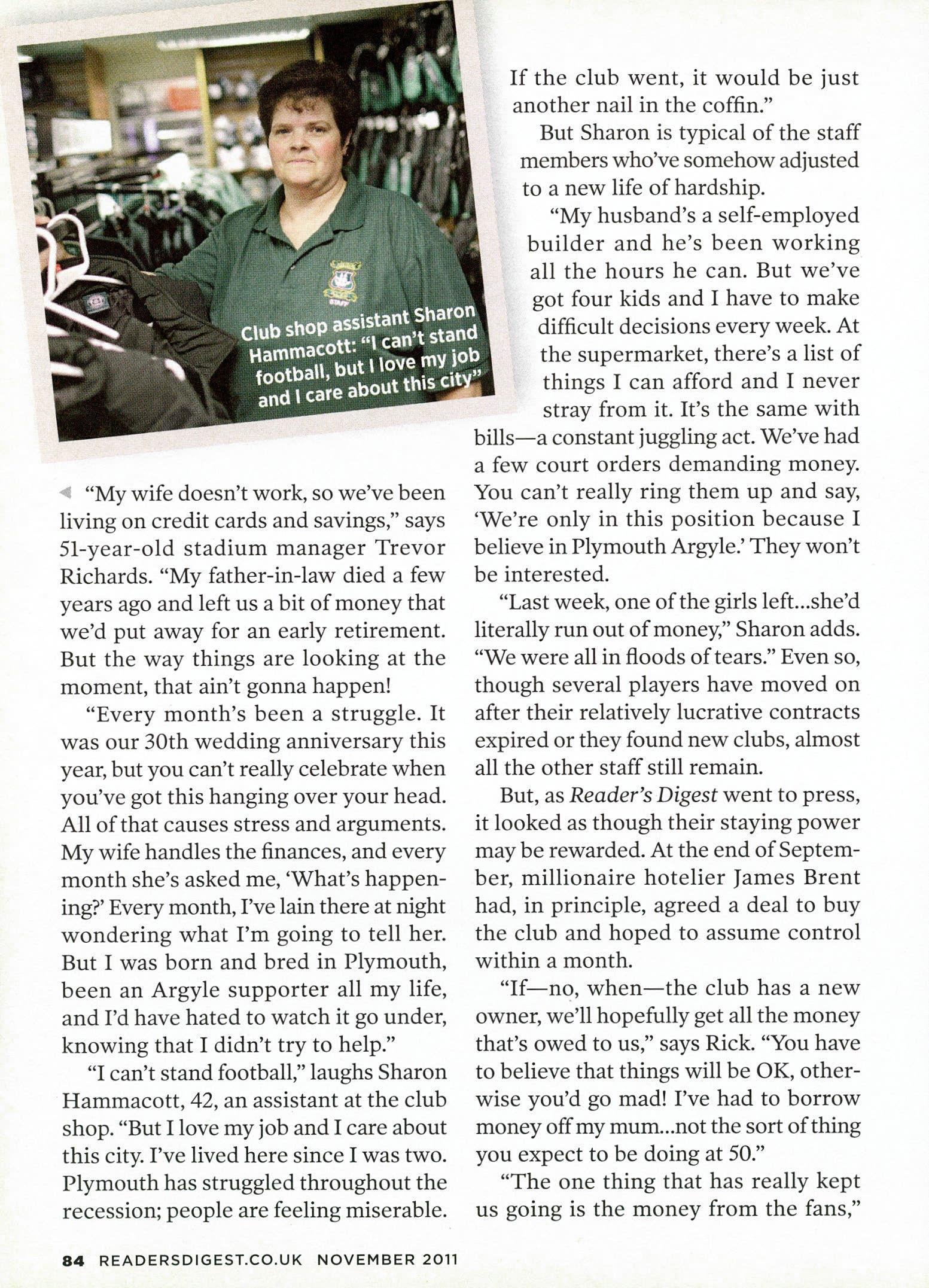
4 "My wife doesn't work, so we've been living on credit cards and savings," says 51-year-old stadium manager Trevor Richards. "My father-in-law died a few years ago and left us a bit of money that we'd put away for an early retirement. But the way things are looking at the moment, that ain't gonna happen!
"Every month's been a struggle. It was our 30th wedding anniversary this year, but you can't really celebrate when you've got this hanging over your head. All of that causes stress and arguments. My wife handles the finances, and every month she's asked me, 'What's happening?' Every month, I've lain there at night wondering what I'm going to tell her. But I was born and bred in Plymouth, been an Argyle supporter all my life, and I'd have hated to watch it go under, knowing that I didn't try to help."
"I can't stand football," laughs Sharon Hammacott, 42, an assistant at the club shop. "But I love my job and I care about this city. I've lived here since I was two. Plymouth has struggled throughout the recession; people are feeling miserable.
If the club went, it would be just another nail in the coffin."
But Sharon is typical of the staff members who've somehow adjusted to a new life of hardship.
"My husband's a self-employed builder and he's been working all the hours he can. But we've got four kids and I have to make difficult decisions every week. At the supermarket, there's a list of things I can afford and I never stray from it. It's the same with bills—a constant juggling act. We've had a few court orders demanding money. You can't really ring them up and say, `We're only in this position because I believe in Plymouth Argyle.' They won't be interested.
"Last week, one of the girls left...she'd literally run out of money," Sharon adds. "We were all in floods of tears." Even so, though several players have moved on after their relatively lucrative contracts expired or they found new clubs, almost all the other staff still remain.
But, as Reader's Digest went to press, it looked as though their staying power may be rewarded. At the end of September, millionaire hotelier James Brent had, in principle, agreed a deal to buy the club and hoped to assume control within a month.
"If—no, when—the club has a new owner, we'll hopefully get all the money that's owed to us," says Rick. "You have to believe that things will be OK, otherwise you'd go mad! I've had to borrow money off my mum...not the sort of thing you expect to be doing at 50."
"The one thing that has really kept us going is the money from the fans,"
says Sharon. "Groups such as the Green Taverners have been giving us a little brown envelope every month, which is putting food on the table."
"We weren't going to let the staff fight this battle on their own," says Mark Russell, co-founder of the Green Taverners, which was established at the start of the year to help the stricken club through fundraising events such as fun days and memorabilia auctions. "Initially, when we found out the club was in trouble, we were helping out with silly things like bottles of water for the players. But then we realised the staff were in trouble, too. I heard stories of bailiffs chasing people for money and bills not being paid. So we'd talk to the council—who've been really helpful—to help sort out council-tax disputes. We'd arrange for somebody to go down and pay off the bailiffs. People were in danger of losing their homes.
"There are lots of other fans' groups involved, too—the Argyle Fans' Trust, the Senior Greens, supporters' website pasoti.co.uk. There's a wonderful lady called Sue Pollard who stands outside the ground with a bucket, collecting money. During one game, more than £5,000 was collected. Since around February, the total we've all
raised is probably not far off £100,000!"
"Staff get invited down to the pub and we don't have to buy a drink all night," says Sharon. "The response has been really amazing. When you do come in to work on a grey Monday morning and you know you're not going to get paid again, that really helps you to keep your chin up. Without that sort of support —financially and psychologically—I wouldn't have been able to carry on."
"We wouldn't have got this far without the supporters," agrees Romain Larrieu, Plymouth's much-loved goalkeeper, who's been at the club since 2000. "Unfortunately, the results haven't been going our way, but I know the fans believe we can get back to the good times, because they tell me every day. And they tell me how grateful they are to the staff for sticking by the club.
"I was in Tesco the other day, buying my groceries, and there was an old guy in front of me—a pensioner. A normal ■
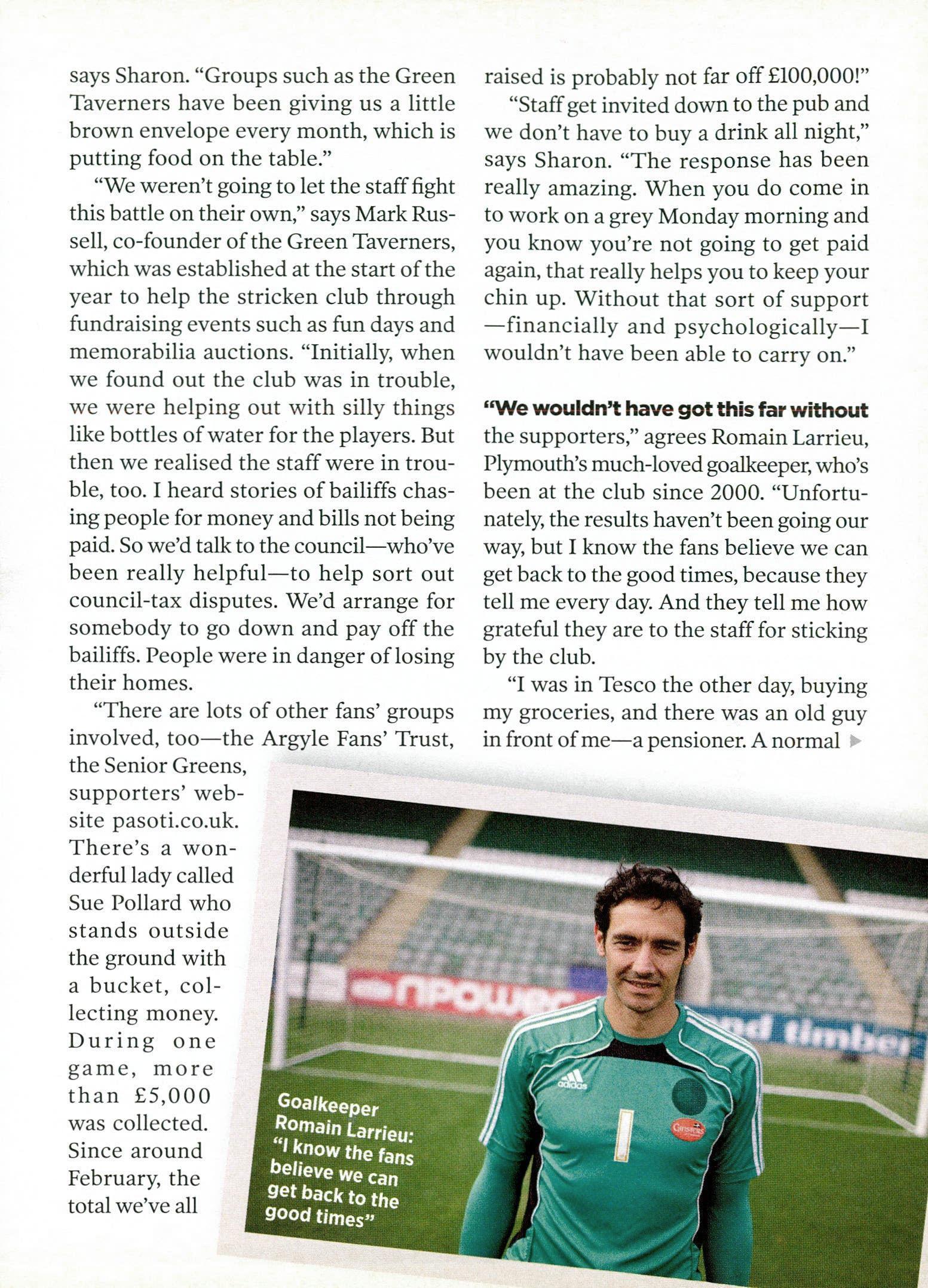
Goalkeeper R,omain Larrieu: , I know the fans believe we can get back to the good times"
guy...not rich or anything. After I finished paying, he just walked up to me and shoved ten quid into my hand. I said, 'Come on, mate...that's really kind of you, but I don't want to take your money.' But he wouldn't take it back. He just walked off saying, 'Thank you for what you're doing. We appreciate it.' I had tears in my eyes. I immediately took it round to the club and put it in the staff fund.
"You know something...that old guy keeps coming into my head almost every
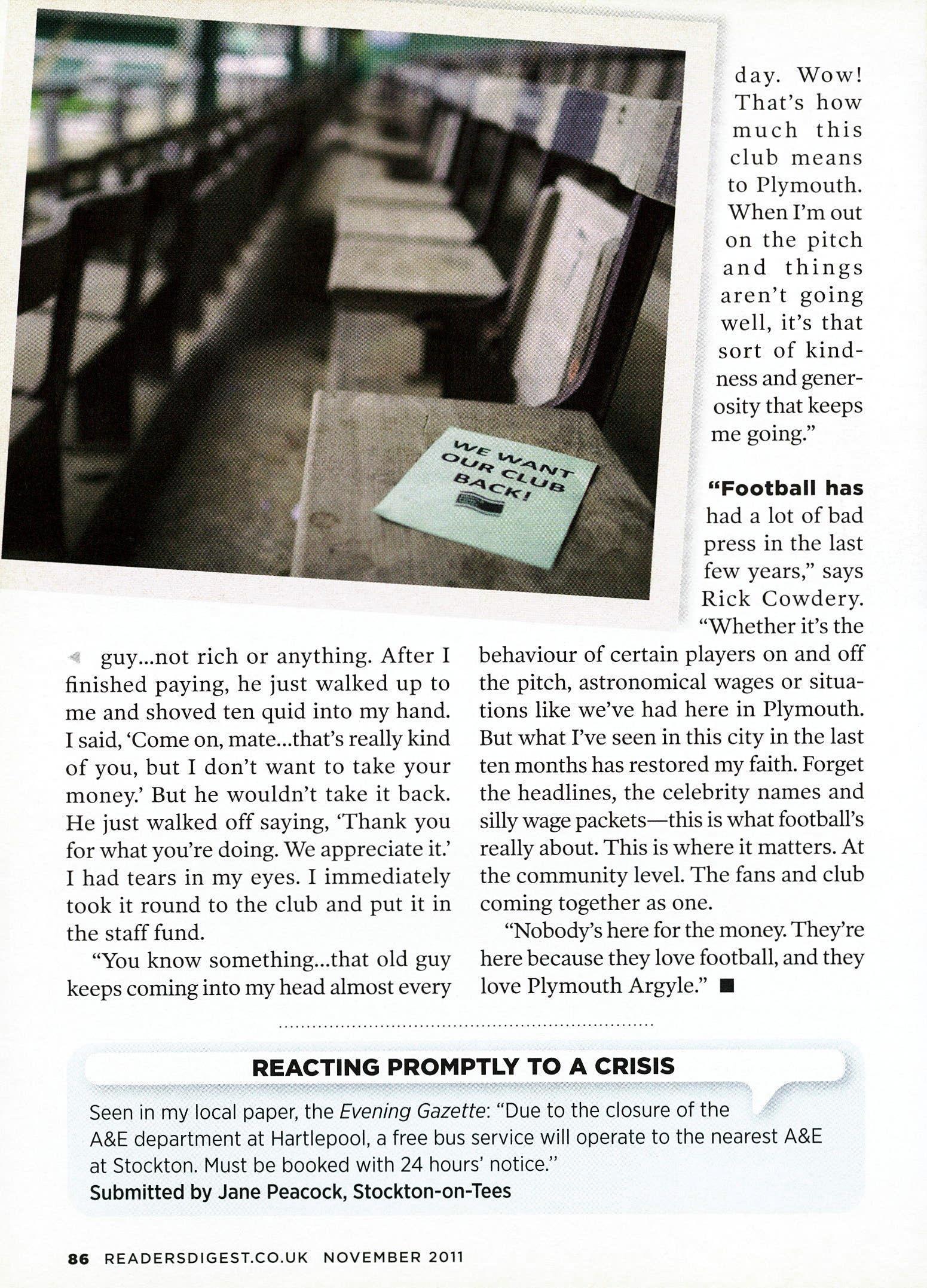
day. Wow! That's how much this club means to Plymouth. When I'm out on the pitch and things aren't going well, it's that sort of kindness and generosity that keeps me going."
"Football has had a lot of bad press in the last few years," says Rick Cowdery. "Whether it's the behaviour of certain players on and off the pitch, astronomical wages or situations like we've had here in Plymouth. But what I've seen in this city in the last ten months has restored my faith. Forget the headlines, the celebrity names and silly wage packets—this is what football's really about. This is where it matters. At the community level. The fans and club coming together as one.
"Nobody's here for the money. They're here because they love football, and they love Plymouth Argyle." ■
Seen in my local paper, the Evening Gazette: "Due to the closure of the A&E department at Hartlepool, a free bus service will operate to the nearest A&E at Stockton. Must be booked with 24 hours' notice."
Submitted by Jane Peacock, Stockton-on-Tees
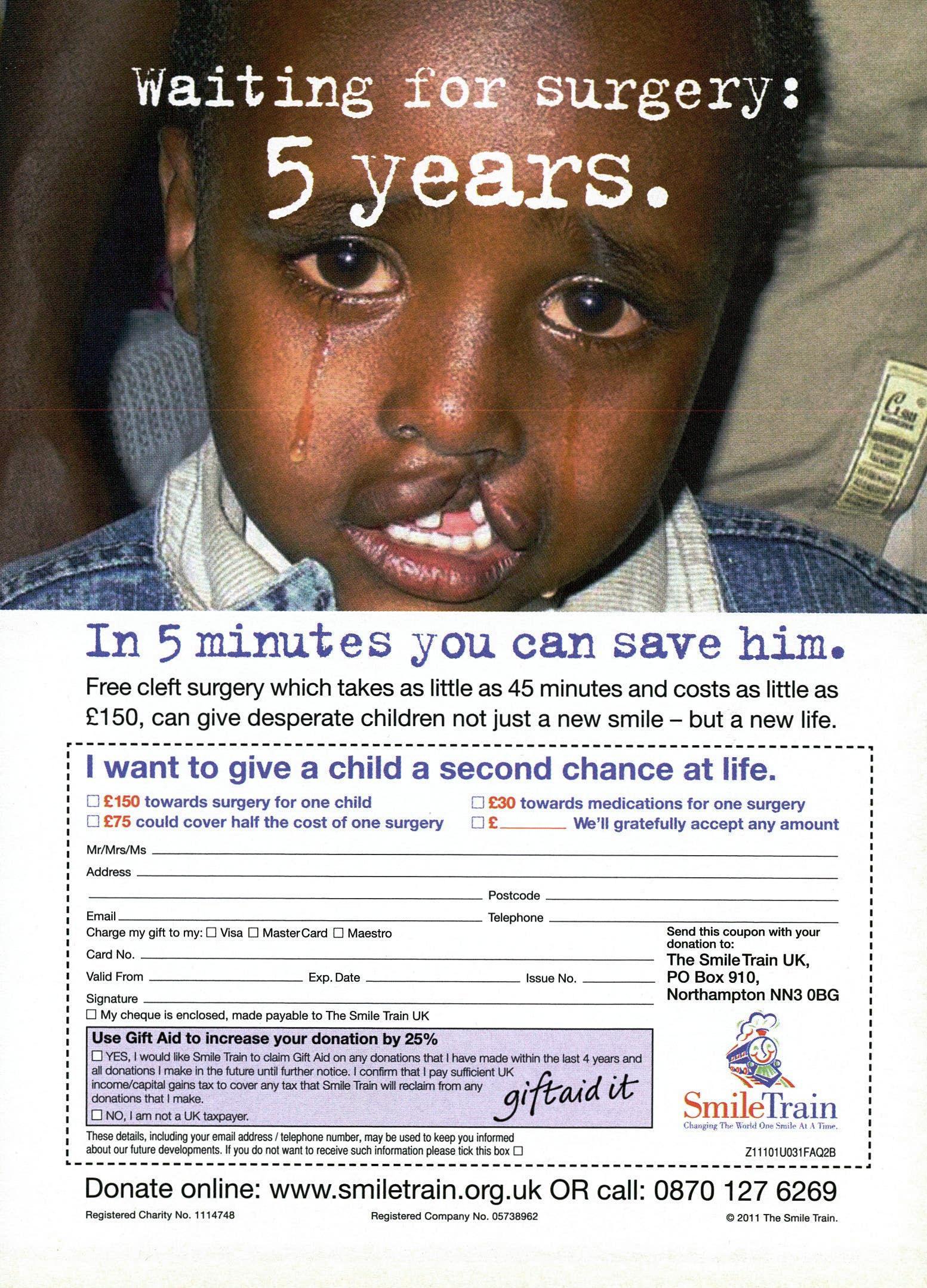
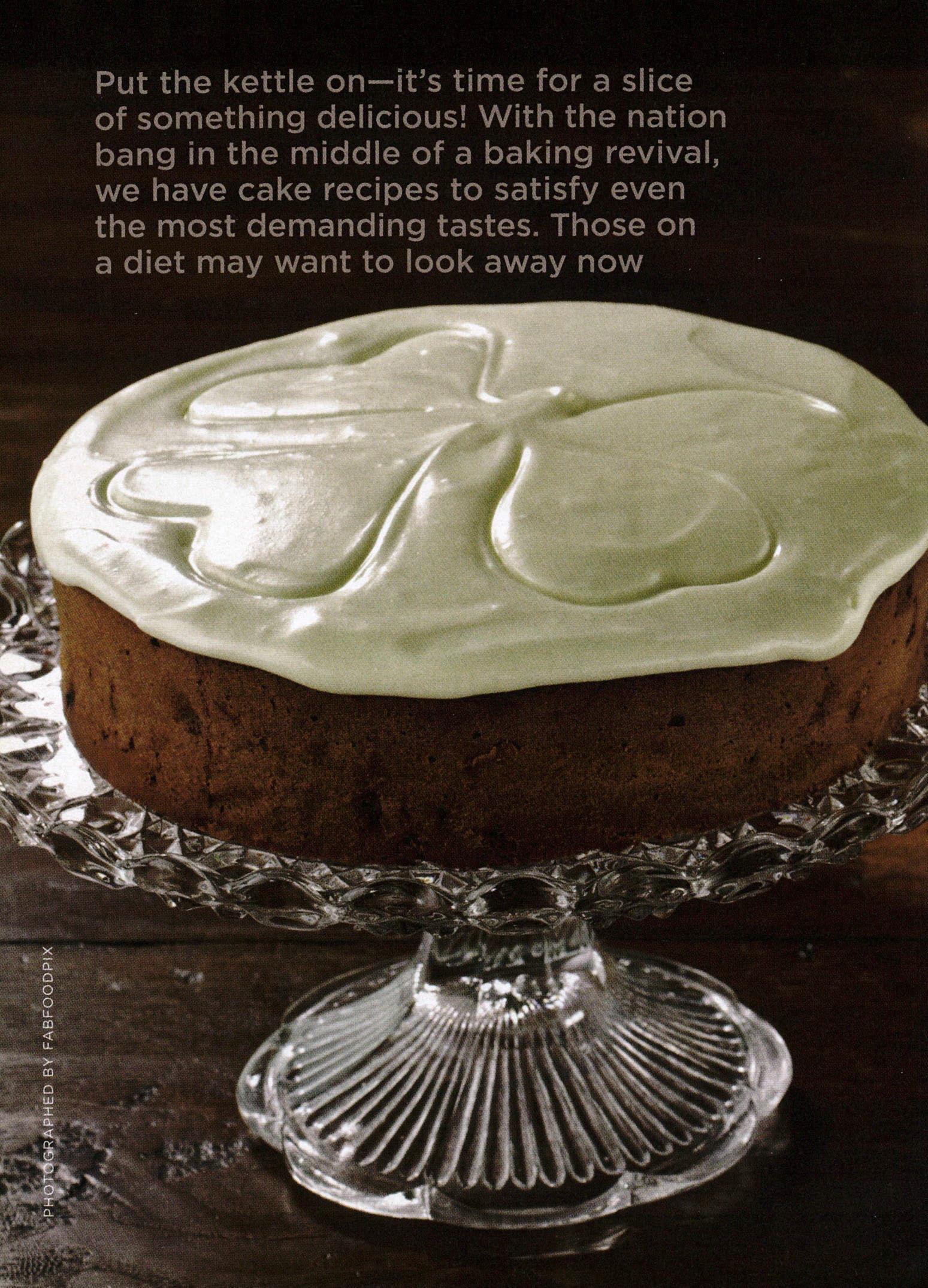
Put the kettle on—it's time for a slice of something delicious! With the nation bang in the middle of a baking revival, we have cake recipes to satisfy even the most demanding tastes. Those on a diet may want to look away now
Yes, yes, we know that Guinness is Irish, but we felt this cake was just too delicious to leave out! It follows a strong tradition in regional cooking of slipping a little of the local tipple into the baking mixture—in this case, the fruits are often soaked in the malty, creamy drink overnight. The resulting dark fruitcake keeps very well —in fact, some recipes suggest it's best stored for a week before being eaten. If you want to veer away from tradition, Nigella Lawson does a high-calorie version with chocolate, which she says is "magnificent in its damp blackness". ►
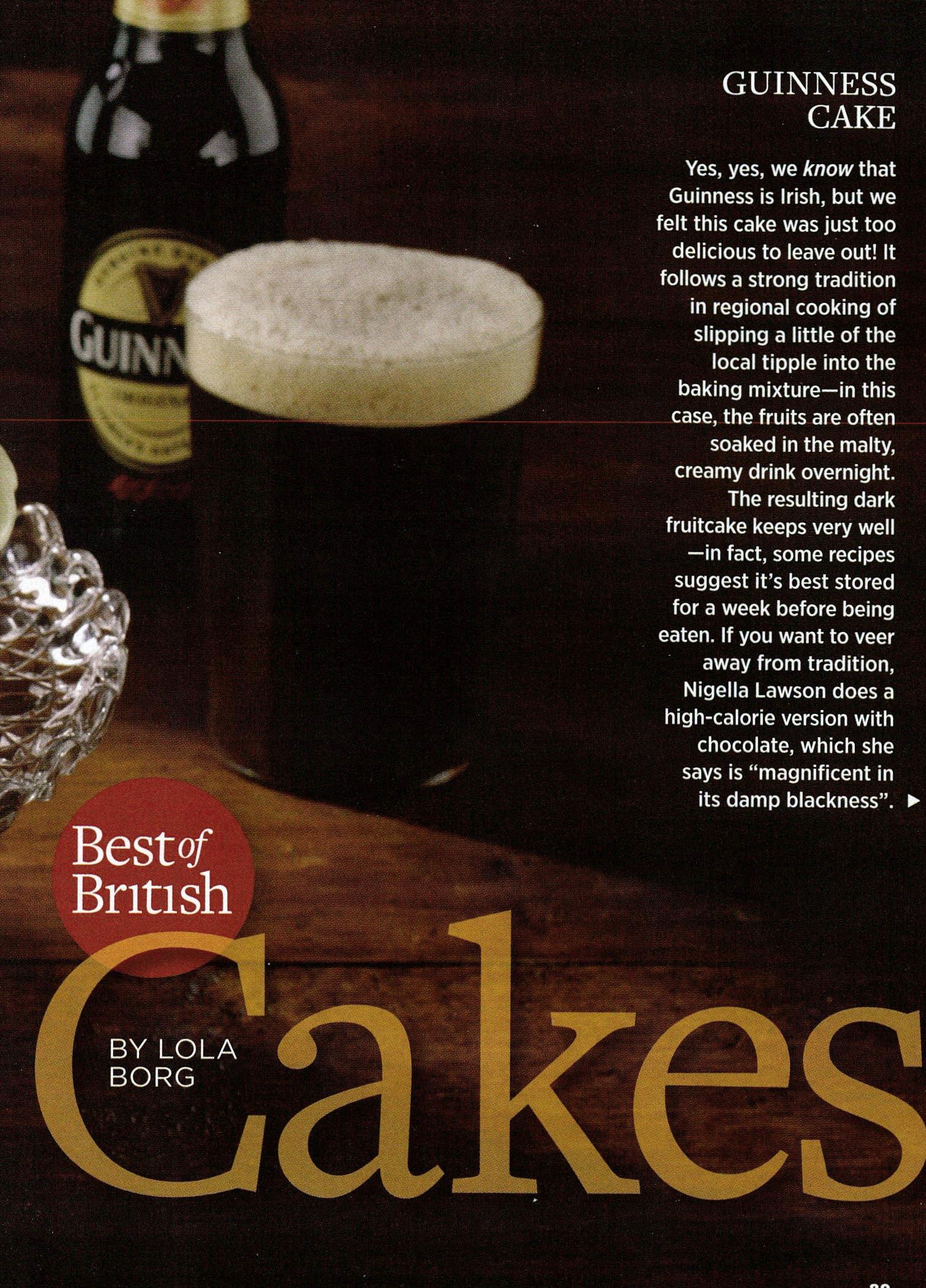
The Welsh have some lovely distinctive cakes; they are also dab hands at cooking on griddles. But think of Welsh cakes and this is what springs to mind—a beautifully fruity loaf known as Speckled Bread. There are, as usual, a gazillion different traditional recipes for this. Some use self-raising flour, some use yeast, all use spice and dried fruit. In north Wales the fruit is soaked overnight in tea before baking; in south Wales, it's not. Some cooks, such as Delia Smith, coat it with honey after baking to give it a sticky crust; others don't. Either way, it's delicious eaten toasted with a smear of butter.
A Mancunian delicacy made from dried fruit, spices and pastry, these cakes come from the little town of the same name, once home to the textile industry. "It's not an exaggeration to say that sugar fuelled the industrial revolution," says social historian Emma Heslewood. "Anywhere they needed fuel to do manual work, sugar played a key role, and cakes were baked to be portable."
So Eccles were an early convenience food, known as Fly Pies thanks to the currants, and they're still selling like, er, hot cakes. Controversy remains, though,
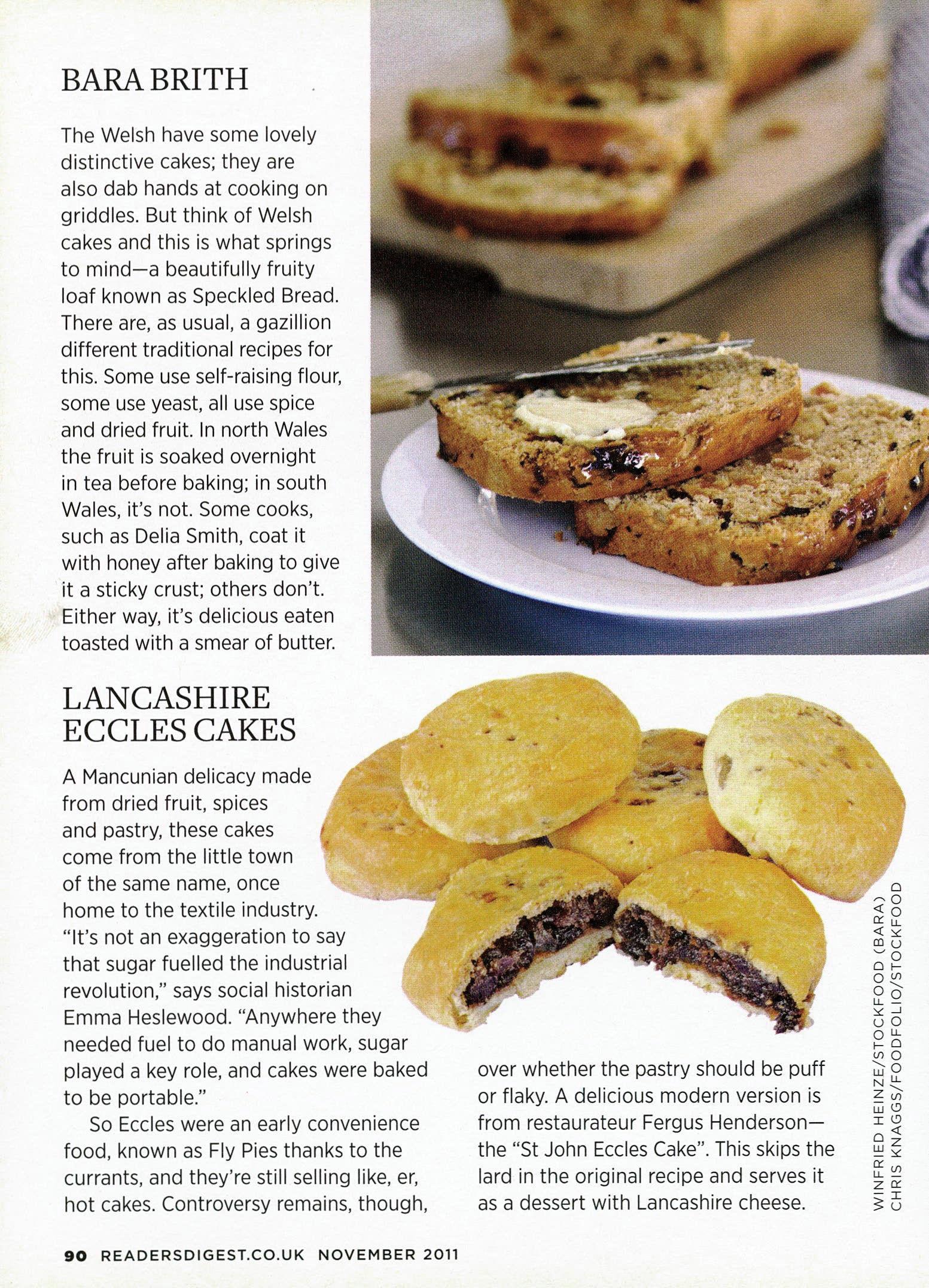
over whether the pastry should be puff or flaky. A delicious modern version is from restaurateur Fergus Henderson— the "St John Eccles Cake". This skips the lard in the original recipe and serves it as a dessert with Lancashire cheese.
There are many reasons to visit the city of Bath, and here's another one: Sally Lunn cake (or buns —you can have either). Light, fluffy, more like a brioche, eaten spread with jam and cream or butter, who wouldn't love one of these? You 5:
x • can visit the tea shop in • Lilliput Lane where Sally Lunn, a French Huguenot refugee (real name Solange Ln
• Luyon) is rumoured to have baked them. Another theory g suggests the name derives 2 from the French soleil
7
et lune (sun and moon), z referring to their golden top fx and white interior. Whatever .5 a er • , the origins, they are now 88 eaten in vast quantities by Bath's visitors. Rivals in the 0 0 • Bath baking wars are Bath Buns (round and sprinkled
• LT with lump sugar), which x < z o are similar again to London Buns—an adaptation made < = for the 1851 Great Exhibition.

Moist, sticky and spicy, and perfect for a winter afternoon, Parkin is a northern version of gingerbread made with oats and black treacle —or molasses—though the Lancashire version uses Golden Syrup. Traditionally it's served around the fire on Bonfire Night, although it was originally eaten at Celtic festivals. Dorothy Wordsworth, sister of poet William, also used to bake it—there are references to it in her notebooks. Northerners have a great baking tradition, and Parkin was added to workers' lunches during the industrial revolution. Those who know the cake say it's much better eating after it's been kept for a few days.
If rich, heavy fruitcake isn't your thing, then try Dundee cake instead. It's light and crumbly, and often cooked around Christmas time. The crucial point is that it should always contain orange zest and glace orange peel, but never cherries. (Some variations have whisky, sherry or even marmalade in the recipe.)
Apparently, it was created for Mary Queen of Scots, who disliked cherries. The other theory—giving it a much later date of origin—links it to Keiller's marmalade factory where it was devised as a way to use up peel. Either
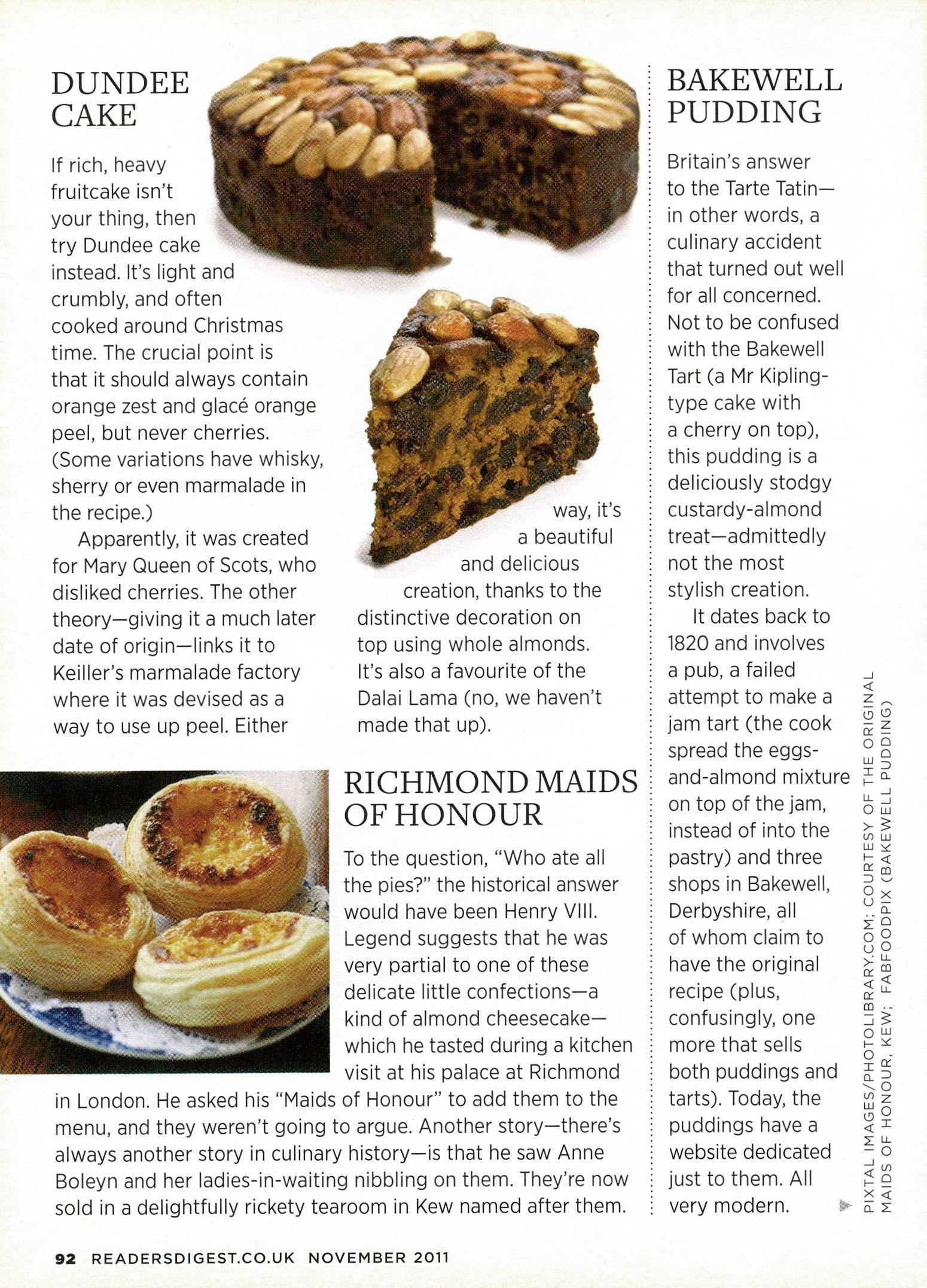
way, it's a beautiful and delicious creation, thanks to the distinctive decoration on top using whole almonds. It's also a favourite of the Dalai Lama (no, we haven't made that up).
To the question, "Who ate all the pies?" the historical answer would have been Henry VIII. Legend suggests that he was very partial to one of these delicate little confections—a kind of almond cheesecake— which he tasted during a kitchen visit at his palace at Richmond in London. He asked his "Maids of Honour" to add them to the menu, and they weren't going to argue. Another story—there's always another story in culinary history—is that he saw Anne Boleyn and her ladies-in-waiting nibbling on them. They're now sold in a delightfully rickety tearoom in Kew named after them.
Britain's answer to the Tarte Tatinin other words, a culinary accident that turned out well for all concerned. Not to be confused with the Bakewell Tart (a Mr Kiplingtype cake with a cherry on top), this pudding is a deliciously stodgy custardy-almond treat—admittedly not the most stylish creation. It dates back to 1820 and involves a pub, a failed attempt to make a jam tart (the cook spread the eggsand-almond mixture on top of the jam, instead of into the pastry) and three shops in Bakewell, Derbyshire, all of whom claim to have the original recipe (plus, confusingly, one more that sells both puddings and tarts). Today, the puddings have a website dedicated just to them. All very modern.

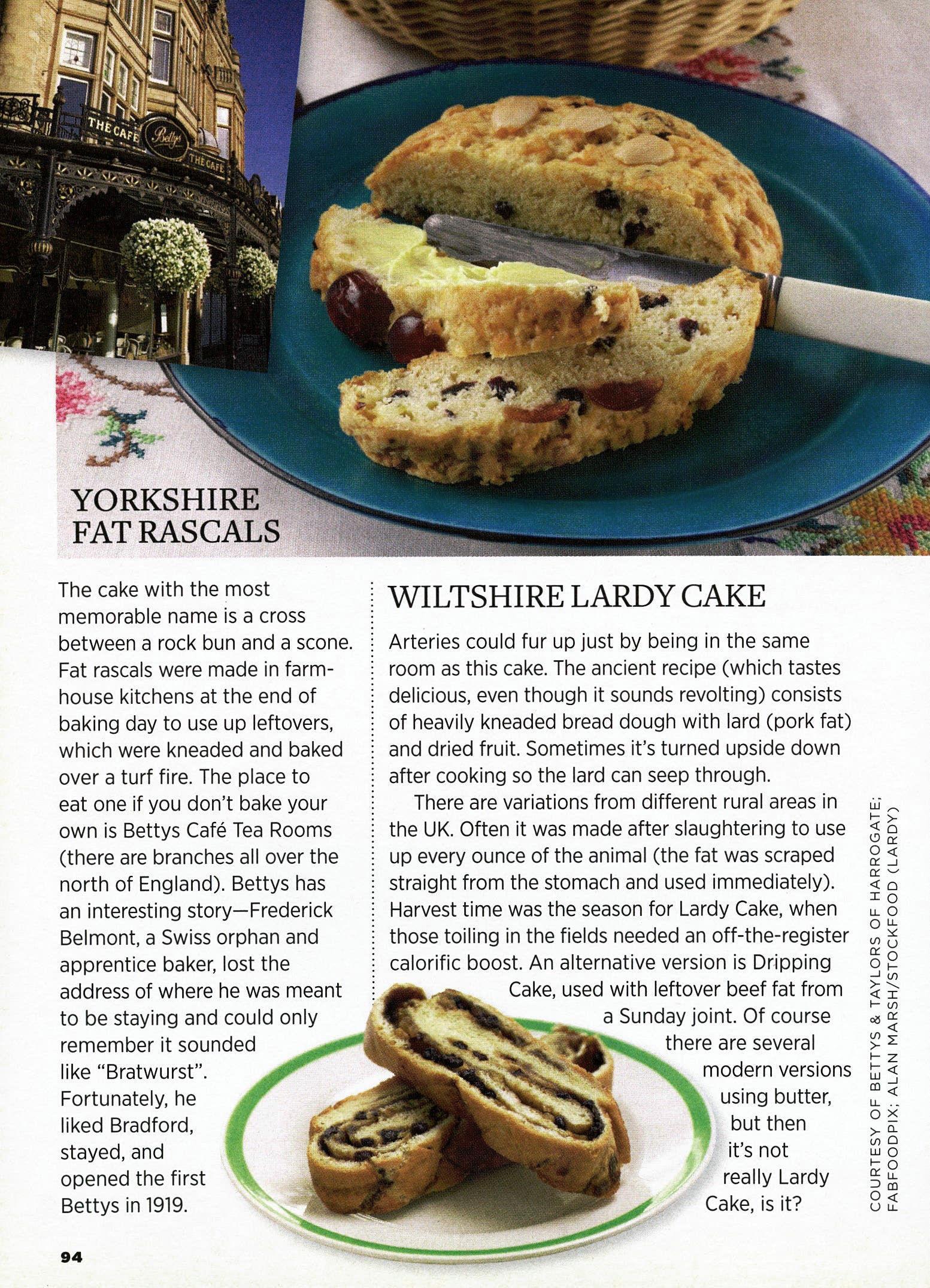
The cake with the most memorable name is a cross between a rock bun and a scone. Fat rascals were made in farmhouse kitchens at the end of baking day to use up leftovers, which were kneaded and baked over a turf fire. The place to eat one if you don't bake your own is Bettys Café Tea Rooms (there are branches all over the north of England). Bettys has an interesting story—Frederick Belmont, a Swiss orphan and apprentice baker, lost the address of where he was meant to be staying and could only remember it sounded like "Bratwurst". Fortunately, he liked Bradford, stayed, and opened the first Bettys in 1919.
Arteries could fur up just by being in the same room as this cake. The ancient recipe (which tastes delicious, even though it sounds revolting) consists of heavily kneaded bread dough with lard (pork fat) and dried fruit. Sometimes it's turned upside down after cooking so the lard can seep through.
There are variations from different rural areas in the UK. Often it was made after slaughtering to use up every ounce of the animal (the fat was scraped straight from the stomach and used immediately). Harvest time was the season for Lardy Cake, when those toiling in the fields needed an off-the-register calorific boost. An alternative version is Dripping Cake, used with leftover beef fat from a Sunday joint. Of course there are several modern versions using butter, but then it's not really Lardy Cake, is it?
There are umpteen variations of apple cake from different parts of the country. As with many regional recipes, they were handed down over generations and have been tweaked and fiddled with over time, so different versions can use lard or butter, spices such as cinnamon, and even cider. One thing they all have in common, though, is that they're moist and sweet. Traditionally baked at harvest time, when there would have been a glut of the fruit, they're rather fine eaten as a pudding with cream. ■
CAKES ONLINE: For recipes for all the cakes featured here—and a couple more—go to readersdigest. co.uk. If you have a traditional cake, bun or tart recipe you love, tell us the story and send the recipe, plus photo, to theeditor(0) readersdigest.co.uk.
There's much more in our Best of British series at readersdigest. co.uk/magazine, and also on Facebook at facebook.com/ readersdigestuk.
With thanks to: Debora Robertson; Emma Hestlewood, social history curator, Harris Museum, Preston; Mary Berry, author of over 40 cookery books and judge on BBC2's The Great British Bake Off; and Julie Duff, author of Cakes, Regional and Traditional (£14.99), which includes everything from Singing Hinnies to Ale Cake (her cakes are available from Church Farm Cakes at church farmhousecakes. co.uk).
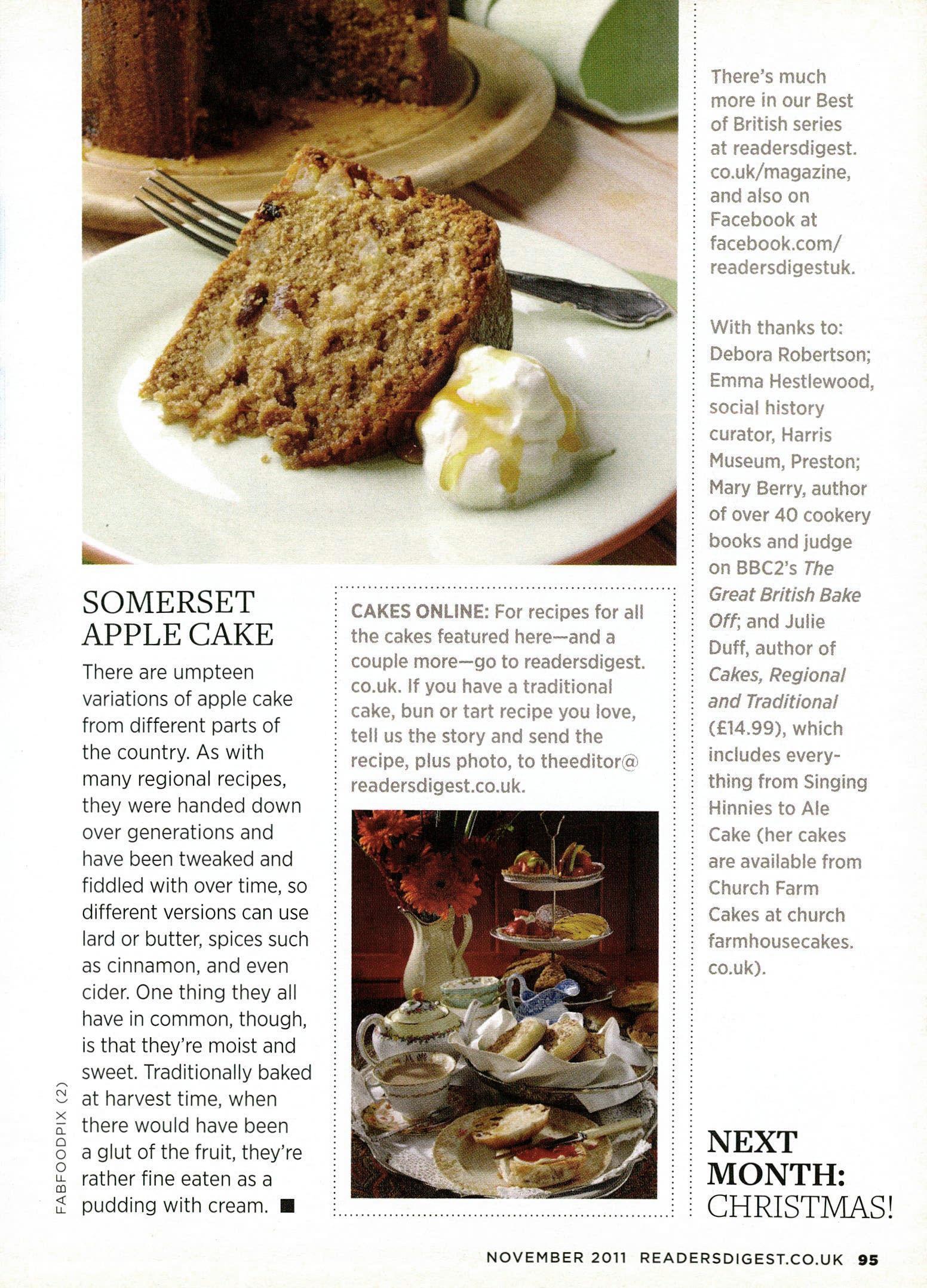
NEXT MONTH: CHRISTMAS!
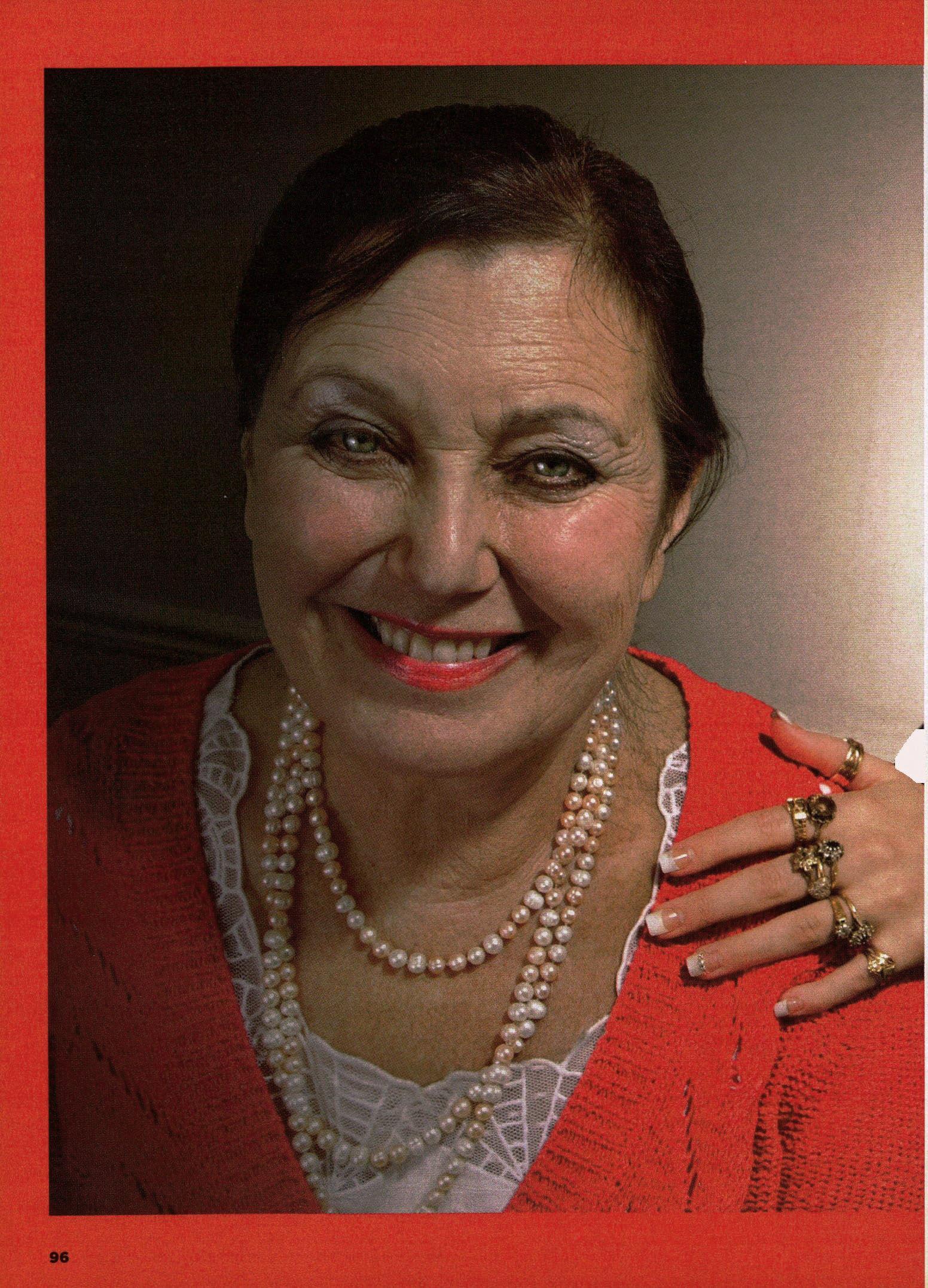
With her son at death's door, Jeannette Kupfermann discovered that there's,.a lot more to gypsies than gaudy wedding dresses and living on the so-called fringes of society
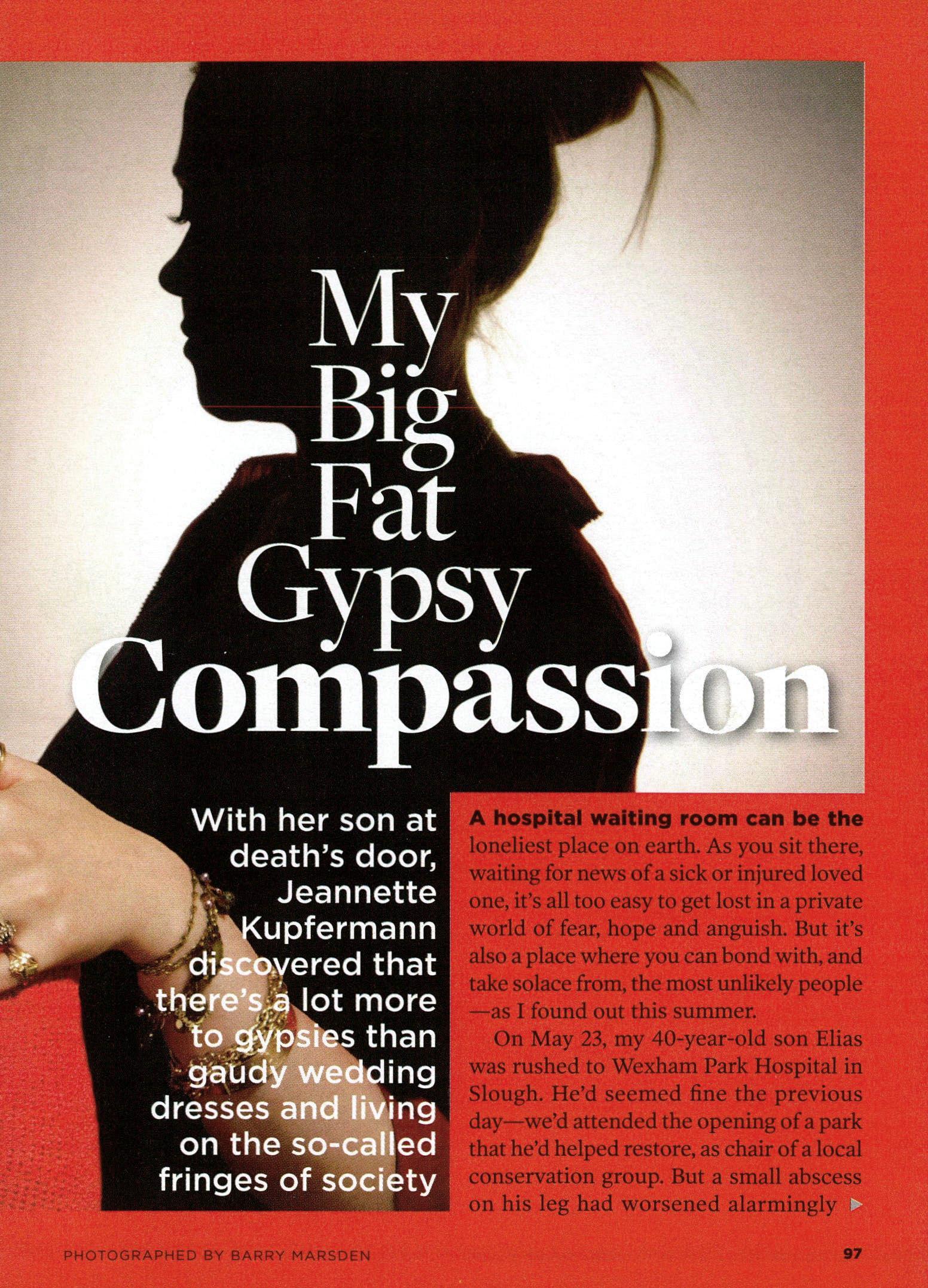
A hospital waiting room can be the loneliest place on earth. As you sit there, waiting for news of a sick or injured loved one, it's all too easy to get lost in a private world of fear, hope and anguish. But it's also a place where you can bond with, and take solace from, the most unlikely people as I found out this summer.
On May 23, my 40-year-old son Elias was rushed to Wexham Park Hospital in lough. He'd seemed fine the previous ay—we'd attended the opening of a park hat he'd helped restore, as chair of a local onservation group. But a small abscess •n his leg had worsened alarmingly
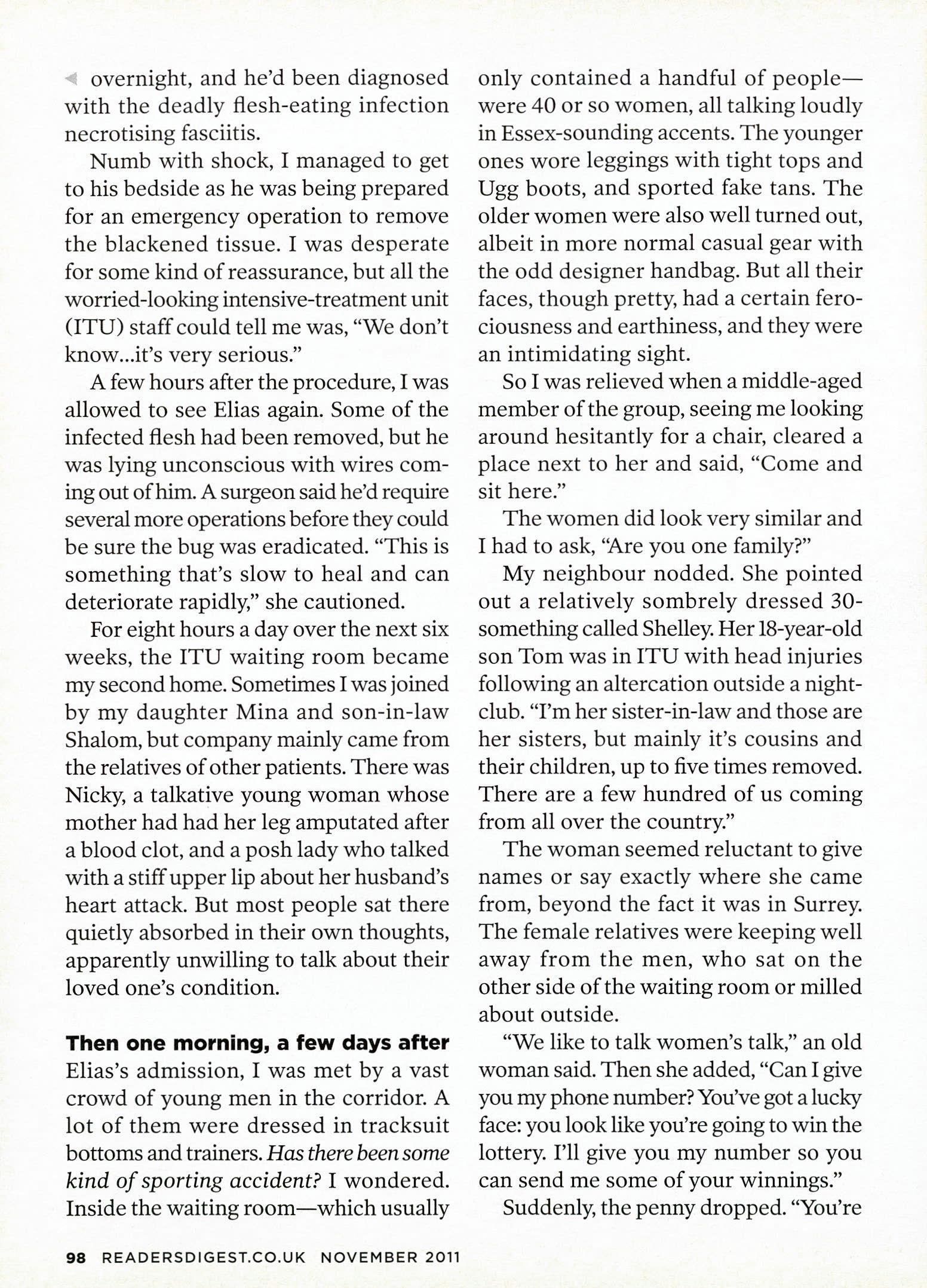
overnight, and he'd been diagnosed with the deadly flesh-eating infection necrotising fasciitis.
Numb with shock, I managed to get to his bedside as he was being prepared for an emergency operation to remove the blackened tissue. I was desperate for some kind of reassurance, but all the worried-looking intensive-treatment unit (ITU) staff could tell me was, "We don't know...it's very serious."
A few hours after the procedure, I was allowed to see Elias again. Some of the infected flesh had been removed, but he was lying unconscious with wires coming out of him. A surgeon said he'd require several more operations before they could be sure the bug was eradicated. "This is something that's slow to heal and can deteriorate rapidly," she cautioned.
For eight hours a day over the next six weeks, the ITU waiting room became my second home. Sometimes I was joined by my daughter Mina and son-in-law Shalom, but company mainly came from the relatives of other patients. There was Nicky, a talkative young woman whose mother had had her leg amputated after a blood clot, and a posh lady who talked with a stiff upper lip about her husband's heart attack. But most people sat there quietly absorbed in their own thoughts, apparently unwilling to talk about their loved one's condition.
Then one morning, a few days after Elias's admission, I was met by a vast crowd of young men in the corridor. A lot of them were dressed in tracksuit bottoms and trainers. Has there been some kind of sporting accident? I wondered. Inside the waiting room—which usually
only contained a handful of people— were 40 or so women, all talking loudly in Essex-sounding accents. The younger ones wore leggings with tight tops and Ugg boots, and sported fake tans. The older women were also well turned out, albeit in more normal casual gear with the odd designer handbag. But all their faces, though pretty, had a certain ferociousness and earthiness, and they were an intimidating sight.
So I was relieved when a middle-aged member of the group, seeing me looking around hesitantly for a chair, cleared a place next to her and said, "Come and sit here."
The women did look very similar and I had to ask, 'Are you one family?"
My neighbour nodded. She pointed out a relatively sombrely dressed 30something called Shelley. Her 18-year-old son Tom was in ITU with head injuries following an altercation outside a nightclub. "I'm her sister-in-law and those are her sisters, but mainly it's cousins and their children, up to five times removed. There are a few hundred of us coming from all over the country"
The woman seemed reluctant to give names or say exactly where she came from, beyond the fact it was in Surrey. The female relatives were keeping well away from the men, who sat on the other side of the waiting room or milled about outside.
"We like to talk women's talk," an old woman said. Then she added, "Can I give you my phone number? You've got a lucky face: you look like you're going to win the lottery. I'll give you my number so you can send me some of your winnings."
Suddenly, the penny dropped. "You're
Shown sympathy: Jeannette with her son Elias
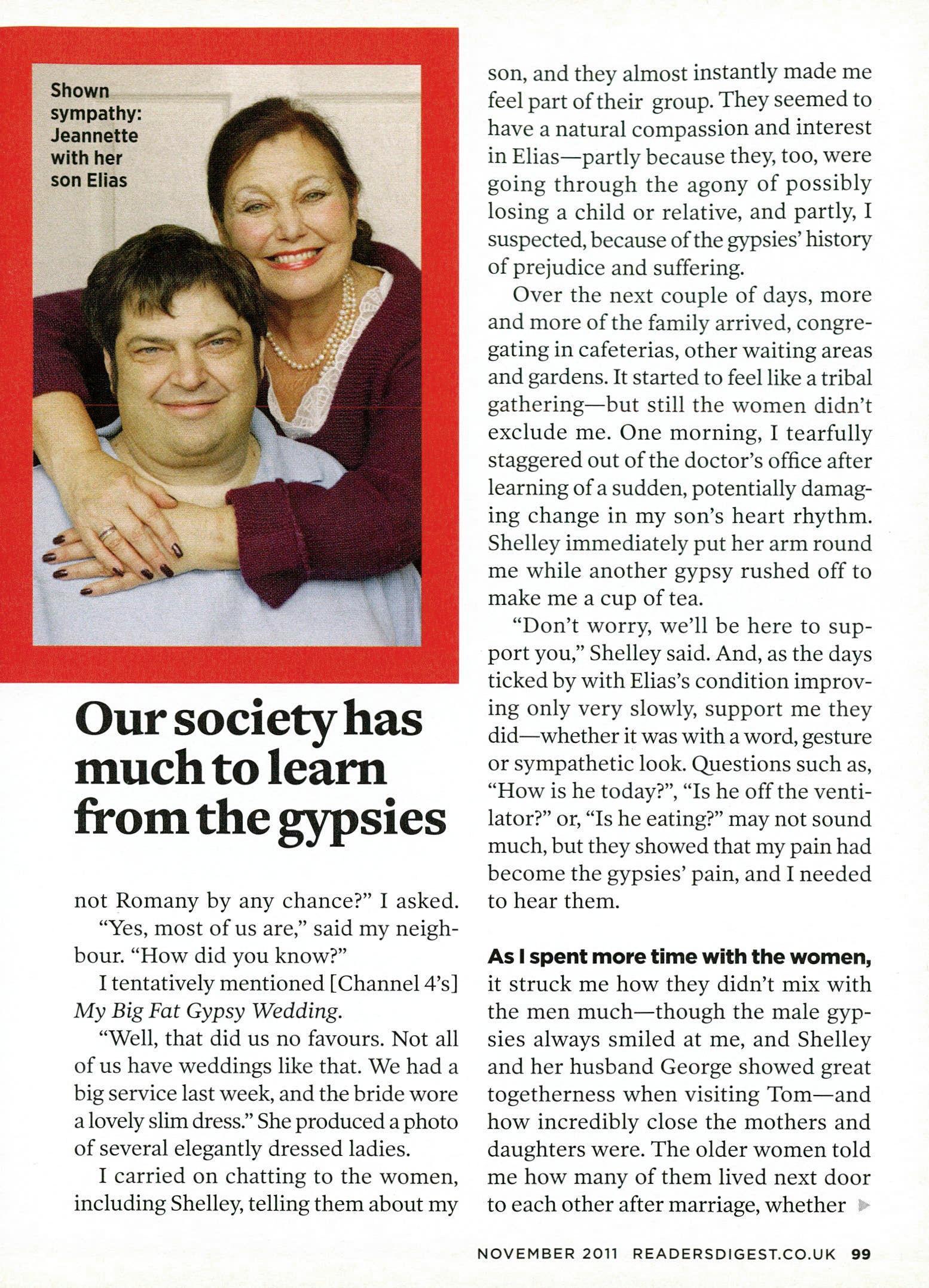
not Romany by any chance?" I asked.
"Yes, most of us are," said my neighbour. "How did you know?"
I tentatively mentioned [Channel 4's] My Big Fat Gypsy Wedding.
"Well, that did us no favours. Not all of us have weddings like that. We had a big service last week, and the bride wore a lovely slim dress." She produced a photo of several elegantly dressed ladies.
I carried on chatting to the women, including Shelley, telling them about my
son, and they almost instantly made me feel part of their group. They seemed to have a natural compassion and interest in Elias—partly because they, too, were going through the agony of possibly losing a child or relative, and partly, I suspected, because of the gypsies' history of prejudice and suffering.
Over the next couple of days, more and more of the family arrived, congregating in cafeterias, other waiting areas and gardens. It started to feel like a tribal gathering—but still the women didn't exclude me. One morning, I tearfully staggered out of the doctor's office after learning of a sudden, potentially damaging change in my son's heart rhythm. Shelley immediately put her arm round me while another gypsy rushed off to make me a cup of tea.
"Don't worry, we'll be here to support you," Shelley said. And, as the days ticked by with Elias's condition improving only very slowly, support me they did—whether it was with a word, gesture or sympathetic look. Questions such as, "How is he today?", "Is he off the ventilator?" or, "Is he eating?" may not sound much, but they showed that my pain had become the gypsies' pain, and I needed to hear them.
As I spent more time with the women, it struck me how they didn't mix with the men much—though the male gypsies always smiled at me, and Shelley and her husband George showed great togetherness when visiting Tom—and how incredibly close the mothers and daughters were. The older women told me how many of them lived next door to each other after marriage, whether IP.
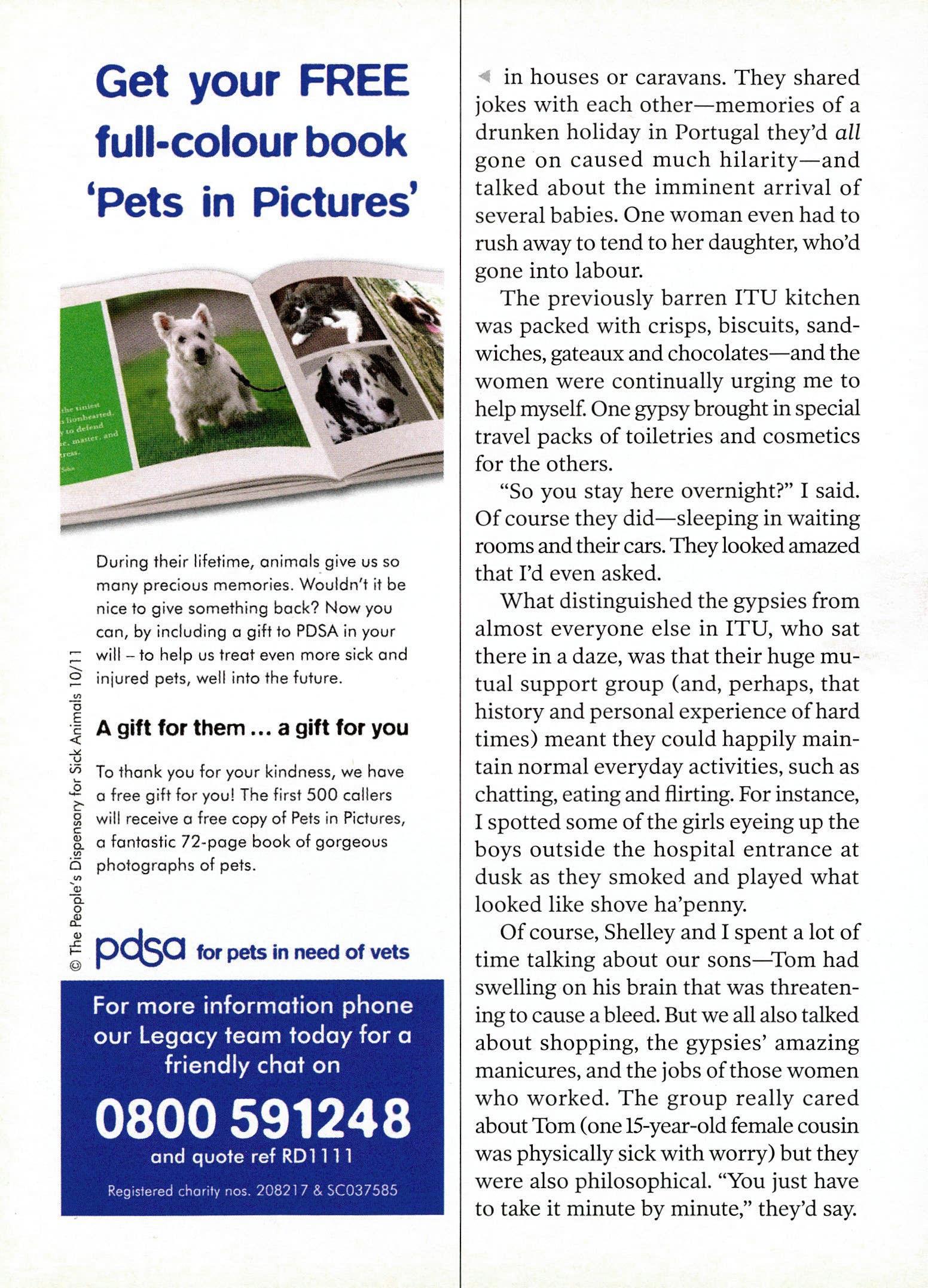
During their lifetime, animals give us so many precious memories. Wouldn't it be nice to give something back? Now you can, by including a gift to PDSA in your will — to help us treat even more sick and injured pets, well into the future.
To thank you for your kindness, we have a free gift for you! The first 500 callers will receive a free copy of Pets in Pictures, a fantastic 72-page book of gorgeous photographs of pets.
in houses or caravans. They shared jokes with each other—memories of a drunken holiday in Portugal they'd all gone on caused much hilarity—and talked about the imminent arrival of several babies. One woman even had to rush away to tend to her daughter, who'd gone into labour.
The previously barren ITU kitchen was packed with crisps, biscuits, sandwiches, gateaux and chocolates—and the women were continually urging me to help myself. One gypsy brought in special travel packs of toiletries and cosmetics for the others.
"So you stay here overnight?" I said. Of course they did—sleeping in waiting rooms and their cars. They looked amazed that I'd even asked.
What distinguished the gypsies from almost everyone else in ITU, who sat there in a daze, was that their huge mutual support group (and, perhaps, that history and personal experience of hard times) meant they could happily maintain normal everyday activities, such as chatting, eating and flirting. For instance, I spotted some of the girls eyeing up the boys outside the hospital entrance at dusk as they smoked and played what looked like shove ha'penny.
Of course, Shelley and I spent a lot of time talking about our sons—Tom had swelling on his brain that was threatening to cause a bleed. But we all also talked about shopping, the gypsies' amazing manicures, and the jobs of those women who worked. The group really cared about Tom (one 15-year-old female cousin was physically sick with worry) but they were also philosophical. "You just have to take it minute by minute," they'd say.
The behaviour of the gypsy youngsters was admirable, too. The girls soberly waited their turn to visit Tom's bedside. And when, after a week, he was well enough to be moved from ITU into a side room (at which point George thanked the staff and promised champagne and flowers), the boys took it in turns to wheel him out into the garden. This contrasted with the peevishness I'd seen from other teenagers at the hospital, who were obviously there under sufferance.
Our society has much to learn from the gypsies. It's hard to imagine them neglecting their elderly or dumping them in homes. And the incredible support they offer a sick family member has to make a vast difference to their recovery. Some months earlier, I'd been in the same hospital with a broken arm and leg, and seen the despair of some older patients who rarely received visitors.
A notion of duty is demonstrated to gypsy children from birth, and showing respect is paramount—as I discovered when a harassed Shelley, on the day of her son's discharge, strode out of the ward shouting, "I've told him he can walk home. I won't have him mouthing off like that, and I mean it. He can walk."
Whether he did or not, I'll never know, but the next day the gypsies had all disappeared and the hospital felt like it was missing some huge life force.
Elias left hospital four weeks later, and has now recovered. My memories of that fraught time are fading, but I'll never forget the people who appeared almost by magic and, by recognising and giving reassurance to a fellow human in pain, broke down all barriers. ■
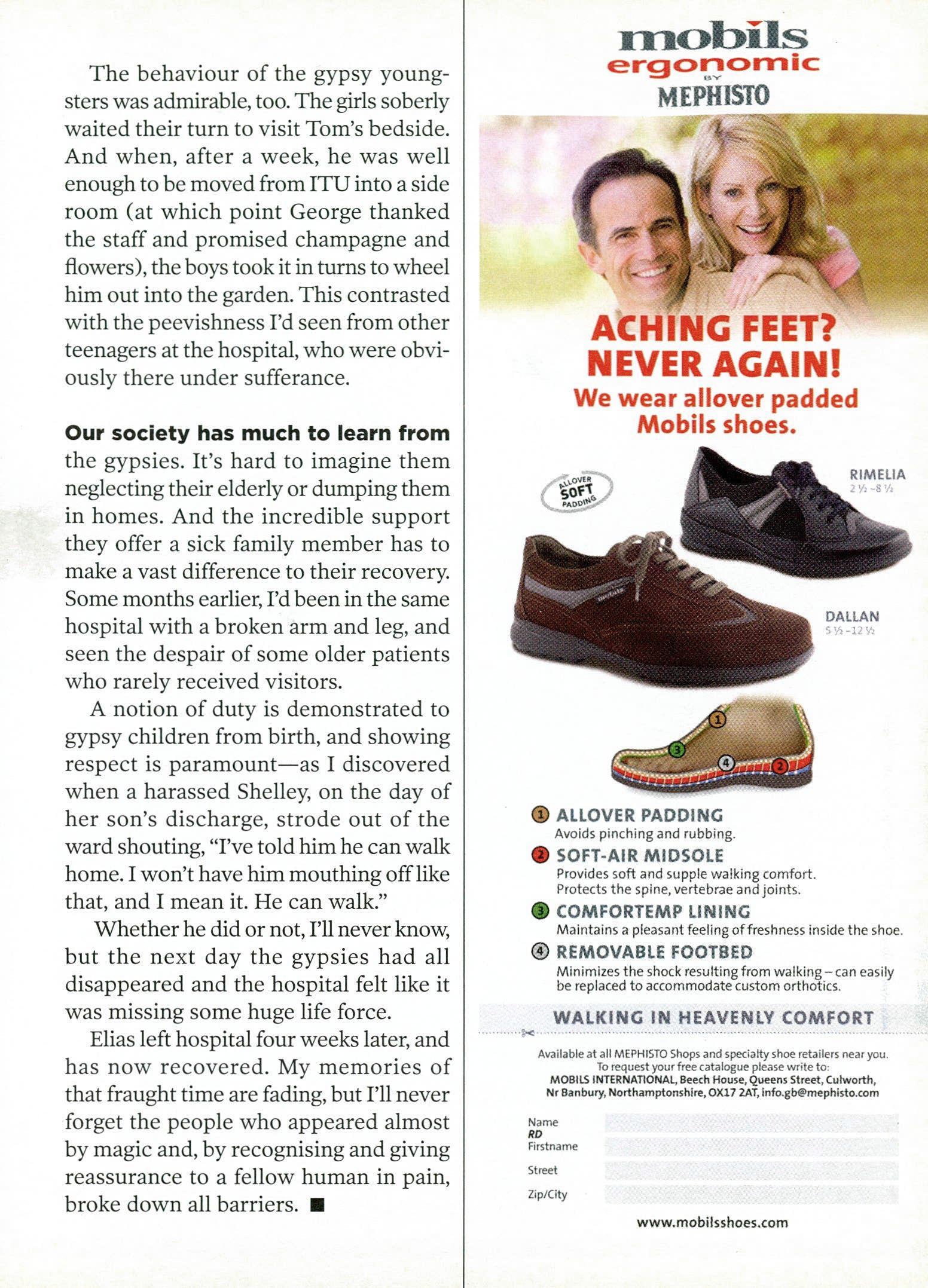
• ALLOVER PADDING
Avoids pinching and rubbing.
• SOFT-AIR MIDSOLE
Provides soft and supple walking comfort. Protects the spine, vertebrae and joints.
• COMFORTEMP LINING
Maintains a pleasant feeling of freshness inside the shoe. REMOVABLE FOOTBED
Minimizes the shock resulting from walking—can easily be replaced to accommodate custom orthotics.
WALKING IN HEAVENLY COMFORT
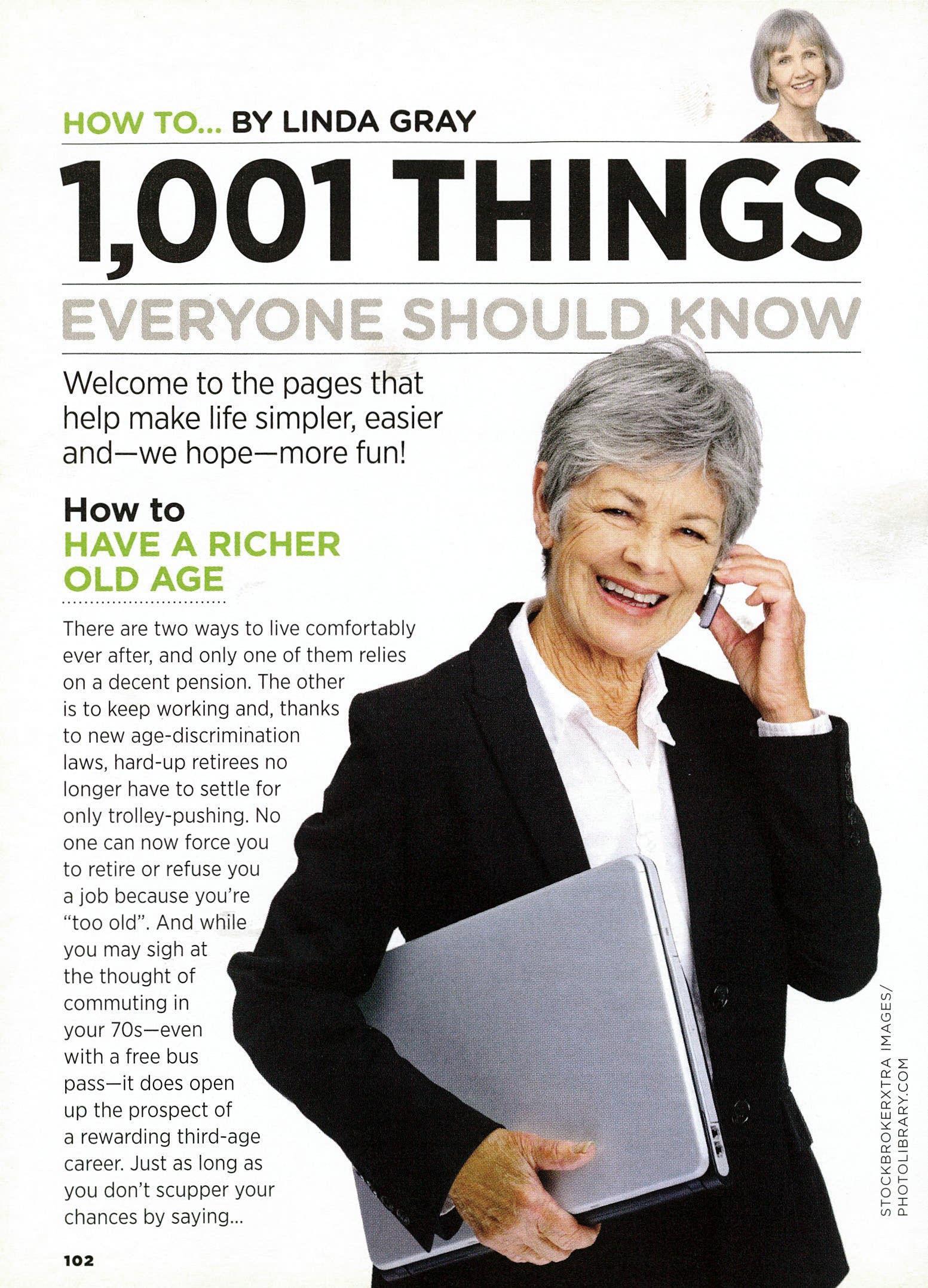 HOW TO... BY LINDA GRAY Atki,
HOW TO... BY LINDA GRAY Atki,
Welcome to the pages that help make life simpler, easier and—we hope—more fun!
There are two ways to live comfortably ever after, and only one of them relies on a decent pension. The other is to keep working and, thanks to new age-discrimination laws, hard-up retirees no longer have to settle for only trolley-pushing. No one can now force you to retire or refuse you a job because you're "too old". And while you may sigh at the thought of commuting in your 70s—even with a free bus pass—it does open up the prospect of a rewarding third-age career. Just as long as you don't scupper your chances by saying...
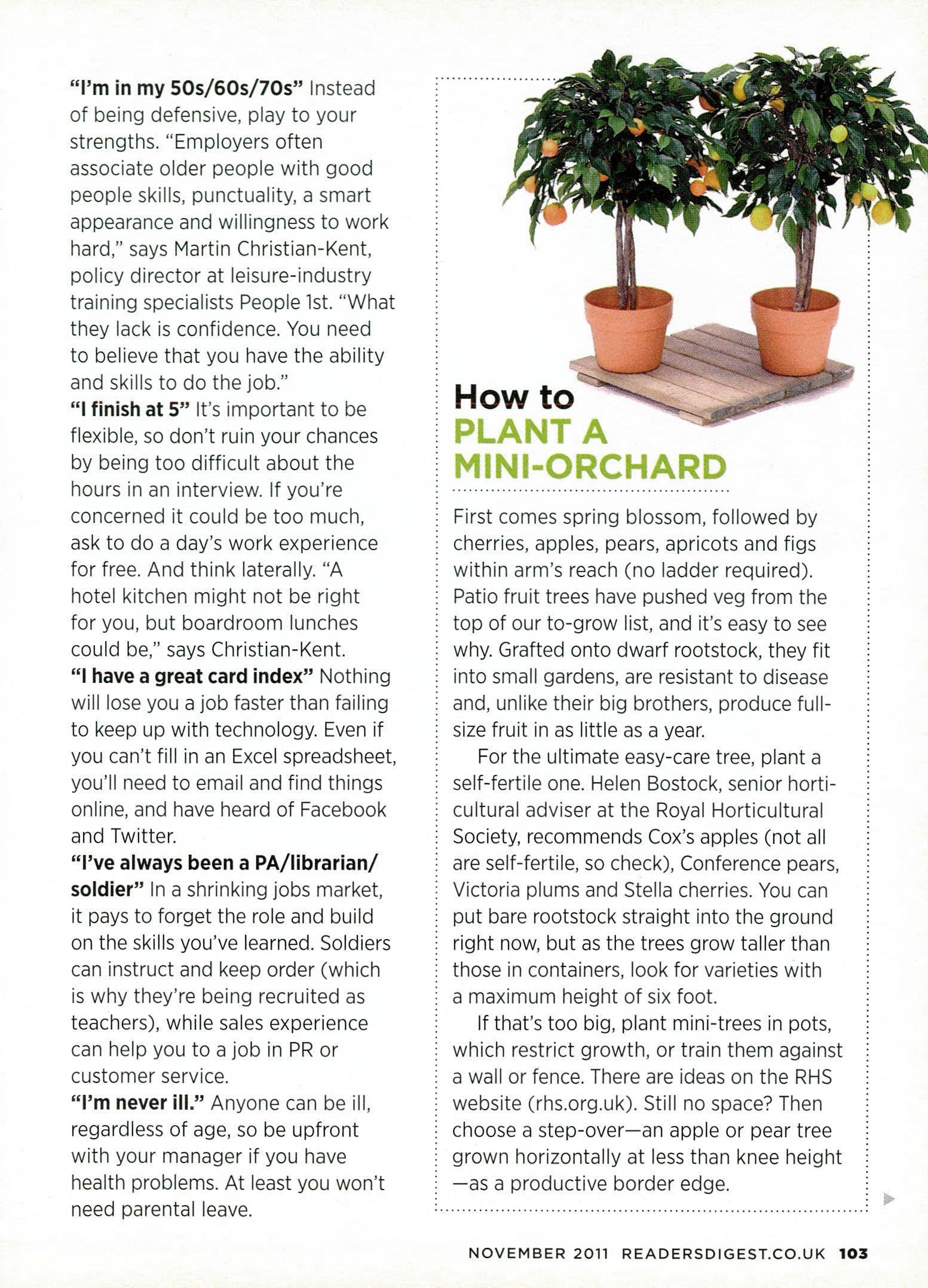
"I'm in my 50s/60s/70s" Instead of being defensive, play to your strengths. "Employers often associate older people with good people skills, punctuality, a smart appearance and willingness to work hard," says Martin Christian-Kent, policy director at leisure-industry training specialists People 1st. "What they lack is confidence. You need to believe that you have the ability and skills to do the job."
"I finish at 5" It's important to be flexible, so don't ruin your chances by being too difficult about the hours in an interview. If you're concerned it could be too much, ask to do a day's work experience for free. And think laterally. "A hotel kitchen might not be right for you, but boardroom lunches could be," says Christian-Kent.
"I have a great card index" Nothing will lose you a job faster than failing to keep up with technology. Even if you can't fill in an Excel spreadsheet, you'll need to email and find things online, and have heard of Facebook and Twitter.
"I've always been a PA/librarian/ soldier" In a shrinking jobs market, it pays to forget the role and build on the skills you've learned. Soldiers can instruct and keep order (which is why they're being recruited as teachers), while sales experience can help you to a job in PR or customer service.
"I'm never ill." Anyone can be ill, regardless of age, so be upfront with your manager if you have health problems. At least you won't need parental leave.
First comes spring blossom, followed by cherries, apples, pears, apricots and figs within arm's reach (no ladder required). Patio fruit trees have pushed veg from the top of our to-grow list, and it's easy to see why. Grafted onto dwarf rootstock, they fit into small gardens, are resistant to disease and, unlike their big brothers, produce fullsize fruit in as little as a year.
For the ultimate easy-care tree, plant a self-fertile one. Helen Bostock, senior horticultural adviser at the Royal Horticultural Society, recommends Cox's apples (not all are self-fertile, so check), Conference pears, Victoria plums and Stella cherries. You can put bare rootstock straight into the ground right now, but as the trees grow taller than those in containers, look for varieties with a maximum height of six foot.
If that's too big, plant mini-trees in pots, which restrict growth, or train them against a wall or fence. There are ideas on the RHS website (rhs.org.uk). Still no space? Then choose a step-over—an apple or pear tree grown horizontally at less than knee height —as a productive border edge.
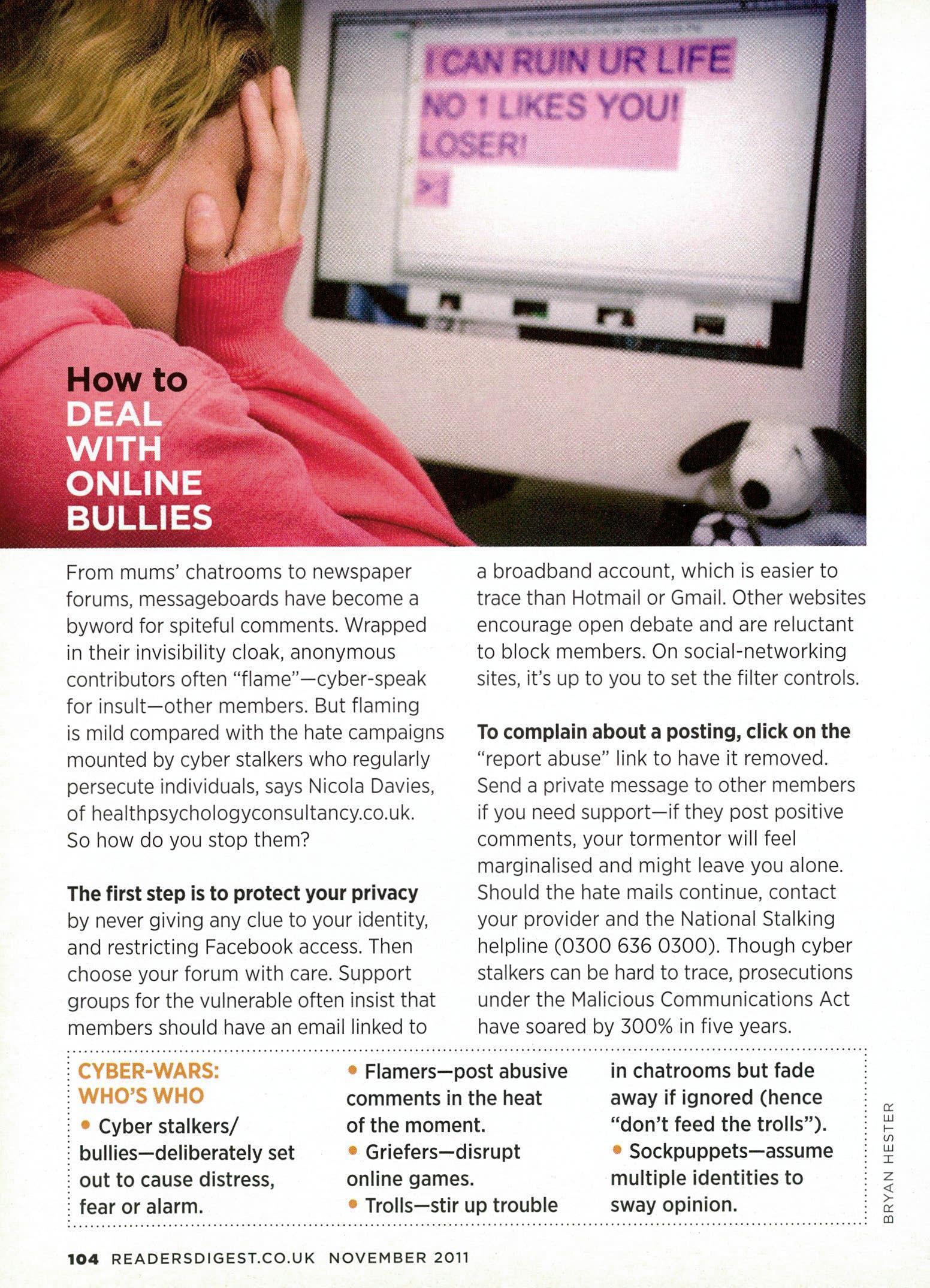
From mums' chatrooms to newspaper forums, messageboards have become a byword for spiteful comments. Wrapped in their invisibility cloak, anonymous contributors often "flame"—cyber-speak for insult—other members. But flaming is mild compared with the hate campaigns mounted by cyber stalkers who regularly persecute individuals, says Nicola Davies, of healthpsychologyconsultancy.co.uk. So how do you stop them?
The first step is to protect your privacy by never giving any clue to your identity, and restricting Facebook access. Then choose your forum with care. Support groups for the vulnerable often insist that members should have an email linked to
CYBER-WARS: WHO'S WHO
• Cyber stalkers/ bullies—deliberately set out to cause distress, fear or alarm.
a broadband account, which is easier to trace than Hotmail or Gmail. Other websites encourage open debate and are reluctant to block members. On social-networking sites, it's up to you to set the filter controls.
To complain about a posting, click on the "report abuse" link to have it removed. Send a private message to other members if you need support—if they post positive comments, your tormentor will feel marginalised and might leave you alone. Should the hate mails continue, contact your provider and the National Stalking helpline (0300 636 0300). Though cyber stalkers can be hard to trace, prosecutions under the Malicious Communications Act have soared by 300% in five years.
• Flamers—post abusive comments in the heat of the moment.
• Griefers—disrupt online games.
• Trolls—stir up trouble
in chatrooms but fade away if ignored (hence "don't feed the trolls").
• Sockpuppets—assume multiple identities to sway opinion.
It's all too tempting to hide your gadget graveyard in the wheelie bin, but resist. Electronic goods contain toxic heavy metals, so they need to be taken to a specialist recycling point (find one at recyclenow.com).
If there's a spark of life left in your computer, donate it to one of the good causes listed on itforcharities.co.uk.
Whatever you do, wipe the hard drive first (there's a free program at dban. orgy, or you could give away your bank details along with your laptop.
Shabby chic is all very well, but if your home hasn't seen a paintbrush this century, it could be overdue for a revamp. That doesn't mean you need to chuck out your carpets (which, in any case, are making a comeback). "It's not about fashion," says Judy Smith, Crown Paints' colour consultant. "Think about what you want— is it a room that makes an impact, or one that's a background for your possessions? It's your home, so it should please you." To make that happen, she suggests adding:
Instant sunshine: "Make sure curtains pull clear of the windows, and paint the frame white so light bounces off it."
Classy details:"Think
Colour up your room with a Bocca Marilyn
Lip Sofa
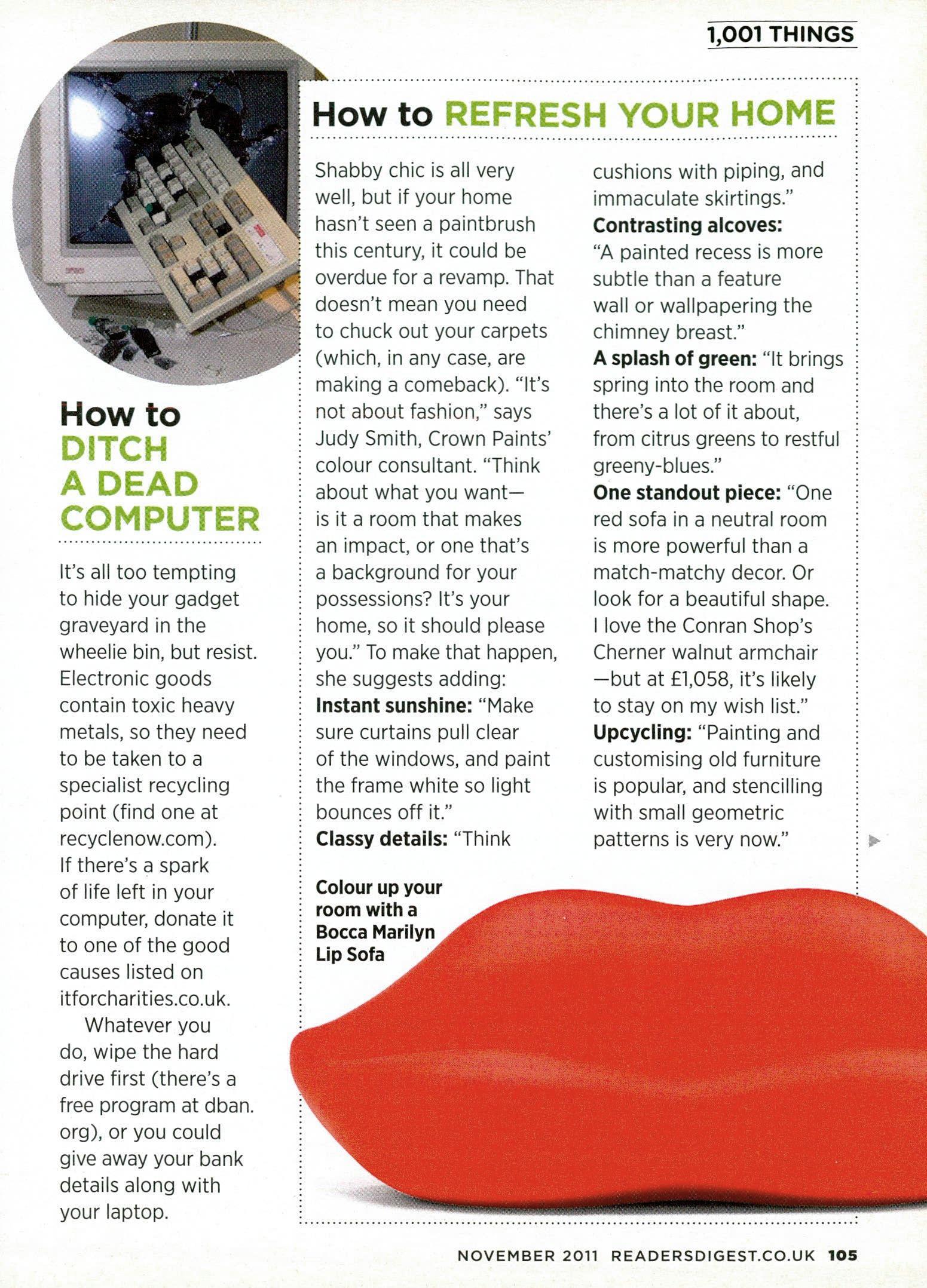
cushions with piping, and immaculate skirtings."
Contrasting alcoves: "A painted recess is more subtle than a feature wall or wallpapering the chimney breast."
A splash of green: "It brings spring into the room and there's a lot of it about, from citrus greens to restful greeny-blues."
One standout piece:"One red sofa in a neutral room is more powerful than a match-matchy decor. Or look for a beautiful shape. I love the Conran Shop's Cherner walnut armchair —but at £1,058, it's likely to stay on my wish list."
Upcycling: "Painting and customising old furniture is popular, and stencilling with small geometric patterns is very now."
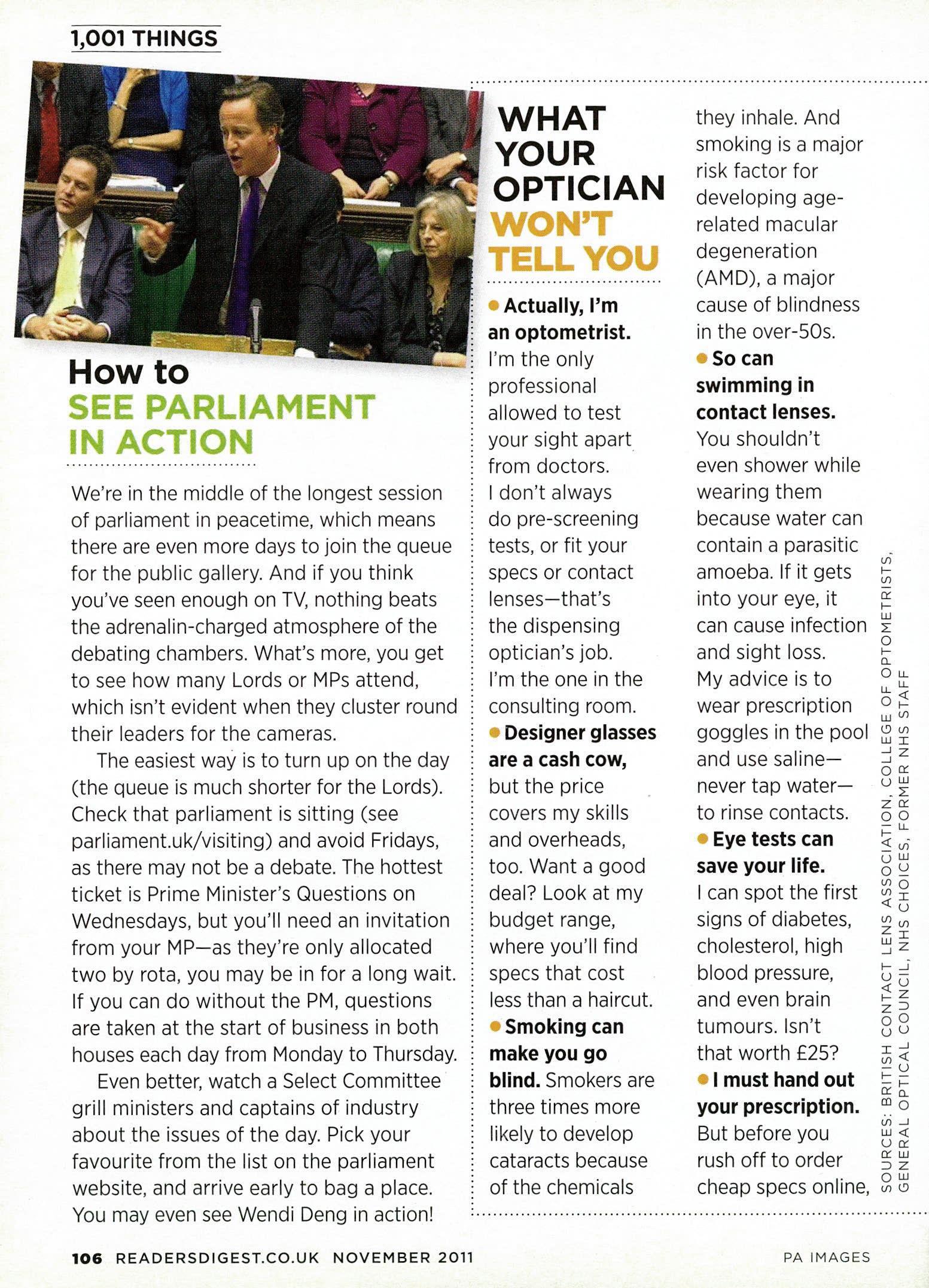
We're in the middle of the longest session of parliament in peacetime, which means there are even more days to join the queue for the public gallery. And if you think you've seen enough on TV, nothing beats the adrenalin-charged atmosphere of the debating chambers. What's more, you get to see how many Lords or MPs attend, which isn't evident when they cluster round their leaders for the cameras.
The easiest way is to turn up on the day (the queue is much shorter for the Lords). Check that parliament is sitting (see parliament.uk/visiting) and avoid Fridays, as there may not be a debate. The hottest ticket is Prime Minister's Questions on Wednesdays, but you'll need an invitation from your MP—as they're only allocated two by rota, you may be in for a long wait. If you can do without the PM, questions are taken at the start of business in both houses each day from Monday to Thursday. Even better, watch a Select Committee grill ministers and captains of industry about the issues of the day. Pick your favourite from the list on the parliament website, and arrive early to bag a place. You may even see Wendi Deng in action!
Actually, I'm an optometrist. I'm the only professional allowed to test your sight apart from doctors. I don't always do pre-screening tests, or fit your specs or contact lenses—that's the dispensing optician's job. I'm the one in the consulting room. e Designer glasses are a cash cow, but the price covers my skills and overheads, too. Want a good deal? Look at my budget range, where you'll find specs that cost less than a haircut.
• Smoking can make you go blind. Smokers are three times more likely to develop cataracts because of the chemicals
they inhale. And smoking is a major risk factor for developing agerelated macular degeneration (AMD), a major cause of blindness in the over-50s.
• So can swimming in contact lenses. You shouldn't even shower while wearing them because water can contain a parasitic amoeba. If it gets into your eye, it can cause infection and sight loss. My advice is to wear prescription goggles in the pool and use saline— never tap water— to rinse contacts.
• Eye tests can save your life.
I can spot the first signs of diabetes, cholesterol, high blood pressure, and even brain tumours. Isn't that worth £25?
• I must hand out your prescription. But before you rush off to order cheap specs online,
I should tell you it doesn't contain the pupillary distance measurement they need to make sure the lenses sit right. a Bifocals aren't for everyone. A difference in the sight of your right and left eye may make images jump about, so you might do better with two pairs of specs. But if you wear contact lenses, I can adjust one for distance vision, the other for close work, so
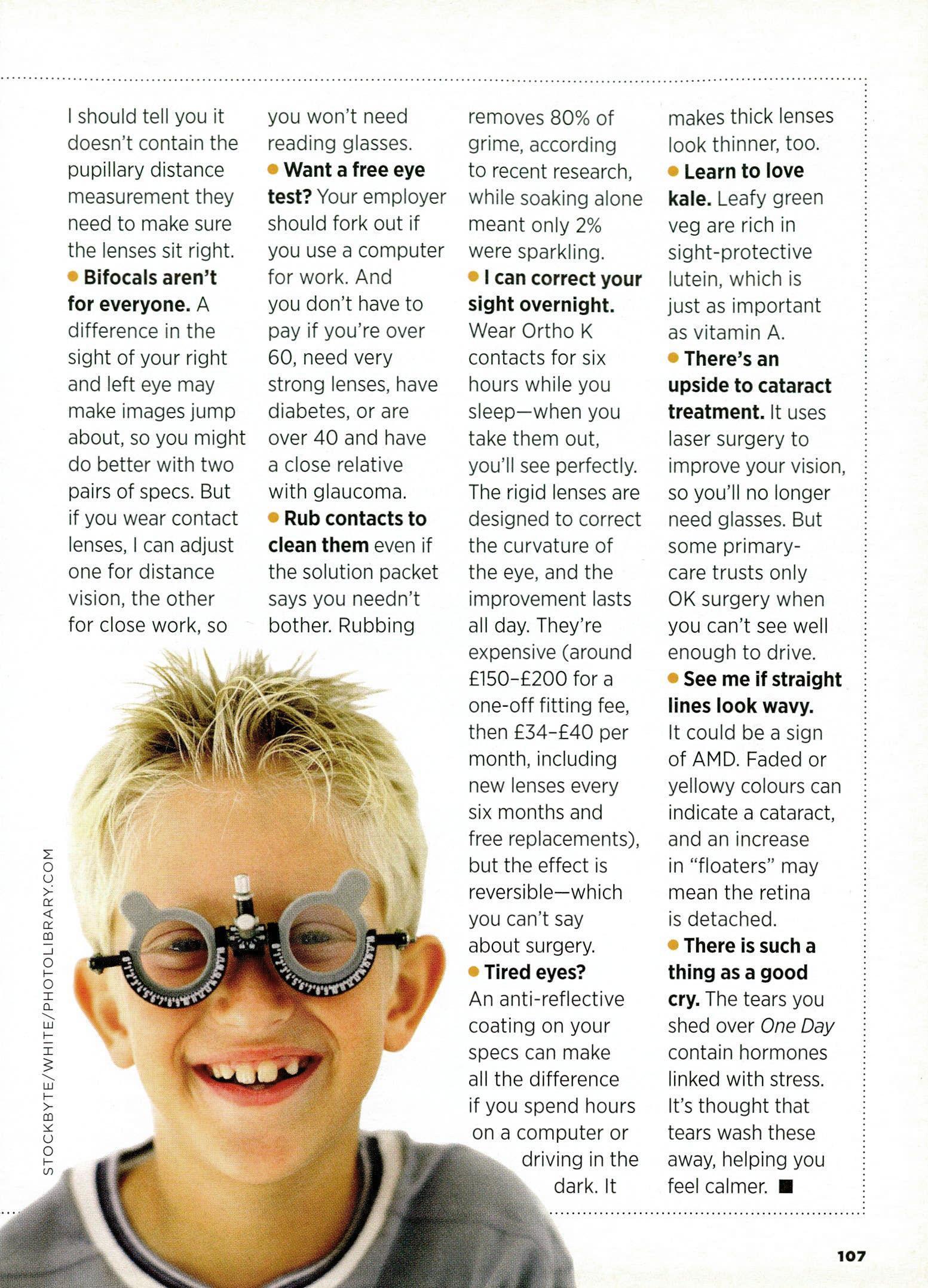
you won't need reading glasses.
• Want a free eye test?Your employer should fork out if you use a computer for work. And you don't have to pay if you're over 60, need very strong lenses, have diabetes, or are over 40 and have a close relative with glaucoma.
4, Rub contacts to clean them even if the solution packet says you needn't bother. Rubbing
removes 80% of grime, according to recent research, while soaking alone meant only 2% were sparkling.
• I can correct your sight overnight.
Wear Ortho K contacts for six hours while you sleep—when you take them out, you'll see perfectly. The rigid lenses are designed to correct the curvature of the eye, and the improvement lasts all day. They're expensive (around £150-£200 for a one-off fitting fee, then £34-£40 per month, including new lenses every six months and free replacements), but the effect is reversible—which you can't say about surgery.
• Tired eyes?
An anti-reflective coating on your specs can make all the difference if you spend hours on a computer or driving in the dark. It
makes thick lenses look thinner, too.
• Learn to love kale. Leafy green veg are rich in sight-protective lutein, which is just as important as vitamin A.
• There's an upside to cataract treatment. It uses laser surgery to improve your vision, so you'll no longer need glasses. But some primarycare trusts only OK surgery when you can't see well enough to drive.
• See me if straight lines look wavy. It could be a sign of AMD. Faded or yellowy colours can indicate a cataract, and an increase in "floaters" may mean the retina is detached.
• There is such a thing as a good cry. The tears you shed over One Day contain hormones linked with stress. It's thought that tears wash these away, helping you feel calmer. ■
The key to good health? Try love—wherever you find it
"How are you feeling?" I ask. Mrs Leslie sighs and turns her face to the wall. She pulls the bed sheets up to her chin.
"Do you think you're depressed?" I say. She shrugs. I sit down at the bottom of her bed and she continues to stare at the wall.
"I miss Robbie," she says after some time.
I nod. Mrs Leslie had been widowed two years ago and is totally alone. "Yes, it must be very hard." I reply. "How long were you and Robbie married?" She looks at me, puzzled, then shakes her head.
"Robbie's my Jack Russell," she says. "I was married to my husband for 40 years, but, God, I don't miss him."
"Oh, OK," I say, a little taken aback.
"My neighbours have been looking after Robbie," she continues, "but they're not dog people and apparently he's keeping them awake all night howling. He never howls when he's with me."
Mrs Leslie had been admitted to hospital after a stroke. It's common for stroke patients to suffer depression. This is
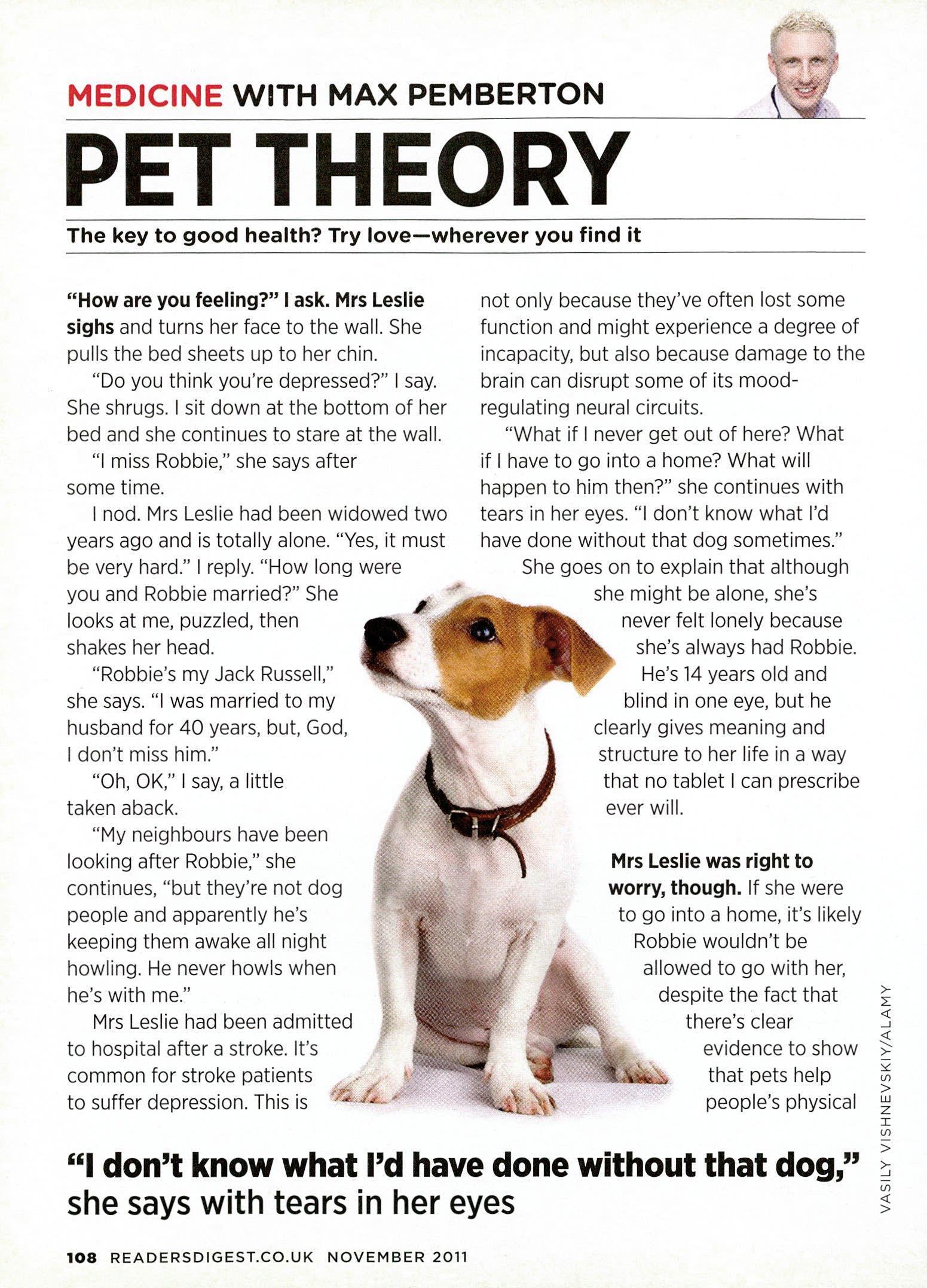
not only because they've often lost some function and might experience a degree of incapacity, but also because damage to the brain can disrupt some of its moodregulating neural circuits.
"What if I never get out of here? What if I have to go into a home? What will happen to him then?" she continues with tears in her eyes. "I don't know what I'd have done without that dog sometimes." She goes on to explain that although she might be alone, she's never felt lonely because she's always had Robbie. He's 14 years old and blind in one eye, but he clearly gives meaning and structure to her life in a way that no tablet I can prescribe ever will.
Mrs Leslie was right to worry,though. If she were to go into a home, it's likely Robbie wouldn't be allowed to go with her, despite the fact that there's clear evidence to show that pets help people's physical
"I don't know what I'd have done without that dog," she says with tears in her eyes
and psychological well-being. The most important thing in her life would be taken away from her and she'd spend the rest of her days alone.
It was clear that, regardless of her stroke, just a short period of time being alone and away from her dog had contributed to a depressive illness. I stood there wondering what a future without any pets would do to her.
I didn't start Mrs Leslie on an antidepressant. Instead, I spoke to my consultant and the district nurse, and we concluded that it was in her best interests to be at home. A week later she was discharged back to the care of a certain Jack Russell.
Max Pemberton is a hospital doctor, and the Mind Journalist of the Year 2010.
Max's new book The Doctor Will See You Now is out now
The stomach is often mistakenly thought to be near our navel. In fact, it's far higher up, just below the diaphragm in our chest. It's a sack-like organ that's involved in digestion, but it's also integral to appetite—it controls when we feel hungry via a complex interaction between nerves, hormones and the brain.
Food enters the stomach from the oesophagus. In adults, the stomach has a relaxed volume of only 45m1, but can stretch to accommodate up to three litres of food when needed.
When food enters the stomach, the stomach releases the hormone gastrin, which triggers the release of enzymes that react with the food to break it down, as well as hydrochloric acid, which kills microbes and protects the body from infection. In turn, the stomach has to protect itself from
the noxious concoction it's secreted. It does this by producing a thick layer of mucus, which coats the lining of the stomach and prevents it from digesting itself.
The stomach isn't just one big shopping bag full of churned-up food, though. It also secretes hormones to tell the rest of the body what's happening. The hormone cholecystokinin tells the gall bladder to contract as well as telling the pancreas to release alkaline secretions that neutralise stomach acid. Several other hormones either increase or decrease the speed that the stomach empties its contents into the intestines, as well as the amount of acid released.
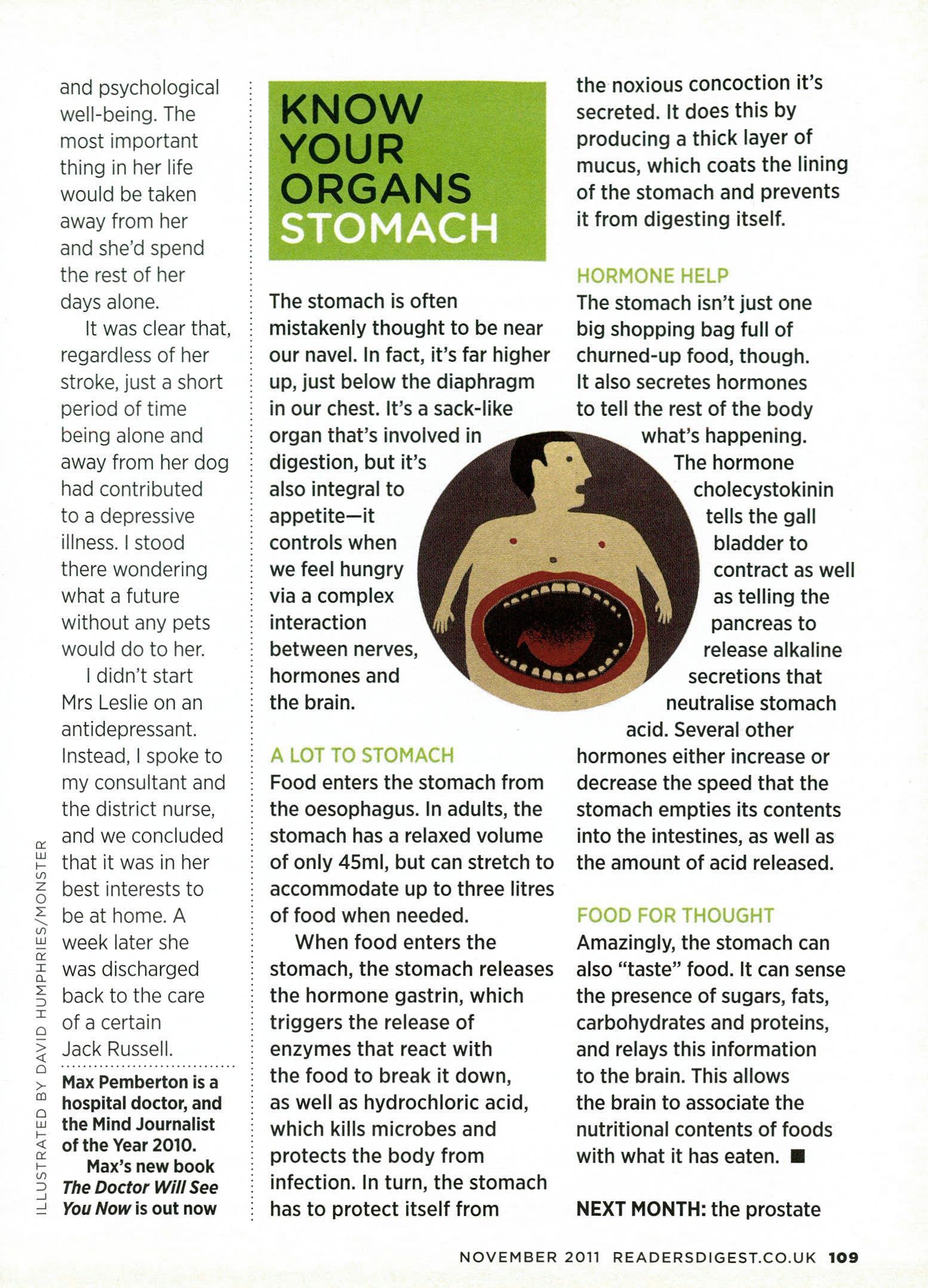
Amazingly, the stomach can also "taste" food. It can sense the presence of sugars, fats, carbohydrates and proteins, and relays this information to the brain. This allows the brain to associate the nutritional contents of foods with what it has eaten. ■
NEXT MONTH: the prostate
Ideal blood pressure is 120/80 or below —that's a top, or systolic, reading of 120mmHg (millimetres of mercury) and a bottom, diastolic, figure of 80mmHg. Over 140/90 and it's considered high. Registering in between? You could benefit from lowering your reading, too.
1.Embrace the DASH diet. The Dietary Approaches to Stop Hypertension diet is rich in fruit, vegetables, nuts, beans, seeds and low-fat dairy products. Possible drop in blood pressure: 5.5mmHg systolic, 3mmHg diastolic.
2. Get moving. Do some aerobic exercise— brisk walking, jogging,
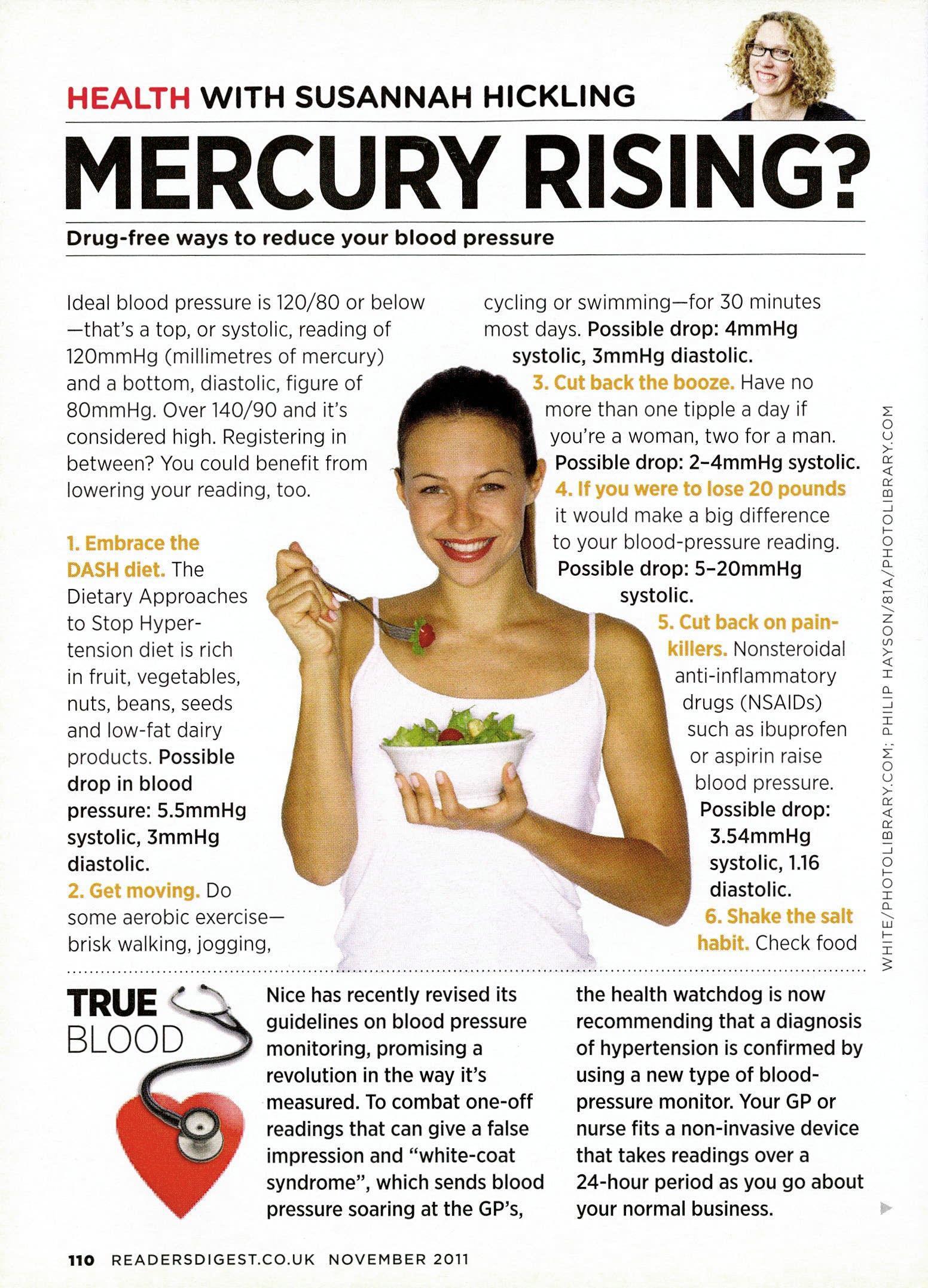
cycling or swimming—for 30 minutes most days. Possible drop: 4mmHg systolic, 3mmHg diastolic.
s. Cut back the booze. Have no more than one tipple a day if you're a woman, two for a man.
Possible drop: 2-4mmHg systolic. 4. h -
it would make a big difference to your blood-pressure reading.
Possible drop: 5-20mmHg systolic.
5. Cut back on painkillers. Nonsteroidal anti-inflammatory drugs (NSAIDs) such as ibuprofen or aspirin raise blood pressure. Possible drop: 3.54mmHg systolic, 1.16 diastolic.
6. Snake the salt habit. Check food
Nice has recently revised its guidelines on blood pressure monitoring, promising a revolution in the way it's measured. To combat one-off readings that can give a false impression and "white-coat syndrome", which sends blood pressure soaring at the GP's,
the health watchdog is now recommending that a diagnosis of hypertension is confirmed by using a new type of bloodpressure monitor. Your GP or nurse fits a non-invasive device that takes readings over a 24-hour period as you go about your normal business.

While the new name and packaging may be a little unfamiliar, what's inside won't be.Lig htsTm by TENA offers the same reassuring performance that you've grown to know, trust and rely on from TENA Lady. Giving you dryness, freshness through odour control and a feeling of confidence, just with a more discreet, feminine look. For your free sample pack of the full lightsTM by TENA range, visit lightsbytena.co.uk
labels carefully for salt content, eat fewer processed foods like chips, ready meals, bacon and ham, and don't add salt to food.
Possible drop: 2-8mmHg systolic.
7.Chomp more dark chocolate. Flavonols found in dark chocolate have been shown to lower blood pressure in people with hypertension.
Possible drop: 5mmHg systolic.
8. Invest in a home bloodpressure monitor. Research found that people had lower readings when they took their own blood pressure at home.
Possible drop: 4.2mmHg systolic, 2.4mmHg diastolic. Sit quietly for five minutes with your feet on the floor before having your blood pressure taken at the doctor's.
Possible drop: 14mmHg systolic.
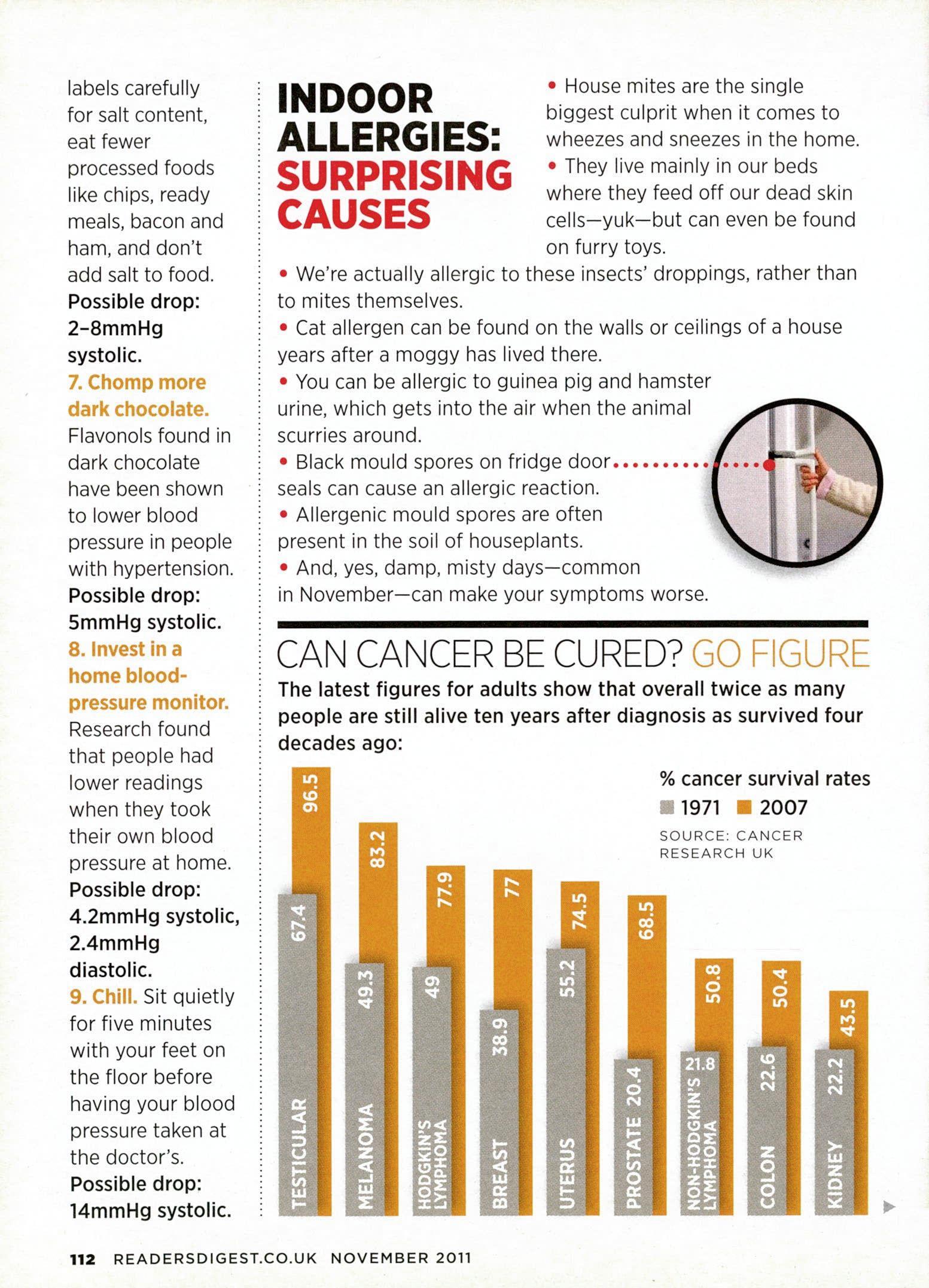
• House mites are the single biggest culprit when it comes to wheezes and sneezes in the home.
• They live mainly in our beds where they feed off our dead skin cells—yuk—but can even be found on furry toys.
• We're actually allergic to these insects' droppings, rather than to mites themselves.
• Cat allergen can be found on the walls or ceilings of a house years after a moggy has lived there.
• You can be allergic to guinea pig and hamster urine, which gets into the air when the animal scurries around.
• Black mould spores on fridge door seals can cause an allergic reaction.
• Allergenic mould spores are often present in the soil of houseplants.
• And, yes, damp, misty days—common in November—can make your symptoms worse.
The latest figures for adults show that overall twice as many people are still alive ten years after diagnosis as survived four decades ago:
% cancer survival rates
• 1971 • 2007
SOURCE: CANCER RESEARCH UK
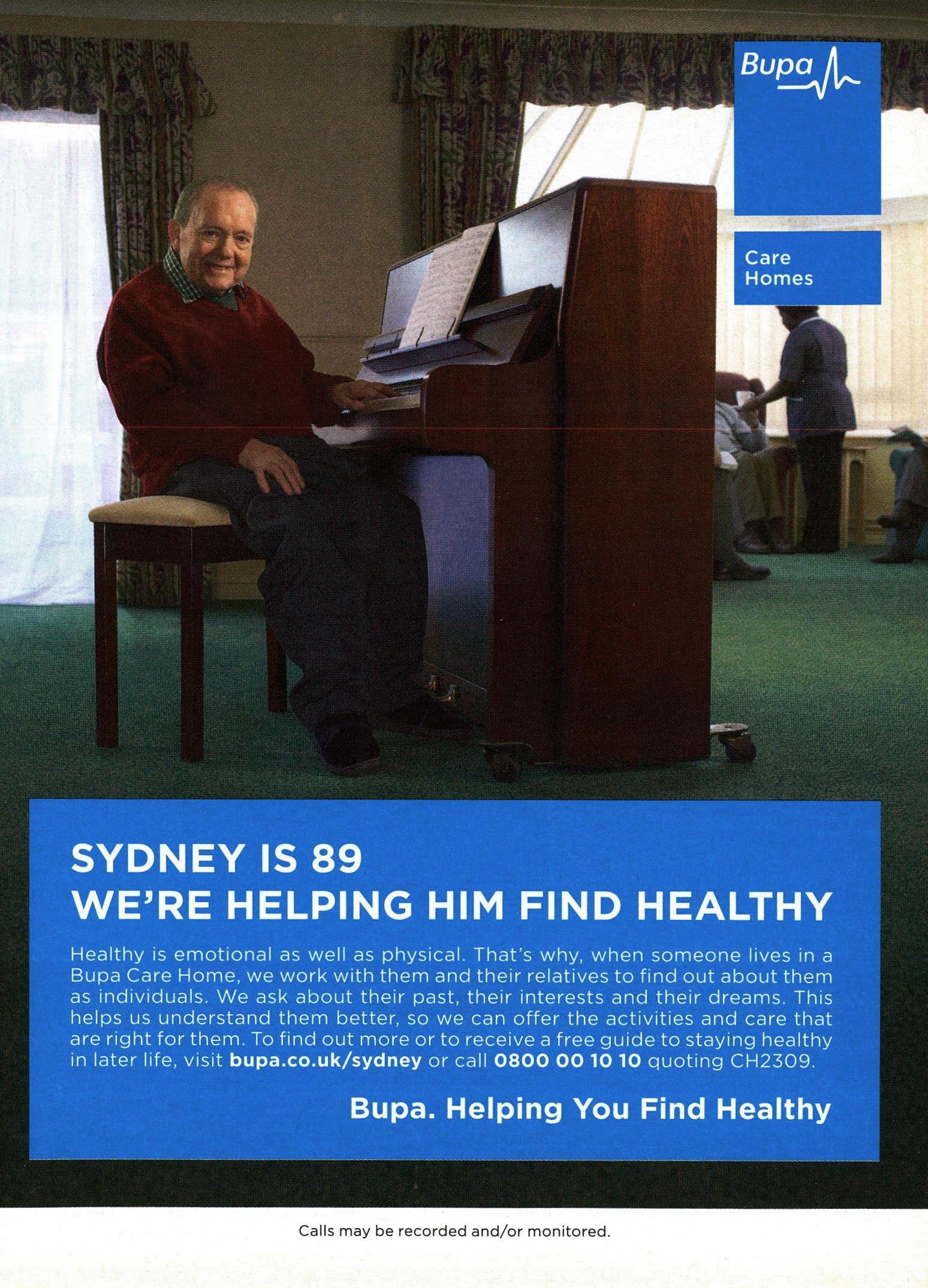
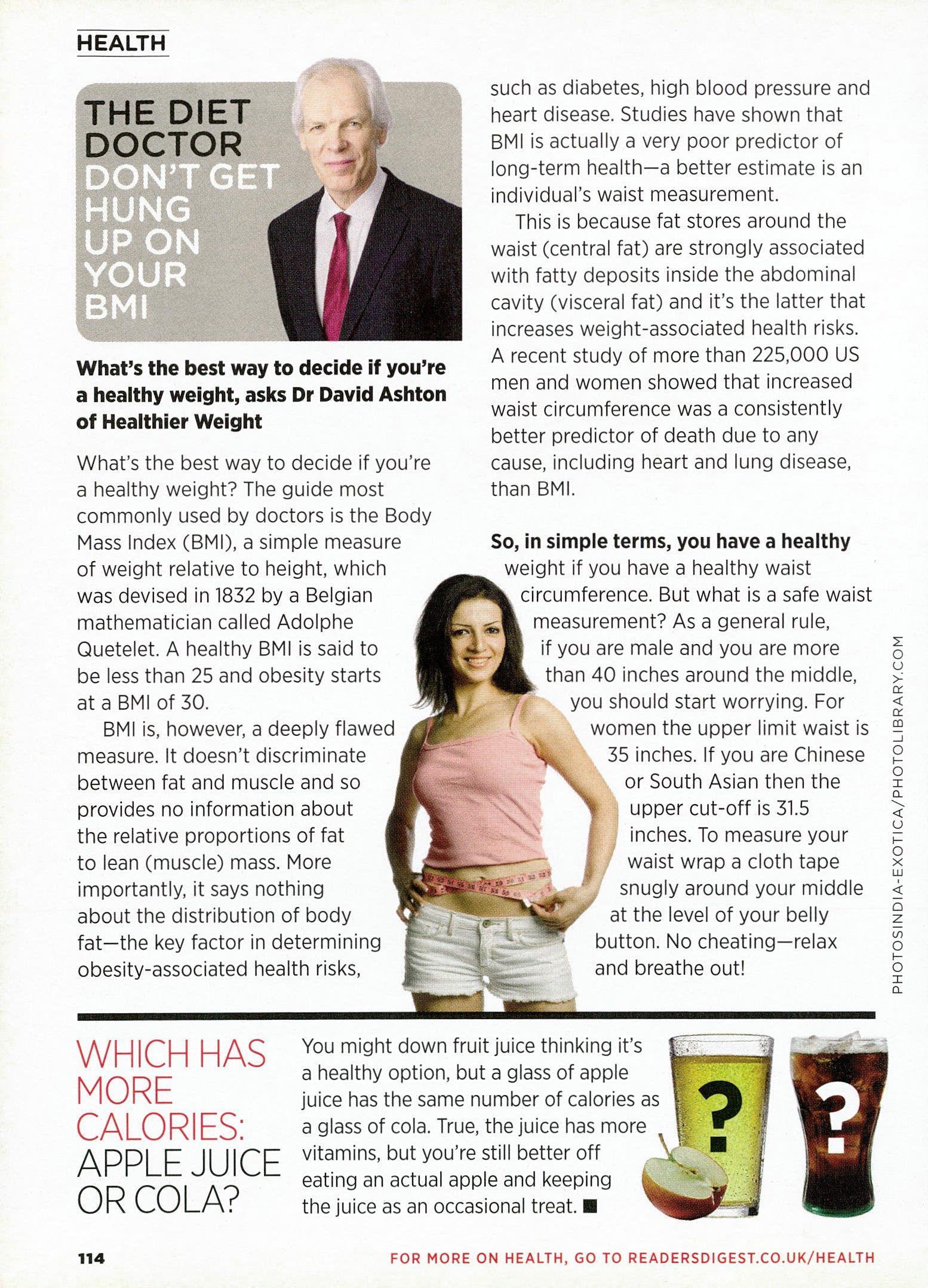
What's the best way to decide if you're a healthy weight, asks Dr David Ashton of Healthier Weight
What's the best way to decide if you're a healthy weight? The guide most commonly used by doctors is the Body Mass Index (BMI), a simple measure of weight relative to height, which was devised in 1832 by a Belgian mathematician called Adolphe Quetelet. A healthy BMI is said to be less than 25 and obesity starts at a BMI of 30.
BMI is, however, a deeply flawed measure. It doesn't discriminate between fat and muscle and so provides no information about the relative proportions of fat to lean (muscle) mass. More importantly, it says nothing about the distribution of body fat—the key factor in determining obesity-associated health risks,
such as diabetes, high blood pressure and heart disease. Studies have shown that BMI is actually a very poor predictor of long-term health—a better estimate is an individual's waist measurement.
This is because fat stores around the waist (central fat) are strongly associated with fatty deposits inside the abdominal cavity (visceral fat) and it's the latter that increases weight-associated health risks. A recent study of more than 225,000 US men and women showed that increased waist circumference was a consistently better predictor of death due to any cause, including heart and lung disease, than BMI.
So, in simple terms, you have a healthy weight if you have a healthy waist circumference. But what is a safe waist measurement? As a general rule, if you are male and you are more than 40 inches around the middle, you should start worrying. For women the upper limit waist is 35 inches. If you are Chinese or South Asian then the upper cut-off is 31.5 inches. To measure your waist wrap a cloth tape snugly around your middle at the level of your belly button. No cheating—relax and breathe out!
You might down fruit juice thinking it's a healthy option, but a glass of apple juice has the same number of calories as a glass of cola. True, the juice has more vitamins, but you're still better off eating an actual apple and keeping the juice as an occasional treat. ■

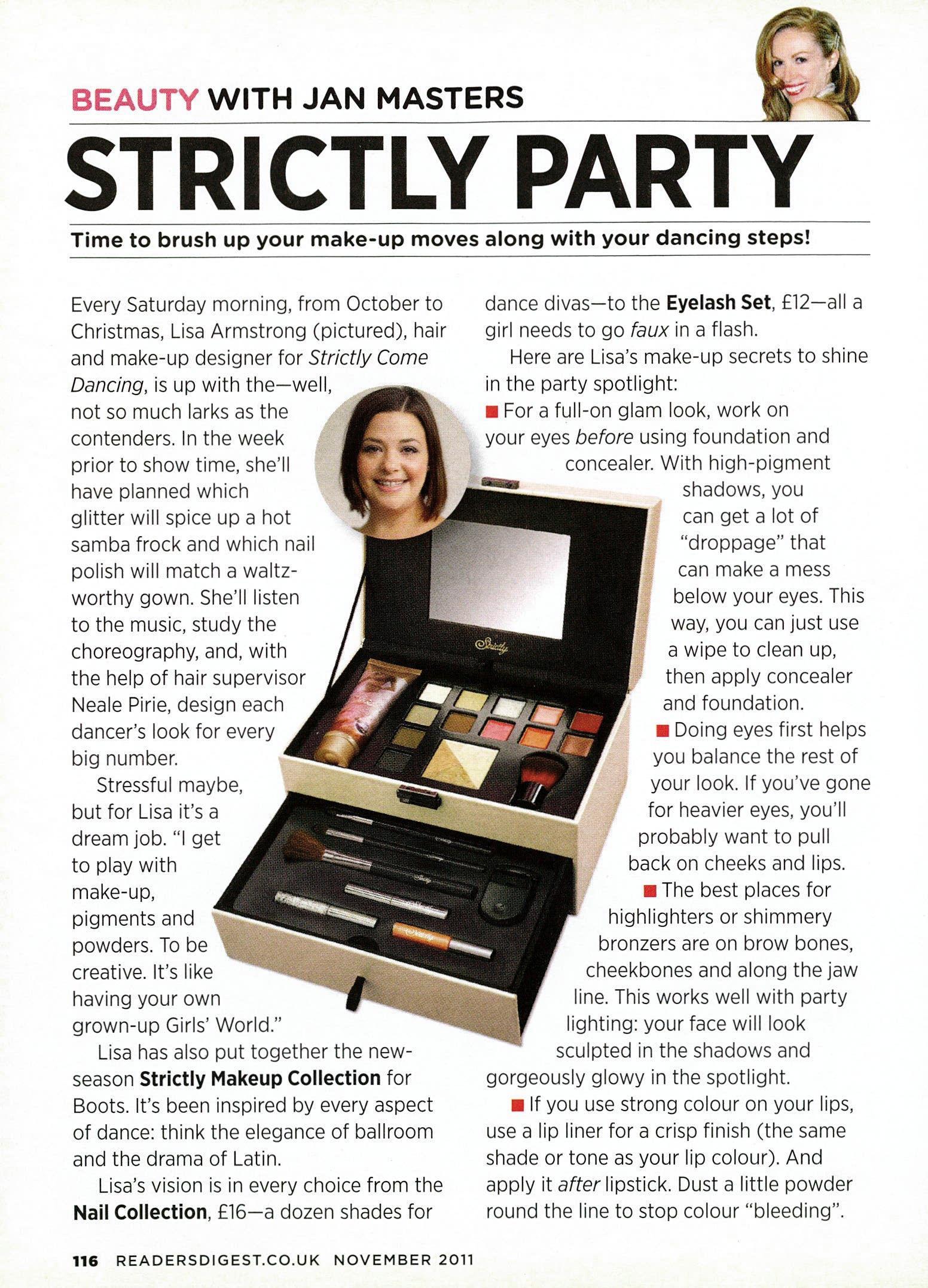
Time to brush up your make-up moves along with your dancing steps!
Every Saturday morning, from October to Christmas, Lisa Armstrong (pictured), hair and make-up designer for Strictly Come Dancing, is up with the—well, not so much larks as the contenders. In the week prior to show time, she'll have planned which glitter will spice up a hot samba frock and which nail polish will match a waltzworthy gown. She'll listen to the music, study the choreography, and, with the help of hair supervisor Neale Pirie, design each dancer's look for every big number.
Stressful maybe, but for Lisa it's a dream job. "I get to play with make-up, pigments and powders. To be creative. It's like having your own grown-up Girls' World."
Lisa has also put together the newseason Strictly Makeup Collection for Boots. It's been inspired by every aspect of dance: think the elegance of ballroom and the drama of Latin.
Lisa's vision is in every choice from the Nail Collection, E16—a dozen shades for
dance divas—to the Eyelash Set, £12—all a girl needs to go faux in a flash.
Here are Lisa's make-up secrets to shine in the party spotlight:
■ For a full-on glam look, work on your eyes before using foundation and concealer. With high-pigment shadows, you can get a lot of "droppage" that can make a mess below your eyes. This way, you can just use a wipe to clean up, then apply concealer and foundation.
■ Doing eyes first helps you balance the rest of your look. If you've gone for heavier eyes, you'll probably want to pull back on cheeks and lips.
■ The best places for highlighters or shimmery bronzers are on brow bones, cheekbones and along the jaw line. This works well with party lighting: your face will look sculpted in the shadows and gorgeously glowy in the spotlight.
■ If you use strong colour on your lips, use a lip liner for a crisp finish (the same shade or tone as your lip colour). And apply it after lipstick. Dust a little powder round the line to stop colour "bleeding".
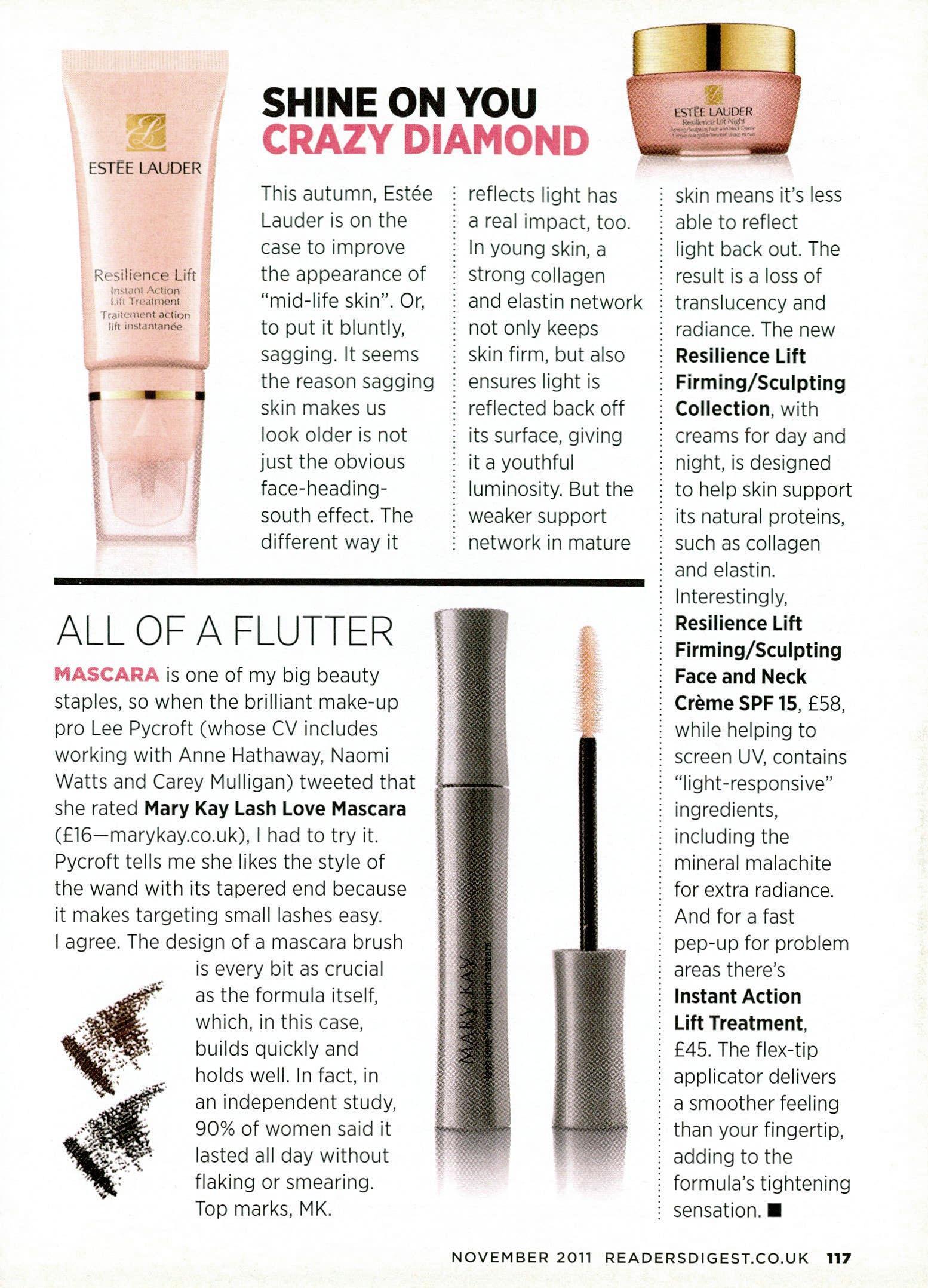
This autumn, Estee Lauder is on the case to improve the appearance of "mid-life skin". Or, to put it bluntly, sagging. It seems the reason sagging skin makes us look older is not just the obvious face-headingsouth effect. The different way it
MASCARA is one of my big beauty staples, so when the brilliant make-up pro Lee Pycroft (whose CV includes working with Anne Hathaway, Naomi Watts and Carey Mulligan) tweeted that she rated Mary Kay Lash Love Mascara (£16—marykay.co.uk), I had to try it. Pycroft tells me she likes the style of the wand with its tapered end because it makes targeting small lashes easy. I agree. The design of a mascara brush is every bit as crucial as the formula itself, which, in this case, builds quickly and holds well. In fact, in an independent study, 90% of women said it lasted all day without flaking or smearing. Top marks, MK.
reflects light has a real impact, too. In young skin, a strong collagen and elastin network not only keeps skin firm, but also ensures light is reflected back off its surface, giving it a youthful luminosity. But the weaker support network in mature
skin means it's less able to reflect light back out. The result is a loss of translucency and radiance. The new Resilience Lift
Firming/Sculpting Collection, with creams for day and night, is designed to help skin support its natural proteins, such as collagen and elastin.
Interestingly, Resilience Lift
Firming/Sculpting Face and Neck
Crème SPF 15, £58, while helping to screen UV, contains "light-responsive" ingredients, including the mineral malachite for extra radiance. And for a fast pep-up for problem areas there's Instant Action Lift Treatment, £45. The flex-tip applicator delivers a smoother feeling than your fingertip, adding to the formula's tightening sensation. •
As consumer heroes go, the Chicago gangster Al Capone is as unlikely as they come. But his contribution is perhaps the most significant input to food-andhygiene safety in the last 80 years. Although "Scarface" made his reputation through his flagrant flouting of the Prohibition laws of the 1920s and 30s (a consumer campaign, of sorts), it's his role in the creation of "use-by" labels that he should be most celebrated for. Capone's childhood memories in Brooklyn—drinking sour milk in the pre-refrigeration era—drove him to get the Windy City burghers to introduce milk labelling, requiring an expiration stamp on all milk containers.
Milk supply was a shady racket, and the gangster's Robin Hood sensibilities were stirred by cases of children falling ill on adulterated and expired milk. Naturally, he also had a monopoly on the stamping equipment, enabling him to corner the milk market. Nonetheless, we should remember his gift to us on every supermarket visit. A good egg, after all!
Talking of eggs, how can you tell a good egg from a bad one? Unlike most perishable food stuffs (which become dangerous to eat after time, and are required by law to have a use-by date), eggs are required to have a "best-before"
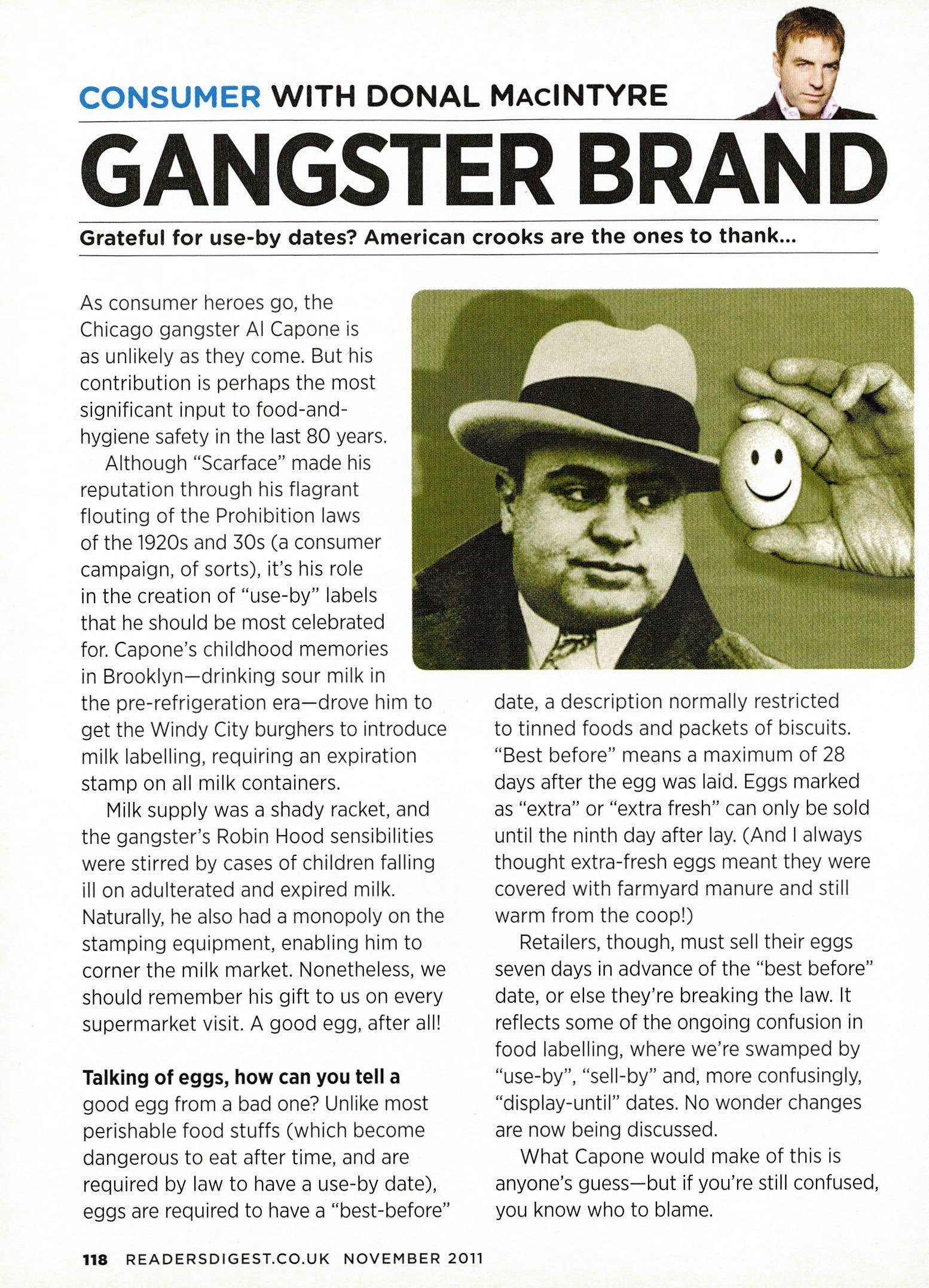
date, a description normally restricted to tinned foods and packets of biscuits. "Best before" means a maximum of 28 days after the egg was laid. Eggs marked as "extra" or "extra fresh" can only be sold until the ninth day after lay. (And I always thought extra-fresh eggs meant they were covered with farmyard manure and still warm from the coop!)
Retailers, though, must sell their eggs seven days in advance of the "best before" date, or else they're breaking the law. It reflects some of the ongoing confusion in food labelling, where we're swamped by "use-by", "sell-by" and, more confusingly, "display-until" dates. No wonder changes are now being discussed.
What Capone would make of this is anyone's guess—but if you're still confused, you know who to blame.
Donal answers your questions. Please email queries to excerpts @readers digest. co.uk

Donal MacIntyre is an investigative journalist and a former presenter of ITV's London Tonight
QCan I get compensation if my Christmas card arrives late, despite ample delivery time for a first-class stamp?
A I've received plenty of complaints over the years because I post all mine in the new year. But if a card of yours arrives late and you have a valid address and proof of postage (which should mean your letter was the correct weight), then yes, you should get compensation— though sadly only for the cost of the stamp.
QI'm 45 and greying at the temples. Can I legally be banned from joining an 18-30 holiday?
AAccording to new legislation, it is lawful to discriminate on the basis of age. Last year's Equality Act allows holiday companies to market and run holidays for specific age groups, despite the unfair nature of the arbitrary age restrictions. (Thank goodness, says this happy camper!)
Aside from the peanut-butter warning that "this product may contain nuts", here are some of my other favourites:
On a telephone directory: please don't use this while driving.
On a motorboat engine: never use a match to check fuel level.
On a washing appliance: don't clean your children in the machine.
On a mattress: don't attempt to swallow.
On insecticide: this substance may be harmful to insects.
On a mobile phone: don't dry this in a microwave.
On a recent visit to a mattress supplier, I was treated to some very curious facts about beds, life and marriage. Typically, we start out with a standard three-footwide single bed, but as we cohabit and move into a double, we lose a bit of our own space in a shared fourfoot-six-inch-wide standard double. According to my bedroom expert, the longer people are married, the more likely they are to strive to reclaim their three feet of personal space with a five-foot king size, or even a six-foot super king (which, divided equally, is as close to divorce as you can get in the same room).
As we get older still, couples usually replace the king size with two single beds. This, I'm told by my mattress man, is the real cycle of life. •
make your money
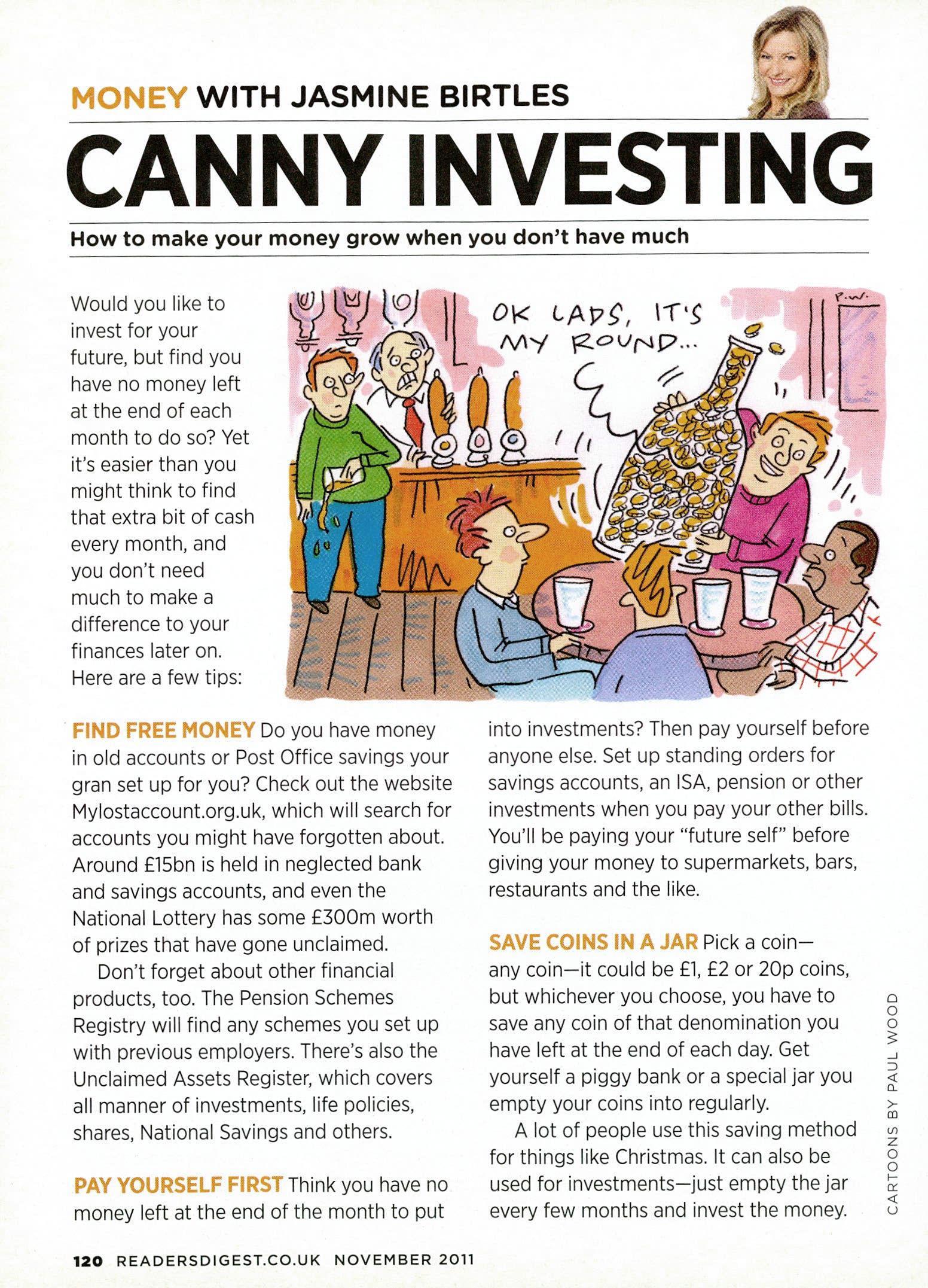
Would you like to invest for your future, but find you have no money left at the end of each month to do so? Yet it's easier than you might think to find that extra bit of cash every month, and you don't need much to make a difference to your finances later on.
Here are a few tips:
FIND FREE MONEY Do you have money in old accounts or Post Office savings your gran set up for you? Check out the website Mylostaccount.org.uk, which will search for accounts you might have forgotten about. Around £15bn is held in neglected bank and savings accounts, and even the National Lottery has some £300m worth of prizes that have gone unclaimed. Don't forget about other financial products, too. The Pension Schemes Registry will find any schemes you set up with previous employers. There's also the Unclaimed Assets Register, which covers all manner of investments, life policies, shares, National Savings and others.
PAY YOURSELF FIRSTThink you have no money left at the end of the month to put
into investments? Then pay yourself before anyone else. Set up standing orders for savings accounts, an ISA, pension or other investments when you pay your other bills. You'll be paying your "future self" before giving your money to supermarkets, bars, restaurants and the like.
SAVE COINS IN A JAR Pick a coin— any coin—it could be £1, £2 or 20p coins, but whichever you choose, you have to save any coin of that denomination you have left at the end of each day. Get yourself a piggy bank or a special jar you empty your coins into regularly.
A lot of people use this saving method for things like Christmas. It can also be used for investments—just empty the jar every few months and invest the money.

ROUND UP A POUND When you're in the supermarket, if the bill comes to an odd number, for example, £21.67, round up that pound and put 33p into your savings jar. If you do that each week, at the end of the month you'll have at least a few pounds to put into a pension, ISA, bond or any other long-term investment that will really make your money grow.
USE YOUR CHILD BENEFIT If you want to invest for your children (say, in a Junior ISA—see right), but you don't know where you'll find the money, see if you can manage without your child benefit. If you have one child and you put £20.30 (the weekly rate for the eldest child) into a stocks and shares Junior ISA every week, after 18 years, assuming 6% growth, your child will have around £28,000.
There's a new savings account for kids available now. It's the Junior ISA and you can save up to £3,600 a year, tax-free, on your child's behalf in it. Thanks to the effects of compound interest, if you contribute the maximum amount each year, your child could have over £95,000 by the time they reach 18!
Who's eligible? Any child under 18 born before September 2002, along with babies born on or after January 3, 2011.
Junior ISAs replace the Child Trust Fund (CTF), which was for children born between September 1, 2002, and January 2, 2011. You can still apply for a CTF if your child was born between these dates. If you already have a CTF for your child, you'll keep this instead, and your investment limits will be increased to £3,600 a year (tax-free).
■ How does it work?All you have to do is find the best ISA for your child and invest a minimum of £1 for cash ISAs and £10 for stocks and shares ISAs. You can have more than one ISA, but the total you invest can't be more than £3,600 per tax year.
The account will be managed by a named individual with parental responsibility for the child, but this responsibility can be transferred (in the event of a death or divorce).
Where should you put the money? I'd go for a Junior Stocks and Shares ISA if your child is under 12. That way, you could make the most of the average growth of the stock market over time. If your child is over 12, it's best to go with a cash ISA—it's safer in the short term.
Danny Cox, head of advice at financial planning company Hargreaves Lansdown, believes the rewards of a stocks and shares Junior ISA could be huge: "Save £3,600 in a Junior Stocks and Shares ISA every year from birth until age 18 and your child's coming-of-age present could be £95,730 tax-free, assuming 6% growth after charges."
According to Barclays 2011 Equity and Gilt Study, there is a 99% probability of stock markets outperforming cash savings over a period of 18 years.
Get 50% off stylish underwear—for November only —at Lingerie Please. There's a fabulous selection of lacy lingerie that would make great Christmas gifts. For details, go to readersdigest. co.uk/magazine.

Mc
sect., are a type of investment based on the interest paid on mortgages. These mortgages are packaged up by banks and offered to investors, who will profit from part of the mortgageinterest payments. By selling off these mortgages in the form of a security, the banks then get more money to lend to more homeowners.
November is Make a Will Month, and it's an important reminder because one in three Brits die intestate (they don't have a will). Not only does this mean millions going to the Government rather than your loved ones, but it also costs families a lot of money, and often heartache, as they try to sort out the legalities.
-)0 I NEED TO MAKE A WILL?
If you have any property at all, and certainly if you have
dependants or friends you want to help, then yes, you should. Here's why:
• You can decide how your assets are divided. If you die intestate, the law decides, and this can be harsh on your loved ones
• If you're unmarried or not in a civil partnership, your partner won't inherit from you unless you've included them in your will
• In the event of divorce or dissolution of a civil
1-1HI4MMM, NO V\1 WHO SHALL, I l,ANIC /0/"T.'/A-re ?.. C514 HELLO THERE -T/gOLES
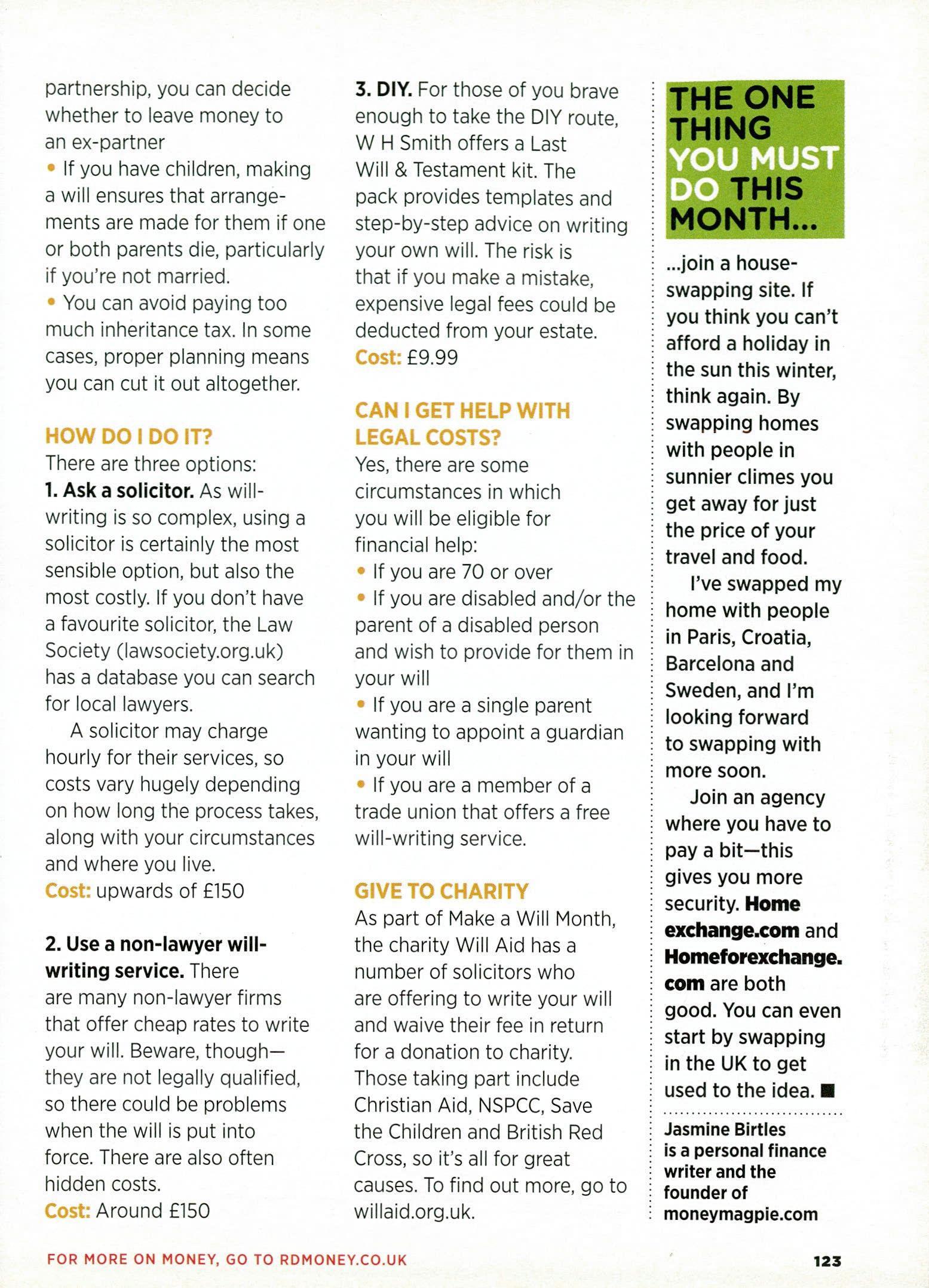
partnership, you can decide whether to leave money to an ex-partner
• If you have children, making a will ensures that arrangements are made for them if one or both parents die, particularly if you're not married.
• You can avoid paying too much inheritance tax. In some cases, proper planning means you can cut it out altogether.
There are three options:
1.Ask a solicitor. As willwriting is so complex, using a solicitor is certainly the most sensible option, but also the most costly. If you don't have a favourite solicitor, the Law Society (lawsociety.org.uk) has a database you can search for local lawyers.
A solicitor may charge hourly for their services, so costs vary hugely depending on how long the process takes, along with your circumstances and where you live.
Co upwards of £150
2. Use a non-lawyer willwriting service. There are many non-lawyer firms that offer cheap rates to write your will. Beware, though— they are not legally qualified, so there could be problems when the will is put into force. There are also often hidden costs.
Cost: Around £150
3. DIY. For those of you brave enough to take the DIY route, W H Smith offers a Last Will & Testament kit. The pack provides templates and step-by-step advice on writing your own will. The risk is that if you make a mistake, expensive legal fees could be deducted from your estate.
Cost: £9.99
Yes, there are some circumstances in which you will be eligible for financial help:
• If you are 70 or over
• If you are disabled and/or the parent of a disabled person and wish to provide for them in your will
• If you are a single parent wanting to appoint a guardian in your will
• If you are a member of a trade union that offers a free will-writing service.
As part of Make a Will Month, the charity Will Aid has a number of solicitors who are offering to write your will and waive their fee in return for a donation to charity. Those taking part include Christian Aid, NSPCC, Save the Children and British Red Cross, so it's all for great causes. To find out more, go to willaid.org.uk.
...join a houseswapping site. If you think you can't afford a holiday in the sun this winter, think again. By swapping homes with people in sunnier climes you get away for just the price of your travel and food. I've swapped my home with people in Paris, Croatia, Barcelona and Sweden, and I'm looking forward to swapping with more soon. Join an agency where you have to pay a bit—this gives you more security. Home exchange.com and Homeforexchange. com are both good. You can even start by swapping in the UK to get used to the idea. II Jasmine Birtles is a personal finance writer and the founder of moneymagpie.com
Master the art of reduction with this hearty pork dish for November nights
Cruising the ocean waves is sensational —not just because I have links with a cruise company and an on-board restaurant. Perish the thought. There's something timeless about the whole experience—cutting yourself off from the rest of the world and cocooning yourself in luxury; going to bed at night and waking up in a different country.
I never thought I'd say such a thing, but I know that loads of like-minded people are reaching the same conclusion. Try it and you'll be smitten.
On a cruise earlier this year I got into animated conversation with an American passenger about sauce reduction. She wanted a dish that was simple enough for her to concentrate on the reduction part of the process. This is it, and I want you to try it, too.
Port makes for a perfect syrupy base, which blends beautifully with the prune juice. Most of the alcohol evaporates and you're left with the rich flavour of sweetened grapes. I promise that once you've mastered this dish you'll serve it again and again.
It's a superb, warming, hearty recipe for November, which I find the most depressing month of the year, with lots of winter and dark nights ahead. An ideal month to take a cruise, in fact.
Marco Pierre White, the "godfather"of modern British cooking, is a restaurateur and TV personality.
4)
2 double chops (4 chops joined into 2)
Clarified butter (or extra-virgin olive oil)
200ml port
200ml prune juice
2dsps double cream
2tsps Knorr concentrated chicken stock
100g bacon lardons 12 prunes
1.Preheat oven to 320F/160C/Gas
Mark 2-3
2. Brown the chops in a pan of hot butter. Transfer to an oven dish and roast for 30-40 mins, then remove the meat and let it
rest for 10 mins.
3. Meanwhile, boil the port in a saucepan until it has thickened and reduced down to a teaspoon of syrup. Add the prune juice, cream and chicken stock. Continue to boil for a few minutes until the sauce reduces by about half.
4. Fry the bacon and prunes in butter. Take a spoonful of the fat from the bacon and add to the sauce.
S. Carve the chops into 4, then add the sauce, prunes and bacon. ■
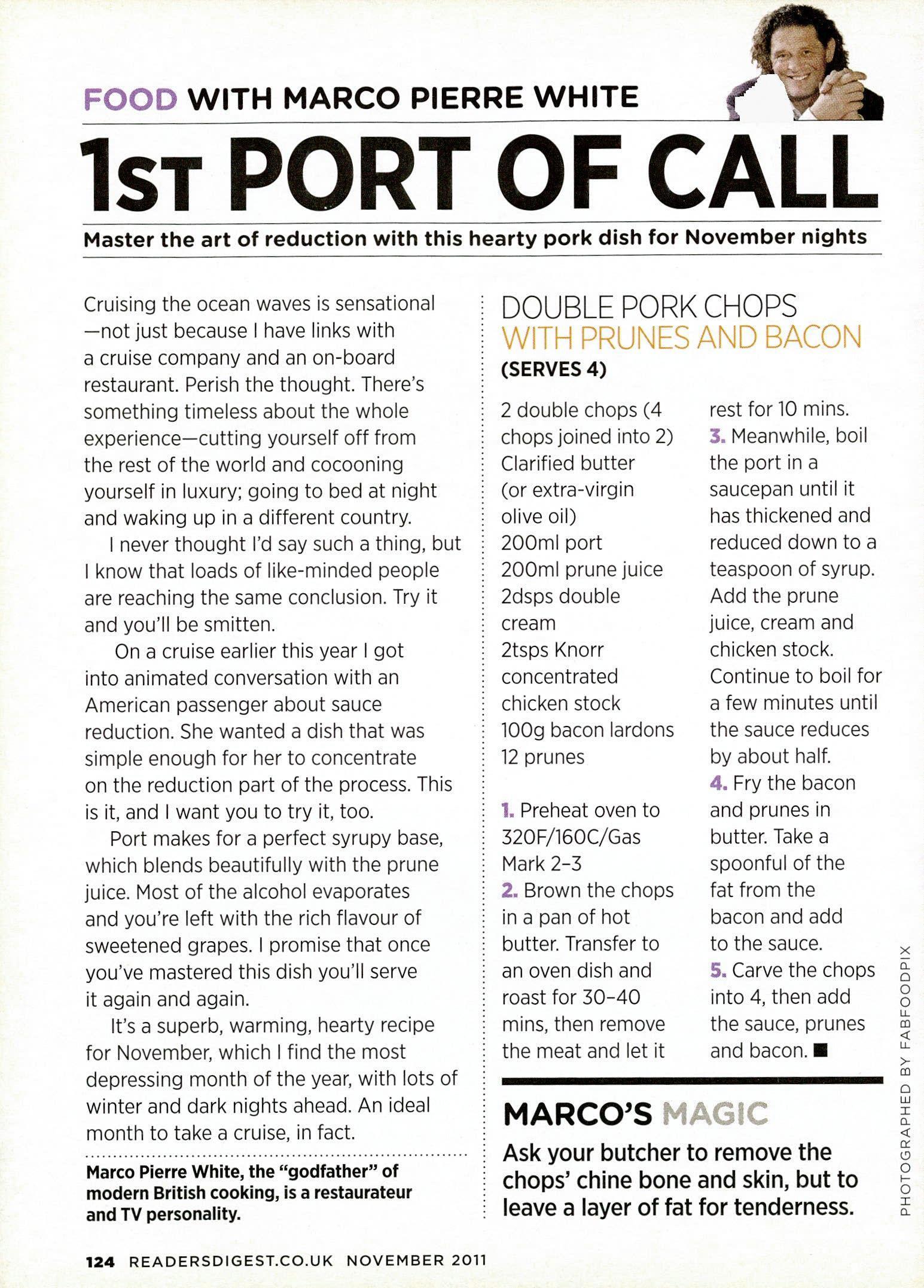
MARCO'S
Ask your butcher to remove the chops' chine bone and skin, but to leave a layer of fat for tenderness.
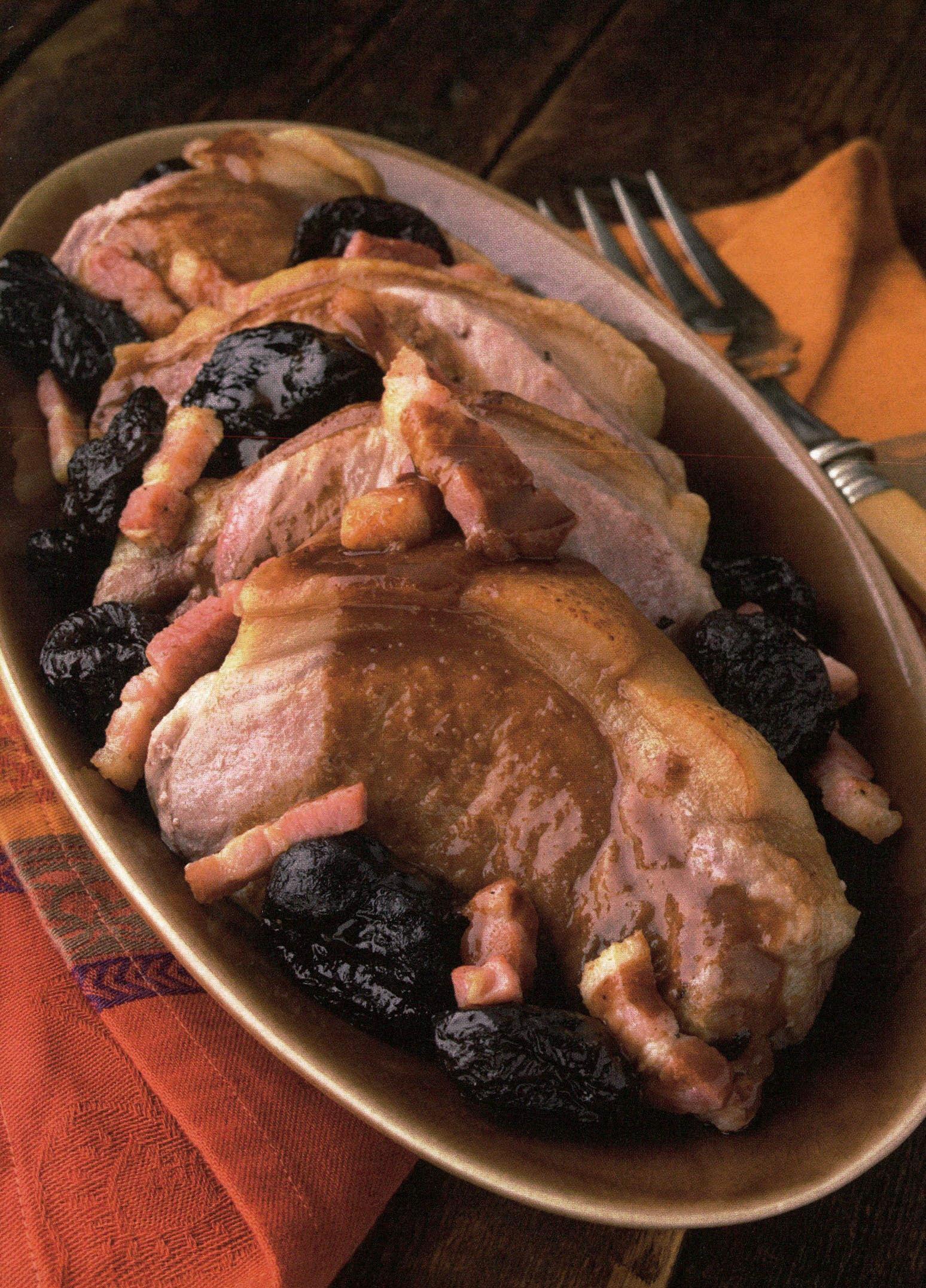
Starting to feel the chill? Make yours a Benny & Hot!
Equal parts Benedictine and hot water, a "Benny & Hot" is a favourite of the residents of Burnley in Lancashire—the birthplace of many soldiers from the East Lancashire Regiment during the First World War. You can imagine them in the winter of 1918, freezing in the trenches, seeking solace in a spicy, honeyed mouthful of Benedictine, savouring its mint-choc-chip finish.
As with many spirits, it was created by monks— in this case Don Bernardo Vincelli, from the Benedictine Abbey of Fecamp on the Normandy coast, in 1510.
Twenty-seven different herbs and spices are used in the recipe, including thyme, cinnamon, coriander, saffron, pine, nutmeg, and tea! Sipped as a posh, post-dinner digestif, it's also great with ice, or mixed with tonic, soda or cola.
Many miners regarded it as a cure for rheumatism—at one time Burnley Miners' Social Club sold more "Berle" than anywhere else in Britain—in fact a third of the UK's Benedictine consumption still takes place in Burnley and its surrounds.
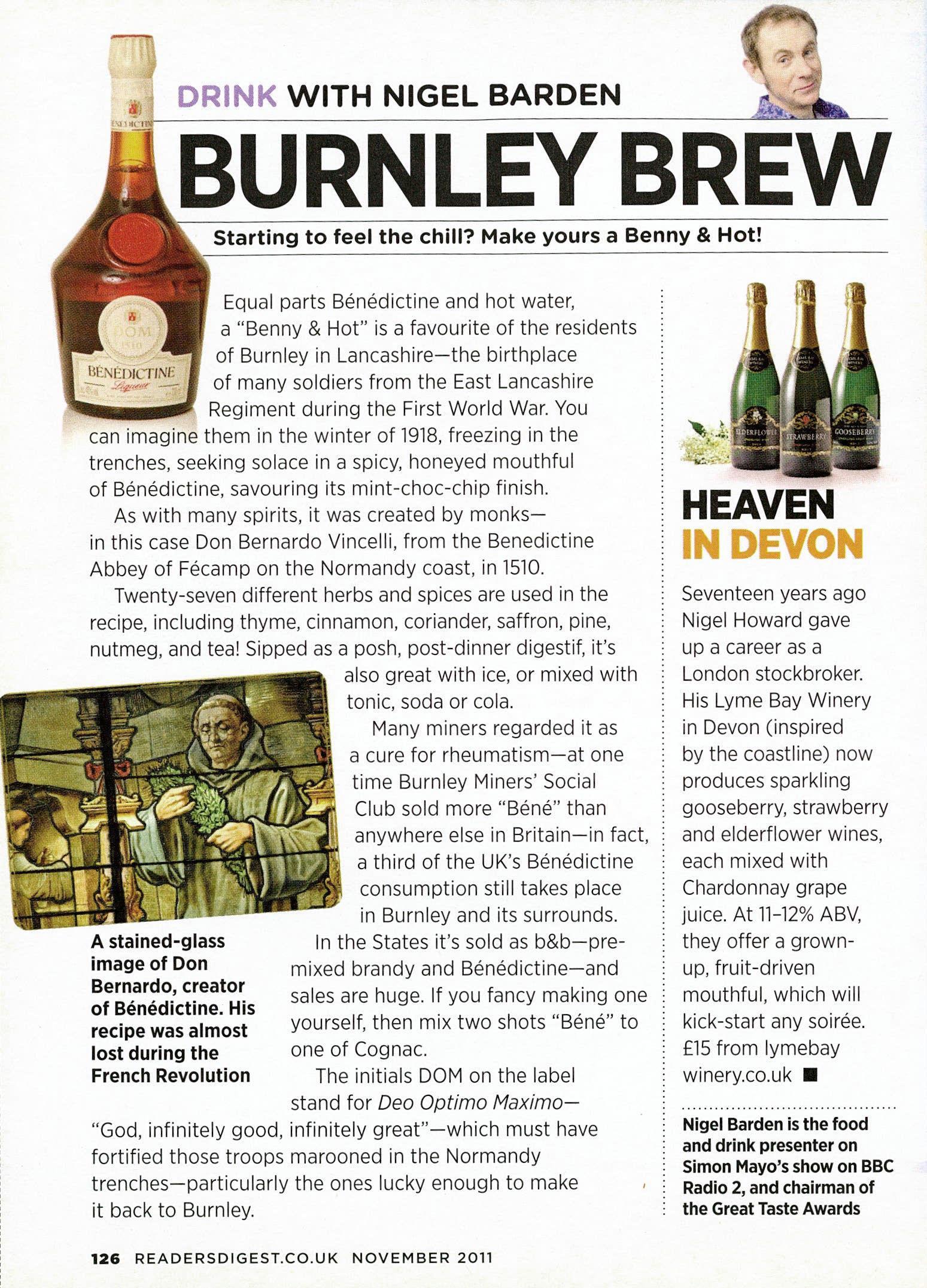
A stained-glass image of Don Bernardo, creator of Benedictine. His recipe was almost lost during the French Revolution
In the States it's sold as b&b—premixed brandy and Benedictine—and sales are huge. If you fancy making one yourself, then mix two shots "Berle" to one of Cognac.
The initials DOM on the label stand for Deo Optimo Maximo— "God, infinitely good, infinitely great"—which must have fortified those troops marooned in the Normandy trenches—particularly the ones lucky enough to make it back to Burnley.
Seventeen years ago Nigel Howard gave up a career as a London stockbroker. His Lyme Bay Winery in Devon (inspired by the coastline) now produces sparkling gooseberry, strawberry and elderflower wines, each mixed with Chardonnay grape juice. At 11-12% ABV, they offer a grownup, fruit-driven mouthful, which will kick-start any soirée. £15 from lymebay winery.co.uk ■
Nigel Barden is the food and drink presenter on Simon Mayo's show on BBC Radio 2, and chairman of the Great Taste Awards

How can you stop gardens looking so drab throughout winter?
My garden is starting to look rather bare. What can I grow for winter colour?
ATurn to foliage instead of flowers—there's a host of yellow, cream and red variegated evergreens to choose from. Don't overdo it, though, as they may be less welcome during the warmer parts of the year, especially the more vigorous ones. Plants that hold their berries into winter are a good choice, and eventually feed the birds—yellowberried ones often last longer than red, as the birds wait for them to ripen. Early-flowering bulbs such as crocus and snowdrops brighten up late winter. And winterflowering pansies bloom with colour in milder periods.
Attractive in winter: yellowberried pyracantha

I have an old vine on a wall that usually crops well. But this year it wilted, went brown, withered away, and is now almost
dead. Should I dig it out? And can I put another in its place?
AThis could have been severe frost damage, and it hasn't recovered because it's worn out (unlikely for a vine). Or an inadvertent dose of herbicide might be the cause —vines are very susceptible. Accidental or rodent damage, ringing the bark right around, or even a tie constricting the trunk could kill the top, but any healthy vine would soon grow again from lower down.
Maybe vine weevils have eaten the roots—look for
notched edges to leaves on plants nearby. It's also possible the roots were destroyed by some sort of disease, or simply drowned. Whatever the case, leave the old one until certainly dead and plant another as far away as practical. I find reliable, tasty ones are Siegerrebe, a Muscat-flavoured gem, and Boskoop Glory, a succulent black.
Last winter my cabbages were killed by the cold. How do I stop that happening again?
ASummer- and autumn-maturing cabbages can stay outdoors only until the hard frosts. Winter types survive most of the season, particularly those with Savoy genes that usually have wrinkled leaves. But, unprotected, even these can't endure the lowest temperatures. You can leave them in the ground and insulate each one with a bin bag slipped round and tied in place. Better still, tidy the whole bed and pack about and over with dry straw, shredded paper, bracken or similar, ending with a plastic sheet tied on top. This keeps them fresh, but also prone to slug damage—and they won't survive the coldest weather if it lasts for weeks.
To protect against the worst, you'll need to harvest, trim and store them in a cool, frost-free and rodent-proof place (a dead refrigerator in a shed works well). Or lift, roots and all, and hang upside down in a cool area. Traditionally, gardeners would dig a trench and hang the cabbages by their roots under boards, which were then earthed, turfed and covered in straw.
Bob Flowerdew is an organic gardener and a regular on BBC Radio 4's Gardeners' Question Time. Send your gardening questions to Bob at excerpts@readersdigest.co.uk.
Batten down the as they're said hatches, check to help them, ties, stakes and though the crops supports, and put are a fiddle to under cover every- get up. thing not needed And you can during winter. plant shrubs, You can still trees, vines and plant garlic cloves bushes when—not just in the ever the ground veg plot but even is not frozen under your roses, or waterlogged.
If you have trouble trimming your hedge to a uniform level, just use a series of five-foot-long canes as guides. Simply push them through the hedge at the same height it needs to be trimmed. •
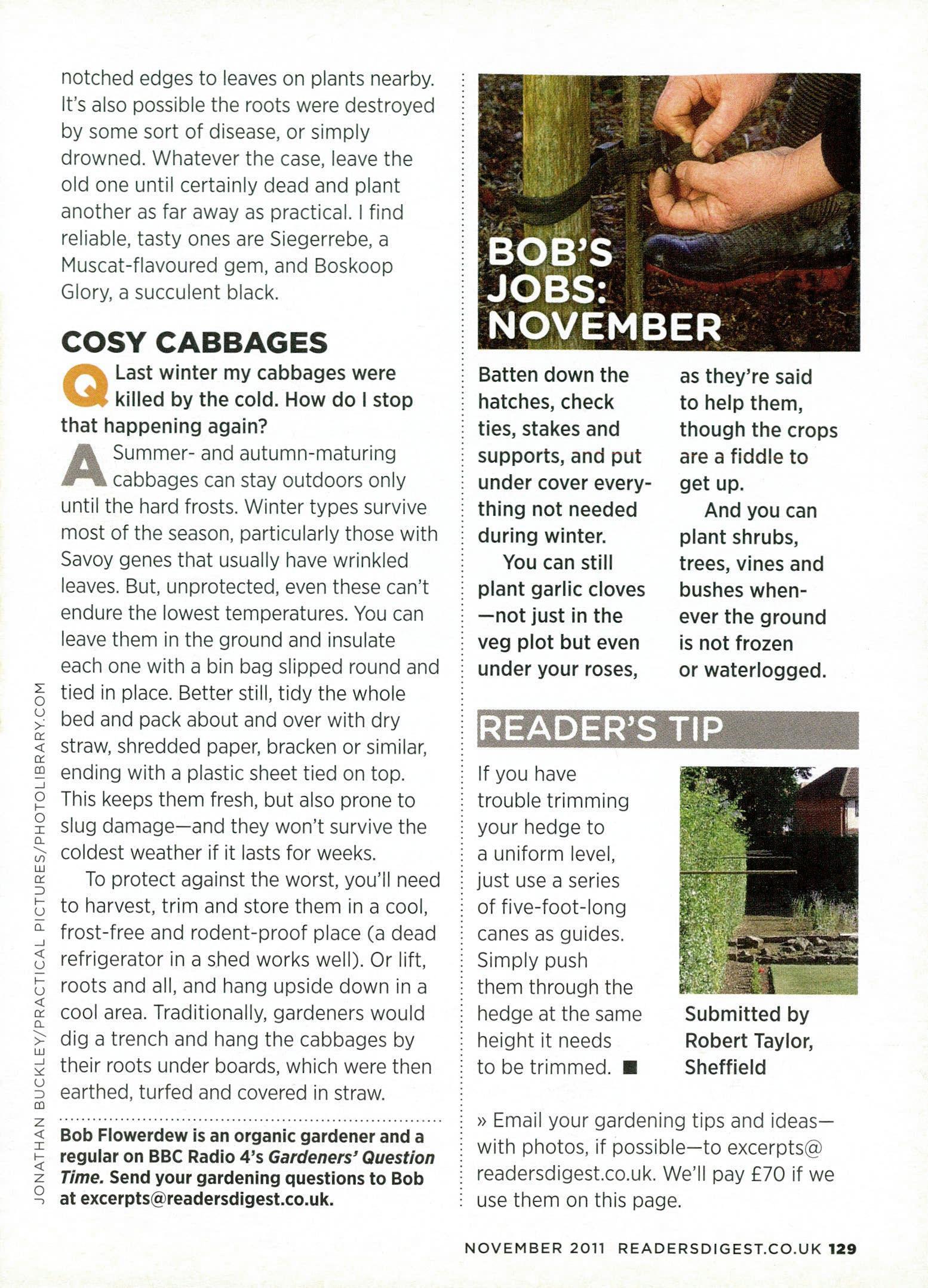
Submitted by Robert Taylor, Sheffield
» Email your gardening tips and ideas— with photos, if possible—to excerpts@ readersdigest.co.uk. We'll pay £70 if we use them on this page.
The romantic swan who came to Britain—and found it hard to leave
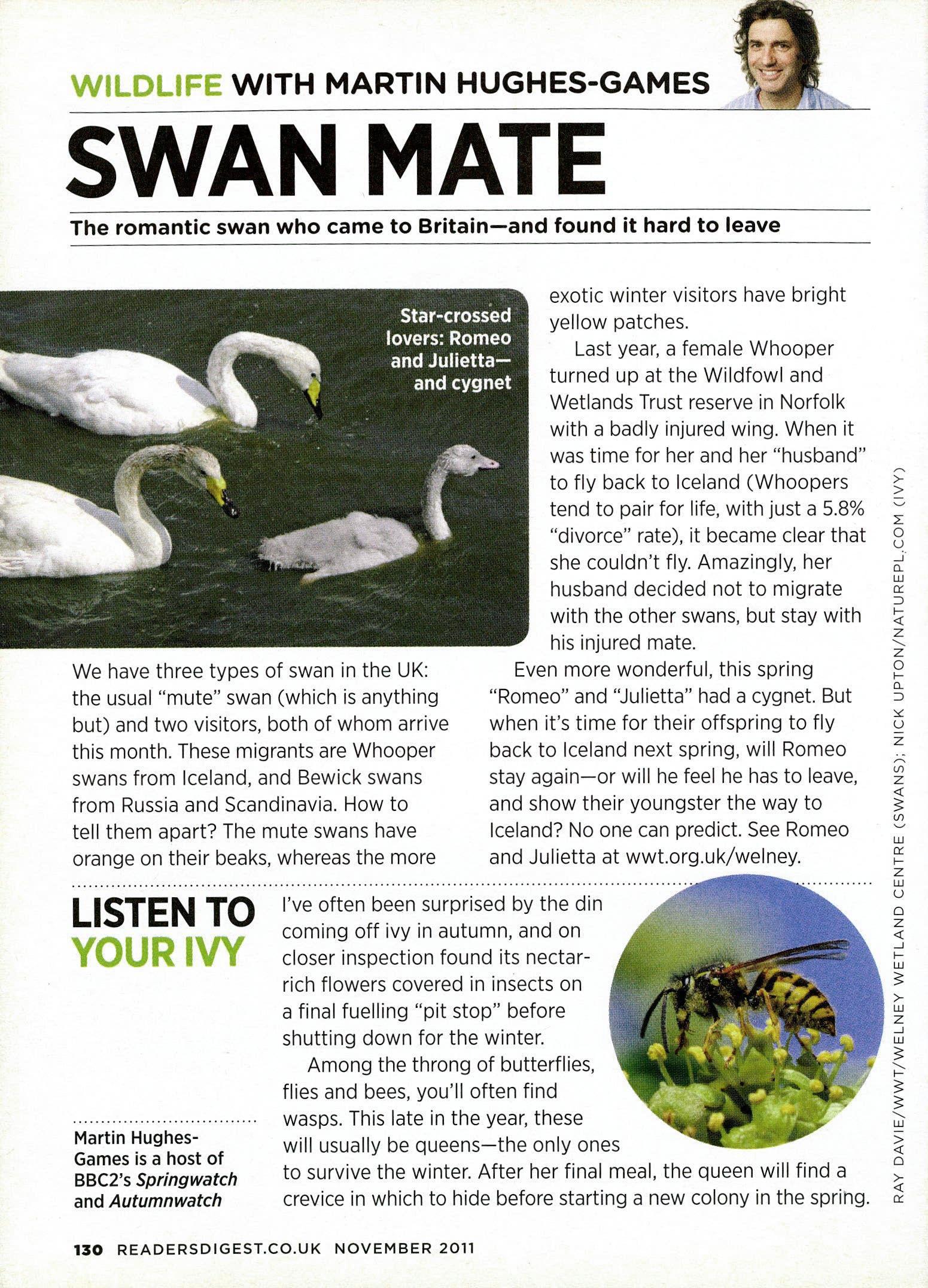
Star-crossed lovers: Romeo and Juliettaand cygnet
We have three types of swan in the UK: the usual "mute" swan (which is anything but) and two visitors, both of whom arrive this month. These migrants are Whooper swans from Iceland, and Bewick swans from Russia and Scandinavia. How to tell them apart? The mute swans have orange on their beaks, whereas the more
Martin HughesGames is a host of BBC2's Springwatch and Autumnwatch
exotic winter visitors have bright yellow patches.
Last year, a female Whooper turned up at the Wildfowl and Wetlands Trust reserve in Norfolk with a badly injured wing. When it was time for her and her "husband" to fly back to Iceland (Whoopers tend to pair for life, with just a 5.8% "divorce" rate), it became clear that she couldn't fly. Amazingly, her husband decided not to migrate with the other swans, but stay with his injured mate.
Even more wonderful, this spring "Romeo" and "Julietta" had a cygnet. But when it's time for their offspring to fly back to Iceland next spring, will Romeo stay again—or will he feel he has to leave, and show their youngster the way to Iceland? No one can predict. See Romeo and Julietta at wwt.org.uk/welney.
I've often been surprised by the din coming off ivy in autumn, and on closer inspection found its nectarrich flowers covered in insects on a final fuelling "pit stop" before shutting down for the winter.
Among the throng of butterflies, flies and bees, you'll often find wasps. This late in the year, these will usually be queens—the only ones to survive the winter. After her final meal, the queen will find a crevice in which to hide before starting a new colony in the spring.
At this time of year, migrating salmon return from the sea to breed in the freshwater rivers in which they were born perhaps seven years earlier. It's thought they use their sense of smell to detect the chemical make-up of their natal river. As they run upstream, fishermen try to catch them. The largest salmon ever recorded in the UK was caught by Georgina Ballantine on October 7, 1922. It was 64 pounds and took over two hours to land. This is where it gets curious. A Doreen Davey landed the biggest spring salmon ever caught in the UK, and the biggest salmon caught on a fly was hooked by Clementina Morison. Again and again, women catch record-breaking salmon. It's been suggested that the sense of smell which
guides salmon also allows them to detect female pheromones from the fishing tackle women have handled—pheromones that salmon :* find irresistible. I've even read of keen fishermen begging women to keep fishing tackle in their under. wear for a day to impart pheromones. I consider this ungentlemanly and definitely unsporting! •
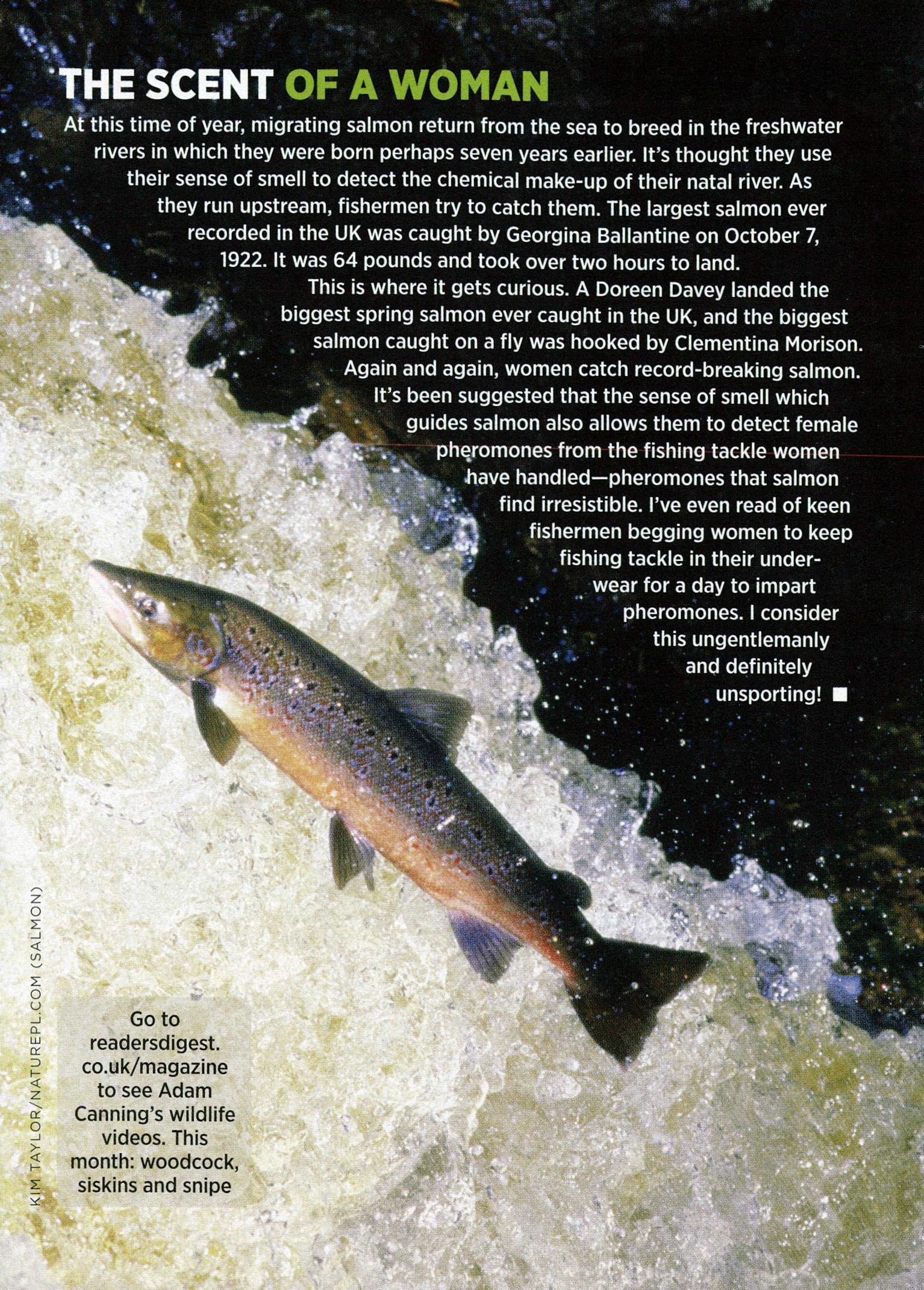
Go to readersdigest. co.uk/magazine to see Adam Canning's wildlife videos. This month: woodcock, siskins and snipe
My dad's an academic, so I'd never dare suggest that digital was a substitute for face-to-face teaching. However, in my role as UK Digital Champion, I've seen a few of the profound ways that technology is revolutionising how we learn, and I've met hundreds of people who've told me how powerfully these new educational tools have helped them.
Often this is in really simple, obvious ways: like single parents who use the web to get a qualification in the evenings when their kids have gone to bed; or people who have mobility problems or are living in remote areas and who wouldn't be able to travel to a bricks-and-mortar classroom; or people who left school without basic skills and are using computers to get back into the swing of studying—going at
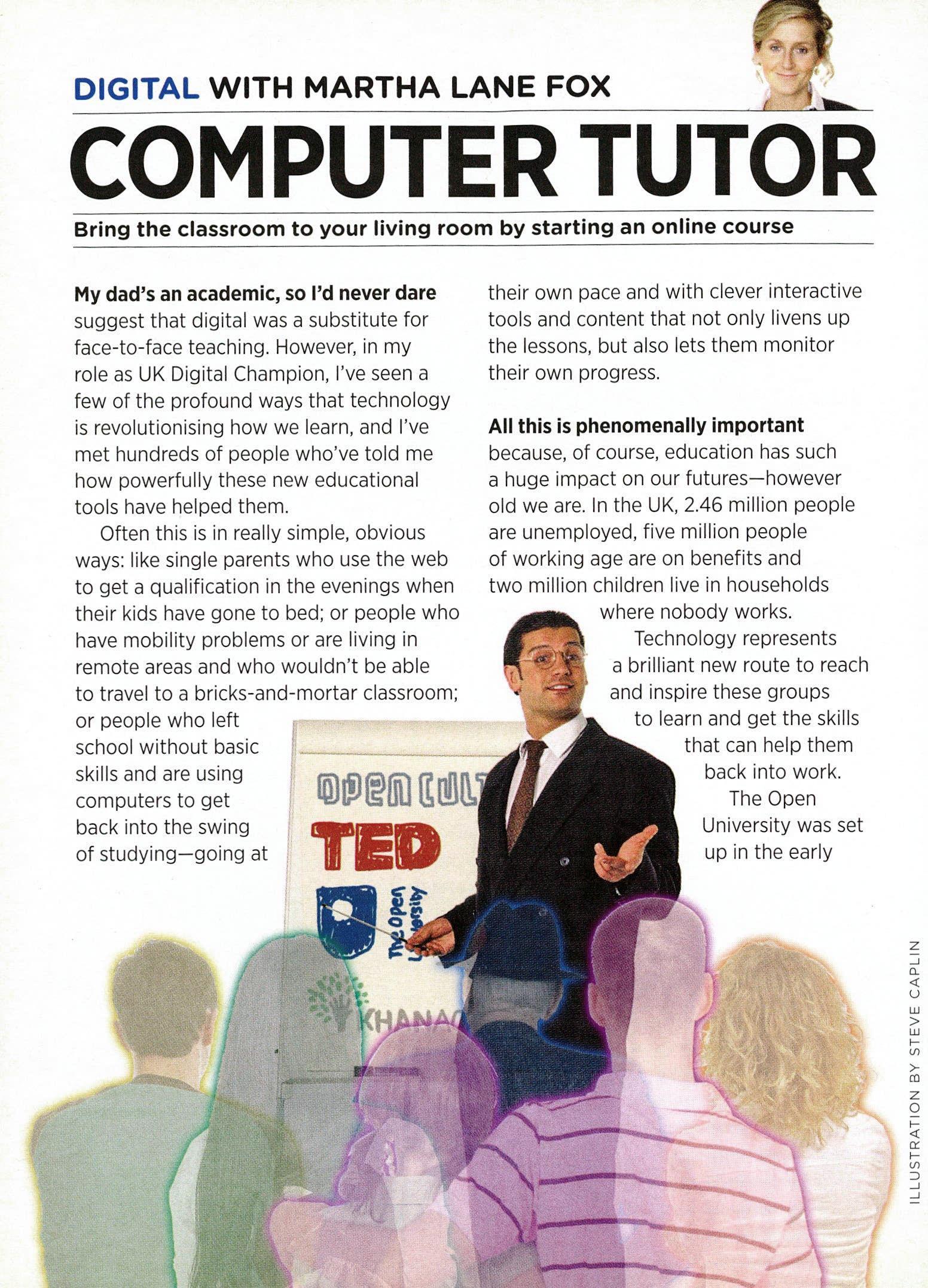
their own pace and with clever interactive tools and content that not only livens up the lessons, but also lets them monitor their own progress.
All this is phenomenally important because, of course, education has such a huge impact on our futures—however old we are. In the UK, 2.46 million people are unemployed, five million people of working age are on benefits and two million children live in households where nobody works. Technology represents a brilliant new route to reach and inspire these groups to learn and get the skills that can help them back into work.
The Open University was set up in the early
..00 nee 012111.84mm. (maw thivenitle.
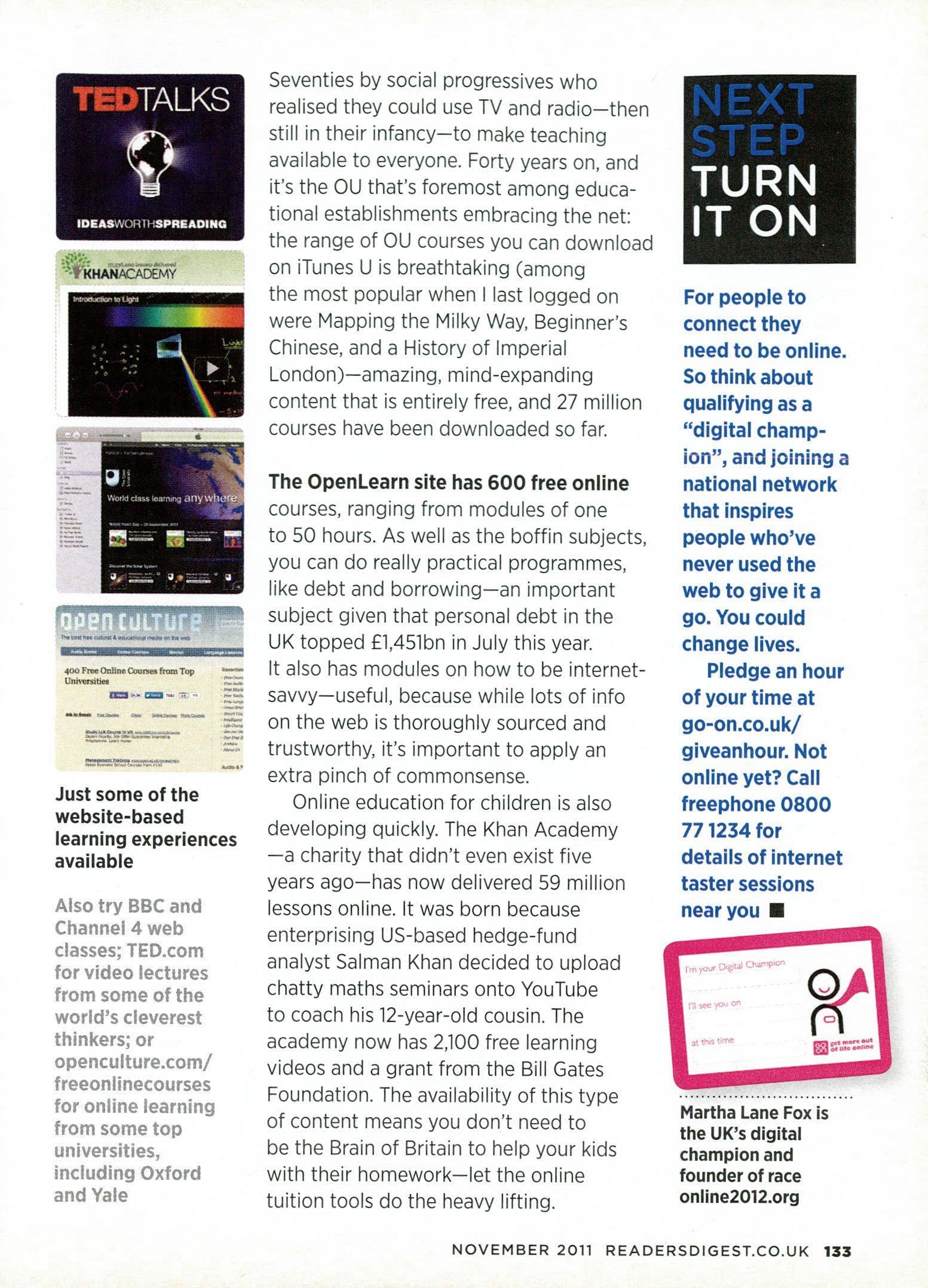
Just some of the website-based learning experiences available
Also try BBC and Channel 4 web classes; TED.com for video lectures from some of the world's cleverest thinkers; or openculture.com/ freeonlinecourses for online learning from some top universities, including Oxford and Yale
Seventies by social progressives who realised they could use TV and radio—then still in their infancy—to make teaching available to everyone. Forty years on, and it's the OU that's foremost among educational establishments embracing the net: the range of OU courses you can download on iTunes U is breathtaking (among the most popular when I last logged on were Mapping the Milky Way, Beginner's Chinese, and a History of Imperial London)—amazing, mind-expanding content that is entirely free, and 27 million courses have been downloaded so far.
The OpenLearn site has 600 free online courses, ranging from modules of one to 50 hours. As well as the boffin subjects, you can do really practical programmes, like debt and borrowing—an important subject given that personal debt in the UK topped £1,451bn in July this year. It also has modules on how to be internetsavvy—useful, because while lots of info on the web is thoroughly sourced and trustworthy, it's important to apply an extra pinch of commonsense.
Online education for children is also developing quickly. The Khan Academy —a charity that didn't even exist five years ago—has now delivered 59 million lessons online. It was born because enterprising US-based hedge-fund analyst Salman Khan decided to upload chatty maths seminars onto YouTube to coach his 12-year-old cousin. The academy now has 2,100 free learning videos and a grant from the Bill Gates Foundation. The availability of this type of content means you don't need to be the Brain of Britain to help your kids with their homework—let the online tuition tools do the heavy lifting.
For people to connect they need to be online. So think about qualifying as a "digital champion", and joining a national network that inspires people who've never used the web to give it a go. You could change lives. Pledge an hour of your time at go-on.co.uk/ giveanhour. Not online yet? Call freephone 0800 771234 for details of internet taster sessions near you ■
Martha Lane Fox is the UK's digital champion and founder of race online2012.org
Diesel isn't a fuel—he was a person, Mr Rudolf Diesel...
...and he might not be too pleased with what's happened in his name. Here are some stories to ponder the next time you're filling up at the pump.
Rudolf Christian Karl Diesel was a 19th-century inventor and social theorist, passionate about improving the lives of ordinary people. Working in Germany, his key creation was the "compression engine", intended to give individuals access to more efficient power than the steam engines generally available at the time. The new engine would not only be more efficient and powerful but also use commonly available fuels, making it incredibly flexible. The first engine—demonstrated publicly at the Paris Expo in 1901—ran on peanut oil. Whereas petrol engines use spark plugs to heat the fuel, diesel engines use compression —squeeze a gas and it gets hotter (ever been burned by the tip of a bike pump having blown up a tyre?).
Diesel would probably never have endorsed the fuel that carries his name. "Diesel" was appropriated by big oil business, which wanted to claim that only their rough oil by-products
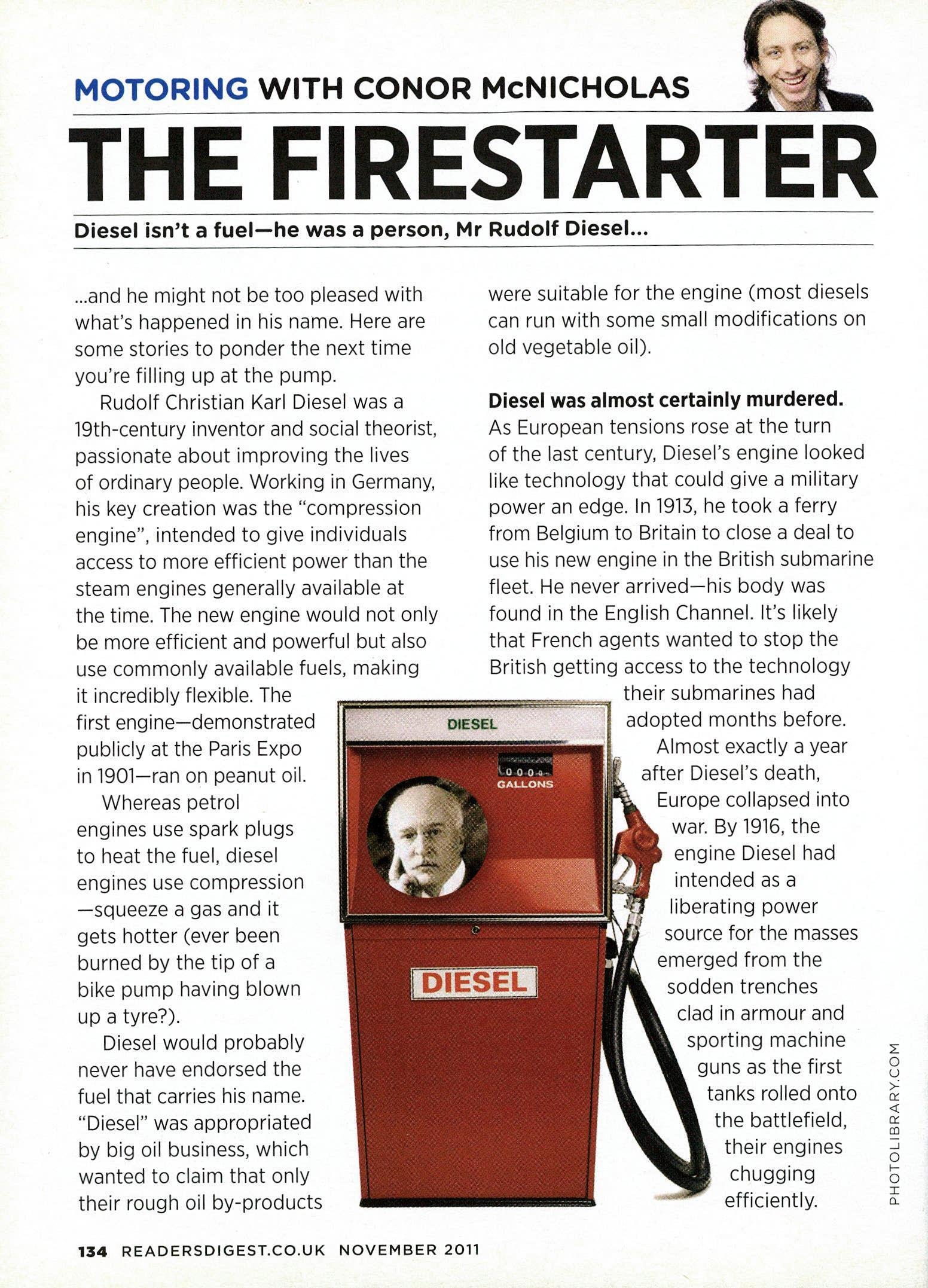
were suitable for the engine (most diesels can run with some small modifications on old vegetable oil).
Diesel was almost certainly murdered. As European tensions rose at the turn of the last century, Diesel's engine looked like technology that could give a military power an edge. In 1913, he took a ferry from Belgium to Britain to close a deal to use his new engine in the British submarine fleet. He never arrived—his body was found in the English Channel. It's likely that French agents wanted to stop the British getting access to the technology their submarines had
adopted months before. Almost exactly a year after Diesel's death, Europe collapsed into war. By 1916, the engine Diesel had intended as a liberating power source for the masses emerged from the sodden trenches clad in armour and sporting machine guns as the first tanks rolled onto the battlefield, their engines chugging efficiently.
Jaguar XF, 2012 mol (from £30,950) After three years, the XF still leads its field (readers voted it Car of the Decade at the recent Auto Express awards). And rightly so. Nowhere else do you get the blend of style, refinement, pace and sheer class for this money. The new model gets refreshed looks and even more efficient engines. A car you'll never regret buying.
VN, 4 (£26,995)
Welcome please, ladies and gentlemen, the world's first diesel hybrid for sale. Hybrid cars match a combustion engine with an electric motor, but until now the engine bit has always been petrol. This diesel combination delivers a whopping 74mpg and just 99g/km CO2 —low enough to be exempt from road tax and the London Congestion Charge. A quiet revolution.

(£176,895)
Mercedes' new supercar, sitting at the top of their range, is the SLS AMG. It's inspired by the classic 300SL from the 1950s, complete with upwards-swinging gull-wing doors. This new Roadster SLS loses the doors, and with them the roof—perfect if you want to smell the wild rosemary on the way to your villa on the Nice coast.
If yours uses GPS to work out if you're about to reach a registered speed-camera site, then all is well. The Government considers this a deterrent that fits their speedcamera policy. But some detectors are set up to detect the police radar or "aser-speed guns. The DoT confirm .nese detectors are .till legal, though legislation to ban them has been on the cards for years. Most detectors allow for this to be disabled if a new law is passed. ■
Conor McNicholas is the former editor of BBC Top Gear Magazine. Follow Conor on twitter.com/ conormcnicholas
As we gathered at the meeting point at 6am, I was feeling very nervous. I picked up my walking stick, ready for the 24-mile, four-day hike along the Inca Trail, and wondered exactly what was in store.
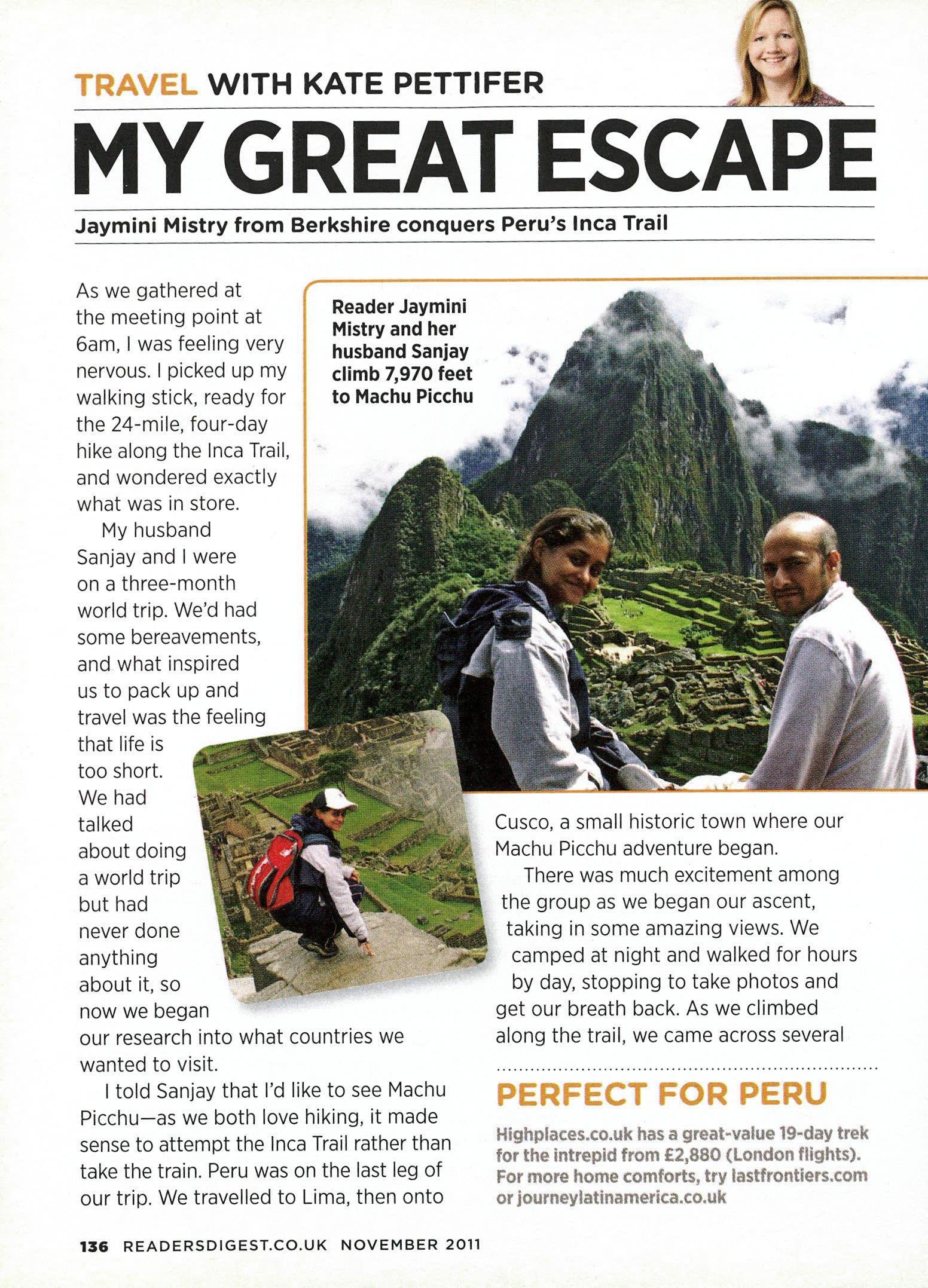
Reader Jaymini Mistry and her
husband Sanjay climb 7,970 feet to Machu Picchu
My husband Sanjay and I were on a three-month world trip. We'd had some bereavements, and what inspired us to pack up and travel was the feeling that life is too short. We had talked about doing a world trip but had never done anything about it, so now we began our research into what countries we wanted to visit.
I told Sanjay that I'd like to see Machu Picchu—as we both love hiking, it made sense to attempt the Inca Trail rather than take the train. Peru was on the last leg of our trip. We travelled to Lima, then onto
Cusco, a small historic town where our Machu Picchu adventure began. There was much excitement among the group as we began our ascent, taking in some amazing views. We camped at night and walked for hours by day, stopping to take photos and get our breath back. As we climbed along the trail, we came across several
Highplaces.co.uk has a great-value 19-day trek for the intrepid from £2,880 (London flights). For more home comforts, try Iastfrontiers.com or journeylatinamerica.co.uk
ruins and edged dense forest.
By the third day, my legs had almost given up— I was in awe of the porters running past me at speed. Their energy was incredible! They also cooked some really delicious meals at each campsite.
At dawn on the fourth day, we left to see Machu Picchu. It was magical in the morning light. I sat for hours gazing at the breathtaking views, and taking in the serenity of the place—one of the most beautiful and enigmatic sites in the world.
Send us a photo of your favourite holiday, tell us briefly what made it so special, and if we include it on this page we'll pay you £70. See address on p4.
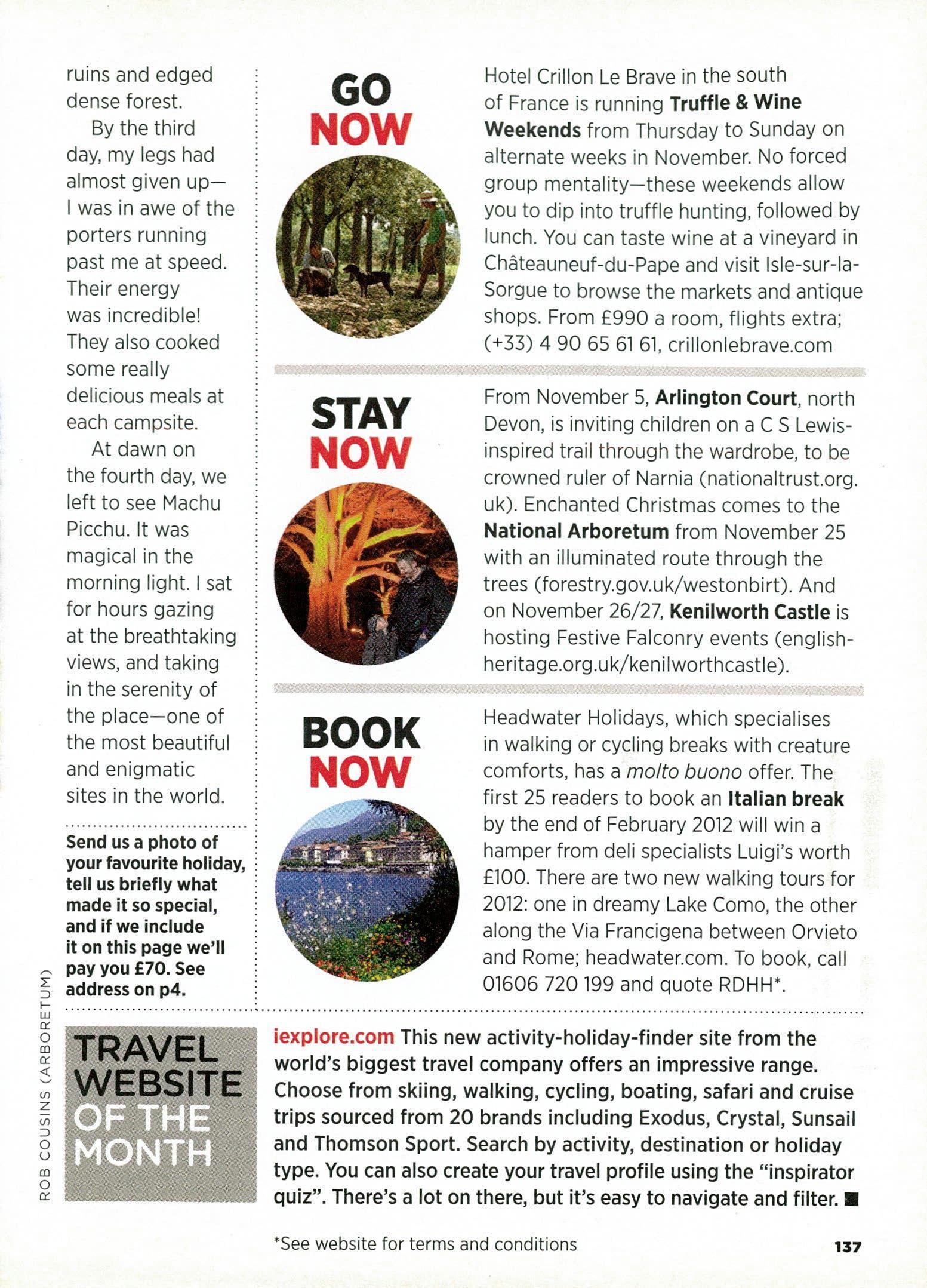
Hotel Crillon Le Brave in the south of France is running Truffle & Wine Weekends from Thursday to Sunday on alternate weeks in November. No forced group mentality—these weekends allow you to dip into truffle hunting, followed by lunch. You can taste wine at a vineyard in Chateauneuf-du-Pape and visit Isle-sur-laSorgue to browse the markets and antique shops. From £990 a room, flights extra; (+33) 4 90 65 61 61, crillonlebrave.com
From November 5, Arlington Court, north Devon, is inviting children on a C S Lewisinspired trail through the wardrobe, to be crowned ruler of Narnia (nationaltrust.org. uk). Enchanted Christmas comes to the National Arboretum from November 25 with an illuminated route through the trees (forestry.gov.uk/westonbirt). And on November 26/27, Kenilworth Castle is hosting Festive Falconry events (englishheritage.org.uk/kenilworthcastle).
Headwater Holidays, which specialises in walking or cycling breaks with creature comforts, has a motto buono offer. The first 25 readers to book an Italian break by the end of February 2012 will win a hamper from deli specialists Luigi's worth £100. There are two new walking tours for 2012: one in dreamy Lake Como, the other along the Via Francigena between Orvieto and Rome; headwater.com. To book, call 01606 720 199 and quote RDHH*.
iexplore.com This new activity-holiday-finder site from the world's biggest travel company offers an impressive range. Choose from skiing, walking, cycling, boating, safari and cruise trips sourced from 20 brands including Exodus, Crystal, Sunsail and Thomson Sport. Search by activity, destination or holiday type. You can also create your travel profile using the "inspirator quiz". There's a lot on there, but it's easy to navigate and filter. ■
It's so easy! We do all the hard work for you!
Think switching services is too difficult? Getting a service for the first time and need help? Moving home or simply too busy?
Why not call Reader's Digest Digital Comparison Service? We'll do all the hard work for you and find the best deal - you could save up to £402 per year. We're so confident that you won't find a cheaper deal, that if you do, we'll refund the difference.
Just call free and speak to a UK-based expert. We'll review thousands of deals from the UK's top providers and we'll even arrange your Installation. What's more, our friendly experts are here seven days a week to answer your questions in jargon-free language right up until the day you're installed.
So don't delay - our experts are waiting to take your call.
PRICE COMPARISON
CALCULATOR We're proud to be the only APPRO, Ofcom accredited TV, broadband CIF-corr. e and phone comparison service.
With thousands of deals to choose from, you could save like Kate from Edinburgh, who cut f300 off her bill with the service...
Did you save money by using the service? I did - I saved over £300 per year by bundling my broadband and phone.
How was your customer experience? Very good - the agent, Elliott, talked me through my options in simple, jargon-free language!
Would you recommend the service to your friends?
I would - I was nervous about switching as I was confused about my options and I thought it would be a hassle. But, the process was simple and the experts do all the hard work for you!

Experts available: Monday-Friday 8am-8pm Saturday 9am-5.30pm Sunday 10am-5.30pm

NOVEMBER FICTION REVIEWED BY A N WILSON
EXTRACTS FROM OUR FAVOURITE NEW RELEASES P J O'ROURKE GOES ON HOLIDAY WITH THE FAMILY AND WARTIME INTRIGUE AT LONDON'S GRAND HOTELS BOOKS THAT CHANGED MY LIFE: VICTORIA HISLOP
The main characters in Joan Bakewell's second novel are Martha—a clever, pretty Northern girl—and her parents. Dad is the projectionist at a Stockport cinema, and Mum is a housewife. Bakewell brilliantly captures the tensions between them, and there is an especially touching scene when Martha has indeed left
home and feels affection for her parents for the first time. By then, the cinema has closed down, Martha is working as a waitress in Manchester and Dad has got a job at Granada Television. Yes, the 1960s have arrived...
The period details are beautifully evoked, with the food, clothes and hairdos all lovingly recreated. More importantly, the characters feel totally authentic in their speech and emotions. The result is a good oldfashioned novel about utterly recognisable people.
The idea here is that this Holmes story—appearing now in a blaze of 21st-
Published 50 years ago this month, Joseph Heller's debut novel gave the world a whole new idea: now solemnly defined as "a supposed law containing provisions which are mutually frustrating". The book itself, though, couldn't be any less
A N Wilson prefers this month's more understated novels
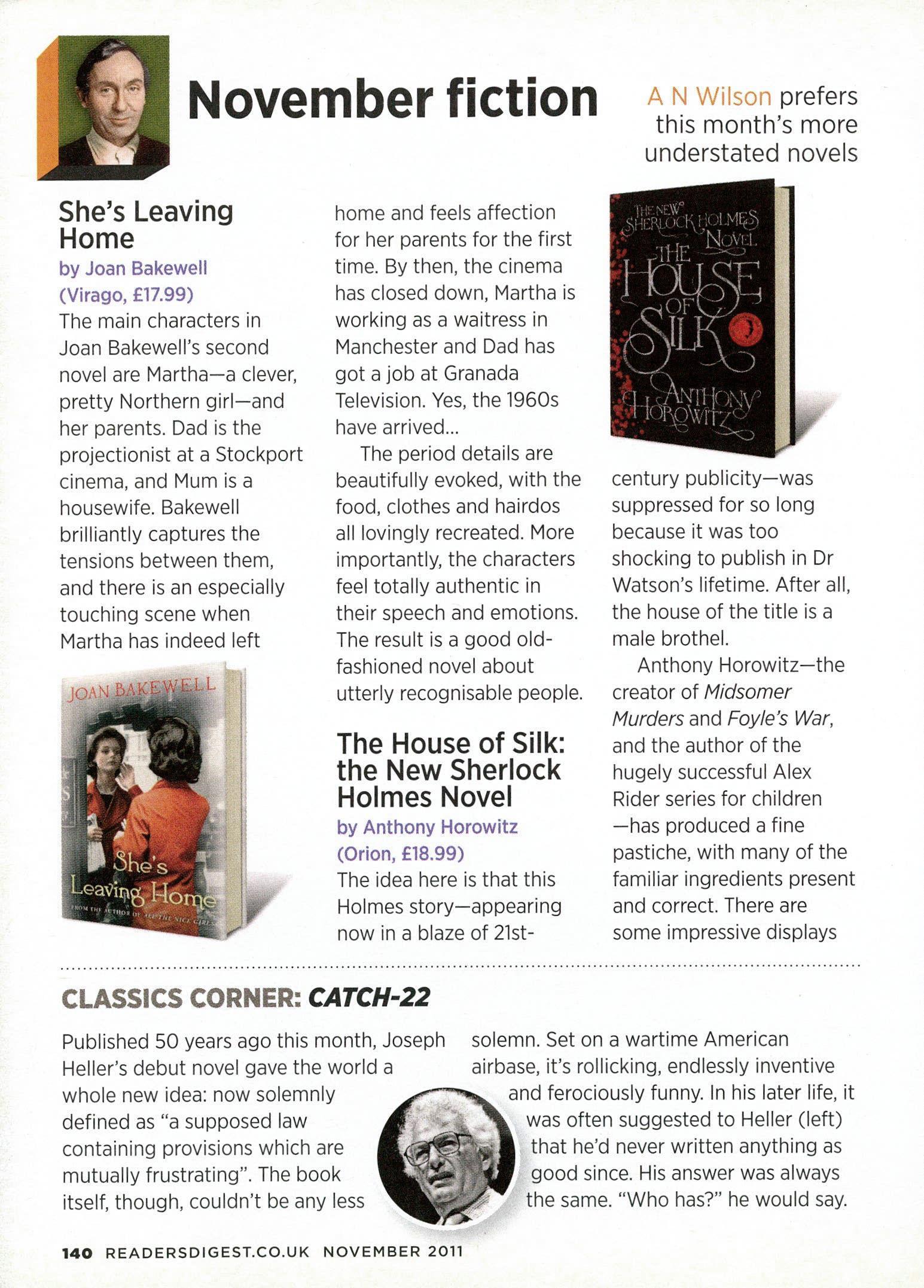
century publicity—was suppressed for so long because it was too shocking to publish in Dr Watson's lifetime. After all, the house of the title is a male brothel.
Anthony Horowitz—the creator of Midsomer Murders and Foyle's War, and the author of the hugely successful Alex Rider series for children —has produced a fine pastiche, with many of the familiar ingredients present and correct. There are some impressive displays
solemn. Set on a wartime American airbase, it's rollicking, endlessly inventive and ferociously funny. In his later life, it was often suggested to Heller (left) t that he'd never written anything as good since. His answer was always the same. "Who has?" he would say.
of Holmes's deductive powers, and it's particularly funny when he and his brother Mycroft vie to out-deduce each other. But the story as a whole lacks the authentic atmosphere of the bizarre that was the hallmark of Conan Doyle's original tales, and the denouement is too obvious.
11.22.63 by Stephen King (Hodder, £19.99)
Jake Epping finds he can travel back in time via a diner in Maine. If he can get the timing right, he'll appear at Lee Harvey Oswald's side in Dallas, and President Kennedy's
assassination on November 22, 1963, will be averted. You might think this is rather a strong plot—which indeed it is. Sadly, though, while we see quite a lot of Oswald and his Russian in-laws, they never really come to life. Meanwhile, King's narrative is flabby, and achingly slow. (It's nearly 300 pages before Oswald appears—and in all the book has more than 700.) We're also told that "The future of the world was at stake," yet not one paragraph suggests why world history was changed by Kennedy's murder.
The Coward's Tale by Vanessa Gebbie (Bloomsbury, £16.99)
This first novel is a gem. Laddy Merridew, a carrot-haired, awkward little boy, arrives in a south Welsh town to live with his grandmother, and befriends a tramp called lanto Jenkins. lanto is a "coward"—ie, he's suffering
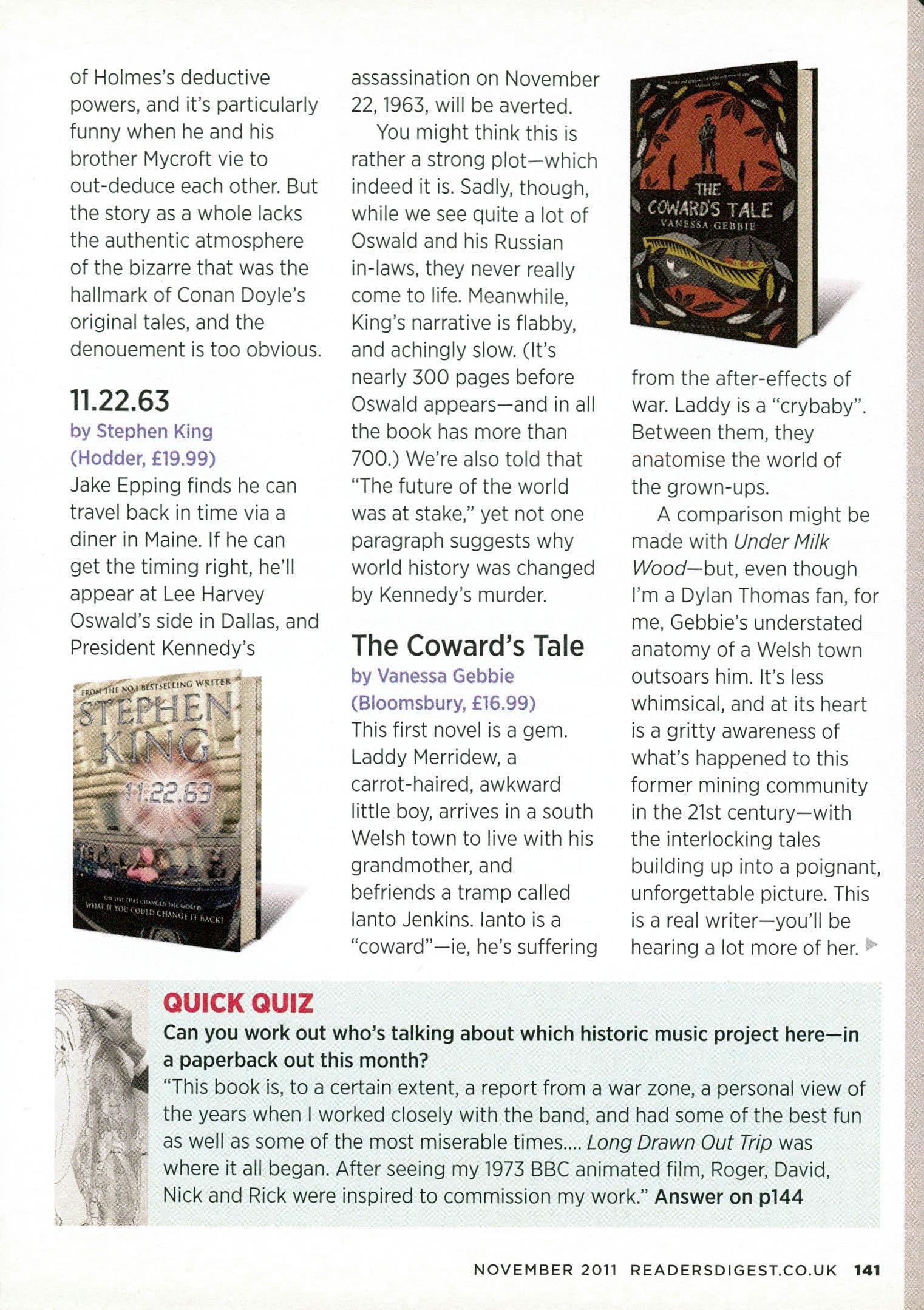
from the after-effects of war. Laddy is a "crybaby". Between them, they anatomise the world of the grown-ups.
A comparison might be made with Under Milk Wood—but, even though I'm a Dylan Thomas fan, for me, Gebbie's understated anatomy of a Welsh town outsoars him. It's less whimsical, and at its heart is a gritty awareness of what's happened to this former mining community in the 21st century—with the interlocking tales building up into a poignant, unforgettable picture. This is a real writer—you'll be hearing a lot more of her. 0`
Can you work out who's talking about which historic music project here—in a paperback out this month?
"This book is, to a certain extent, a report from a war zone, a personal view of the years when I worked closely with the band, and had some of the best fun as well as some of the most miserable times.... Long Drawn Out Trip was where it all began. After seeing my 1973 BBC animated film, Roger, David, Nick and Rick were inspired to commission my work." Answer on p144
A former war reporter takes on the most frightening assignment of them all—travelling with his children
For more than 20 years, American journalist P J O'Rourke was a foreign and war correspondent—or, as it's apparently known in the trade, "a sh*thole specialist". What made him different from his colleagues is that his reports were full of jokes. As he put it in his breakthrough book Holidays in Hell in 1988: "What I've really been is a Trouble Tourist—going to see insurrections, political crises, civil disturbances and other human folly because...because it's fun."
Or at least it was until the Iraq War when, as he says here, the realisation finally dawned that "I was too old to be scared stiff and too stiff to sleep on the ground." Which is why we now get Holidays in Heck, a collection of rather milder globetrotting experiences—many of them with his family.
Fortunately, all O'Rourke's other characteristics remain in place. There's his trademark mix of quite fierce Republican politics with boozy hedonism. There's the rueful acknowledgement of his left-wing past in the 1960s. There's the irreverence about every form of political piety—even that of his own side.
And, of course, the book is packed with the kind of one-liners that have earned him so many entries in dictionaries of humorous quotations—as well as appearances on the likes of Have I Got News for You. (TV viewers may also recognise him as the bloke who presented that long-running series of British Airways ads.) In one chapter, he even manages to make gags about being diagnosed with cancer: "I'm told I have a 95 per cent chance of survival. Come to think of it—as a drinking, smoking, saturatedfat-hound of a reporter—my chance of survival has been improved by cancer."
In this extract, he's in Hong Kong with his wife and three children: ten-year-old Muffin, seven-year-old Poppet and threeyear-old Buster—not, you'll be relieved to know, their real names...
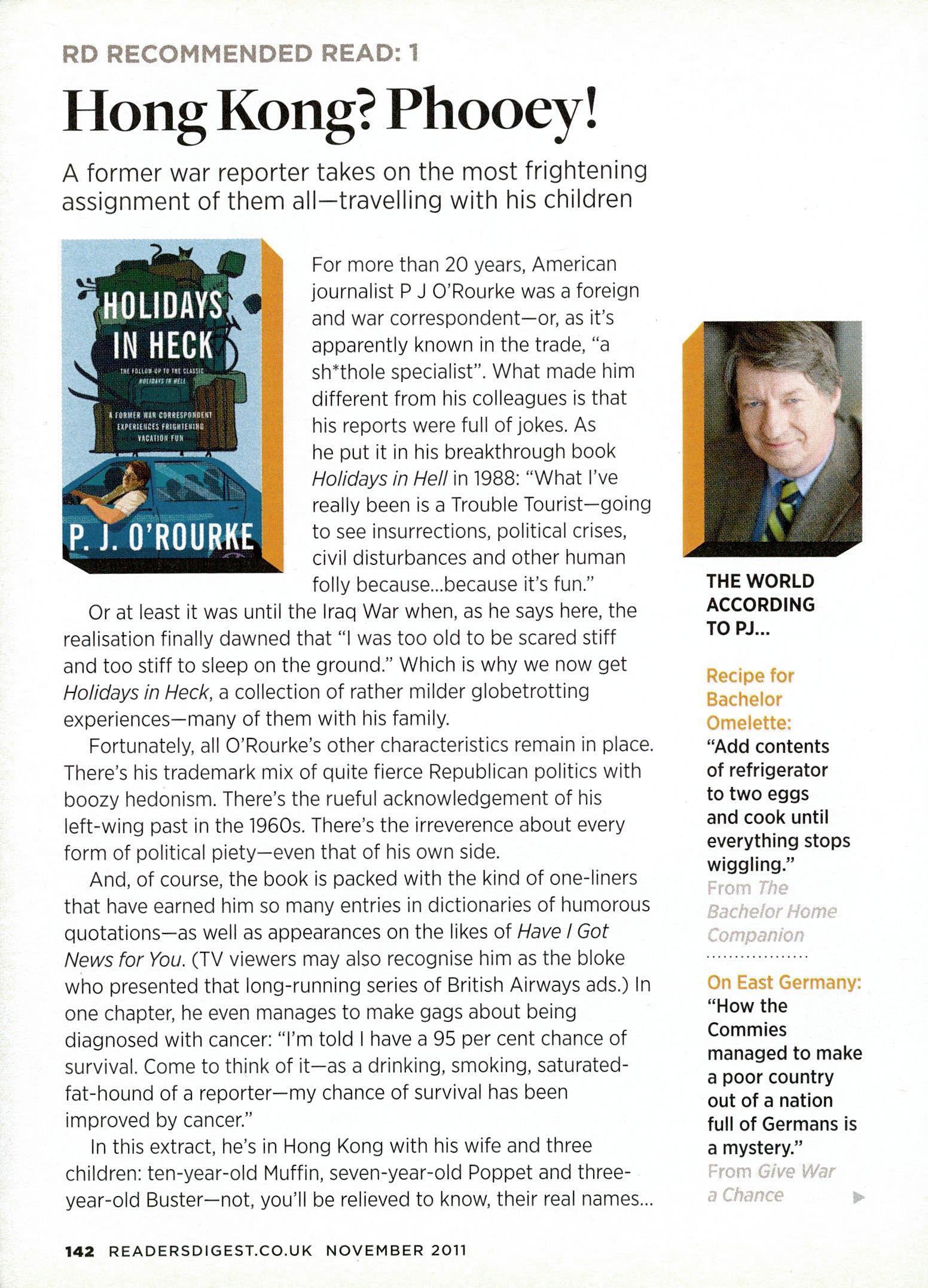
THE WORLD ACCORDING TO PJ...
Recipe for Bachelor Omelette: "Add contents of refrigerator to two eggs and cook until everything stops wiggling."
From The Bachelor Home Companion
On East Germany: "How the Commies managed to make a poor country out of a nation full of Germans is a mystery."
ticWhen I was a foreign correspondent I regarded Hong Kong as 'starter Asia', perfect for introducing the Orient to neophytes. Everyone is impressed by how colourful and exotic it is, except it's clean, safe and it works. However, there's no telling what will impress a family. If any of the kids noticed that they'd gone from rural New Hampshire to a metropolis teeming with millions, they didn't think it worth mentioning.
Buster was wowed that he could take a taxi without being strapped and buckled into a child seat as if he were going on a Challenger mission. And then, to his immense delight, we encountered his idea of paradise—a traffic jam. 'Truck! Car! Truck! Bus! Car!' noted the observant little fellow.
An ad for Hong Kong Disneyland caught Poppet's eye. She gasped with excitement.
'No!' I said. 'We went to Disney World back home. You didn't even like it.'
'But, Dad,' said Muffin, 'this time would be different. See, we fly all the way to the other side of the world. And then we go someplace that's exactly the same. That would be so cool.' The entire travel and tourism industry explained in three sentences.
I knew what would catch my wife's eye. On a trip to the shopping capital of the world, she had 'accidentally left at home' a suitcase full of the clothes she 'needed most', so she ►
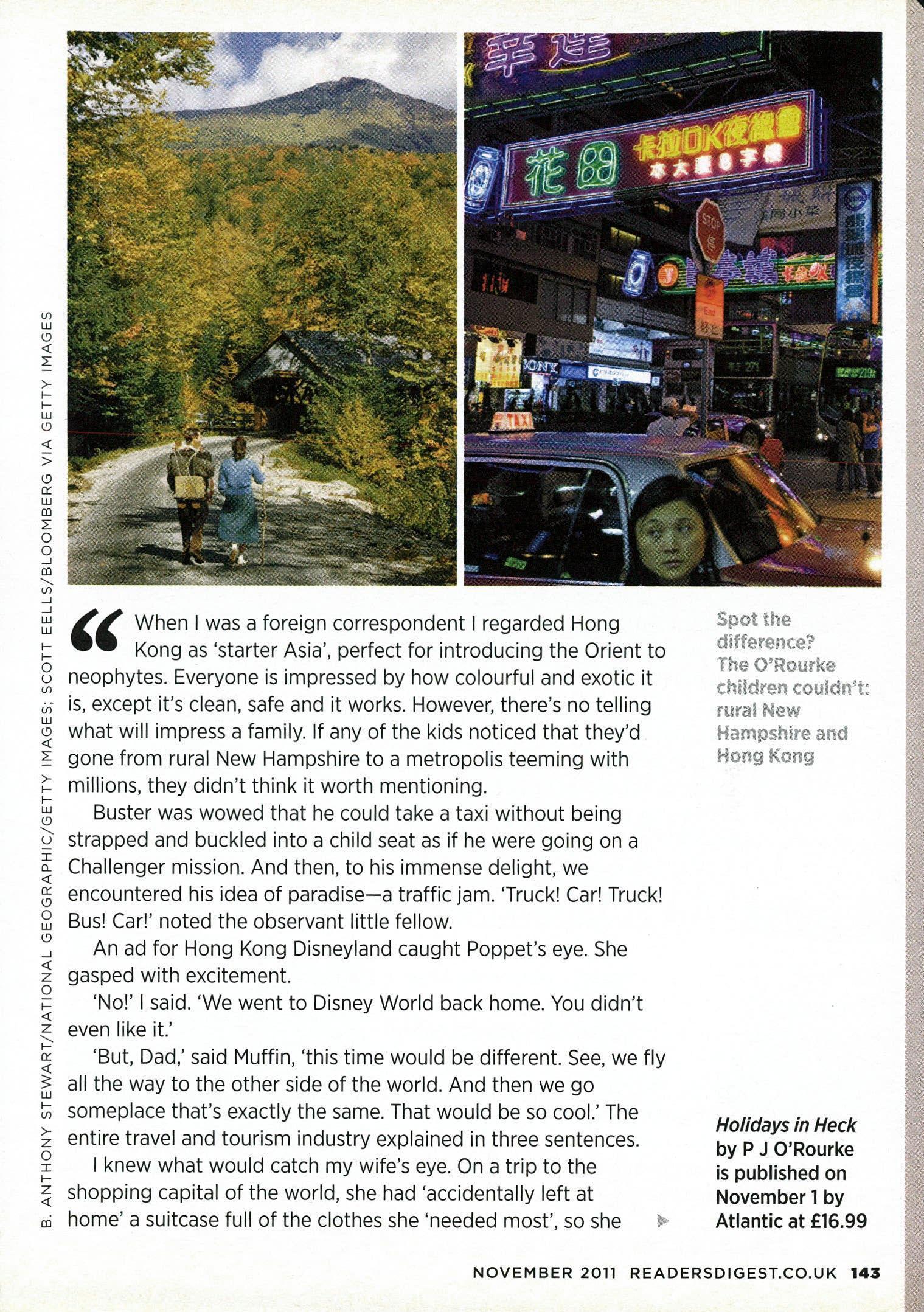
Spot the difference?
The O'Rourke children couldn't: rural New Hampshire and Hong Kong Holidays in Heck by P J O'Rourke is published on November 1 by Atlantic at £16.99
4 'had to' go shopping. She slipped from my grasp and ran into Shanghai Tang's, taking all our credit cards. With Muffin and Poppet holding on to my pockets, I pushed Buster's stroller uphill. Mainland China legislates family planning. Hong Kong just lets the impossibility of using a stroller do the trick. There isn't a kerb cut anywhere in the Special Administrative Region. And Hong Kong's steepest side-streets, such as the one I was on, are, in fact, staircases. I'd hoist Poppet, prod Muffin, and do a weightlifter's snatch and jerk with Buster in the stroller. Sweat-soaked, winded and probably (given Shanghai Tang's prices) broke, I reached Ice House Road and the Foreign Correspondents' Club. I had been anchoring the right, rear corner of the bar there intermittently since the late 1980s. I ordered the usual. One of the waiters approached. He asked if the children would like something to eat. The FCC serves food? Who knew?...
Mrs 0 and the kids went to Po Lin Monastery to see the Tian Tan Buddha, the largest bronze casting of its kind in the world. The children returned glowing from the intense aesthetic experience.
'We had ice cream!' said Poppet.
'Double dip!' said Muffin.
'On my pants!' said Buster, displaying proof.
'But what about the Buddha?' I asked.
'The what?' said Muffin.
'You know,' I said, 'Buddha, the Indian holy man who founded Buddhism. You went to a Buddhist monastery. They had a statue of Buddha. It's really big. What was it like?'
'Really big?' said Muffin.
'We had ice cream!' said Poppet.
'On my pants!' said Buster.
That was Gerald Scarfe on how he came to be the illustrator for the album—and then the videos, stage show and film—of Pink Floyd's The Wall. Containing hundreds of photographs and images from Scarfe's own archives, as well as backstage revelations and interviews with Roger Waters, who wrote the songs, The Making of Pink Floyd: The Wall is published by Phoenix at £16.99.
4 "Republicans aren't really evil. They'll save the rain forest if they have to. Tell them that's where the golf ball trees grow."
From A Guile Beat Youth, Innocence and a Bad Haircut
"Giving money and power to government is like giving whiskey and car keys to teenage boys."
From Parliament of Whores
"Wherever there's injustice, oppression and suffering, America will show up six months late and bomb the country next to where it's happening."
From Peace Kills
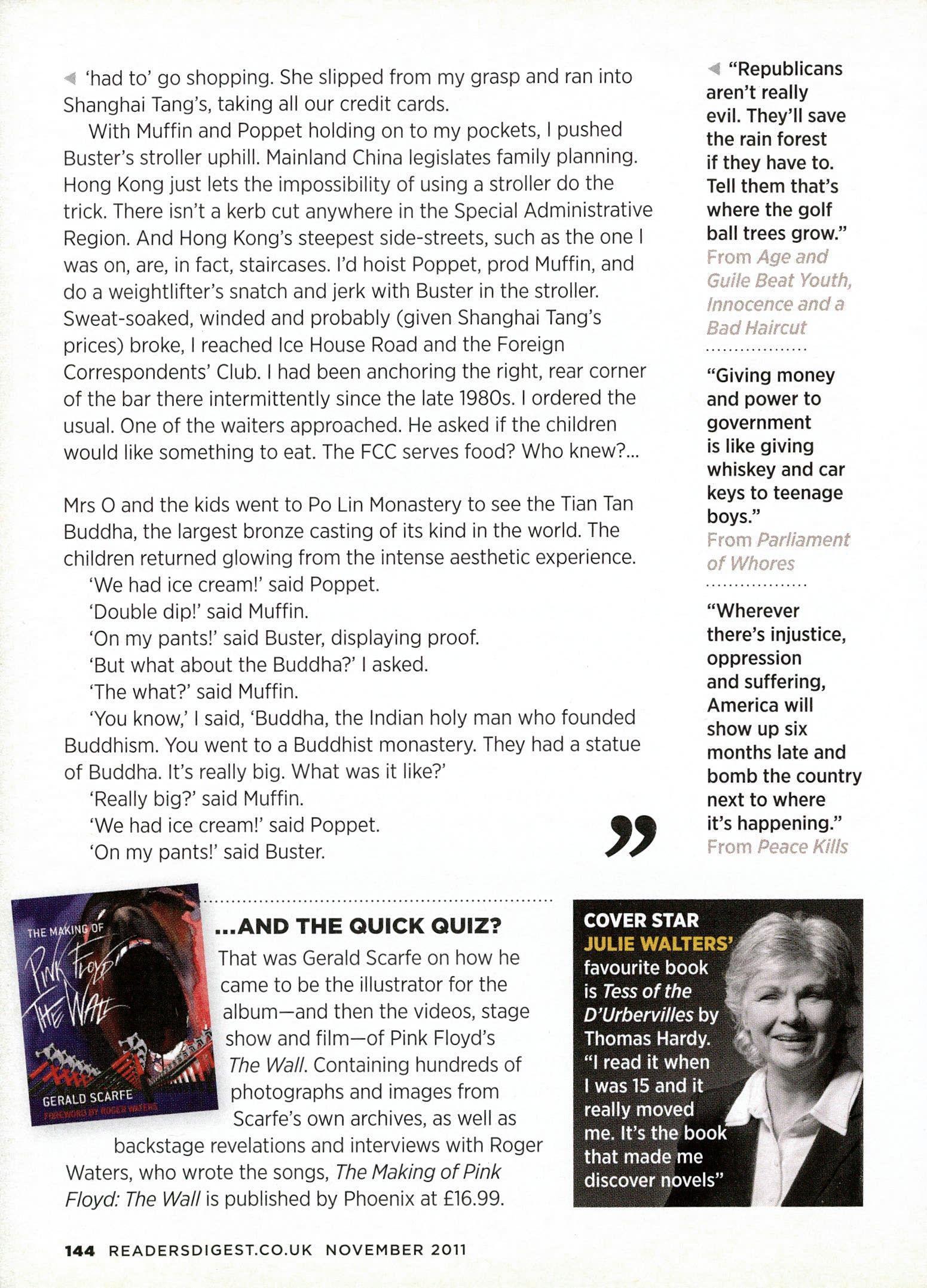
COVER STAR
JULIE WALTERS' favourite book is Tess of the D'Urbervilles by . Thomas Hardy. "I read it when I was 15 and it really moved me. It's the book that made me discover novels"
When spies and spivs drank with girls and earls—much to the alarm of Special Branch
As Matthew Sweet points out, most books on wartime Britain emphasise the nation's shared experience; how we were all in it together. Well, not this one. The West End Front plunges us deep into a world of spies, chancers, misbehaving aristocrats and exiled foreign royals—all thrown together in London's most prestigious hotels. "The Dorchester, the Savoy, the Ritz and Claridge's," he declares: "each was a kind of Casablanca."
Sweet writes with infectious gusto, and an obvious relish for compelling (and often hair-raising) details. But all of them are backed by solid research, including interviews with the people who were there. Here, he sets the scene at the Dorchester.
, A few days before Hitler invaded Poland, Sir Norman
• Kendal, head of both Special Branch and the London CID, cancelled a trip to Berlin; a fact-finding mission scheduled to include a lecture on policing by SS-Gruppenflihrer Reinhard Heydrich and a tour of Dachau. Kendal sent his regrets by post. 'I am more sorry than I can tell you to miss seeing you and all my other friends,' he wrote to Heydrich's deputy, Artur Nebe.
It is not clear how Sir Norman would have put this knowledge to use at Scotland Yard, but six months into the war, he had become painfully frustrated by the government's security policy. One of his strongest sources of anxiety was an eight-floor, 300-bedroom reinforced-concrete citadel on Park Lane. 'The whole place', he declared in a despairing memo, 'is crawling with foreigners'
The Dorchester was built for just such an infestation. Its co-founder, Sir Francis Towle, was the inaugurator of the Come to Britain Movement, which argued that international tourism was a source of mutual understanding. Now, this idealism was supplanted by Norman Kendal's culture of suspicion. Security files were opened on guests, and English members of staff ►
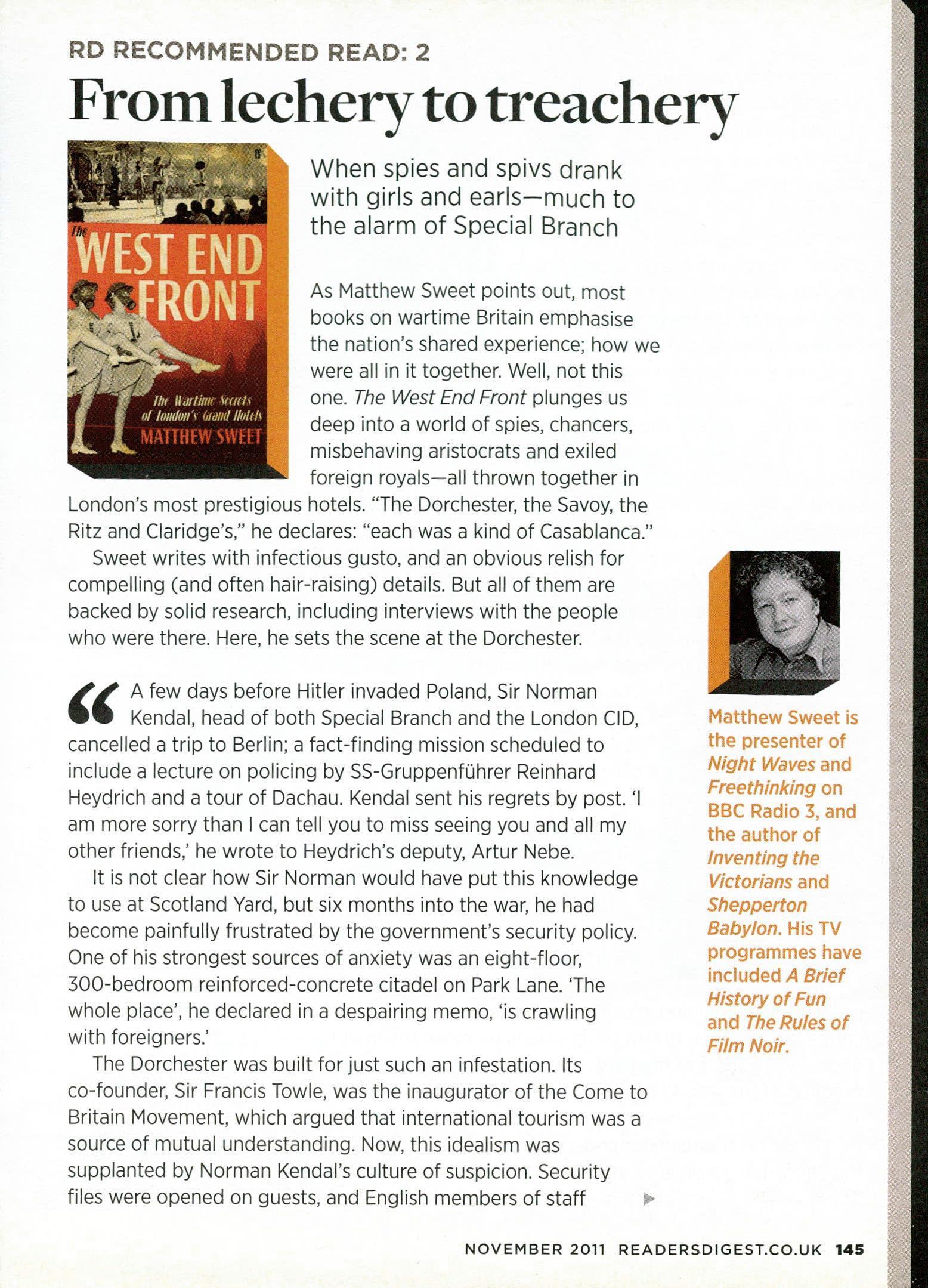
Matthew Sweet is the presenter of Night Waves and Freethinking on BBC Radio 3, and the author of Inventing the Victorians and Shepperton Babylon. His TV programmes have included A Brief History of Fun and The Rules of Film Noir.
11w Ihrtiew kWh londanl aand MATTHEW SWEETHe Dared onmbuk C. Akpabio
()MOVER 1 13.99
HARDCOVER I f 23.99
EBOOK I f 9.99
f-tE DARED
Leader and businessman Udo Akpabio was a warrior with an indomitable spirit. Serving as a bridge between the British and Nigerian people, he achieved the delicate balance of tradition an westernization.
The Fundamentals of the Game
(For Coaches, Players, and Pare 'Martin van Daalen
SOFTCOVER I £ 19.99
HARDCOVER I f 29.99
EBOOKk9.99
Tennis coaches, players and parents need worry no more!
Martin van anal.
Teaching Tennis shares all the fundamentals and specifics to the next level. A must read for any
Roy Arthur Swanson
A5OFTCOVER I f 23.99
HARDCOVER I f 34.99
EBOOK I f 9.99
Roy Arthur Swanson's RAIN and DARKNESS is a compelling work of fiction that follows Peter 0. Blaustern, a young man who translates his passivity into the action of a novel.
PQ-17: A Sea Story
John Alfred Barrett,
,Mariner
SOFTCOVER I f 15.99
HARDCOVER I f 24.99
EBOOK 9.99
Get a glimpse of the heroic men of WWII as author John Alfred Barrett weaves a part fiction, part documentary of an Allied Merchant Marine's sea story in The Knight's Gambit. • TEACHING TENNIS
take your game to tennis enthusiast. C
Ted Bagley
SOFTCOVER I f 19.99
HARDCOVER I f 29.99
EBOOK if 9.99 .4.e-
merse yourself into a magnificenMel of rev d out how impulsive cisions can lead H tr rte.•utcomes,... Set in the poorest neighborhoods of Chicago, e Trage 'RS family's triumphs to tragedy. Follow A.J. relati and the values he learned in the process. 4 A


Victoria Hislop is a prize-winning author and journalist. Her first novel, The Island, sold over a million copies. Her latest, The Thread, is out on October 27. Victoria lives in Kent with her husband, Private Eye editor Ian Hislop, and their two children.
I vividly remember our primaryschool teacher reading a chapter a day to us. She'd come out from behind her desk—an event in itself—and was as visibly moved by this powerful story as we were. The fact that it was set in a real historical context gave it an extraordinary power. It was my first introduction to the horror of concentration camps, and we were all completely spellbound by David's escape and journey across Europe. It has some of the best descriptive writing I've ever come across. I read it to my children when they were younger, and I know they will read it to theirs in the future. You never forget this book.
I studied this for 0 level and, although I was one of the good girls at school, there was a part of me that longed to be as wild and undisciplined as Bronte's characters. Our other set text was Jane Austen's Emma, which seemed so boring compared with this book's drama and underlying eroticism. Imagine living without rules and hanging out with a whole lot of other insane teenagers, as Cathy does, then being able to come back and haunt people! It made me realise how exciting the English language could be. •
Nineteen EightyFour by George Orwell I didn't enjoy Nineteen Eighty-Four in the conventional sense, because the story is so BIG TIER horrifying, but Orwell is close to genius. How did he predict, in 1949, so much that's part of our lives today? The language and concepts of Big Brother, thoughtcrime and Newspeak have become part of our contemporary vernacular, while the brainwashing effect that technology and television can have on us is completely relevant now. It seems we haven't heeded many of the book's warnings. Orwell is among the top ten people I'd most like to meet—he was an astonishing writer.
To advertise in this section please call Anthon Linton on 020 7675 1819

55+? Did you know you can rent private retirement property on a Life Long Tenancy which gives you the right to remain living in the property for as long as you wish, with service charge and maintenance included in the rent?
What is the purpose of my existence on earth?"
If you are seeking answers to these or similar questions you can find them in the book:
ABD-RU-SHINFor further details or to purchase the book either visit www.in-the-light-of-truth.org or telephone Grail Acres Publishing Company on 0208 308 9575.

Roll the the dice... use the pictures... and tell the story!
Each of the sets contains nine six-sided stay cubes, with 54 images and more than ten million possible story combinations. Roll the dice and however they land, your task is to find a way of linking together the images on the top face of each of the dice, in order to build a story that makes sense. There are no wrong answers - the goal is simply to let the cubes spark your imagination.
Whether you use them fora fun family activity, or to encourage your children to develop their storymaking skills, these brilliant sets will be loved by everyone.
There are two different sets. The Original Story Cubes use images of objects and emotions, whilst the Story Cubes Actions Set uses images of characters doing different things to help you form your story. Both sets will also help your children to improve their confidence and concentration.
Box size approx. 6.5cm x 6.5cm. Ages 4 to Adult.

you want to be a
author? Please send your manuscript and details to Whitney and Hughes literary agents. 79 Nightingale Lane, London SW12 8LY
Tel: 020 8419 8437
aulhor@whItneyandhughes.co.uk
To advertise in this section call Anthon Linton on 020 7657 1819 or email at anthon.linton@ tenalps.com
Synopses and sample chapters welcome, please send to: Austin & Macauley Publishers CGC-33-01, 25 Canada Square, Canary Wharf, London, E14 5LQ 0207 0388212 editors@austinmacauley.com www.austinmacauley.com All genres welcome

at the might of the Puzzleman who takes just 20 minutes to answer these five questions. Can you do any better?
1 Three colours, which are also items of food or drink, have been merged together here. What are they?
2 The alphabet is written here, but some letters are missing. Arrange the missing letters to give a word. What is it?
BCDFGIJKMNQSUVWXYZ
3 For each of the following, find a word beginning with "C" with the same meaning as the given word. What are they?
A. ATTRIBUTES
B. RECTIFY
C. DIFFERENCE
4 Rearrange the letters of BRIEF SIN OF WORKER to give two words associated with this month.
5 Place a letter in the centre of the cobweb so that a five-letter word can be arranged from each straight line of letters. The added letter will be the centre letter of each word. Identify the four words.
So how did you score? A point for every correct answer. Here's the Puzzleman's verdict: 0-2 Hmmm. Bit of a damp squib, I'm afraid.
3-4 A sparkling but non-threatening Roman candle.
5 Look at that rocket go!
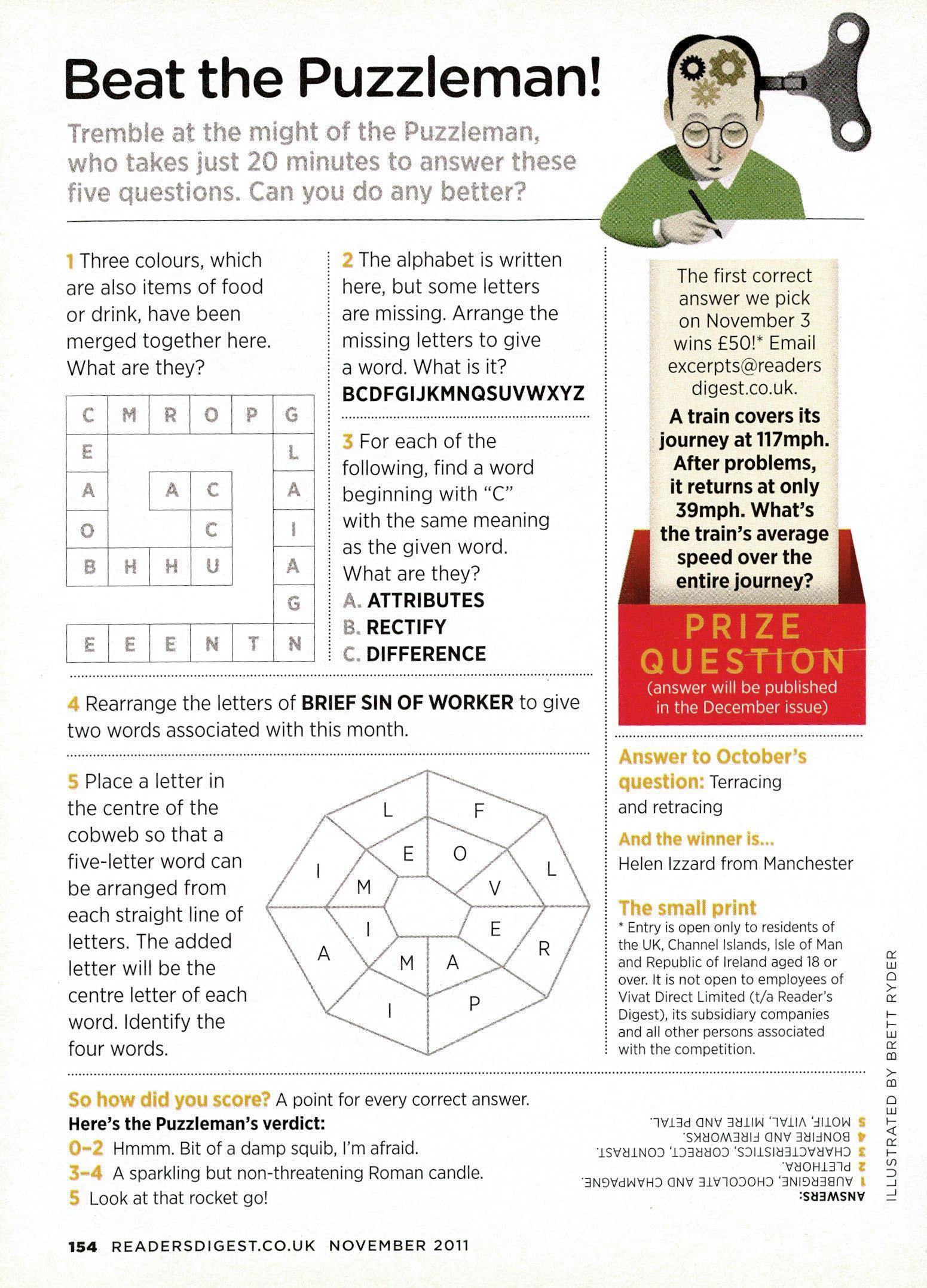
The first correct answer we pick on November 3 wins £50!* Email excerpts@readers digest.co.uk.
A train covers its journey at 117mph. After problems, it returns at only 39mph. What's the train's average speed over the entire journey?
(answer will be published in the December issue)
Answer to Oda , question: Terracing and retracing
And the winner is... Helen lzzard from Manchester
*Entry is open only to residents of the UK, Channel Islands, Isle of Man and Republic of Ireland aged 18 or over. It is not open to employees of Vivat Direct Limited (t/a Reader's Digest), its subsidiary companies and all other persons associated with the competition.
1V13c10NV 3a11N "W.LIA 'd11014 S 'S)1210M381d ONV RI13N08 1SV2:11N0D1032,12:10D 'SDI1S12131DVaVHD 'Vb0H131d I '3N9VcIVIVHD ONV 31V1O0OHD '3N192138f1V I :S2I3MSNV
ACROSS
1 Projected through the air (6)
4 Collect discarded material (8)
9 Body orbiting a star (6)
10 Going from one side to the other (8)
11 Tool similar to a spade (6)
12 Protective strap in a car (4,4)
13 Choose (3)
14 Stank (6)
17 Return to a former state (7)
21 Mixture of blue and red (6)
25 Unwell (3)
26 Coalition (8)
27 Reduce in rank (6)
28 Inherent aptitude (8)
29 Woman's twopiece bathing suit (6)
30 Imperil (8)
31 In need of immediate action (6) DOWN
1 Woven picture (8)
2 Came to a conclusion (8)
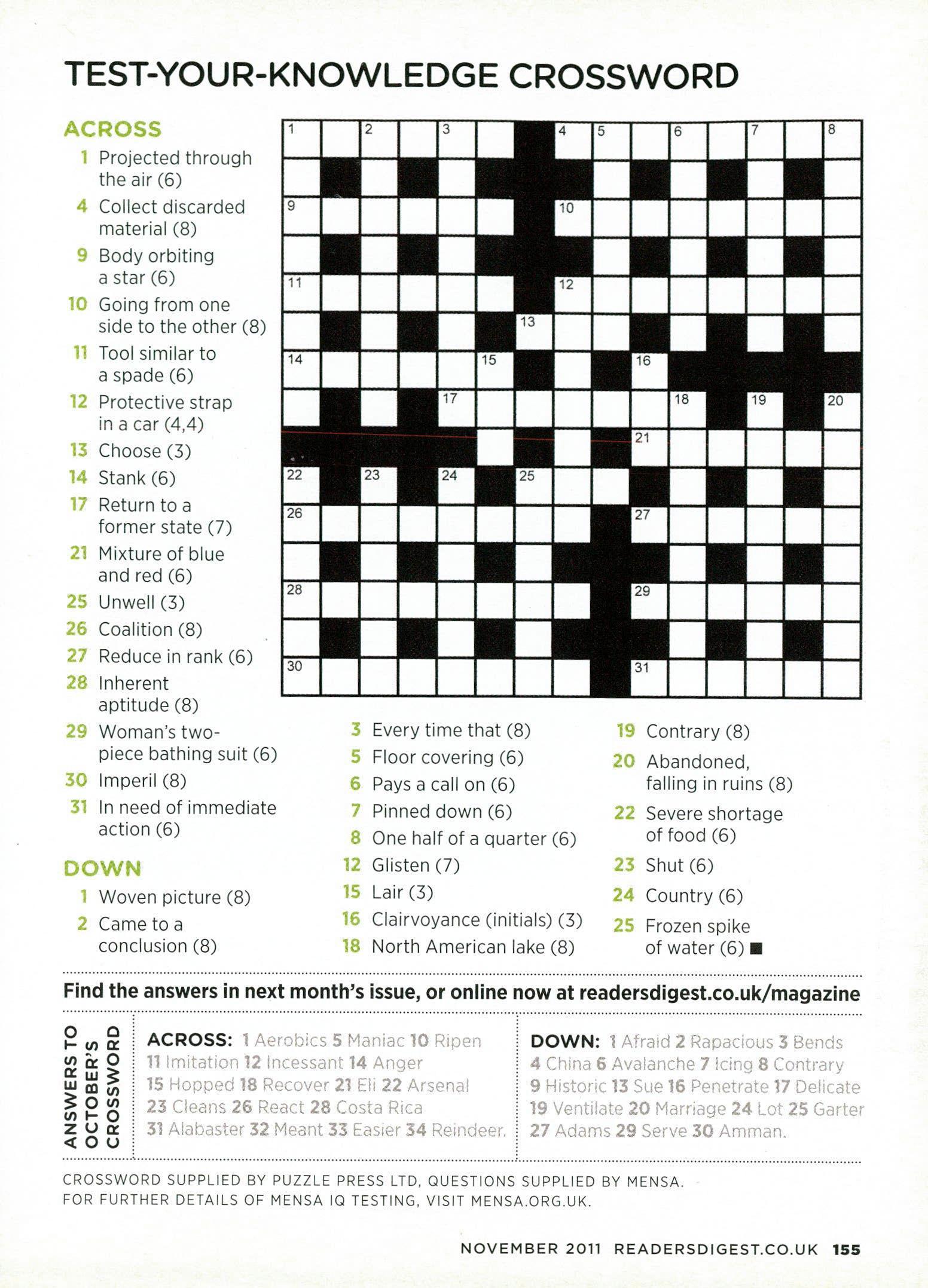
Every time that (8)
5 Floor covering (6)
6 Pays a call on (6)
7 Pinned down (6)
8 One half of a quarter (6)
12 Glisten (7)
15 Lair (3)
16 Clairvoyance (initials) (3)
18 North American lake (8)
Contrary (8)
20 Abandoned, falling in ruins (8)
22 Severe shortage of food (6)
23 Shut (6)
24 Country (6)
25 Frozen spike of water (6) • Find the answers
0 0
I—
ACROSS: 1Aerobics 5 Maniac 10 Ripen
11Imitation 12 Incessant 14 Anger
15 Hopped 18 Recover 21Eli 22 Arsenal
23 Cleans 26 React 28 Costa Rica
31Alabaster 32 Meant 33 Easier 34 Reindeer. DOWN: 1Afraid 2 Rapacious 3 Bends 4 China 6 Avalanche 7 Icing 8 Contrary
Historic 13 Sue16 Penetrate 17 Delicate
Ventilate 20 Marriage 24 Lot 25 Garter 27 Adams 29 Serve 30 Amman.
WIN £70 FOR EVERY READER'S JOKE WE PUBLISH. EMAIL
READERSDIGEST.CO.UK OR GO TO FACEBOOK.COM/READERSDIGESTUK
1 People say, "I'm taking it one day at a time." You know what? So is everybody. That's how time works. Comedian Hannibal Buress
1 I just taught my kids about how tax works... by eating 38 per cent of their ice cream.
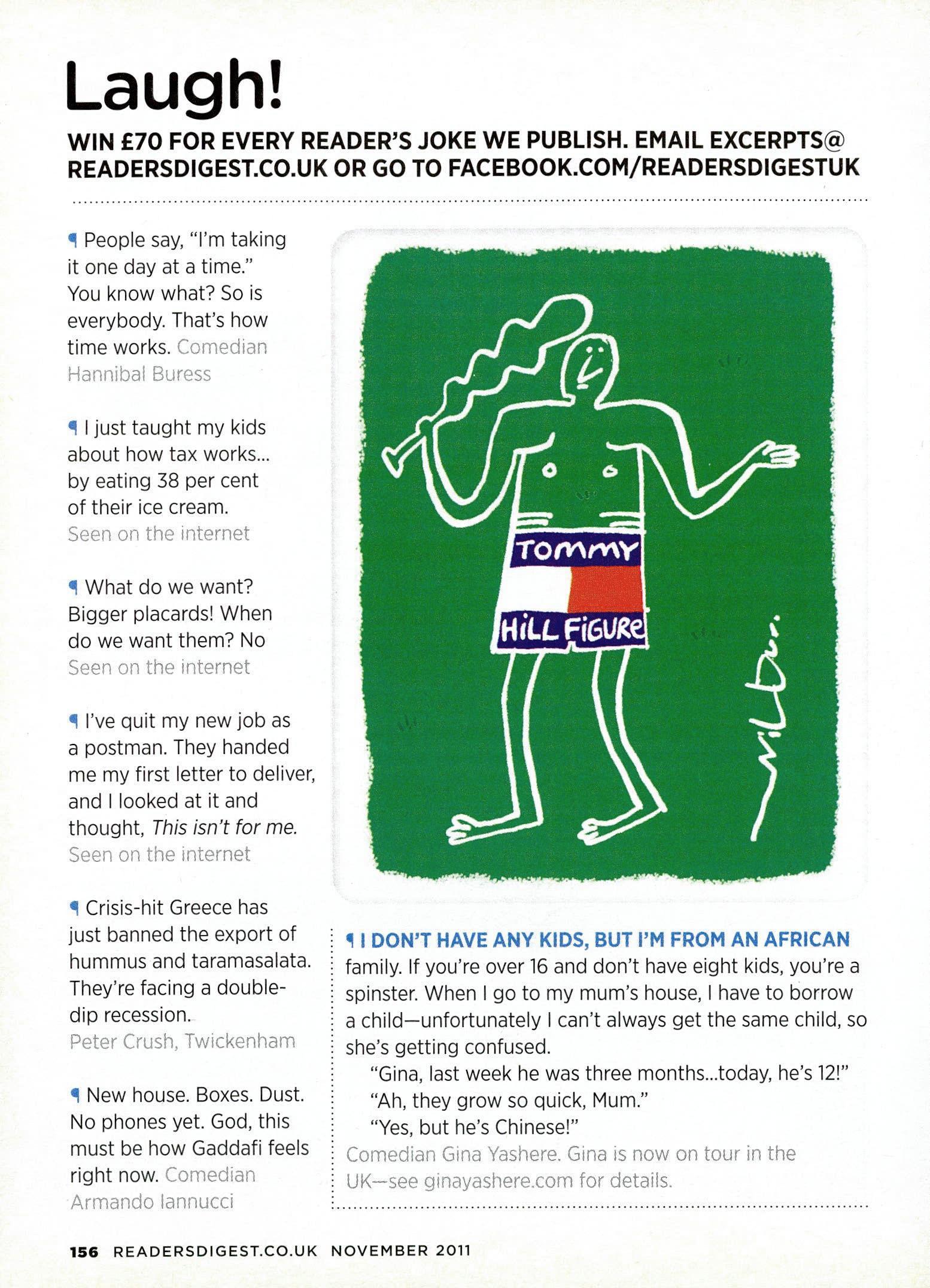
41 What do we want? Bigger placards! When do we want them? No Seen on the internet
1 I've quit my new job as a postman. They handed me my first letter to deliver, and I looked at it and thought, This isn't for me. Seen on the internet
Crisis-hit Greece has just banned the export of hummus and taramasalata. They're facing a doubledip recession. Peter Crush, Twickenham
1 New house. Boxes. Dust. No phones yet. God, this must be how Gaddafi feels right now. Comedian Armando lannucci
1 I DON'T HAVE ANY KIDS, BUT I'M FROM AN AFRICAN family. If you're over 16 and don't have eight kids, you're a spinster. When I go to my mum's house, I have to borrow a child—unfortunately I can't always get the same child, so she's getting confused.
"Gina, last week he was three months...today, he's 12!"
"Ah, they grow so quick, Mum."
"Yes, but he's Chinese!" Comedian Gina Yashere. Gina is now on tour in the UK—see ginayashere.com for details.
I I'm English and, as such, I crave disappointment. That's why I buy Kinder Surprise.
Comedian Bill Bailey
I I was playing chess with my friend and he said, "Let's make this interesting." So we stopped playing chess.
Comedian Matt Kirshen
I
I'm not doing any Michael Jackson jokes, because they
In the German city of Cologne, do they sell a fragrance called "Birmingham"?
Comedian
Milton Jones
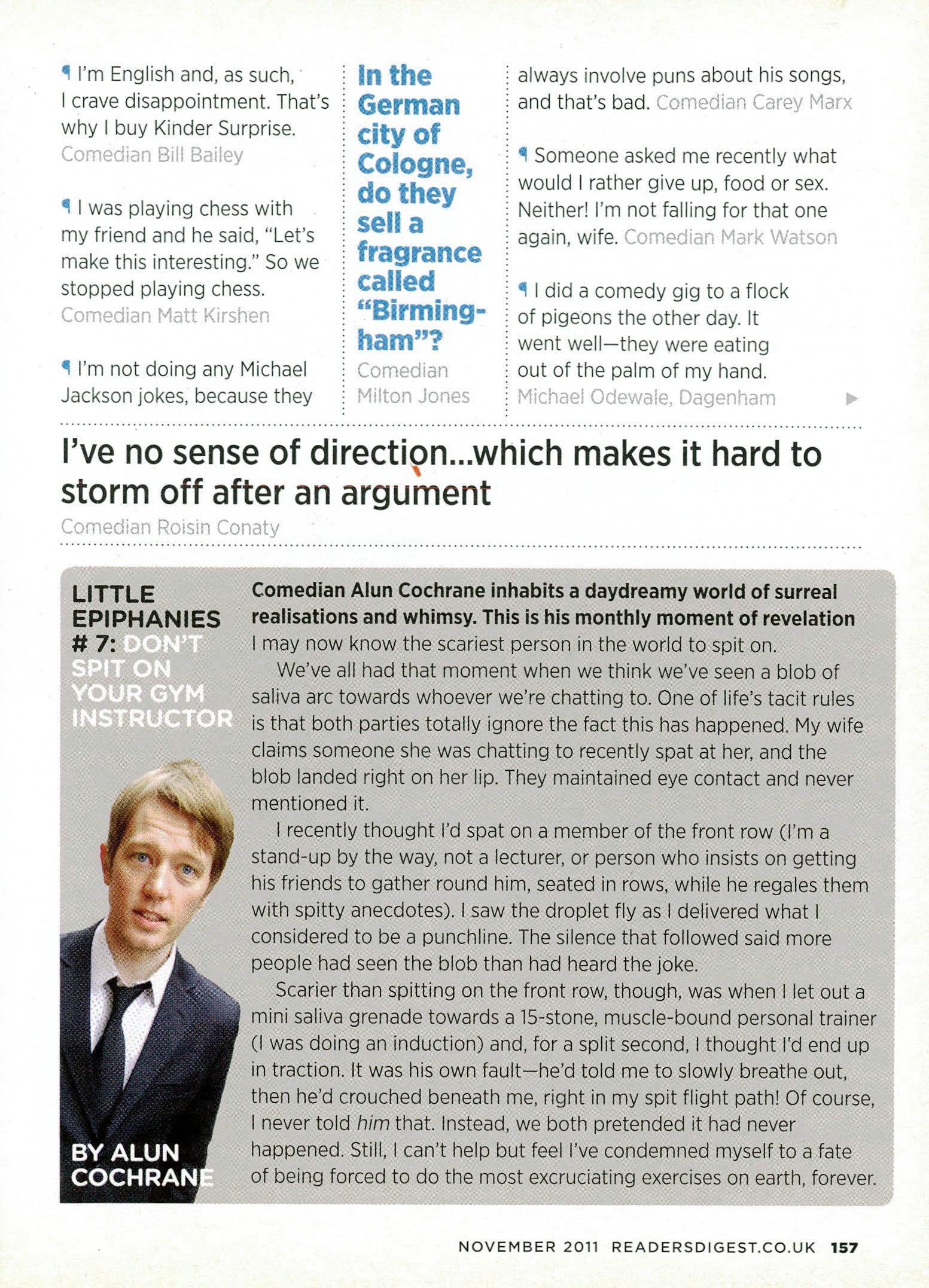
always involve puns about his songs, and that's bad. Comedian Carey Marx
I Someone asked me recently what would I rather give up, food or sex. Neither! I'm not falling for that one again, wife. Comedian Mark Watson
I did a comedy gig to a flock of pigeons the other day. It went well—they were eating out of the palm of my hand.
Michael Odewale, Dagenham ►
I've no sense of direction...which makes it hard to storm off after an argument n Conaty
LITTLE EPIPHANIES # 7:
Comedian Alun Cochrane inhabits a daydreamy world of surreal realisations and whimsy. This is his monthly moment of revelation I may now know the scariest person in the world to spit on.
We've all had that moment when we think we've seen a blob of saliva arc towards whoever we're chatting to. One of life's tacit rules is that both parties totally ignore the fact this has happened. My wife claims someone she was chatting to recently spat at her, and the blob landed right on her lip. They maintained eye contact and never mentioned it.
I recently thought I'd spat on a member of the front row (I'm a stand-up by the way, not a lecturer, or person who insists on getting his friends to gather round him, seated in rows, while he regales them with spitty anecdotes). I saw the droplet fly as I delivered what I considered to be a punchline. The silence that followed said more people had seen the blob than had heard the joke.
Scarier than spitting on the front row, though, was when I let out a mini saliva grenade towards a 15-stone, muscle-bound personal trainer (I was doing an induction) and, for a split second, I thought I'd end up in traction. It was his own fault—he'd told me to slowly breathe out, then he'd crouched beneath me, right in my spit flight path! Of course, I never told him that. Instead, we both pretended it had never happened. Still, I can't help but feel I've condemned myself to a fate of being forced to do the most excruciating exercises on earth, forever.
Moose Allain is a Devon-based illustrator and Twitter user with a promising sideline in writing offbeat jokes. See more—including his collection of "one-Tweet stories"—at worldofmoose.com.
■ I think this ghost fancies me. She's been wooing me for ages.
■ Russian dolls are so full of themselves.
■ I bought a picnic blanket today. Not much of a story, I know; nevertheless I shall be dining out on it for weeks to come.
■ My interest in semaphore is flagging.
■ Oh no, I've got Pritt Stick all over my autobiography! Well, that's my story, and I'm sticking to it.
■ My optometrist thinks my eyes will probably improve. Unfortunately, my pessometrist thinks they'll get worse.
■ I feel for people who have been kept in the dark.
■ If I lose weight, will you think less of me?
■ I haven't had a splinter for ages—touch wood!
■ The number of accidents caused by dropped knives has fallen sharply.
■ When I was told time travel was possible, I have to confess I was a little taken aback.
■ In some ways I'm an adult and, in others, I've retained a childlike quality. For example, I have an imaginary accountant.
■ My seven-year-old son learned how important it is to spell properly after I took him to a sweatshop for his birthday, as requested.
■ The collective noun for bison is herd, unless they're on tiptoes. Then they're unherd.
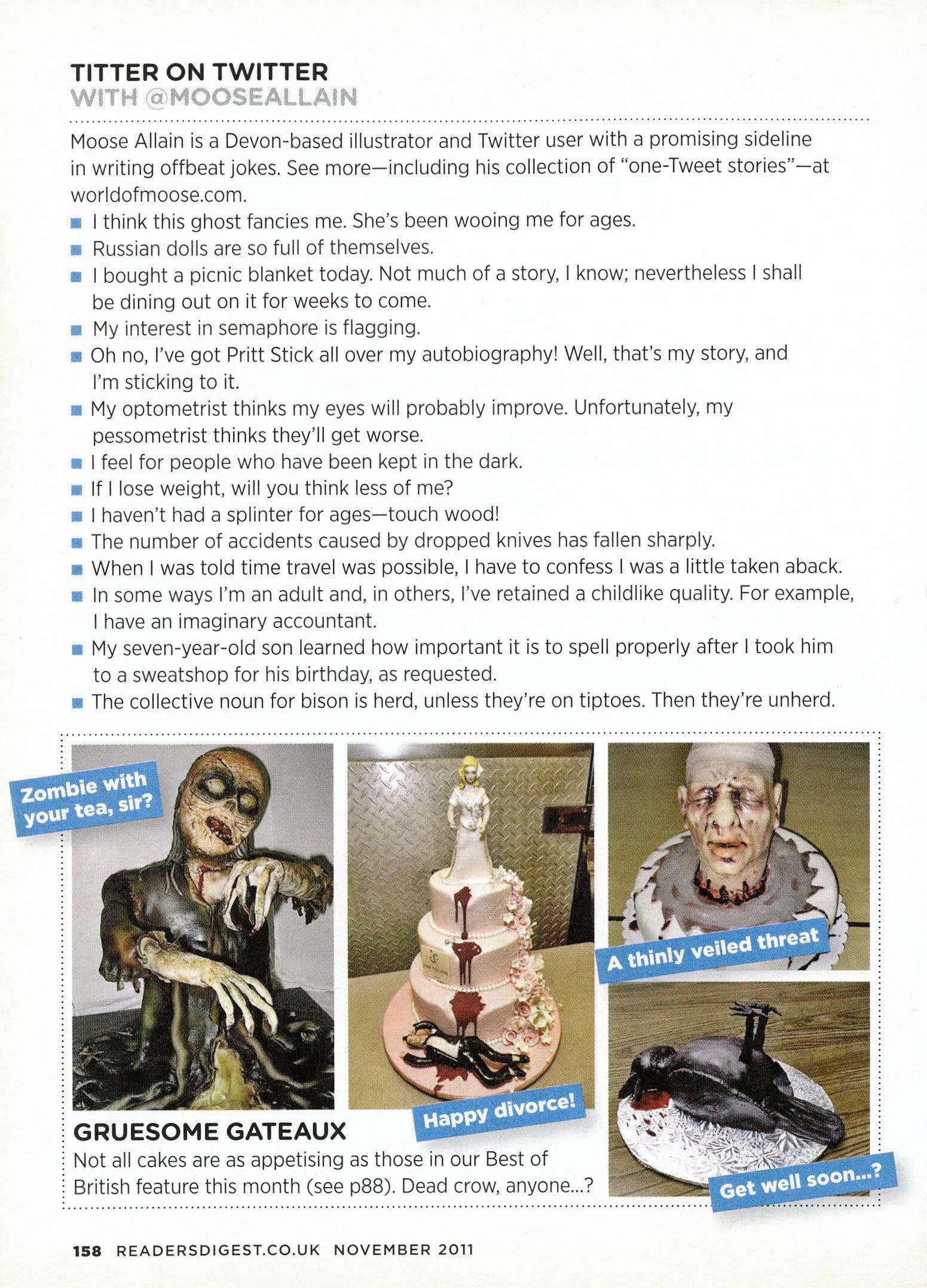
Not all cakes are as appetising as those in our Best of British feature this month (see p88). Dead crow, anyone...?
1 Q: What did the white grape say to the purple grape?
A: Breathe! Breathe! Paul Lewis, Canada
I Does anyone else watch Loose Women and think we didn't deserve the right to vote? Comedian Caried Lloyd
1 I don't swim in the sea, because I'm afraid of sharks. There's no way a shark is going to get me...unless they like the taste of chlorine ...and athlete's foot! Comedian Gina Yashere
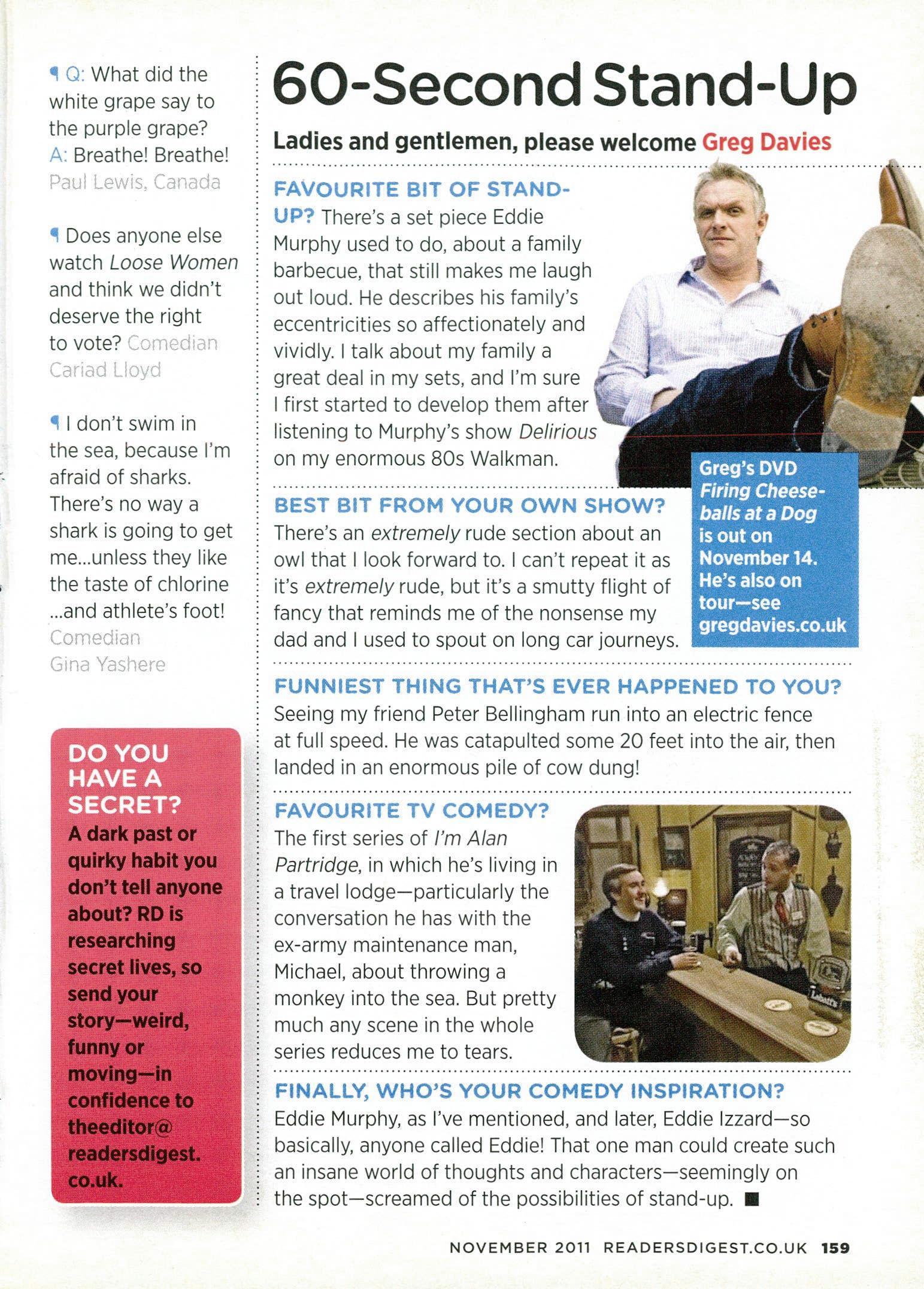
dark past o quirky habit you don't tell anyone about? RD is researching secret lives, so send your story—weird, funny or moving—in confidence to theeditor@ readersdige co.uk.
Ladies and gentlemen, please welcome Greg Davies
FAVOURITE BIT OF STANDUP? There's a set piece Eddie Murphy used to do, about a family barbecue, that still makes me laugh out loud. He describes his family's eccentricities so affectionately and vividly. I talk about my family a great deal in my sets, and I'm sure I first started to develop them after listening to Murphy's show Delirious on my enormous 80s Walkman.
BEST BIT FROM YOUR OWN SHOW?
There's an extremely rude section about an owl that I look forward to. I can't repeat it as it's extremely rude, but it's a smutty flight of fancy that reminds me of the nonsense my dad and I used to spout on long car journeys.
Greg's DVD Firing Cheeseballs at a Dog is out on November 14. He's also on tour—see gregdavies.co.uk
FUNNIEST THING THAT'S EVER HAPPENED TO YOU?
Seeing my friend Peter Bellingham run into an electric fence at full speed. He was catapulted some 20 feet into the air, then landed in an enormous pile of cow dung!
FAVOURITE TV COMEDY?
The first series of I'm Alan Partridge, in which he's living in a travel lodge—particularly the conversation he has with the ex-army maintenance man, Michael, about throwing a monkey into the sea. But pretty much any scene in the whole series reduces me to tears.
FINALLY, WHO'S YOUR COMEDY INSPIRATION?
Eddie Murphy, as I've mentioned, and later, Eddie Izzard—so basically, anyone called Eddie! That one man could create such an insane world of thoughts and characters—seemingly on the spot—screamed of the possibilities of stand-up. ■
Think of a witty caption for this picture and you could beat the experts at their own game. The three best suggestions will be posted on our website in mid-November alongside an anonymous caption from our professional cartoonist. Visitors can choose their favourite—and if your entry gets the most votes, you'll receive f100 and a framed copy of the drawing. Submit to captions@ readersdigest. co.uk or the address on p4 by November 11. Enter and vote online at readersdigest. co.uk/caption. We'll announce the winner in our January issue.
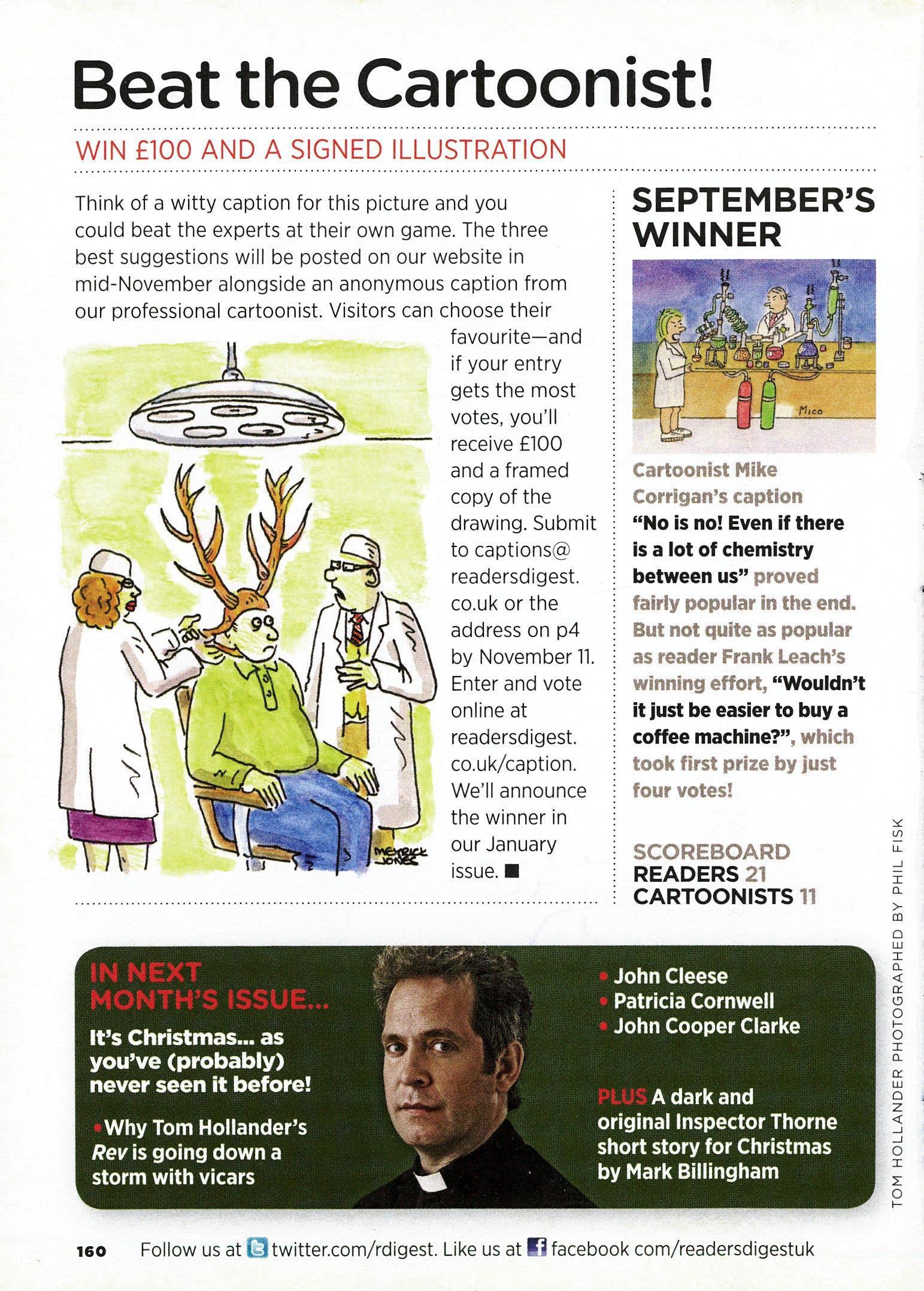
Cartoonist Mike Corrigan's caption "No is no! Even if there is a lot of chemistry between us" proved fairly popular in the end. But not quite as popular as reader Frank Leach's winning effort, "Wouldn't it just be easier to buy a coffee machine?", which took first prize by just four votes!
SCOREBOARD READERS 21 CARTOONISTS 11
John Cleese
Patricia Cornwell
John Cooper Clarke It's Christmas... as you've (probably) never seen it before!
Why Tom Hollander's Rev is going down a storm with vicars
A dark and original Inspector Thorne short story for Christmas by Mark Billingham

Because we are all different,one size doesn't fit all
As we move through life our nutritional requirements change, so why take an ordinary multivitamin when there is a supplement tailored to your specific needs? The award winning Vitabiotics wellness range offers comprehensive nutritional support from sensible, balanced formulae. With 40 years experience, there is no supplement range for specific life stages more relied on than Vitabiotics. °hon., deve,0,04
The UK's No.1 wellness range for specific life stages „4,vad Prli,tk=e" u,=;1,=n
LO 77./^1/41_ MOP- .11111111I AGE PERFECT

•ESSENTIAL
INTENSIVE RE-NOURISH NIGHT BALM
Intensely nourishes with moisture. For skin that looks smoother, plumper and